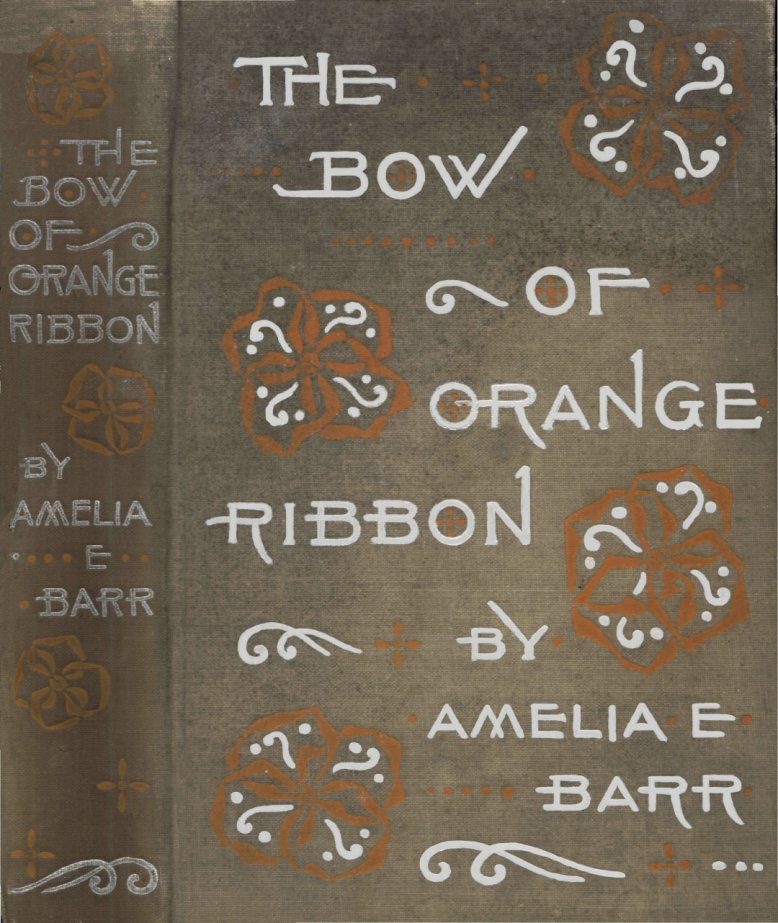
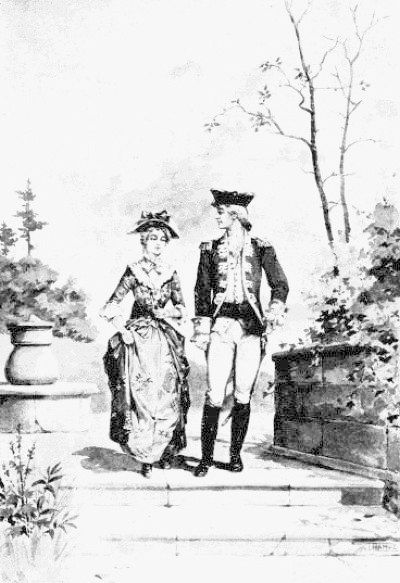
[Transcribers note: A title has been created for an unlisted illustration on P102 of the original text and inserted into the list of illustrations.]
THE BOW OF ORANGE RIBBON
A ROMANCE OF NEW YORK
BY AMELIA E. BARR
AUTHOR OF
"JAN VEDDER'S WIFE"
"A DAUGHTER OF FIFE"
ETC.
WITH ILLUSTRATIONS BY THEO. HAMPE
NEW YORK DODD, MEAD & COMPANY PUBLISHERS
Copyright, 1886, 1893 BY DODD, MEAD & COMPANY
All rights reserved
Typography
BY ROCKWELL AND CHURCHILL,
Boston
Presswork
BY JOHN WILSON AND SON,
Cambridge.
BY PERMISSION
This Book is Dedicated
TO THE
HOLLAND SOCIETY OF NEW YORK
Contents
Chapter
I II. III. IV. V. VI. VII. VIII. IX. X. XI. XII. XIII. XIV. XV. XVI.

| PAGE | |
| She was going down the steps with him | Frontispiece |
| May in New York one hundred and twenty-one years ago | 3 |
| Joris Van Heemskirk | 4 |
| Locking-up the cupboards | 7 |
| She was tying on her white apron | 11 |
| "Come awa', my bonnie lassie" | 13 |
| Knitting | 16 |
| Neil and Bram | 19 |
| Tail-piece | 20 |
| Chapter heading | 21 |
| With her spelling-book and Heidelberg | 24 |
| The amber necklace | 27 |
| In one of those tall-backed Dutch chairs | 34 |
| Tail-piece | 38 |
| Chapter heading | 39 |
| He heard her calling him to breakfast | 42 |
| The quill pens must be mended | 49[Pg vi] |
| A Guelderland flagon | 53 |
| "A very proper love-knot" | 57 |
| Tail-piece | 62 |
| Chapter heading | 63 |
| Hyde flung off the touch with a passionate oath | 65 |
| Batavius stood at the mainmast | 67 |
| He took her in his arms | 71 |
| A little black boy entered | 75 |
| Tail-piece | 82 |
| Chapter heading | 83 |
| "Sir, you are very uncivil" | 89 |
| "Listen to me, thy father!" | 97 |
| He took his solitary tea | 102 |
| On the steps of the houses | 105 |
| Tail-piece | 106 |
| Chapter heading | 107 |
| "Katherine, I am in great earnest" | 110 |
| "In the interim, at your service" | 116 |
| "Why do you wait?" | 122 |
| The swords of both men sprung from their hands | 125 |
| Tail-piece | 127 |
| Chapter heading | 128 |
| Oh, how she wept! | 133 |
| "O Bram! is he dead?" | 137 |
| The streets were noisy with hawkers | 146 |
| Katherine was close to his side | 151 |
| Tail-piece | 155 |
| Chapter heading | 156 |
| In its satin depths | 162 |
| Katherine knelt by Richard's side | 164 |
| "I am faint" | 175 |
| "Don't trouble yourself to come down" | 178 |
| "Listen to me!" | 183 |
| Tail-piece | 187 |
| Chapter heading | 188 |
| They stood together over the budding snowdrops | 193 |
| His whole air and attitude had expressed delight | 198 |
| "I am going to take the air this afternoon" | 207 |
| "I will go with you, Richard" | 211 |
| Tail-piece | 214 |
| Chapter heading | 215 |
| "Madam, I come not on courtesy" | 220 |
| "O mother, my sister Katherine!" | 226 |
| "Oh, my cheeny, my cheeny!" | 231 |
| Plain and dark were her garments | 237[Pg vii] |
| Tail-piece | 240 |
| Chapter heading | 241 |
| Katherine stood with her child in her arms | 243 |
| The garden next fell under Katherine's care | 246 |
| "Thou has a grandson of thy own name" | 249 |
| Plate old and new | 252 |
| "Make me not to remember the past" | 258 |
| With a great sob Bram laid his head against her breast | 263 |
| Chapter heading | 266 |
| She spread out all her finery | 273 |
| All kinds of frivolity and amusement | 278 |
| "Dick, I am angry at you" | 282 |
| She was softly singing to the drowsy child | 285 |
| Chapter heading | 289 |
| She was stretched upon a sofa | 295 |
| She stood in the gray light by the window | 301 |
| Chapter heading | 303 |
| She knelt speechless and motionless | 307 |
| Jane lifted her apron to her eyes | 311 |
| "O Richard, my lover, my husband!" | 317 |
| Chapter heading | 320 |
| "One night in Rome, in a moment, the thing was altered," | 323 |
| "I must draw my sword again" | 328 |
| "We have closed his Majesty's custom-house forever" | 333 |
| "I am reading the Word" | 339 |
| He was standing on the step of his high counting-desk. | 345 |
| Chapter heading | 348 |
| Lysbet and Catherine were unpacking | 350 |
| He marshalled the six children in front of him | 354 |
| The City Hall | 358 |
| He swung a great axe | 359 |
| Lysbet's hands gave it to them | 365 |
| Tail-piece | 371 |
THE BOW OF ORANGE RIBBON
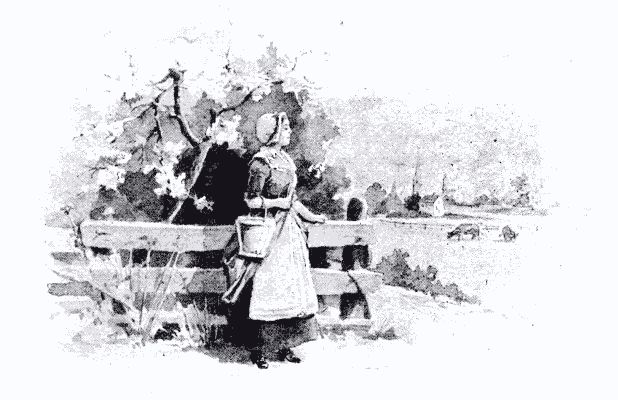
I.
"Love, that old song, of which the world is never weary."
It was one of those beautiful, lengthening days, when May was pressing back with both hands the shades of the morning and the evening; May in New York one hundred and twenty-one years ago, and yet the May of A.D. 1886,—the same clear air and wind, the same rarefied freshness, full of faint, passing aromas from the wet earth and the salt sea and the blossoming gardens. For on the shore of the East River the gardens still sloped down, even to below Peck Slip; and behind old Trinity the apple-trees blossomed like bridal nosegays, the pear-trees rose in immaculate pyramids, and here and there cows were coming up heavily to the scattered houses; the lazy, intermitting tinkle of their bells giving a pleasant notice [Pg 4]of their approach to the waiting milking-women.
In the city the business of the day was over; but at the open doors of many of the shops, little groups of apprentices in leather aprons were talking, and on the broad steps of the City Hall a number of grave-looking men were slowly separating after a very satisfactory civic session. They had been discussing the marvellous increase of the export trade of New York; and some vision of their city's future greatness may have appeared to them, for they held themselves with the lofty and confident air of wealthy merchants and "members of his Majesty's Council for the Province of New York."
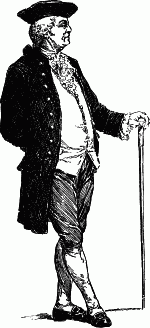
They were all noticeable men, but Joris Van Heemskirk specially so. His bulk was so great that it seemed as if he must have been built up: it was too much to expect that he had ever been a baby. He had a fair, ruddy face, and large, firm eyes, and a mouth that was at once strong and sweet. And he was also very handsomely dressed. The long, stiff skirts of his dark-blue coat were lined with satin, his breeches were black velvet, his ruffles edged with Flemish lace, his shoes clasped with silver buckles, his cocked hat made of the finest beaver.
With his head a little forward, and his right arm across his back, he walked slowly up Wall Street into Broadway, and then took a north-westerly direction toward the river-bank. His home was on the outskirts of the city, but not [Pg 5]far away; and his face lightened as he approached it. It was a handsome house, built of yellow bricks, two stories high, with windows in the roof, and gables sending up sharp points skyward. There were weather-cocks on the gables, and little round holes below the weather-cocks, and small iron cranes below the holes, and little windows below the cranes,—all perfectly useless, but also perfectly picturesque and perfectly Dutch. The rooms were large and airy, and the garden sloped down to the river-side. It had paths bordered by clipped box, and shaded by holly and yew trees cut in fantastic shapes.
In the spring this garden was a wonder of tulips and hyacinths and lilacs, of sweet daffodils and white lilies. In the summer it was ruddy with roses, and blazing with verbenas, and gay with the laburnum's gold cascade. Then the musk carnations and the pale slashed pinks exhaled a fragrance that made the heart dream idyls. In the autumn there was the warm, sweet smell of peaches and pears and apples. There were morning-glories in riotous profusion, tall hollyhocks, and wonderful dahlias. In winter it still had charms,—the white snow, and the green box and cedar and holly, and the sharp descent of its frozen paths to the frozen river. Councillor Van Heemskirk's father had built the house and planted the garden, and he had the Dutch reverence for a good ancestry. Often he sent his thoughts backward to remember how he walked by his father's side, or leaned against his mother's chair, as they told him the tragic tales of the old Barneveldt and the hapless De Witts; or [Pg 6]how his young heart glowed to their memories of the dear fatherland, and the proud march of the Batavian republic.
But this night the mournful glamour of the past caught a fresh glory from the dawn of a grander day forespoken. "More than three hundred vessels may leave the port of New York this same year," he thought. "It is the truth; every man of standing says so. Good-evening, Mr. Justice. Good-evening, neighbours;" and he stood a minute, with his hands on his garden-gate, to bow to Justice Van Gaasbeeck and to Peter Sluyter, who, with their wives, were going to spend an hour or two at Christopher Laer's garden. There the women would have chocolate and hot waffles, and discuss the new camblets and shoes just arrived from England, and to be bought at Jacob Kip's store; and the men would have a pipe of Virginia and a glass of hot Hollands, and fight over again the quarrel pending between the governor and the Assembly.
"Men can bear all things but good days," said Peter Sluyter, when they had gone a dozen yards in silence; "since Van Heemskirk has a seat in the council-room, it is a long way to his hat."
"Come, now, he was very civil, Sluyter. He bows like a man not used to make a low bow, that is all."
"Well, well! with time, every one gets into his right place. In the City Hall, I may yet put my chair beside his, Van Gaasbeeck."
"So say I, Sluyter; and, for the present, it is all well as it is."
This little envious fret of his neighbour lost [Pg 7]itself outside Joris Van Heemskirk's home. Within it, all was love and content. He quickly divested himself of his fine coat and ruffles, and in a long scarlet vest, and a little skull-cap made of orange silk, sat down to smoke. He had talked a good deal in the City Hall, and he was now chewing deliberately the cud of his wisdom over again. Madam Van Heemskirk understood that, and she let the good man reconsider himself in peace. Besides, this was her busy hour. She was

[Pg 8]giving out the food for the morning's breakfast, and locking up the cupboards, and listening to complaints from the kitchen, and making a plaster for black Tom's bealing finger. In some measure, she prepared all day for this hour, and yet there was always something unforeseen to be done in it.
She was a little woman, with clear-cut features, and brown hair drawn backward under a cap of lace very stiffly starched. Her tight fitting dress of blue taffeta was open in front, and looped up behind in order to show an elaborately quilted petticoat of light-blue camblet. Her white wool stockings were clocked with blue, her high-heeled shoes cut very low, and clasped with small silver buckles. From her trim cap to her trig shoes, she was a pleasant and comfortable picture of a happy, domestic woman; smiling, peaceful, and easy to live with.
When the last duty was finished, she let her bunch of keys fall with a satisfactory "all done" jingle, that made her Joris look at her with a smile. "That is so," she said in answer to it. "A woman is glad when she gets all under lock and key for a few hours. Servants are not made without fingers; and, I can tell thee, all the thieves are not yet hung."
"That needs no proving, Lysbet. But where, then, is Joanna and the little one? And Bram should be home ere this. He has stayed out late more than once lately, and it vexes me. Thou art his mother, speak to him."
"Bram is good; do not make his bridle too short. Katherine troubles me more than Bram. She is quiet and thinks much; and when I say, 'What art thou thinking of?' she answers [Pg 9]always, 'Nothing, mother.' That is not right. When a girl says, 'Nothing, mother,' there is something—perhaps, indeed, somebody—on her mind."
"Katherine is nothing but a child. Who would talk love to a girl who has not yet taken her first communion? What you think is nonsense, Lysbet;" but he looked annoyed, and the comfort of his pipe was gone. He put it down, and walked to a side-door, where he stood a little while, watching the road with a fretful anxiety.
"Why don't the children come, then? It is nearly dark, and the dew falls; and the river mist I like not for them."
"For my part, I am not uneasy, Joris. They were to drink a dish of tea with Madam Semple, and Bram promised to go for them. And, see, they are coming; but Bram is not with them, only the elder. Now, what can be the matter?"
"For every thing, there are more reasons than one; if there is a bad reason, Elder Semple will be sure to croak about it. I could wish that just now he had not come."
"But then he is here, and the welcome must be given to a caller on the threshold. You know that, Joris."
"I will not break a good custom."
Elder Alexander Semple was a great man in his sphere. He had a reputation for both riches and godliness, and was scarcely more respected in the market-place than he was in the Middle Kirk. And there was an old tie between the Semples and the Van Heemskirks,—a tie going back to the days when the Scotch [Pg 10]Covenanters and the Netherland Confessors clasped hands as brothers in their "churches under the cross." Then one of the Semples had fled for life from Scotland to Holland, and been sheltered in the house of a Van Heemskirk; and from generation to generation the friendship had been continued. So there was much real kindness and very little ceremony between the families; and the elder met his friend Joris with a grumble about having to act as "convoy" for two lasses, when the river mist made the duty so unpleasant.
"Not to say dangerous," he added, with a forced cough. "I hae my plaid and my bonnet on; but a coat o' mail couldna stand mists, that are a vera shadow o' death to an auld man, wi' a sair shortness o' the breath."
"Sit down, Elder, near the fire. A glass of hot Hollands will take the chill from you."
"You are mair than kind, gudewife; and I'll no say but what a sma' glass is needfu', what wi' the late hour, and the thick mist"—
"Come, come, Elder. Mists in every country you will find, until you reach the New Jerusalem."
"Vera true, but there's a difference in mists. Noo, a Scotch mist isna at all unhealthy. When I was a laddie, I hae been out in them for a week thegither, ay, and felt the better o' them." He had taken off his plaid and bonnet as he spoke; and he drew the chair set for him in front of the blazing logs, and stretched out his thin legs to the comforting heat.
In the mean time, the girls had gone upstairs together; and their footsteps and voices, and Katherine's rippling laugh, could be heard dis[Pg 11]tinctly through the open doors. Then Madam called, "Joanna!" and the girl came down at once. She was tying on her white apron as she entered the room; and, at a word from her mother, she began to take from the cupboards various Dutch dainties, and East Indian jars of fruits and sweetmeats, and a case of crystal bottles, and some fine lemons. She was a fair, rosy girl, with a kind, cheerful face, a pleasant voice, and a smile that was at once innocent and bright. Her fine light hair was rolled high and backward; and no one could have imagined a dress more suitable to her than the trig dark bodice, the quilted skirt, and the white apron she wore.
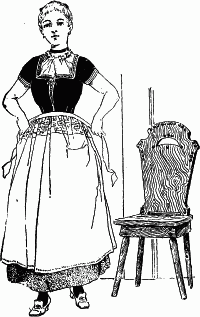
Her father and mother watched her with a loving satisfaction; and though Elder Semple was discoursing on that memorable dispute between the Caetus and Conferentie parties, which had resulted in the establishment of a new independent Dutch church in America, he was quite sensible of Joanna's presence, and of what she was doing.
"I was aye for the ordaining o' American ministers in America," he said, as he touched the finger tips of his left hand with those of his right; and then in an aside full of deep personal interest, "Joanna, my dearie, I'll hae a Holland bloater and nae other thing. And I was a proud man when I got the [Pg 12]invite to be secretary to the first meeting o' the new Caetus. Maybe it is praising green barley to say just yet that it was a wise departure; but I think sae, I think sae."
At this point, Katherine Van Heemskirk came into the room; and the elder slightly moved his chair, and said, "Come awa', my bonnie lassie, and let us hae a look at you." And Katherine laughingly pushed a stool toward the fire, and sat down between the two men on the hearthstone. She was the daintiest little Dutch maiden that ever latched a shoe,—very diminutive, with a complexion like a sea-shell, great blue eyes, and such a quantity of pale yellow hair, that it made light of its ribbon snood, and rippled over her brow and slender white neck in bewildering curls. She dearly loved fine clothes; and she had not removed her visiting dress of Indian silk, nor her necklace of amber beads. And in her hands she held a great mass of lilies of the valley, which she caressed almost as if they were living things.
"Father," she said, nestling close to his side, "look at the lilies. How straight they are! How strong! Oh, the white bells full of sweet scent! In them put your face, father. They smell of the spring." Her fingers could scarcely hold the bunch she had gathered; and she buried her lovely face in them, and then lifted it, with a charming look of delight, and the cries of "Oh, oh, how delicious!"
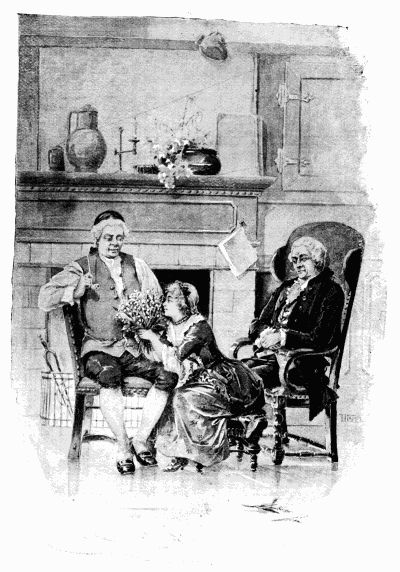
Long before supper was over, Madam Van Heemskirk had discovered that this night Elder Semple had a special reason for his call. His talk of Mennon and the Anabaptists and the objectionable Lutherans, she perceived, was allsurface talk; and when the meal was finished, and the girls gone to their room, she was not astonished to hear him say, "Joris, let us light another pipe. I hae something to speak anent. Sit still, gudewife, we shall want your word on the matter."
"On what matter, Elder?"
"Anent a marriage between my son Neil and your daughter Katherine."
The words fell with a sharp distinctness, not unkindly, but as if they were more than common words. They were followed by a marked silence, a silence which in no way disturbed Semple. He knew his friends well, and therefore he expected it. He puffed his pipe slowly, and glanced at Joris and Lysbet Van Heemskirk. The father's face had not moved a muscle; the mother's was like a handsome closed book. She went on with her knitting, and only showed that she had heard the proposal by a small pretence of finding it necessary to count the stitches in the heel she was turning. Still, there had been some faint, evanescent flicker on her face, some droop or lift of the eyelids, which Joris understood; for, after a glance at her, he said slowly, "For Katherine the marriage would be good, and Lysbet and I would like it. However, we will think a little about it; there is time, and to spare. One should not run on a new road. The first step is what I like to be sure of; as you know, Elder, to the second step it often binds you.—Say what you think, Lysbet."
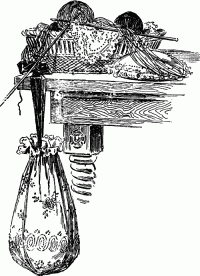
"Neil is to my mind, when the time comes. But yet the child knows not perfectly her Heidelberg. And there is more: she must learn to help her mother about the house before she can manage a house of her own. So in time, I say, it would be a good thing. We have been long good friends."
"We hae been friends for four generations, and we may safely tie the knot tighter now. There are wise folk that say the Dutch and the Lowland Scotch are of the same stock, and a vera gude stock it is,—the women o' baith being fair as lilies and thrifty as bees, and the men just a wonder o' every thing wise and weel-spoken o'. For-bye, baith o' us—Scotch and Dutch—are strict Protestors. The Lady o' Rome never threw dust in our een, and neither o' us would put our noses to the ground for either powers spiritual or powers temporal. When I think o' our John Knox"—
"First came Erasmus, Elder."
"Surely. Well, well, it was about wedding and housekeeping I came to speak, and we'll hae it oot. The land between this place and my place, on the river-side, is your land, Joris. Give it to Katherine, and I will build the young things a house; and the furnishing and plenishing we'll share between us."
"There is more to a wedding than house and land, Elder."
"Vera true, madam. There's the income to meet the outgo. Neil has a good practice now, and is like to have better. They'll be comfortable and respectable, madam; but I think well o' you for speering after the daily bread."
[Pg 17]"Well, look now, it was not the bread-making I was thinking about. It was the love-making. A young girl should be wooed before she is married. You know how it is; and Katherine, the little one, she thinks not of such a thing as love and marriage."
"Wha kens what thoughts are under curly locks at seventeen? You'll hae noticed, madam, that Katherine has come mair often than ordinar' to Semple House lately?"
"That is so. It was because of Colonel Gordon's wife, who likes Katherine. She is teaching her a new stitch in her crewel-work."
"Hum-m-m! Mistress Gordon has likewise a nephew, a vera handsome lad. I hae seen that he takes a deal o' interest in the crewel-stitch likewise. And Neil has seen it too,—for Neil has set his heart on Katherine,—and this afternoon there was a look passed between the young men I dinna like. We'll be haeing a challenge, and twa fools playing at murder, next."
"I am glad you spoke, Elder. Thank you. I'll turn your words over in my heart." But Van Heemskirk was under a certain constraint: he was beginning to understand the situation, to see in what danger his darling might be. He was apparently calm; but an angry fire was gathering in his eyes, and stern lines settling about the lower part of his face.
"You ken," answered Semple, who felt a trifle uneasy in the sudden constraint, "I hae little skill in the ordering o' girl bairns. The Almighty thought them beyond my guiding, and I must say they are a great charge, a great charge; and, wi' all my infirmities and simplicity,—anent women,—one that would hae been [Pg 18]mair than I could hae kept. But I hae brought up my lads in a vera creditable way. They know how to manage their business, and they hae the true religion. I am sure Neil would make a good husband, and I would be glad to hae him settled near by. My three eldest lads hae gone far off, Joris, as you ken."
"I remember. Two went to the Virginia Colony"——
"To Norfolk,—tobacco brokers, and making money. My son Alexander—a wise lad—went to Boston, and is in the African trade. I may say that they are all honest, pious men, without wishing to be martyrs for honesty and piety, which, indeed, in these days is mercifully not called for. As for Neil, he's our last bairn; and his mother and I would fain keep him near us. Katherine would be a welcome daughter to our auld age, and weel loved, and much made o'; and I hope baith Madam Van Heemskirk and yoursel' will think with us."
"We have said we would like the marriage. It is the truth. But, look now, Katherine shall not come any more to your house at this time, not while English soldiers come and go there; for I will not have her speak to one: they are no good for us."
"That is right for you, but not for me. My wife was a Gordon, and we couldn't but offer our house to a cousin in a strange country. And you'll find few better men than Col. Nigel Gordon; as for his wife, she's a fine English leddy, and I hae little knowledge anent such women. But a Scot canna kithe a kindness; if I gie Colonel Gordon a share o' [Pg 19]my house, I must e'en show a sort o' hospitality to his friends and visitors. And the colonel's wife is much thought o', in the regiment and oot o' it. She has a sight o' vera good company,—young officers and bonnie leddies, and some o' the vera best o' our ain people."
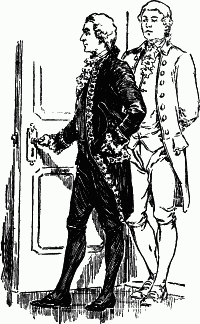
"There it is. I want not my daughters to learn new ways. There are the Van Voorts: they began to dine and dance at the governor's house, and then they went to the English Church."
"They were Lutherans to begin wi', Joris."
"My Lysbet is the finest lady in the whole land: let her daughters walk in her steps. That is what I want. But Neil can come here; I will make him welcome, and a good girl is to be courted on her father's hearth. Now, there is enough said, and also there is some one coming."
"It will be Neil and Bram;" and, as the words were spoken, the young men entered.
"Again you are late, Bram;" and the father looked curiously in his son's face. It was like looking back upon his own youth; for Bram Van Heemskirk had all the physical traits of his father, his great size, his commanding presence and winning address, his large eyes, his deep, sonorous voice and slow speech. He was well dressed in light-coloured broadcloth; but Neil Semple wore a coat and breeches of black velvet, with a long satin vest, and fine small [Pg 20]ruffles. He was tall and swarthy, and had a pointed, rather sombre face. Without speaking much in the way of conversation, he left an impression always of intellectual adroitness,—a young man of whom people expected a successful career.
With the advent of Bram and Neil, the consultation ended. The elder, grumbling at the chill and mist, wrapped himself in his plaid, and leaning on his son's arm, cautiously picked his way home by the light of a lantern. Bram drew his chair to the hearth, and sat silently waiting for any question his father might wish to ask. But Van Heemskirk was not inclined to talk. He put aside his pipe, nodded gravely to his son, and went thoughtfully upstairs. At the closed door of his daughters' room, he stood still a moment. There was a murmur of conversation within it, and a ripple of quickly smothered laughter. How well his soul could see the child, with her white, small hands over her mouth, and her bright hair scattered upon the white pillow!
"Ach, mijn kind, mijn kind! Mijn liefste kind!" he whispered. "God Almighty keep thee from sin and sorrow!"
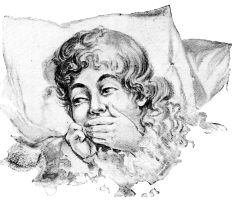
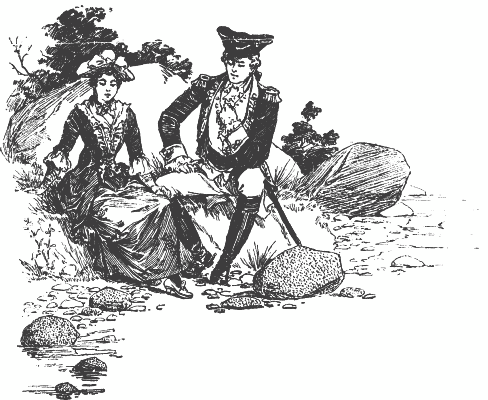
II.
"To be a sweetness more desired
than spring,—
This is the flower of life."
Joris Van Heemskirk had not thought of prayer; but, in his vague fear and apprehension, his soul beat at his lips, and its natural language had been that appeal at his daughter's closed door. For Semple's words had been like a hand lifting the curtain in a dark room: only a clouded and uncertain light had been thrown, but in it even familiar objects looked portentous. In these days, the tendency is to tone down and to assimilate, to deprecate every thing positive and demonstrative. But Joris lived when the great motives of humanity stood out sharp and bold, and surrounded by a religious halo.
Many of his people had begun to associate with the governing race, to sit at their banquets, and even to worship in their church; but [Pg 22]Joris, in his heart, looked upon such "indifferents" as renegades to their God and their fatherland. He was a Dutchman, soul and body; and no English duke was prouder of his line, or his royal quarterings, than was Joris Van Heemskirk of the race of sailors and patriots from whom he had sprung.
Through his father, he clasped hands with men who had swept the narrow seas with De Ruyter, and sailed into Arctic darkness and icefields with Van Heemskirk. Farther back, among that mysterious, legendary army of patriots called "The Beggars of the Sea," he could proudly name his fore-goers,—rough, austere men, covered with scars, who followed Willemsen to the succour of Leyden. The likeness of one of them, Adrian Van Heemskirk, was in his best bedroom,—the big, square form wrapped in a pea-jacket; a crescent in his hat, with the device, "Rather Turk than Papist;" and upon his breast one of those medals, still hoarded in the Low Countries, which bore the significant words, "In defiance of the Mass."
He knew all the stories of these men,—how, fortified by their natural bravery, and by their Calvinistic acquiescence in the purposes of Providence, they put out to sea in any weather, braved any danger, fought their enemies wherever they found them, worked like beavers behind their dams, and yet defiantly flung open their sluice-gates, and let in the ocean, to drown out their enemies.
Through his mother, a beautiful Zealand woman, he was related to the Evertsens, the victorious admirals of Zealand, and also to the [Pg 23]great mercantile family of Doversteghe; and he thought the enterprise of the one as honourable as the valour of the other. Beside the sailor pictures of Cornelius and Jan Evertsen, and the famous "Keesje the Devil," he hung sundry likenesses of men with grave, calm faces, proud and lofty of aspect, dressed in rich black velvet and large wide collars,—merchants who were every inch princes of commerce and industry.
These lines of thought, almost tedious to indicate, flashed hotly and vividly through his mind. The likes and dislikes, the faiths and aspirations, of past centuries, coloured the present moments, as light flung through richly stained glass has its white radiance tinged by it. The feeling of race—that strong and mysterious tie which no time nor circumstances can eradicate—was so living a motive in Joris Van Heemskirk's heart, that he had been quite conscious of its appeal when Semple spoke of a marriage between Katherine and his own son. And Semple had understood this, when he so cunningly insinuated a common stock and a common form of faith. For he had felt, instinctively, that even the long tie of friendship between them was hardly sufficient to bridge over the gulf of different nationalities.
Then, Katherine was Van Heemskirk's darling, the very apple of his eye. He felt angry that already there should be plans laid to separate her in any way from him. His eldest daughters, Cornelia and Anna, had married men of substance in Esopus and Albany: he knew they had done well for themselves, and had become contented in that knowledge; but he also [Pg 24]felt that they were far away from his love and home. Joanna was already betrothed to Capt. Batavius de Vries; Bram would doubtless find himself a wife very soon; for a little while, he had certainly hoped to keep Katherine by his own side.

Semple, in speaking of her as already marriageable, had given him a shock. It seemed such a few years since he had walked her to sleep at nights, cradled in his strong arms, close to his great, loving heart; such a little while ago when she toddled about the garden at his side, her plump white hands holding his big forefinger; only yesterday that she had been going to the school, with her spelling-book and Heidelberg in her hand. When Lysbet had spoken to him of the English lady staying with Madam Semple, who was teaching Katherine the new crewel-stitch, it had appeared to him quite proper that such a child should be busy learning something in the way of needlework. "Needlework" had been given as the reason of those visits, which he now remembered had been very frequent; and he was so absolutely truthful, that he never imagined the word to be in any measure a false definition.
Therefore, Elder Semple's implication had stunned him like a buffet. In his own room, he sat down on a big oak chest; and, as he thought, his wrath slowly gathered. Semple knew that gay young English officers were coming and going about his house, and he had not told him until he feared they would interfere with his own plans for keeping Neil near [Pg 25]to him. The beautiful little Dutch maiden had been an attraction which he was proud to exhibit, just as he was proud of his imported furniture, his pictures, and his library. He remembered that Semple had spoken with touching emphasis of his longing to keep his last son near home; but must he give up his darling Katherine to further this plan?
"I like not it," he muttered. "God for the Dutchman made the Dutchwoman. That is the right way; but I will not make angry myself for so much of passion, so much of nothing at all to the purpose. That is the truth. Always I have found it so."
Then Lysbet, having finished her second locking up, entered the room. She came in as one wearied and troubled, and said with a sigh, as she untied her apron, "By the girls' bedside I stopped one minute. Dear me! when one is young, the sleep is sound."
"Well, then, they were awake when I passed,—that is not so much as one quarter of the hour,—talking and laughing; I heard them."
"And now they are fast in sleep; their heads are on one pillow, and Katherine's hand is fast clasped in Joanna's hand. The dear ones! Joris, the elder's words have made trouble in my heart. What did the man mean?"
"Who can tell? What a man says, we know; but only God understands what he means. But I will say this, Lysbet, and it is what I mean: if Semple has led my daughter into the way of temptation, then, for all that is past and gone, we shall be unfriends."
"Give yourself no kommer on that matter, Joris. Why should not our girls see what kind [Pg 26]of people the world is made of? Have not some of our best maidens married into the English set? And none of them were as beautiful as Katherine. There is no harm, I think, in a girl taking a few steps up when she puts on the wedding ring."
"Mean you that our little daughter should marry some English good-for-nothing? Look, then, I would rather see her white and cold in the dead-chamber. In a word, I will have no Englishman among the Van Heemskirks. There, let us sleep. To-night I will speak no more."
But madam could not sleep. She was quite sensible that she had tacitly encouraged Katherine's visits to Semple House, even after she understood that Captain Hyde and other fashionable and notable persons were frequent visitors there. In her heart she had dreamed such dreams of social advancement for her daughters as most mothers encourage. Her prejudices were less deep than those of her husband; or, perhaps, they were more powerfully combated by her greater respect for the pomps and vanities of life. She thought rather well than ill of those people of her own race and class who had made themselves a place in the most exclusive ranks. During the past ten years, there had been great changes in New York's social life: many families had become very wealthy, and there was a rapidly growing tendency to luxurious and splendid living. Lysbet Van Heemskirk saw no reason why her younger children should not move with this current, when it might set them among the growing aristocracy of the New World.

She tried to recall Katharine's demeanour and words during the past day, and she could find no cause for alarm in them. True, the child had spent a long time in arranging her beautiful hair, and she had also begged from her the bright amber necklace that had been her own girlish pride; but what then? It was so natural, especially when there was likely to be fine young gentlemen to see them. She could not remember having noticed anything at all which ought to make her uneasy; and what Lysbet did not see or hear, she could not imagine.
Yet the past ten hours had really been full of danger to the young girl. Early in the afternoon, some hours before Joanna was ready to go, Katherine was dressed for her visit to Semple House. It was the next dwelling to the Van Heemskirks' on the river-bank, about a quarter of a mile distant, but plainly in sight; and this very proximity gave the mother a sense of security for her children. It was a different house from the Dutchman's, one of those great square plain buildings, so common in the Georgian era,—not at all picturesque, but finished inside with handsomely carved wood-work, and with mirrors and wall-papering brought specially for it from England.
It stood, like Van Heemskirk's, at the head of a garden sloping to the river; and there was a good deal of pleasant rivalry about these gardens, both proprietors having impressed their own individuality upon their pleasure-grounds. [Pg 28]Semple's had nothing of the Dutchman's glowing prettiness and quaintness,—no clipped yews and hollies, no fanciful flower-beds and little Gothic summer-house. Its slope was divided into three fine terraces, the descent from one to the other being by broad, low steps; the last flight ending on a small pier, to which the pleasure and fishing boats were fastened. These terraced walks were finely shaded and adorned with shrubs; and on the main one there was a stone sun-dial, with a stone seat around it. Van Heemskirk did not think highly of Semple's garden; and Semple was sure, "that, in the matter o' flowers and fancy clippings, Van Heemskirk had o'er much o' a gude thing." But still the rivalry had always been a good-natured one, and, in the interchange of bulbs and seeds, productive of much friendly feeling.
The space between the two houses was an enclosed meadow; and this afternoon, the grass being warm and dry, and full of wild flowers, Katherine followed the narrow foot-path through it, and entered the Semple garden by the small side gate. Near this gate was a stone dairy, sunk below the level of the ground,—a deliciously cool, clean spot, even in the hottest weather. Passing it, she saw that the door was open, and Madam Semple was busy among its large, shallow, pewter cream-dishes. Lifting her dainty silk skirts, she went down the few steps, and stood smiling and nodding in the doorway. Madam was beating some rich curd with eggs and currants and spices; and Katherine, with a sympathetic smile, asked delightedly,—
"Cheesecakes, madam?"
[Pg 29]"Just cheesecakes, dearie."
"Oh, I am glad! Joanna is coming, too, only she had first some flax to unplait. Wait for her I could not. Let me fill some of these pretty little patty pans."
"I'll do naething o' the kind, Katherine. You'd be spoiling the bonnie silk dress you hae put on. Go to the house and sit wi' Mistress Gordon. She was asking for you no' an hour ago. And, Katherine, my bonnie lassie, dinna gie a thought to one word that black-eyed nephew o' her's may say to you. He's here the day and gane to-morrow, and the lasses that heed him will get sair hearts to themsel's."
The bright young face shadowed, and a sudden fear came into Madam Semple's heart as she watched the girl turn thoughtfully and slowly away. The blinds of the house were closed against the afternoon sun; but the door stood open, and the wide, dim stairway was before her. All was as silent as if she had entered an enchanted castle. And on the upper hall the closed doors, and the soft lights falling through stained glass upon the dark, rich carpets, made an element of mystery, vague and charmful, to which Katherine's sensitive, childlike nature was fully responsive.
Slowly she pushed back a heavy mahogany door, and entered a large room, whose richly wainscoted walls, heavy friezes, and beautifully painted ceiling were but the most obvious points in its general magnificence. On a lounge covered with a design done in red and blue tent stitch, an elegantly dressed woman was sitting, reading a novel. "The Girl of Spirit," "The Fair Maid of the Inn," [Pg 30]"The Curious Impertinent," and other favourite tales of the day, were lying upon an oval table at her side.
"La, child!" she cried, "come here and give me a kiss. So you wear that sweet-fancied suit again. You are the most agreeable creature in it; though Dick vows upon his sword-hilt that you look a hundred times more bewitching in the dress you wore this morning."
"How? This morning, madam? This morning Captain Hyde did not see me at all."
"Pray don't blush so, child; though, indeed, it is vastly becoming. I do assure you he saw you this morning. He had gone out early to take the air, and he had a most transporting piece of good fortune: for he bethought himself to walk under the great trees nearly opposite your house; and when you came to the door, with your excellent father, he noted all, from the ribbon on your head to the buckles on your shoes. His talk now is of nothing but your short quilted petticoat, and your tight bodice, and beautiful bare arms. Is that the Dutch style, then, child? It must be extremely charming."
"If my mother you could see in it! She is beautiful. And we have a picture of my grandmother in the true Zealand dress. Like a princess she looks, my father says; but, indeed, I have never seen a princess."
"My dear, you must allow me to laugh a little. Will you believe it, princesses are sometimes very vulgar creatures? I am sure, however, that your grandmother was very genteel and agreeable. I must tell you that I have [Pg 31]just received my new scarf from London. You shall see it, and give me your opinion."
"O madam, you are very kind! What is it like?"
"It is all extravagance in mode and fancy. I believe, my dear, there are two hundred yards of edging on it; and it has the most enchanting slope to the shoulders. I am wonderfully pleased with it, and hope it will prove becoming."
"Indeed, I think all your suits are becoming."
"Faith, child, I think they are. I have always dressed with the most perfect intelligence. I follow all the fashions, and they must be French. La, here comes Richard. He is going to ask you to take a sail on the river; and I shall lend you my new green parasol. I do believe it is the only one in the country."
"I came to sit with you, and work with my worsteds. Perhaps my mother—might not like me to go on the river with—any one."
"Pray, child, don't be affected. 'My mother—might not like me to go on the river with—any one;'" and she mimicked Katherine so cleverly that the girl's face burned with shame and annoyance.
But she had no time to defend herself; for, with his cavalry cap in his hand, and a low bow, Captain Hyde entered the room; and Katharine's heart throbbed in her cheeks, and she trembled, and yet withal dimpled into smiles, like clear water in the sunshine. A few minutes afterward she was going down the terrace steps with him; and he was looking into her face [Pg 32]with shining eyes, and whispering the commonest words in such an enchanting manner that it seemed to her as if her feet scarcely touched the low, white steps, and she was some sort of glorified Katherine Van Heemskirk, who never, never, never could be unhappy again.
They did not go on the river. Captain Hyde hated exertion. His splendid uniform was too tight to row in. He did not want a third party near, in any capacity. The lower steps were shaded by great water beeches, and the turf under them was green and warm. There was the scent of lilies around, the song of birds above, the ripple of water among pebbles at their feet. A sweeter hour, a lovelier maid, man could never hope to find; and Captain Hyde was not one to neglect his opportunity.
"Let us stay here, my beloved," he whispered. "I have something sweet to tell you. Upon mine honour, I can keep my secret no longer."
The innocent child! Who could blame her for listening to it?—at first with a little fear and a little reluctance, but gradually resigning her whole heart to the charm of his soft syllables and his fervent manner, until she gave him the promise he begged for,—love that was to be for him alone, love for him alone among all the sons of men.
What an enchanted afternoon it was! how all too quickly it fled away, one golden moment after another! and what a pang it gave her to find at the end that there must be lying and deception! For, somehow, she had been persuaded to acquiesce in her lover's desire for [Pg 33]secrecy. As for the lie, he told it with the utmost air of candour.
"Yes, we had a beautiful sail; and how enchanting the banks above here are! Aunt, I am at your service to-morrow, if you wish to see them."
"Oh, your servant, Captain, but I am an indifferent sailor; and I trust I have too much respect for myself and my new frocks, to crowd them into a river cockboat!"
In a few minutes Joanna and the elder came in. He had called for her on his way home; for he liked the society of the young and beautiful, and there were many hours in which he thought Joanna fairer than her sister. Then tea was served in a pretty parlour with Turkish walls and coloured windows, which, being open into the garden, framed lovely living pictures of blossoming trees. Every one was eating and drinking, laughing and talking; so Katherine's unusual silence was unnoticed, except by the elder, who indeed saw and heard everything, and who knew what he did not see and hear by that kind of prescience to which wise and observant years attain. He saw that the cakes Katherine dearly loved remained upon her plate untasted, and that she was unusually, suspiciously quiet.
After tea he walked down the garden with Colonel Gordon. The lily bed was near the river; and he made the gathering of some lilies for Katherine an excuse for going close enough to the pier to see how the boat lay, and whether the oars had been moved from the exact position in which he had placed them. And he found the boat rocking at its moorings, tied with [Pg 34]his own peculiar knot. It told him everything, and he was sincerely troubled at the discovery.
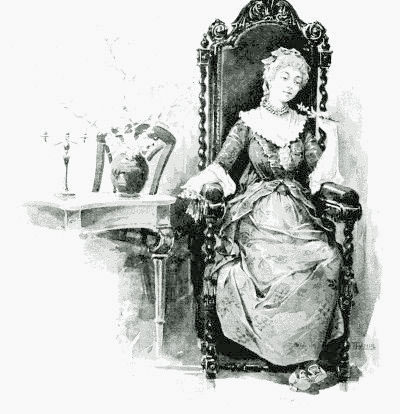
"Love and lying," he mused. "I wonder why they are ever such thick friends. As for Dick Hyde, lying is his native tongue; but if Katharine Van Heemskirk has been aye one thing above another, it was to tell the truth. It ought to come easy to her likewise, for I'll say the same o' the hale nation o' Dutchmen. I dinna think Joris would tell a lie to save baith life and fortune."
He looked at Katherine almost sternly when he went back to the house; though he gave her the lilies, and bid her keep her soul sweet and pure as their white bells. She was sitting by Mistress Gordon's side, in one of those tall-backed Dutch chairs, whose very blackness and straightness threw into high relief her own undulating roundness and mobility, the glowing colours of her Indian silk gown, the shining amber against her white throat, and the picturesque curl and flow of her fair hair. Captain Hyde sat opposite, bending toward her; and his aunt reclined upon the couch, and watched them with a singular look of speculation in her half-shut eyes.
Joanna was talking to Neil Semple in the recess of a window; but Neil's face was white with suppressed anger, and, though he seemed to be listening to her, his eyes—full of passion—were fixed upon Hyde. Perhaps the young soldier was conscious of it; for he occasionally addressed some trivial remark to him, as if to prevent Neil from losing sight of the advantages he had over him.
"The vera air o' this room is gunpowdery," thought the elder; "and ane or the other will be flinging a spark o' passion into it, and then the de'il will be to pay. O'er many women here! O'er many women here! One is enough in any house. I'll e'en tak' the lasses hame mysel'; and I'll speak to Joris for his daughter,—as good now as any other time."
Then he said in his blandest tones, "Joanna, my dearie, you'll hae to tell Neil the rest o' your tale the morn; and, Katherine, put awa' now that bit o' busy idleness, and don your [Pg 36]hoods and mantles, baith o' you. I'm going to tak' you hame, and I dinna want to get my deathe wi' the river mist."
"Pray, sir," said Hyde, "consider me at your service. I have occasion to go into town at once, and will do your duty to the young ladies with infinite pleasure."
"Much obliged, Captain, vera much obliged; but it tak's an auld wise-headed, wise-hearted man like mysel' to walk safely atween twa bonnie lasses;" then turning to his son, he added, "Neil, my lad, put your beaver on, and go and find Bram. You can tell him, as he didna come to look after his sisters afore this hour, he needna come at a'."
"Do you know, father, where Bram is likely to be found?"
"Hum-m-m! As if you didna know yoursel'! He will dootless be among that crowd o' young wiseacres wha are certain the safety o' the Provinces is in their keeping. It's the young who ken a' things, ken mair than councils and assemblies, and king and parliament, thegither."
Colonel Gordon laughed. "Never mind, sir," he said, "they let the army alone, and the church; so you and I need hardly alarm ourselves"—
"I'm no sure o' that, Colonel. When it comes to the army, it's a mere question o' wha can strike the hardest blows; and as to kirk matters, I'm thinking men had better meddle wi' the things o' God, which they canna change, than wi' those o' the king wi' which they can wark a deal o' mischief."
While he was speaking, Neil left the room. [Pg 37]The little argument struck him as a pretext and a cover, and he was glad to escape from a position which he felt to be both painful and humiliating. He was in a measure Captain Hyde's host, and subject to traditions regarding the duties of that character; any display of anger would be derogatory to him, and yet how difficult was restraint! So his father's interference was a welcome one; and he was reconciled to his own disappointment, when, looking back, he saw the old gentleman slowly taking the road to Van Heemskirk's with the pretty girls in their quilted red hoods, one on each side of him.
The elder was very polite to his charges; he never once regretted to them the loss of his pipe, and chat with Colonel Gordon. But he noticed that Katherine was silent and disappointed, and that she lingered in her own room after her arrival at home. Her subsequent pretty cheerfulness, her delight in her lilies, her confiding claims upon her father's love,—nothing in these things deceived him. He saw beneath all the fluttering young heart, trembling, and yet happy in the new, sweet feeling, never felt before, which had come to it that afternoon.
But he thought that most girls had to have this initiative: it prepared the way for a soberer and more lasting affection. In the end, Katherine would perceive how imprudent, how impossible, a marriage with Captain Hyde must be; and her heart would turn back to Neil, who had been her lover from boyhood. Yet he reflected, it would be well to have the matter understood, and to give it [Pg 38]that "possibility" which is best attained on a money basis.
So while he and the Van Heemskirks discussed the matter,—a little reluctantly, he thought, on their part,—Katherine talked with Joanna of the Gordons. Her heart was so full of her lover, that it was a relief to discuss the people and things nearest to him. And her very repression excited her. She toyed with her cambric kerchief before the small looking-glass, and imitated the fashionable English lady with a piquant cleverness that provoked low peals of laughter, and a retrospective discussion of the evening, which was merry enough, without being in the least ill-natured.
But, oh, in what strange solitudes every separate soul dwells! When Katherine kissed her sister, and said simperingly, with the highest English accent, "La, child, I protest it has been the most agreeable evening," Joanna had not a suspicion of the joy and danger that had come to the dear little one at her side.
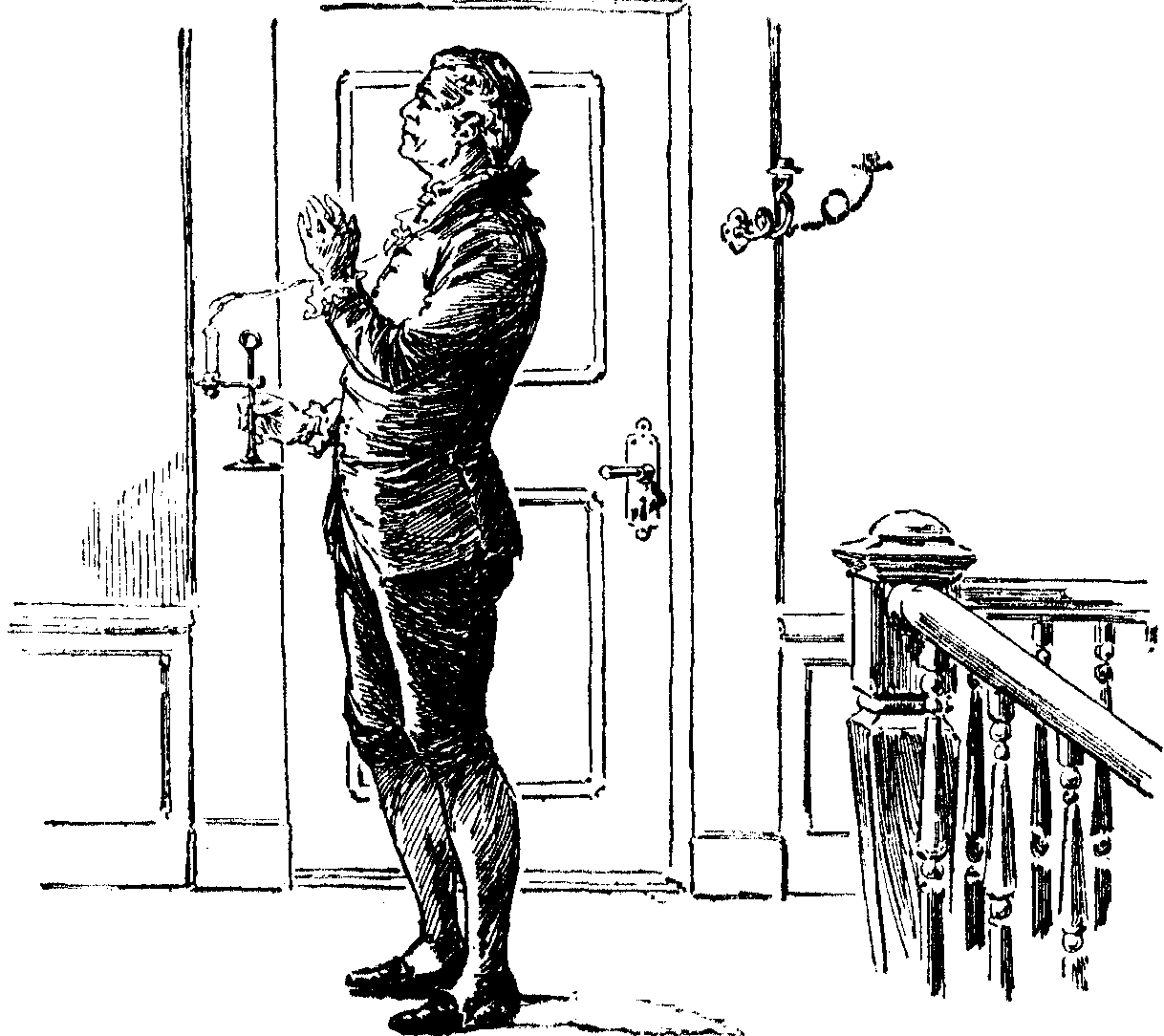
She was laughing softly with her, even while the fearful father stood at the closed door, and lifted up his tender soul in that pathetic petition, "Ach, mijn kind! mijn kind! mijn liefste kind! Almighty God preserve thee from all sin and sorrow!"
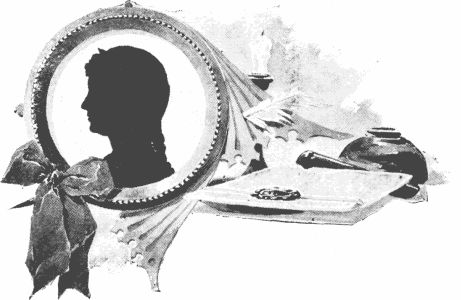
III.
"The proverb holds, that to be wise and love
Is hardly granted to the gods above."
"Well, well, to-day goes to its forefathers, like all the rest; and, as for what comes after it, every thing is in the love and counsel of the Almighty One."
This was Joris Van Heemskirk's last thought ere he fell asleep that night, after Elder Semple's cautious disclosure and proposition. In his calm, methodical, domestic life, it had been an "eventful day." We say the words often and unreflectingly, seldom pausing to consider that such days are the results which months, years, perchance centuries, have made possible. Thus, a long course of reckless living and reckless gambling, and the consequent urgent need of ready money, had first made Captain Hyde turn his thoughts to the pretty daughter of the rich Dutch merchant.
Madam Semple, in her desire to enhance the importance of the Van Heemskirks, had mentioned more than once the handsome sums of ready money given to each of Katharine's sis[Pg 40]ters on their wedding-day; and both Colonel Gordon and his wife had thought of this sum so often, as a relief to their nephew's embarrassments, that it seemed almost as much Hyde's property as if he had been born to inherit it. At first Katherine, as its encumbrance, had been discussed very heartlessly,—she could be left in New York when his regiment received marching orders, if it were thought desirable; or she could be taken to England, and settled as mistress of Hyde Manor House, a lonely mansion on the Norfolk fens, which was so rarely tenanted by the family that Hyde had never been there since his boyhood.
"She is a homespun little thing," laughed the colonel's fashionable wife, "and quite unfit to go among people of our condition. But she adores you, Dick; and she will be passably happy with a house to manage, and a visit from you when you can spare the time."
"Oh, your servant, aunt! Then I am a very indifferent judge; for indeed she has much spirit below her gentle manner; and, upon my word, I think her as fine a creature as you can find in the best London society. The task, I assure you, is not easy. When Katherine is won, then, in faith, her father may be in no hurry of approval. And the child is a fair, innocent child: I am very uneasy to do her wrong. The ninety-nine plagues of an empty purse are to blame for all my ill deeds."
"Upon my word, Dick, nothing can be more commendable than your temper. You make vastly proper reflection, sir; but you are in troubled waters,—admit it,—and this little [Pg 41]Dutch-craft may bring you respectably into harbour.
It was in this mood that Katherine and her probable fortune had been discussed; and thus she was but one of the events, springing from lives anterior to her own, and very different from it. And causes nearly as remote had prepared the way for her ready reception of Hyde's homage, and the relaxation of domestic discipline which had trusted her so often and so readily in his society—causes which had been forgotten, but which had left behind them a positive and ever-growing result. When a babe, she was remarkably frail and delicate; and this circumstance, united to the fact of her being the youngest child, had made the whole household very tender to her, and she had been permitted a much larger portion of her own way than was usually given to any daughter in a Dutch family.
Also, in her father's case, the motives influencing his decision stretched backward through many generations. None the less was their influence potent to move him. In fact, he forgot entirely to reflect how a marriage between his child and Captain Hyde would be regarded at that day; his first thoughts had been precisely such thoughts as would have occurred to a Van Heemskirk living two hundred years before him. And thus, though we hardly remember the fact, it is this awful solidarity of the human family which makes the third and fourth generations heirs of their forefathers, and brings into every life those critical hours we call "eventful days."
Joris, however, made no such reflections. [Pg 42]His age was not an age inclined to analysis, and he was still less inclined to it from a personal standpoint. For he was a man of few, but positive ideas; yet these ideas, having once commended themselves to his faith or his intelligence, were embraced with all his soul. It was this spirit which made him deprecate even religious discussions, so dear to the heart of his neighbour.
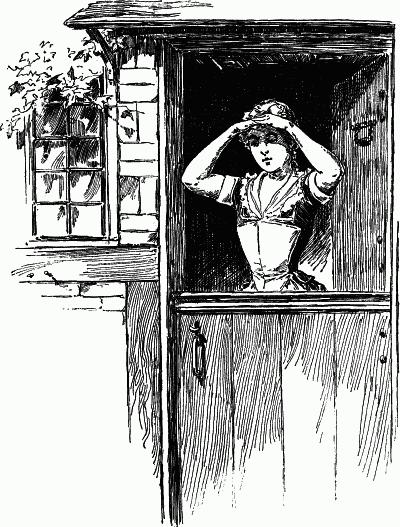
"I like them not, Elder," he would say; "of what use are they, then? [Pg 43] The Calvinistic faith is the true faith. That is certain. Very well, then; what is true does not require to be examined, to see if it be true."
Semple's communication regarding Captain Hyde and his daughter had aroused in him certain feelings, and led him to certain decisions. He went to sleep, satisfied with their propriety and justice. He awoke in precisely the same mood. Then he dressed, and went into his garden. It was customary for Katherine to join him there; and he frequently turned, as he went down the path, to see if she were coming. He watched eagerly for the small figure in its short quilted petticoat and buckled shoes, and the fair, pink face shaded by the large Zealand hat, with its long blue ribbons crossed over the back. But this morning she did not come. He walked alone to his lily bed, and stooped a little forlornly to admire the tulips and crocus-cups and little purple pansies; but his face brightened when he heard her calling him to breakfast, and very soon he saw her leaning over the half door, shading her eyes with both her hands, the better to watch his approach.
Lysbet was already in her place; so was Joanna, and also Bram; and a slim black girl called Dinorah was handing around fricasseed chicken and venison steaks, hot fritters and johnny-cake; while the rich Java berry filled the room with an aroma of tropical life, and suggestions of the spice-breathing coasts of Sunda. Joris and Bram discussed the business of the day; Katherine was full of her visit to Semple House the preceding evening. [Pg 44]Dinorah was no restraint. The slaves Joris owned, like those of Abraham, were born or brought up in his own household; they held to all the family feelings with a faithful, often an unreasonable, tenacity.
And yet, this morning, Joris waited until Lysbet dismissed her handmaid, before he said the words he had determined to speak ere he began the work of the day. Then he put down his cup with an emphasis which made all eyes turn to him, and said,—
"Katrijntje, my daughter, call not to-day, nor call not any day, until I tell you different, at Madam Semple's. The people who go and come there, I like them not. They will be no good to you. Lysbet, what say you in this matter?"
"What you say, I say, Joris. The father is to be obeyed. When he will not, the children can not."
"Joanna, what say you?"
"I like best of all things to do your pleasure, father."
"And you, Bram?"
"As for me, I think you are very right. I like not those English officers,—insolent and proud men, all of them. It would have been a great pleasure to me to strike down the one who yesterday spurned with his spurred boot our good neighbour Jacob Cohen, for no reason but that he was a Jew"—
"Heigho! go softly, Bram. That which burns thee not, cool not."
"As he passed our store door where I stood, he said 'devil,' but he meant me."
"Only God knows what men mean. Now, [Pg 45]then, little one, thy will is my will, is it not?"
She had drawn her chair close to her father's, and taken his big hand between her own, and was stroking and petting it as he spoke; and, ere she answered, she leaned her head upon his breast.
"Father, I like to see the English lady; and she is teaching me the new stitch."
"Schoone Lammetje! There are many other things far better for thee to learn; for instance, to darn the fine Flemish lace, and to work the beautiful 'clocks' on thy stockings, and to make perfect thy Heidelberg and thy Confession of Faith. In these things, the best of all good teachers is thy mother."
"I can do these things also, father. The lady loves me, and will be unhappy not to see me."
"Then, let her come here and see thee. That will be the proper thing. Why not? She is not better than thou art. Once thy mother has called on her; thou and Joanna, a few times too often. Now, then, let her call on thee. Always honour thyself, as well as others. That is the Dutch way; that is the right way. Mind what I tell thee."
His voice had gradually grown sterner; and he gently withdrew his hand from her clasp, and rose as a man in a hurry, and pressed with affairs: "Come, Bram, there is need now of some haste. The 'Sea Hound' has her cargo, and should sail at the noon-tide; and, as for the 'Crowned Bears,' thou knowest there is much to be said and done. I hear she left most of her cargo at Perth Amboy. Well, well, [Pg 46]I have told Jerome Brakel what I think of that. It is his own affair."
Thus talking, he left the room; and Lysbet instantly began to order the wants of the house with the same air of settled preoccupation. "Joanna," she said, "the linen web in the loom, go and see how it is getting on; and the fine napkins must be sent to the lawn for the bleaching, and to-day the chambers must be aired and swept. The best parlour Katherine will attend to."
Katherine still sat at the table; her eyes were cast down, and she was arranging—without a consciousness of doing so—her bread-crumbs upon her Delft plate. The directions roused her from her revery, and she comprehended in a moment how decisive her father's orders were intended to be. Yet in this matter she was so deeply interested that she instinctively made an appeal against them.
"Mother, my mother, shall I not go once more to see Madam Gordon? So kind she has been to me! She will say I am ungrateful, that I am rude, and know not good manners. And I left there the cushion I am making, and the worsteds. I may go at once, and bring them home? Yes, mother, I may go at once. A young girl does not like to be thought ungrateful and rude."
"More than that, Katherine; a young girl should not like to disobey a good father. You make me feel astonished and sorry. Here is the key of the best parlour; go now, and wash carefully the fine china-ware. As to the rose-leaves in the big jars, you must not let a drop of water touch them."
[Pg 47]"My cushion and my worsteds, mother!"
"Well, then, I will send Dinorah for them with a civil message. That will be right."
So Lysbet turned and left the room. She did not notice the rebellious look on her daughter's face, the lowering brows, the resentment in the glance that followed her, the lips firmly set to the mental purpose. "To see her lover at all risks"—that was the purpose; but how best to accomplish it, was not clear to her. The ways of the household were so orderly, so many things brought the family together during the day, Lysbet and Joanna kept such a loving watch over her, the road between their own house and the Semples' was so straight and unscreened, and she was, beside, such a novice in deception,—all these circumstances flashing at once across her mind made her, for a moment or two, almost despair.
But she lifted the key given her and went to the parlour. It was a large, low room, with wainscoted walls, and a big tiled fireplace nearly filling one end of it. The blinds were closed, but there was enough light to reveal its quaint and almost foreign character. Great jars with dragons at the handles stood in the recesses made by large oak cabinets, black with age, and elaborately carved with a marvellous nicety and skill. The oval tables were full of curious bits of china, dainty Oriental wicker work, exquisite shells on lacquered trays, wonderfully wrought workboxes and fans and amulets. The odours of calamus and myrrh and camphor from strange continents mingled with the faint perfume of the dried rose leaves and the scent-bags of English lavender. Many of these rare [Pg 48]and beautiful things were the spoils brought from India and Java by the sea-going Van Heemskirks of past generations. Others had come at long intervals as gifts from the captains of ships with whom the house did business. Katherine had often seen such visitors—men with long hair and fierce looks, and the pallor of hot, moist lands below the tan of wind and sunshine. It had always been her delight to dust and care for these various treasures; and the room itself, with its suggestive aromas, was her favourite hiding-place. Here she had made her own fairy tales, and built the enchanted castles which the less fortunate children of this day have clever writers build for them.
And at length the prince of her imagination had come! As she moved about among the strange carven toys and beautiful ornaments, she could think only of him,—of his stately manner and dark, handsome face. Simple, even rustic, she might be; but she understood that he had treated her with as much deference and homage as if she had been a princess. She recalled every word he said to her as they sat under the water beeches. More vividly still she recalled the tender light in his eyes, the lingering clasp of his hand, his low, persuasive voice, and that nameless charm of fashion and culture which perhaps impressed her more than any other thing.
Among the articles she had to dust was a square Indian box with drawers. It had always been called "the writing-box," and it was partly filled with paper and other materials for letter-writing. She stood before the open lid thoughtfully, and a sudden overwhelming desire [Pg 49]to send some message of apology to Mrs. Gordon came into her heart. She could write pretty well, and she had seen her mother and Joanna fold and seal letters; and, although she was totally inexperienced in the matter, she determined to make the effort.
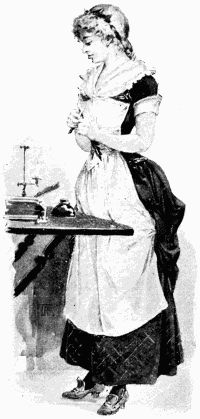
There was nothing in the materials then to help her. The letter paper
was coarse; envelopes were unknown. She would have to bring a candle
into the room in order to seal it; and a candle could only be lit by
striking a spark from the flint upon the tinder, and then igniting a
brimstone match from it,—unless she lit it at the kindled fire, which
would subject her to questions and remonstrances. Also, the quill pens
must be mended, and the ink renewed. But all these difficulties were
overcome, one by one; and the following note was intrusted to the care
of Diedrich Becker, the old man who worked in the garden and milked the
cows:
To MISTRESS COLONEL GORDON: HONOURED MADAM: My father forbids that I come to see you. He thinks you should upon my mother call. That you will judge me to be rude and ungrateful I fear very much. But that is not true. I am unhappy, indeed. I think all the day of you.
Your obedient servant,
KATHERINE VAN HEEMSKIRK.
"'The poor child," said Mrs. Gordon, when [Pg 50]she had read the few anxious sentences. "Look here, Dick;" and Dick, who was beating a tattoo upon the window-pane, turned listlessly and asked, "Pray, madam, what is it?"
"Of all earthly things, a letter from that poor child, Katherine Van Heemskirk. She has more wit than I expected. So her father won't let her come to me. Why, then, upon my word, I will go to her."
Captain Hyde was interested at once. He took the letter his aunt offered, and read it with a feeling of love and pity and resentment. "You will go to-morrow?" he asked; "and would it be beyond good breeding for me to accompany you?"
"Indeed, nephew, I think it would. But I will give your service, and say everything that is agreeable. Be patient; to-morrow morning I will call upon our fair neighbour."
The next morning was damp, for there had been heavy rain during the night; but Captain Hyde would not let his aunt forget or forego her promise. She had determined to make an unceremonious visit; and early in the day she put on her bonnet and pelisse, and walked over to the Van Heemskirks. A negro woman was polishing the brass ornaments of the door, and over its spotless threshold she passed without question or delay.
A few minutes she waited alone in the best parlour, charmed with its far off air and Eastern scents, and then Madam Van Heemskirk welcomed her. In her heart she was pleased at the visit. She thought privately that her Joris had been a little too strict. She did not really see why her beautiful daughters should not have [Pg 51]the society and admiration of the very best people in the Province. And Mrs. Gordon's praise of Katharine, and her declaration that "she was inconsolable without the dear creature's society," seemed to the fond mother the most proper and natural of feelings.
"Do but let me see her an hour, madam," she said. "You know my sincere admiration. Is not that her voice? I vow, she sings to perfection And what a singular melody! Please to set wide the door, madam."
"It is the brave song of the brave men of Zealand, when from the walls of Leyden they drove away the Spaniards;" and madam stood in the open door, and called to her daughter, "Well, then, Katharine, begin again the song of 'The Beggars of the Sea.'"
Strong, gray Beggars from Zealand we;
We are fighting for liberty:
Heave ho! rip the brown sails free!
Fed on the breath of the wild North Sea.
Beggars are kings if free they be:
Heave ho! rip the brown sails free!
'Long live the Gueux,'—the sea will provide
Graves for the enemy, deep and wide:
Heave ho! rip the brown sails free!
Beggars, 'under the Cross' we stand;
Beggars, for love of the fatherland:
Heave ho! rip the brown sails free!
What shall we give him, Beggars gray?
Give him a moment to kneel and pray:
Heave ho! rip the brown sails free!"
[Pg 52]At the second verse, Mrs. Gordon rose and said, "Indeed, madam, I find my good-breeding no match against such singing. And the tune is wonderful; it has the ring of trumpets, and the roar of the waves, in it. Pray let us go at once to your daughters."
"At work are they; but, if you mind not that, you are welcome indeed." Then she led the way to the large living, or dining, room, where Katherine stood at the table cleaning the silver flagons and cups and plates that adorned the great oak sideboard.
Joanna, who was darning some fine linen, rose and made her respects with perfect composure. She had very little liking, either for Mrs. Gordon or her nephew; and many of their ways appeared to her utterly foolish, and not devoid of sin. But Katherine trembled and blushed with pleasure and excitement, and Mrs. Gordon watched her with a certain kind of curious delight. Her hair was combed backward, plaited, and tied with a ribbon; her arms bare to the shoulders, her black bodice and crimson petticoat neatly shielded with a linen apron: and poised in one hand she held a beautiful silver flagon covered with raised figures, which with patient labour she had brought into shining relief.
"Oh," cried the visitor, "that is indeed a piece of plate worth looking at! Surely, child, it has a history,—a romance perhaps. La, there are words also upon it! Pray, madam, be so obliging as to read the inscription;" and madam, blushing with pride and pleasure, read it aloud,—
"'Hoog van Moed,
Klein van Goed,
Een zwaard in de hand:
Is 't wapen van Gelderland.'"
"Dutch, I vow! Surely, madam, it is very sonorous and emphatic; vastly different, I do assure you, from the vowelled idioms of Italy and Spain. Pray, madam, be so civil as to translate the words for me."
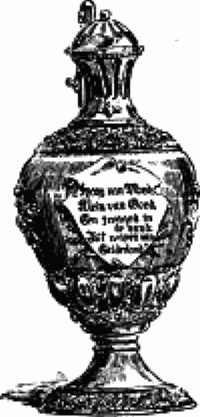
"'Of spirit great,
Of small estate,
A sword in the hand:
Such are the arms of Guelderland.'
"You must know," continued Madam Van Heemskirk, "that my husband's father had a brother, who, in a great famine in Guelderland, filled one hundred flat boats with wheat of Zealand,—in all the world it is the finest wheat, that is the truth,—and help he sent to those who were ready to perish. And when came better days, then, because their hearts were good, they gave to their preserver this flagon. Joris Van Heemskirk, my husband, sets on it great store, that is so."
Conversation in this channel was easily maintained. Madame Van Heemskirk knew the pedigree or the history of every tray or cup, and in reminiscence and story an hour passed away very pleasantly indeed. Joanna did not linger to listen. The visitor did not touch her liking or her interest; and besides, as every one knows, the work of a house must go on, no [Pg 54]matter what guest opens the door. But Katherine longed and watched and feared. Surely her friend would not go away without some private token or message for her. She turned sick at heart when she rose as if to depart. But Mrs. Gordon proved herself equal to the emergency; for, after bidding madam an effusive good-by, she turned suddenly and said, "Pray allow your daughter to show me the many ornaments in your parlour. The glimpse I had has made me very impatient to see them more particularly."
The request was one entirely in sympathy with the mood and the previous conversation, and madam was pleased to gratify it; also pleased, that, having fully satisfied the claims of social life, she could with courtesy leave her visitor's further entertainment with Katherine, and return to her regular domestic cares. To her the visit had appeared to be one of such general interest, that she never suspected any motive beneath or beyond the friendliness it implied. Yet the moment the parlour-door had been shut, Mrs. Gordon lifted Katharine's face between her palms, and said,—
"Faith, child, I am almost run off my head with all the fine things I have listened to for your sake. Do you know who sent me here?"
"I think, madam, Captain Hyde."
"Psha! Why don't you blush, and stammer, and lie about it? 'I think, madam, Captain Hyde,'" mimicking Katherine's slight Dutch accent. "'Tis to be seen, miss, that you understand a thing or two. Now, Captain Hyde wishes to see you; when can you oblige him so much?"
[Pg 55]"I know not. To come to Madam Semple's is forbidden me by my father."
"It is on my account. I protest your father is very uncivil."
"Madam, no; but it is the officers; many come and go, and he thinks it is not good for me to meet them."
"Oh, indeed, miss, it is very hard on Captain Hyde, who is more in love than is reasonable Has your father forbidden you to walk down your garden to the river-bank?"
"No, madam."
"Then, if Captain Hyde pass about two o'clock, he might see you there?"
"At two I am busy with Joanna."
"La, child! At three then?"
"Three?"
The word was a question more than an assent; but Mrs. Gordon assumed the assent, and did not allow Katharine to contradict it. "And I promised to bring him a token from you,—he was exceedingly anxious about that matter; give me the ribbon from your hair."
"Only last week Joanna bought it for me. She would surely ask me, 'Where is your new ribbon?'"
"Tell her that you lost it."
"How could I say that? It would not be true."
The girl's face was so sincere, that Mrs. Gordon found herself unable to ridicule the position. "My dear," she answered, "you are a miracle. But, among all these pretty things, is there nothing you can send?"
Katherine looked thoughtfully around. There was a small Chinese cabinet on a table: she [Pg 56]went to it, and took from a drawer a bow of orange ribbon. Holding it doubtfully in her hand, she said, "My St. Nicholas ribbon."
"La, miss, I thought you were a Calvinist! What are you talking of the saints for?"
"St. Nicholas is our saint, our own saint; and on his day we wear orange. Yes, even my father then, on his silk cap, puts an orange bow. Orange is the Dutch colour, you know, madam."
"Indeed, child, I do not know; but, if so, then it is the best colour to send to your true love."
"For the Dutch, orange always. On the great days of the kirk, my father puts blue with it. Blue is the colour of the Dutch Calvinists."
"Make me thankful to learn so much. Then when Councillor Van Heemskirk wears his blue and orange, he says to the world, 'I am a Dutchman and a Calvinist'?"
"That is the truth. For the Vaderland the Moeder-Kerk he wears their colours. The English, too, they will have their own colour!"
"La, my dear, England claims every colour! But, indeed, even an English officer may now wear an orange favour; for I remember well when our Princess Anne married the young Prince of Orange. Oh, I assure you the House of Nassau is close kin to the House of Hanover! And when English princesses marry Dutch princes, then surely English officers may marry Dutch maidens. Your bow of orange ribbon is a very proper love-knot."
"Indeed, madam, I never"—
"There, there! I can really wait no longer. Some one is already in a fever of impatience.
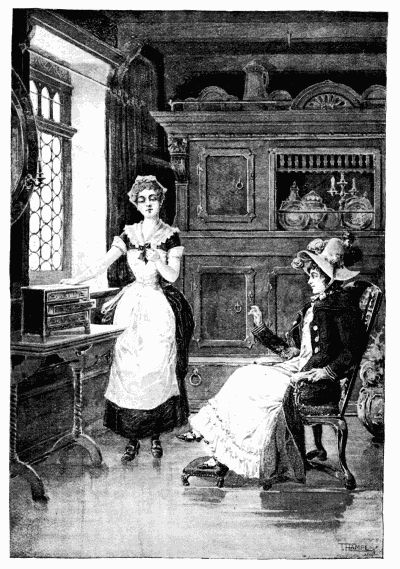
'Tis a quaintly pretty room; I am happy to have seen its curious treasures. Good-by again, child; my service once more to your mother and sister;" and so, with many compliments, she passed chatting and laughing out of the house.
Katherine closed the best parlour, and lingered a moment in the act. She felt that she had permitted Mrs. Gordon to make an appointment for her lover, and a guilty sense of disobedience made bitter the joy of expectation. For absolute truthfulness is the foundation of the Dutch character; and an act of deception was not only a sin according to Katherine's nature, but one in direct antagonism to it. As she turned away from the closed parlour, she felt quite inclined to confide everything to her sister Joanna; but Joanna, who had to finish the cleaning of the silver, was not in that kind of a temper which invites confidence; and indeed, Katherine, looking into her calm, preoccupied face, felt her manner to be a reproof and a restraint.
So she kept her own counsel, and doubted and debated the matter in her heart until the hands of the great clock were rising quickly to the hour of fate. Then she laid down her fine sewing, and said, "Mother, I want to walk in the garden. When I come back my task I will finish."
"That is well. Joanna, too, has let her work fall down to her lap. Go, both of you, and get the fine air from the river."
This was not what Katherine wished; but nothing but assent was possible, and the girls strolled slowly down the box-bordered walks to[Pg 60]gether. Madam Van Heemskirk watched them from the window for a few minutes. A smile of love and pleasure was on her fine, placid face; but she said with a sigh, as she turned away,—
"Well, well, if it is the will of God they should not rise in the world, one must be content. To the spider the web is as large as to the whale the whole wide sea; that is the truth."
Joanna was silent; she was thinking of her own love-affairs; but Katherine, doubtful of herself, thought also that her sister suspected her. When they reached the river-bank, Joanna perceived that the lilacs were in bloom, and at their root the beautiful auriculas; and she stooped low to inhale their strange, nameless, earthy perfume. At that moment a boat rowed by with two English soldiers, stopped just below them, and lay rocking on her oars. Then an officer in the stern rose and looked towards Katherine, who stood in the full sunlight with her large hat in her hand. Before she could make any sign of recognition, Joanna raised herself from the auriculas and stood beside her sister; yet in the slight interval Katherine had seen Captain Hyde fling back from his left shoulder his cloak, in order to display the bow of orange ribbon on his breast.
The presence of Joanna baffled and annoyed him; but he raised his beaver with a gallant grace, and Joanna dropped a courtesy, and then, taking Katherine's hand, turned toward home with her, saying, "That is the boat of Captain Hyde. What comes he this way for?"
"The river way is free to all, Joanna." And [Pg 61]Joanna looked sharply at her sister and remained silent.
But Katherine was merry as a bird. She chattered of this and of that, and sang snatches of songs, old and new. And all the time her heart beat out its own glad refrain, "My bow of orange ribbon, my bow of orange ribbon!" Her needle went to her thoughts, and her thoughts went to melody; for, as she worked, she sang,—
"Will you have a pink knot?
Is it blue you prize?
One is like a fresh rose,
One is like your eyes.
No, the maid of Holland,
For her own true love,
Ties the splendid orange,
Orange still above!
O oranje boven!
Orange still above.
"Will you have the white knot?
No, it is too cold.
Give me splendid orange,
Tint of flame and gold;
Rich and glowing orange,
For the heart I love;
Under, white and pink and blue;
Orange still above!
O oranje boven!
Orange still above!"
"How merry you sing, mijn Katrijntje! Like a little bird you sing. What, then, is it?"
"A pretty song made by the schoolmaster, mijn moeder. 'Oranje Boven' the name is."
"That is a good name. Your father I will remind to have it painted over the door of the summer-house."
[Pg 62]"There already are two mottoes painted,—Peaceful is my garden,' and 'Contentment is my lot.'"
"Well, then, there is always room for two more good words, is there not?" And Katherine gayly sung her answer,—
"Tie the splendid orange,
Orange still above!
O oranje boven!
Orange still above."
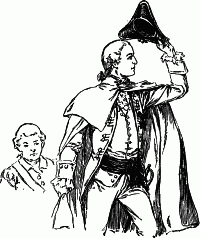
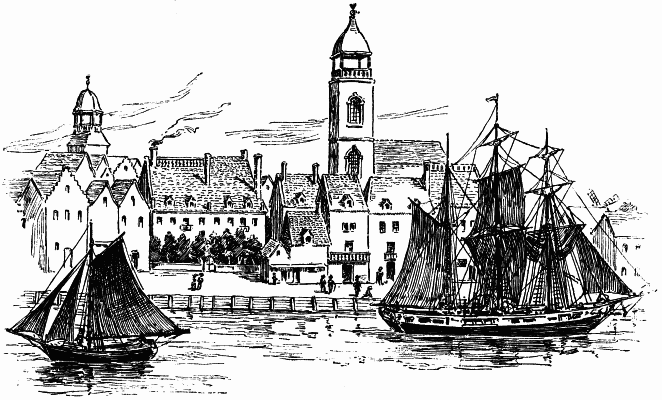
IV.
"The trifles of our daily lives,
The common things scarce worth recall,
Whereof no visible trace survives,—
These are the mainsprings, after all."
"Honoured gentleman, when will you pay me my money?"
The speaker was an old man, dressed in a black coat buttoned to the ankles, and a cap of silk and fur, from beneath which fell a fringe of gray hair. His long beard was also gray, and he leaned upon an ivory staff carved with many strange signs. The inquiry was addressed to Captain Hyde. He paid no attention whatever to it, but, gayly humming a stave of "Marlbrook," watched the crush of wagons and pedestrians, in order to find a suitable moment to cross the narrow street.
"Honoured gentleman, when will you pay me my moneys?"
The second inquiry elicited still less attention for, just as it was made, Neil Semple came out of the City Hall, and his appearance gave the captain a good excuse for ignoring the unpleasant speaker.
"Faith, Mr. Semple," he cried, "you came in an excellent time. I am for Fraunce's Tavern, and a chop and a bottle of Madeira. I shall be vastly glad of your company."
The grave young lawyer, with his hands full of troublesome-looking papers, had little of the air of a boon companion; and, indeed, the invitation was at once courteously declined.
"I have a case on in the Admiralty Court, Captain," he answered, "and so my time is not my own. It belongs, I may say, to the man who has paid me good money for it."
"Lawyer Semple?"
"Mr. Cohen, at your service, sir."
"Captain Hyde owes me one hundred guineas, with the interests, since the fifteenth day of last December. He will not hear me when I say to him, 'Pay me my moneys;' perhaps he will listen, if you speak for me."
"If you are asking my advice in the way of business, you know my office-door, Cohen; if in the way of friendship, I may as well say at once, that I never name friendship and money in the same breath. Good-day, gentlemen. I am in something of a hurry, as you may understand." Cohen bowed low in response to the civil greeting; Captain Hyde stared indignantly at the man who had presumed to couple one of his Majesty's officers with a money-lender and a Jew.
"I do not wish to make you more expenses, Captain;" and Cohen, following the impulse of his anxiety, laid his hand upon his debtor's arm. Hyde turned in a rage, and flung off the touch with a passionate oath. Then the Jew left him. There was neither anger nor impatience visible in his face or movements. He cast a glance up at the City Hall,—an involuntary appeal, perhaps, to the justice supposed to inhabit its chambers,—and then he walked slowly toward his store and home.
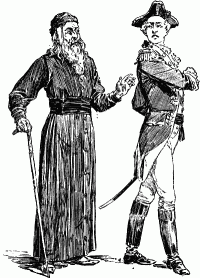
Both were under one roof,—a two-storied building in the lower part of Pearl Street, dingy and unattractive in outward appearance, but crowded in its interior with articles of beauty and worth,—Flemish paintings and rich metal work, Venetian glasses and velvets, Spanish and Moorish leather goods, silverware, watches, jewellery, etc. The window of the large room in which all was stored was dim with cobwebs, and there was no arrangement of the treasures. They were laid in the drawers of the great Dutch presses and in cabinets, or packed in boxes, or hung against the walls.
At the back of the store, there was a small sitting-room, and behind it a kitchen, built in a yard which was carefully boarded up. A narrow stair[Pg 66]way near the front of the store led to the apartments above. They were three in number. One was a kind of lumber-room; a second, Cohen's sleeping-room; and the largest, at the back of the house, belonged to the Jew's grandchild Miriam. There was one servant in the family, an old woman who had come to America with Jacob. She spoke little English, and she lived in complete seclusion in her kitchen and yard. As far as Jacob Cohen was concerned, he preserved an Oriental reticence about the women of his household; he never spoke of them, and he was never seen in their company. It was seldom they went abroad; when they did so, it was early in the morning, and usually to the small synagogue in Mill Street.
He soon recovered the calmness which had been lost during his unsatisfactory interview with Captain Hyde. "A wise man frets not himself for the folly of a fool;" and, having come to this decision, he entered his house with the invocation for its peace and prosperity on his lips. A party of three gentlemen were examining his stock: they were Governor Clinton and his friends Colden and Belcher.
"Cohen," said Clinton, "you have many fine things here; in particular, this Dutch cabinet, with heavy brass mountings. Send it to my residence. And that Venetian mirror with the silver frame will match the silver sconces you sold me at the New Year. I do not pretend to be a judge, but these things are surely extremely handsome. Pray, sir, let us see the Moorish leather that William Walton has reserved for his new house. I hear you are to [Pg 67]have the ordering of the carpets and tapestries. You will make money, Jacob Cohen."
"Your Excellency knows best. I shall make my just profits,—no more, no more."
"Yes, yes; you have many ways to make profits, I hear. All do well, too."
"When God pleases, it rains with every wind, your Excellency."
Then there was a little stir in the street,—that peculiar sense of something more than usual, which can make itself felt in the busiest thoroughfare,—and Golden went to the door and looked out. Joris Van Heemskirk was just passing, and his walk was something quicker than usual.
"Good-day to you, Councillor. Pray, sir, what is to do at the wharf? I perceive a great bustle comes thence."
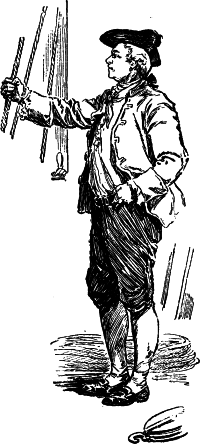
"At your service, Councillor Golden. At the wharf there is good news. The 'Great Christopher' has come to anchor,—Captain Batavius de Vries. So a good-morrow, sir;" and Joris lifted his beaver, and proceeded on his way to Murray's Wharf.
Bram was already on board. His hands were clasped across the big right shoulder of Batavius, who stood at the mainmast, giving orders about his cargo. He was a large man, with the indisputable air of a sailor from strange seas, familiar with the idea of solitude, and used to absolute authority. He loved Bram after his own fashion, but his [Pg 68]vocabulary of affectionate words was not a large one. Bram, however, understood him; he had been quite satisfied with his short and undemonstrative greeting,—
"Thee, Bram? Good! How goes it?"
The advent of Joris added a little to the enthusiasm of the meeting. Joris thoroughly liked Batavius, and their hands slipped into each other's with a mighty grasp almost spontaneously. After some necessary delay, the three men left the ship together. There was quite a crowd on the wharf. Some were attracted by curiosity; others, by the hope of a good job on the cargo; others, again, not averse to a little private bargaining for any curious or valuable goods the captain of the "Great Christopher" had for sale. Cohen was among the latter; but he had too much intelligence to interfere with a family party, especially as he heard Joris say to the crowd with a polite authority, "Make way, friends, make way. When a man is off a three-years' cruise, for a trifle he should not be stopped."
Joanna had had a message from her lover, and she was watching for his arrival. There was no secrecy in her love-affairs, and it was amid the joy and smiles of the whole household that she met her affianced husband. They were one of those loving, sensible couples, for whom it is natural to predict a placid and happy life; and the first words of Batavius seemed to assure it.
"My affairs have gone well, Joanna, as they generally do; and now I shall build the house, and we shall be married."
[Pg 69]Joanna laughed. "I shall just say a word or two, also, about that, Batavius."
"Come, come, the word or two was said so long ago. Have you got the pretty Chinese kas I sent from the ship? and the Javanese cabaya, and the sweetmeats, and the golden pins?"
"All of them I have got. Much money, Batavius, they must have cost."
"Well, well, then! There is enough left. A man does not go to the African coast for nothing. Katrijntje, mijn meisje, what's the matter now, that you never come once?"
Katherine was standing at the open window, apparently watching the honey-bees among the locust blooms, but really perceiving something far beyond them,—a boat on the river at the end of the garden. She could not have told how she knew that it was there; but she saw it, saw it through the intervening space, barred and shaded by many trees. She felt the slow drift of the resting oars, and the fascination of an eager, handsome face lifted to the lilac-bushes which hedged the bank. So the question of Batavius touched very lightly her physical consciousness. A far sweeter, a far more peremptory voice called her; but she answered,—
"There is nothing the matter, Batavius. I am well, I am happy. And now I will go into the garden to make me a fine nosegay."
"Three times this week, into the garden you have gone to get a nosegay; and then all about it you forget. It will be better to listen to Batavius, I think. He will tell us of the strange countries where he has been, and of the strange men and women."
[Pg 70]"For you, Joanna, that will be pleasant; but"—
"For you also. To listen to Batavius is to learn something."
"Well, that is the truth. But to me all this talk is not very interesting. I will go into the garden;" and she walked slowly out of the door, and stopped or stooped at every flower-bed, while Joanna watched her.
"The child is now a woman. It will be a lover next, Joanna."
"There is a lover already; but to anything he says, Katrijntje listens not. It is at her father's knee she sits, not at the lover's."
"It will be Rem Verplanck? And what will come of it?"
"No, it is Neil Semple. To-night you will see. He comes in and talks of the Assembly and the governor, and of many things of great moment. But it is Katherine for all that. A girl has not been in love four years for nothing. I can see, too, that my father looks sad, and my mother says neither yes nor no in the matter."
"The Semples are good business managers. They are also rich, and they approve of good morals and the true religion. Be content, Joanna. Many roads lead to happiness beside the road we take. Now, let us talk of our own affairs."
It was at this moment that Katherine turned to observe if she were watched. No: Batavius and Joanna had gone away from the window, and for a little while she would not be missed.
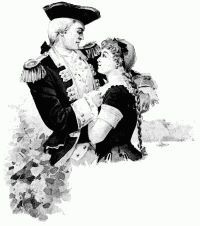
She ran rapidly to the end of the garden, and, parting the lilac-bushes, stood flushed and panting on the river-bank. There was a stir of oars below her. It was precisely as she had known it would be. Captain Hyde's pretty craft shot into sight, and a few strokes put it at the landing-stair. In a moment he was at her side. He took her in his arms; and, in spite of the small hands covering her blushing face, he kissed her with passionate affection.
"My darling, my charmer," he said, "how you have tortured me! By my soul, I have been almost distracted. Pray, now let me see thy lovely face." He lifted it in his hands and kissed it again,—kissed the rosy cheeks, and white dropped eyelids, and red smiling mouth; vowed with every kiss that she was the [Pg 72]most adorable of women, and protested, "on his honour as a soldier," that he would make her his wife, or die a bachelor for her sake.
And who can blame a young girl if she listens and believes, when listening and believing mean to her perfect happiness? Not women who have ever stood, trembling with love and joy, close to the dear one's heart. If they be gray-haired, and on the very shoal of life, they must remember still those moments of delight,—the little lane, the fire-lit room, the drifting boat, that is linked with them. If they be young and lovely, and have but to say, "It was yesterday," or, "It was last week," still better they will understand the temptation that was too great for Katherine to overcome.
And, as yet, nothing definite had been said to her about Neil Semple, and the arrangement made for her future. Joris had intended every day to tell her, and every day his heart had failed him. He felt as if the entire acceptance of the position would be giving his little daughter away. As long as she was not formally betrothed, she was all his own; and Neil could not use that objectionable word "my" in regard to her. Lysbet was still more averse to a decisive step. She had had "dreams" and "presentiments" of unusual honour for Katherine, which she kept with a superstitious reverence in her memory; and the girl's great beauty and winning manners had fed this latent expectancy. But to see her the wife of Neil Semple did not seem to be any realization of her ambitious hopes. She had known Neil all his life; and she could not help feeling, that, if Katherine's fortune lay with him, her loving dreams [Pg 73]were all illusions and doomed to disappointment.
Besides, with a natural contradiction, she was a little angry at Neil's behaviour. He had been coming to their house constantly for a month at least; every opportunity of speaking to Katherine on his own behalf had been given him, and he had not spoken. He was too indifferent, or he was too confident; and either feeling she resented. But she judged Neil wrongly. He was an exceedingly cautious young man; and he felt what the mother could not perceive,—a certain atmosphere about the charming girl which was a continual repression to him. In the end, he determined to win her, win her entirely, heart and hand; therefore he did not wish to embarrass his subsequent wooing by having to surmount at the outset the barrier of a premature "no." And, as yet, his jealousy of Captain Hyde was superficial and intermitting; it had not entered his mind that an English officer could possibly be an actual rival to him. They were all of them notoriously light of love, and the Colonial beauties treated their homage with as light a belief; only it angered and pained him that Katherine should suffer herself to be made the pastime of Hyde's idle hours.
On the night of De Vries' return, there was a great gathering at Van Heemskirk's house. No formal invitations were given, but all the friends of the family understood that it would be so. Joris kept on his coat and ruffles and fine cravat, Batavius wore his blue broadcloth and gilt buttons, and Lysbet and her daughters were in their kirk dresses of silk and camblet. [Pg 74]It was an exquisite summer evening, and the windows looking into the garden were all open; so also was the door; and long before sunset the stoop was full of neighbourly men, smoking with Joris and Batavius, and discussing Colonial and commercial affairs.
In the living-room and the best parlour their wives were gathered,—women with finely rounded forms, very handsomely clothed, and all busily employed in the discussion of subjects of the greatest interest to them. For Joanna's marriage was now to be freely talked over,—the house Batavius was going to build described, the linen and clothing she had prepared examined, and the numerous and rich presents her lover had brought her wondered over, and commented upon.
Conspicuous in the happy chattering company, Lysbet Van Heemskirk bustled about, in the very whitest and stiffest of lace caps; making a suggestion, giving an opinion, scolding a careless servant, putting out upon the sideboard Hollands, Geneva, and other strong waters, and ordering in from the kitchen hot chocolate and cakes of all kinds for the women of the company. Very soon after sundown, Elder Semple and madam his wife arrived; and the elder, as usual, made a decided stir among the group which he joined.
"No, no, Councillor," he said, in answer to the invitation of Joris to come outside. "No, no, I'll not risk my health, maybe my vera life, oot on the stoop after sunset. 'Warm,' do you say? Vera warm, and all the waur for being warm. My medical man thinks I hae a tendency to fever, and there's four-fourths o' fever [Pg 75]in every inch o' river mist that a man breathes these warm nights."
"Well, then, neighbours, we'll go inside," said Joris. "Clean pipes, and a snowball, or a glass of Holland, will not, I think, be amiss."
The movement was made among some jokes and laughter; and they gathered near the hearthstone, where, in front of the unlit hickory logs, stood a tall blue jar filled with feathery branches of fennel and asparagus. But, as the jar of Virginia was passed round, Lysbet looked at Dinorah, and Dinorah went to the door and called, "Baltus;" and in a minute or two a little black boy entered with some hot coals on a brass chafing-dish, and the fire was as solemnly and silently passed round as if it were some occult religious ceremony.
The conversation interrupted by Semples entrance was not resumed.
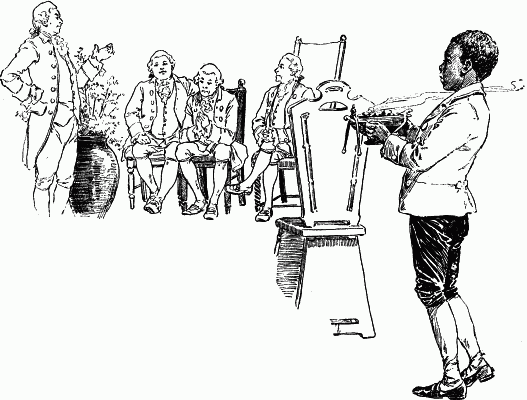
It had been one dealing out unsparing and scornful disapproval of Governor Clinton's financial methods, and Clinton was known to be a personal friend of Semple's. [Pg 76]But the elder would perhaps hardly have appreciated the consideration, if he had divined it; for he dearly loved an argument, and had no objections to fight for his own side single-handed. In fact, it was so natural for him to be "in opposition," that he could not bear to join the general congratulation to De Vries on his fortunate voyage.
"You were lang awa', Captain," was his opening speech. "It would tak' a deal o' gude fortune to mak' it worth your while to knock around the high seas for three years or mair."
"Well, look now, Elder, I didn't come home with empty hands. I have always been apt to get into the place where gold and good bargains were going."
"Hum-m-m! You sailed for Rotterdam, I think?"
"That is true; from Rotterdam I went to Batavia, and then to the coast of Africa. The African cargo took me to the West Indies. From Kingston it was easy to St. Thomas and Surinam for cotton, and then to Curaçoa for dyeing-woods and spices. The 'Great Christopher' took luck with her. Every cargo was a good cargo."
"I'll no be certain o' that, Captain. I would hae some scruples mysel' anent buying and selling men and women o' any colour. We hae no quotations from the other world, and it may be the Almighty holds his black men at as high a figure as his white men. I'm just speculating, you ken. I hae a son—my third son, Alexander Semple, o' Boston—wha has made money on the Africans. I hae told him, likewise, [Pg 77]that trading in wheat and trading in humanity may hae ethical differences; but every one settles his ain bill, and I'll hae enough to do to secure mysel'."
Batavius was puzzled; and at the words "ethical differences," his big brown hand was "in the hair" at once. He scratched his head and looked doubtfully at Semple, whose face was peculiarly placid and thoughtful and kindly.
"Men must work, Elder, and these blacks won't work unless they are forced to. I, who am a baptized Christian, have to do my duty in this life; and, as for pagans, they must be made to do it. I am myself a great lover of morality, and that is what I think. Also, you may read in the Scriptures, that St. Paul says that if a man will not work, neither shall he eat."
"St. Paul dootless kent a' about the question o' forced labour, seeing that he lived when baith white and black men were sold for a price. However, siller in the hand answers a' questions and the dominie made a vera true observe one Sabbath, when he said that the Almighty so ordered things in this warld that orthodoxy and good living led to wealth and prosperity."
"That is the truth," answered Justice Van Gaasbeeck; "Holland is Holland because she has the true faith. You may see that in France there is anarchy and bloodshed and great poverty; that is because they are Roman Catholics."
It was at this moment that Katherine came and stood behind her father's chair. She let [Pg 78]her hand fall down over his shoulder, and he raised his own to clasp it. "What is it, then, mijn Katrijntje kleintje?"
"It is to dance. Mother says 'yes' if thou art willing."
"Then I say 'yes,' also."
For a moment she laid her cheek against his; and the happy tears came into his eyes, and he stroked her face, and half-reluctantly let Batavius lead her away. For, at the first mention of a dance, Batavius had risen and put down his pipe; and in a few minutes he was triumphantly guiding Joanna in a kind of mazy waltzing movement, full of spirit and grace.
At that day there were but few families of any wealth who did not own one black man who could play well upon the violin. Joris possessed two; and they were both on hand, putting their own gay spirits into the fiddle and the bow. And oh, how happy were the beating feet and the beating hearts that went to the stirring strains! It was joy and love and youth in melodious motion. The old looked on with gleaming, sympathetic eyes; the young forgot that they were mortal.
Then there was a short pause; and the ladies sipped chocolate, and the gentlemen sipped something a little stronger, and a merry ripple of conversation and of hearty laughter ran with the clink of glass and china, and the scraping of the fiddle-bows.
"Miss Katern Van Heemskirk and Mr. Neil Semple will now hab de honour of 'bliging de company wid de French minuet."
At this announcement, made by the first negro violin, there was a sudden silence; and [Pg 79]Neil rose, and with a low bow offered the tips of his fingers to the beautiful girl, who rose blushing to take them. The elder deliberately turned his chair around, in order to watch the movement comfortably; and there was an inexpressible smile of satisfaction on his face as his eyes followed the young people. Neil's dark, stately beauty was well set off by his black velvet suit and powdered hair and gold buckles. And no lovelier contrast could have faced him than Katherine Van Heemskirk; so delicately fresh, so radiantly fair, she looked in her light-blue robe and white lace stomacher, with a pink rose at her breast. There were shining amber beads around her white throat, and a large amber comb fastened her pale brown hair. A gilded Indian fan was in her hand, and she used it with all the pretty airs she had so aptly copied from Mrs. Gordon.
Neil had a natural majesty in his carriage; Katherine supplemented it with a natural grace, and with certain courtly movements which made the little Dutch girls, who had never seen Mrs. Gordon practising them, admire and wonder. As she was in the very act of making Neil a profound courtesy, the door opened, and Mrs. Gordon and Captain Hyde entered. The latter took in the exquisite picture in a moment; and there was a fire of jealousy in his heart when he saw Neil lead his partner to her seat, and with the deepest respect kiss her pretty fingers ere he resigned them.
But he was compelled to control himself, as he was ceremoniously introduced to Councillor and Madam Van Heemskirk by his aunt, who, with a charming effusiveness, declared "she [Pg 80]was very uneasy to intrude so far; but, in faith, Councillor," she pleaded, "I am but a woman, and I find the news of a wedding beyond my nature to resist."
There was something so frank and persuasive about the elegant stranger, that Joris could not refuse the courtesy she asked for herself and her nephew. And, having yielded, he yielded with entire truth and confidence. He gave his hand to his visitors, and made them heartily welcome to join in his household rejoicing. True, Mrs. Gordon's persuasive words were ably seconded by causes which she had probably calculated. The elder and Madam Semple were present, and it would have been impossible for Joris to treat their friends rudely. Bram was also another conciliating element, for Captain Hyde was on pleasant speaking terms with him; and, as yet, even Neil's relations were at least those of presumed friendship. Also, the Van Gaasbeeks and others present were well inclined to make the acquaintance of a woman so agreeable, and an officer so exceptionally handsome and genteel. Besides which, Joris was himself in a happy and genial mood; he had opened his house and his heart to his friends; and he did not feel at that hour as if he could doubt any human being, or close his door against even the stranger and the alien who wished to rejoice with him.
Elder Semple was greatly pleased at his friend's complaisance. He gave Joris full credit for his victory over his national prejudices, and he did his very best to make the concession a pleasant event. In this effort, he was greatly assisted by Mrs. Gordon; she set [Pg 81]herself to charm Van Heemskirk, as she had set herself to charm Madam Van Heemskirk on her previous visit; and she succeeded so well, that, when "Sir Roger de Coverley" was called, Joris rose, offered her his hand, and, to the delight of every one present, led the dance with her.
It was a little triumph for the elder; and he sat smiling, and twirling his fingers, and thoroughly enjoying the event. Indeed, he was so interested in listening to the clever way in which "the bonnie woman flattered Van Heemskirk," that he was quite oblivious of the gathering wrath in his son's face, and the watchful gloom in Bram's eyes, as the two men stood together, jealously observant of Captain Hyde's attentions to Katherine. Without any words spoken on the subject, there was an understood compact between them to guard the girl from any private conversation with him; and yet two men with hearts full of suspicion and jealousy were not a match for one man with a heart full of love. In a moment, in the interchange of their hands in a dance, Katherine clasped tightly a little note, and unobserved hid it behind the rose at her breast.
But nothing is a wonder in love, or else it would have been amazing that Joanna did not notice the rose absent from her sister's dress after Captain Hyde's departure; nor yet that Katherine, ere she went to rest that night, kissed fervently a tiny bit of paper which she hid within the silver clasps of her Kirk Bible. The loving girl thought it no wrong to put it there; she even hoped that some kind of blessing or sanction might come through such [Pg 82]sacred keeping; and she went to sleep whispering to herself,—"Happy I am. Me he loves; me he loves; me only he loves; me forever he loves!"

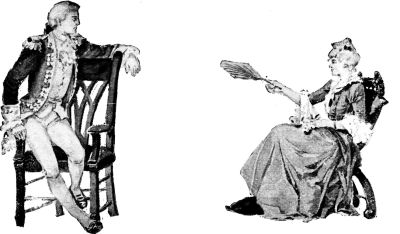
V.
"All pleasure must be bought at the price of pain. The true pay the price before they enjoy it; the false, after they enjoy it."
"My dear Dick, I am exceedingly concerned to find you in such a taking,—a soldier who has known some of the finest women of the day, moping about a Dutch school-girl! Pshaw! Don't be a fool! I had a much better opinion of you."
"'Tis a kind of folly that runs in the family, aunt. I have heard that you preferred Colonel Gordon to a duke."
"Now, sir, you are ill-natured. Dukes are not uncommon: a man of sense and sensibility is a treasure. Make me grateful that I secured one."
"Lend me your wit, then, for the same consummation. I assure you that I consider Katherine Van Heemskirk a treasure past belief. Confess, now, that she was the loveliest of creatures last night."
[Pg 84]"She has truly a fine complexion, and she dances with all the elegance imaginable. I know, too, that she sings to perfection, and has most agreeable and obliging manners."
"And a heart which abounds in every tender feeling."
"Oh, indeed, sir! I was not aware that you knew her so well."
"I know that I love her beyond everything, and that I am likely so to love her all my life."
"Upon my word, Dick, love may live an age—if you don't marry it."
"Let me make you understand that I wish to marry it."
"Oh, indeed, sir! Then the church door stands open. Go in. I suppose the lady will oblige you so far."
"Pray, my dear aunt, talk sensibly. Give me your advice; you know already that I value it. What is the first step to be taken?"
"Go and talk with her father. I assure you, no real progress can be made without it. The girl you think worth asking for; but it is very necessary for you to know what fortune goes with her beauty."
"If her father refuse to give her to me"—
"That is not to be thought of. I have seen that some of the best of these Dutch families are very willing to be friendly with us. You come of a noble race. You wear your sword with honour. You are not far from the heritage of a great title and estate. If you ask for her fortune, you offer far above its equivalent, sir."
"I have heard Mr. Neil Semple say that Van Heemskirk is a great stickler for trade, [Pg 85]and that he hates every man who wears a sword."
"You have heard more than you need listen to. I talked to the man an hour last night. He is as honest as a looking-glass, and I read him all through with the greatest ease. I am sure that he has a heart very tender, and devoid of anger or prejudice of any kind."
"That is to be seen. I have discovered already that men who can be very gentle can also be very rough. But this suspense is intolerable, and not to be borne. I will go and end it. Pray, what is the hour?"
"It is about three o'clock; a very suitable hour, I think."
"Then give me your good wishes."
"I shall be impatient to hear the result."
"In an hour or two."
"Oh, sir, I am not so foolish as to expect you in an hour or two! When you have spoken with the father, you will doubtless go home with him and drink a dish of tea with your divinity. I can imagine your unreasonable felicity, Dick,—seas of milk, and ships of amber, and all sails set for the desired haven! I know it all, so I hope you will spare me every detail,—except, indeed, such as relate to pounds, shillings, and pence."
It was a very hot afternoon; and Van Heemskirk's store, though open to the river-breezes, was not by any means a cool or pleasant place. Bram was just within the doors, marking "Boston" on a number of flour-barrels, which were being rapidly transferred to a vessel lying at the wharf. He was absorbed and hurried in the matter, and received the visitor with rather [Pg 86]a cool courtesy; but whether the coolness was of intention or preoccupation, Captain Hyde did not perceive it. He asked for Councillor Van Heemskirk, and was taken to his office, a small room, intensely warm and sunny at that hour of the day.
"Your servant, Captain."
"Yours, most sincerely, Councillor. It is a hot day."
"That is so. We come near to midsummer. Is there anything I can oblige you in, sir?"
Joris asked the question because the manner of the young man struck him as uneasy and constrained; and he thought, "Perhaps he has come to borrow money." It was notorious that his Majesty's officers gambled, and were often in very great need of it; and, although Joris had not any intention of risking his gold, he thought it as well to bring out the question, and have the refusal understood before unnecessary politeness made it more difficult. He was not, therefore, astonished when Captain Hyde answered,—
"Sir, you can indeed oblige me, and that in a matter of the greatest moment."
"If money it be, Captain, at once I may tell you, that I borrow not, and I lend not."
"Sir, it is not money—in particular."
"So?"
"It is your daughter Katherine."
Then Joris stood up, and looked steadily at the suitor. His large, amiable face had become in a moment hard and stern; and the light in his eyes was like the cold, sharp light that falls from drawn steel.
[Pg 87]"My daughter is not for you to name. Sir, it is a wrong to her, if you speak her name."
"By my honour, it is not! Though I come of as good family as any in England, and may not unreasonably hope to inherit its earldom, I do assure you, sir, I sue as humbly for your daughter's hand as if she were a princess."
"Your family! Talk not of it. King nor kaiser do I count better men than my own fore-goers. Like to like, that is what I say. Your wife seek, Captain, among your own women."
"I protest that I love your daughter. I wish above all things to make her my wife."
"Many things men desire, that they come not near to. My daughter is to another man promised."
"Look you, Councillor, that would be monstrous. Your daughter loves me."
Joris turned white to the lips. "It is not the truth," he answered in a slow, husky voice.
"By the sun in heaven, it is the truth! Ask her."
"Then a great scoundrel are you, unfit with honest men to talk. Ho! Yes, your sword pull from its scabbard. Strike. To the heart strike me. Less wicked would be the deed than the thing you have done."
"In faith, sir, 'tis no crime to win a woman's love."
"No crime it would be to take the guilders from my purse, if my consent was to it. But into my house to come, and while warm was yet my welcome, with my bread and wine in your lips, to take my gold, a shame and a crime would be. My daughter than gold is far more precious."
[Pg 88]There was something very impressive in the angry sorrow of Joris. It partook of his own magnitude. Standing in front of him, it was impossible for Captain Hyde not to be sensible of the difference between his own slight, nervous frame, and the fair, strong massiveness of Van Heemskirk; and, in a dim way, he comprehended that this physical difference was only the outward and visible sign of a mental and moral one quite as positive and unchangeable.
Yet he persevered in his solicitation. With a slight impatience of manner he said, "Do but hear me, sir. I have done nothing contrary to the custom of people in my condition, and I assure you that with all my soul I love your daughter."
"Love! So talk you. You see a girl beautiful, sweet, and innocent. Your heart, greedy and covetous, wants her as it has wanted, doubtless, many others. For yourself only you seek her. And what is it you ask then! That she should give up for you her father, mother, home, her own faith, her own people, her own country,—the poor little one!—for a cold, cheerless land among strangers, alone in the sorrows and pains that to all women come. Love! In God's name, what know you of love?"
"No man can love her better."
"What say you? How, then, do I love her? I who carried her—mijn witte lammetje—in these arms before yet she could say to me, 'Fader'!" His wrath had been steadily growing, in spite of the mist in his eyes and the tenderness in his voice; and suddenly striking the desk a ponderous blow with his closed hand, he said with an unmistakable passion, "My daughter you shall not have. God in heaven to himself take her ere such sorrow come to her and me!"
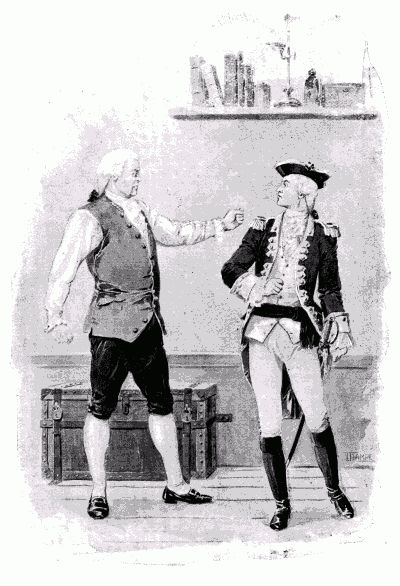
"Sir, you are very uncivil; but I am thankful to know so much of your mind. And, to be plain with you, I am determined to marry your daughter if I can compass the matter in any way. It is now, then, open war between us; and so, sir, your servant."
"Stay. To me listen. Not one guilder will I give to my daughter, if"—
"To the devil with your guilders! Dirty money made in dirty traffic"—
"You lie!"
"Sir, you take an infamous advantage. You know, that, being Katherine's father, I will not challenge you."
"Christus!!" roared Joris, "challenge me one hundred times. A fool I would be to answer you. Life my God gave to me. Well, then, only my God shall from me take it. See you these arms and hands? In them you will be as the child of one year. Ere beyond my reason you move me, go!" and he strode to the door and flung it open with a passion that made every one in the store straighten themselves, and look curiously toward the two men.
White with rage, and with his hand upon his sword-hilt, Captain Hyde stamped his way through the crowded store to the dusty street. Then it struck him that he had not asked the name of the man to whom Katharine was promised. He swore at himself for the omis[Pg 92]sion. Whether he knew him or not, he was determined to fight him. In the meantime, the most practical revenge was to try and see Katherine before her father had the opportunity to give her any orders regarding him. Just then he met Neil Semple, and he stopped and asked him the time.
"It will be the half hour after four, Captain. I am going home; shall I have your company, sir?"
"I have not much leisure to-night. Make a thousand regrets to Madam Semple and my aunt for me."
Neil's calm, complacent gravity was unendurable. He turned from him abruptly, and, muttering passionate exclamations, went to the river-bank for a boat. Often he had seen Katherine between five and six o'clock at the foot of the Van Heemskirk garden; for it was then possible for her to slip away while madam was busy about her house, and Joanna and Batavius talking over their own affairs. And this evening he felt that the very intensity of his desire must surely bring her to their trysting-place behind the lilac hedge.
Whether he was right or wrong, he did not consider; for he was not one of those potent men who have themselves in their own power. Nor had it ever entered his mind that "love's strength standeth in love's sacrifice," or that the only love worthy of the name refuses to blend with anything that is low or vindictive or clandestine. And, even if he had not loved Katherine, he would now have been determined to marry her. Never before in all his life had he found an object so engrossing. Pride and re[Pg 93]venge were added to love, as motives; but who will say that love was purer or stronger or sweeter for them?
In the meantime Joris was suffering as only such deep natures can suffer. There are domestic fatalities which the wisest and tenderest of parents seem impotent to contend with. Joris had certainly been alarmed by Semple's warning; but in forbidding his daughter to visit Mrs. Gordon, and in permitting the suit of Neil Semple, he thought he had assured her safety. Through all the past weeks, he had seen no shadow on her face. The fear had died out, and the hope had been slowly growing; so that Captain Hyde's proposal, and his positive assertion that Katherine loved him, had fallen upon the father's heart with the force of a blow, and the terror of a shock. And the sting of the sorrow was this,—that his child had deceived him. Certainly she had not spoken false words, but truth can be outraged by silence quite as cruelly as by speech.
After Hyde's departure, he shut the door of his office, walked to the window, and stood there some minutes, clasping and unclasping his large hands, like a man full of grief and perplexity. Ere long he remembered his friend Semple. This trouble concerned him also, for Captain Hyde was in a manner his guest; and, if he were informed of the marriage arranged between Katherine and Neil Semple, he would doubtless feel himself bound in honour to retire. Elder Semple had opened his house to Colonel Gordon, his wife and nephew. For months they had lived in comfort under his roof, and been made heartily welcome to the best of all he [Pg 94]possessed. Joris put himself in Hyde's place; and he was certain, that, under the same circumstances, he would feel it disgraceful to interfere with the love-affairs of his host's son.
He found Semple with his hat in his hand, giving his last orders before leaving business for the day; but when Joris said, "There is trouble, and your advice I want," he returned with him to the back of the store, where, through half-opened shutters, the sunshine and the river-breeze stole into an atmosphere laden with the aromas of tea and coffee and West Indian produce.
In a few short, strong sentences, Joris put the case before Semple. The latter stroked his right knee thoughtfully, and listened. But his first words were not very comforting: "I must say, that it is maistly your own fault, Joris. You hae given Neil but a half welcome, and you should hae made a' things plain and positive to Katherine. Such skimble-skamble, yea and nay kind o' ways willna do wi' women. Why didna you say to her, out and out, 'I hae promised you to Neil Semple, my lassie. He'll mak' you the best o' husbands; you'll marry him at the New Year, and you'll get gold and plenishing and a' things suitable'?"
"So young she is yet, Elder."
"She has been o'er auld for you, Joris. Young! My certie! When girls are auld enough for a lover, they are a match for any gray head. I'm a thankfu' man that I wasna put in charge o' any o' them. You and your household will hae to keep your e'en weel open, or there will be a wedding to which nane o' us [Pg 95]will get an invite. But there is little good in mair words. Hame is the place we are baith needed in. I shall hae to speak my mind to Neil, and likewise to Colonel Gordon; and you canna put off your duty to your daughter an hour longer. Dear me! To think, Joris, o' a man being able to sit wi' the councillors o' the nation, and yet no match for a lassie o' seventeen!"
There are men who can talk their troubles away: Joris was not one of them. He was silent when in sorrow or perplexity; silent, and ever looking around for something to do in the matter. As they walked homewards, the elder talked, and Joris pondered, not what was said, but the thoughts and purposes that were slowly forming in his own mind. He was later than usual, and the tea and the cakes had passed their prime condition; but, when Lysbet saw the trouble in his eyes, she thought them not worth mentioning. Joanna and Batavius were discussing their new house then building on the East River bank, and they had forgotten all else. But Katherine fretted about her father's delay, and it was at her Joris first looked. The veil had now been taken from his eyes; and he noticed her pretty dress, her restless glances at the clock, her ill-concealed impatience at the slow movement of the evening meal.
When it was over, Joanna and Batavius went out to walk, and Madame Van Heemskirk rose to put away her silver and china. "So warm as it is!" said Katherine. "Into the garden I am going, mother."
[Pg 96]"Well, then, there are currants to pull. The dish take with you."
Joris rose then, and laying his hand on Katherine's shoulder said, "There is something to talk about. Sit down, Lysbet; the door shut close, and listen to me."
It was impossible to mistake the stern purpose on her husband's face, and Lysbet silently obeyed the order.
"Katherine, Katrijntje, mijn kind, this afternoon there comes to the store the young man, Captain Hyde. To thy father he said many ill words. To him thou shalt never speak again. Thy promise give to me."
She sat silent, with dropped eyes, and cheeks as red as the pomegranate flower at her breast.
"Mijn kind, speak to me."
"O wee, O wee!"
"Mijn kind, speak to me."
Weeping bitterly, she rose and went to her mother, and laid her head upon Lysbet's shoulder.
"Look now, Joris. One must know the 'why' and the 'wherefore.' What mean you? Whish, mijn kindje!"
"This I mean, Lysbet. No more meetings with the Englishman will I have. No love secrets will I bear. Danger is with them; yes, and sin too."
"Joris, if he has spoken to you, then where is the secret?"
"Too late he spoke. When worked was his own selfish way, to tell me of his triumph he comes. It is a shameful wrong. Forgive it? No, I will not,—never!"
No one answered him; only Katherine's [Pg 97]low weeping broke the silence, and for a few moments Joris paced the room sorrowful and amazed. Then he looked at Lysbet, and she rose and gave her place to him. He put his arms around his darling, and kissed her fondly.
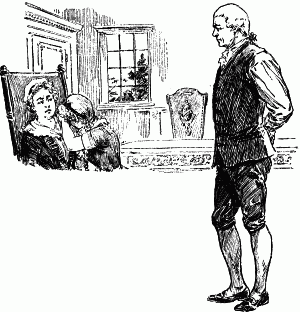
"Mijn kindje, listen to me thy father. It is for thy happy life here, it is for thy eternal life, I speak to thee. This man for whom thou art now weeping is not good for thee. He is not of thy faith, he is a Lutheran; not of thy people, he is an Englishman; not of thy station, he talks of his nobility; a gambler also, a man of fashion, of loose talk, of principles still more loose. If with the hawk a singing-bird might mate happily, then this English soldier thou might safely marry. Mijn beste kindje, do I love thee?"
"My father!"
"Do I love thee?"
"Yes, yes."
"Dost thou, then, love me?"
She put her arms round his neck, and laid her cheek against his, and kissed him many times.
"Wilt thou go away and leave me, and leave thy mother, in our old age? My heart thou would break. My gray hairs to the grave would go in sorrow. Katrijntje, my dear, dear [Pg 98]child, what for me, and for thy mother, wilt thou do?"
"Thy wish—if I can."
Then he told her of the provision made for her future. He reminded her of Neil's long affection, and of her satisfaction with it until Hyde had wooed her from her love and her duty. And, remembering the elder's reproach on his want of explicitness, he added, "To-morrow, about thy own house, I will take the first step. Near my house it shall be; and when I walk in my garden, in thy garden I will see thee, and only a little fence shall be between us. And at the feast of St. Nicholas thou shalt be married; for then thy sisters will be here, thy sisters Anna and Cornelia. And money, plenty of money, I will give thee; and all that is proper thy mother and thee shall buy. But no more, no more at all, shalt thou see or speak to that bad man who has so beguiled thee."
At this remark Katherine sadly shook her head; and Lysbet's face so plainly expressed caution, that Joris somewhat modified his last order, "That is, little one, no more until the feast of St. Nicholas. Then thou wilt be married and then it is good, if it is safe, to forgive all wrongs, and to begin again with all the world in peace and good living. Wilt thou these things promise me? me and thy mother?"
"Richard I must see once more. That is what I ask."
"Richard! So far is it?"
She did not answer; and Joris rose, and looked at the girl's mother inquiringly. Her face expressed assent; and he said reluctantly, [Pg 99]"Well, then, I will as easy make it as I can. Once more, and for one hour, thou may see him. But I lay it on thee to tell him the truth, for this and for all other time."
"Now may I go? He is a-nigh. His boat I hear at the landing;" and she stood up, intent, listening, with her fair head lifted, and her wet eyes fixed on the distance.
"Well, be it so. Go."
With the words she slipped from the room; and Joris called Baltus to bring him some hot coals, and began to fill his pipe. As he did so, he watched Lysbet with some anxiety. She had offered him no sympathy, she evinced no disposition to continue the conversation; and, though she kept her face from him, he understood that all her movements expressed a rebellious temper. In and out of the room she passed, very busy about her own affairs, and apparently indifferent to his anxiety and sorrow.
At first Joris felt some natural anger at her attitude; but, as the Virginia calmed and soothed him, he remembered that he had told her nothing of his interview with Hyde, and that she might be feeling and reasoning from a different standpoint from himself. Then the sweetness of his nature was at once in the ascendant, and he said, "Lysbet, come then, and talk with me about the child."
She turned the keys in her press slowly, and stood by it with them in her hand. "What has been told thee, Joris, to-day? And who has spoken? Tongues evil and envious, I am sure of that."
"Thou art wrong. The young man to me [Pg 100]spoke himself. He said, 'I love your daughter. I want to marry her.'"
"Well, then, he did no wrong. And as for Katrijntje, it is in nature that a young girl should want a lover. It is in nature she should choose the one she likes best. That is what I say."
"That is what I say, Lysbet. It is in nature, also, that we want too much food and wine, too much sleep, too much pleasure, too little work. It is in nature that our own way we want. It is in nature that the good we hate, and the sin we love. My Lysbet, to us God gives his own good grace, that the things that are in nature we might put below the reason and the will."
"So hard that is, Joris."
"No, it is not; so far thou hast done the right way. When Katherine was a babe, it was in nature that with the fire she wanted to make play. But thou said, 'There is danger, my precious one;' and in thy arms thou carried her out of the temptation. When older she grew, it was in nature she said, 'I like not the school, and my Heidelberg is hard, and I cannot learn it.' But thou answered, 'For thy good is the school, and go thou every day; and for thy salvation is thy catechism, and I will see that thou learn it well.' Now, then, it is in nature the child should want this handsome stranger; but with me thou wilt certainly say, 'He is not fit for thy happiness; he has not the true faith, he gambles, he fights duels, he is a waster, he lives badly, he will take thee far from thy own people and thy own home.'"
"Can the man help that he was born an Englishman and a Lutheran?"
"They have their own women. Look now, from the beginning it has been like to like. Thou may see in the Holy Scriptures that, after Esau married the Hittite woman, he sold his birthright, and became a wanderer and a vagabond. And it is said that it was a 'grief of mind unto Isaac and Rebekah.' I am sorry this day for Isaac and Rebekah. The heart of the father is the same always."
"And the heart of the mother, also, Joris." She drew close to him, and laid her arm across his broad shoulders; and he took his pipe from his lips and turned his face to her. "Kind and wise art thou, my husband; and whatever is thy wish, that is my wish too."
"A good woman thou art. And what pleasure would it be to thee if Katherine was a countess, and went to the court, and bowed down to the king and the queen? Thou would not see it; and, if thou spoke of it, thy neighbours they would hate thee, and mock thee behind thy back, and say, 'How proud is Lysbet Van Heemskirk of her noble son-in-law that comes never once to see her!' And dost thou believe he is an earl? Not I."
"That is where the mother's love is best, Joris. What my neighbours said would be little care to me, if my Katherine was well and was happy. With her sorrow would I buy my own pleasure? No; I would not so selfish be."
"Would I, Lysbet? Right am I, and I know I am right. And I think that Neil Semple will be a very great person. Already, as a man of affairs, he is much spoken of. He is handsome [Pg 102]and of good morality. The elders in the kirk look to such young men as Neil to fill their places when they are no more in them. On the judge's bench he will sit down yet."
"A good young man he may be, but he is a very bad lover; that is the truth. If a little less wise he could only be! A young girl likes some foolish talk. It is what women understand. Little fond words, very strong they are! Thou thyself said them to me."
"That is right. To Neil I will talk a little. A man must seek a good wife with more heart than he seeks gold. Yes, yes; her price above rubies is."
At the very moment Joris made this remark, the elder was speaking for him. When he arrived at home, he found that his wife was out making calls with Mrs. Gordon, so he had not the relief of a marital conversation. He took his solitary tea, and fell into a nap, from which he awoke in a querulous, uneasy temper. Neil was walking about the terrace, and he joined him.
"You are stepping in a vera majestic way, Neil; what's in your thoughts, I wonder?"
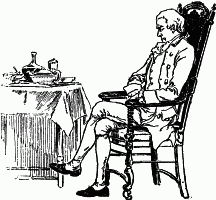
"I have a speech to make to-morrow, sir. My thoughts were on the law, which has a certain majesty of its own."
"You'd better be thinking o' a speech you ought to make to-night, if you care at a' aboot saving yoursel' wi' Katherine Van Heemskirk; and ma certie it will be an extraordinar' case that is [Pg 103]worth mair, even in the way o' siller, than she is."
The elder was not in the habit of making unmeaning speeches, and Neil was instantly alarmed. In his own way, he loved Katherine with all his soul. "Yes," continued the old man, "you hae a rival, sir. Captain Hyde asked Van Heemskirk for his daughter this afternoon, and an earldom in prospect isna a poor bait."
"What a black scoundrel he must be!—to use your hospitality to steal from your son the woman he loves."
"Tak' your time, Neil, and you won't lose your judgment. How was he to ken that Katherine was your sweetheart? You made little o' the lassie, vera little, I may say. Lawyer-like you may be, but nane could call you lover-like. And while he and his are my guests, and in my house, I'll no hae you fighting him. Tak' a word o' advice now,—I'll gie it without a fee,—you are fond enough to plead for others, go and plead an hour for yoursel'. Certie! When I was your age, I was aye noted for my persuading way. Your father, sir, never left a spare corner for a rival. And I can tell you this: a woman isna to be counted your ain, until you hae her inside a wedding-ring."
"What did the councillor say?"
"To tell the truth, he said 'no,' a vera plain 'no,' too. You ken Van Heemskirk's 'no' isn't a shilly-shallying kind o' a negative; but for a' that, if I hae any skill in judging men, Richard Hyde isna one o' the kind that tak's 'no' from either man or woman."
[Pg 104]Neil was intensely angry, and his dark eyes glowed beneath their dropped lids with a passionate hate. But he left his father with an assumed coldness and calmness which made him mutter as he watched Neil down the road, "I needna hae fashed mysel' to warn him against fighting. He's a prudent lad. It's no right to fight, and it would be a matter for a kirk session likewise; but Bruce and Wallace! was there ever a Semple, before Neil, that keepit his hand off his weapon when his love or his right was touched? And there's his mother out the night, of all the nights in the year, and me wanting a word o' advice sae bad; not that Janet has o'er much good sense, but whiles she can make an obsarve that sets my ain wisdom in a right line o' thought. I wish to patience she'd bide at home. She never kens when I may be needing her. And, now I came to think o' things, it will be the warst o' all bad hours for Neil to seek Katherine the night. She'll be fretting, and the mother pouting, and the councillor in ane o' his particular Dutch touch-me-not tempers. I do hope the lad will hae the uncommon sense to let folks cool, and come to theirsel's a wee."
For the elder, judging his son by the impetuosity of his own youthful temper, expected him to go directly to Van Heemskirk's house. But there were qualities in Neil which his father forgot to take into consideration, and their influence was to suggest to the young man how inappropriate a visit to Katherine would be at that time. Indeed, he did not much desire it. He was very angry with Katherine. He was sure that she understood his entire devotion to [Pg 105]her. He could not see any necessity to set it forth as particularly as a legal contract, in certain set phrases and with conventional ceremonies.
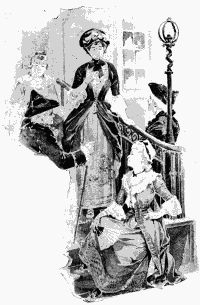
But his father's sarcastic advice annoyed him, and he wanted time to fully consider his ways. He was no physical coward; he was a fine swordsman, and he felt that it would be a real joy to stand with a drawn rapier between himself and his rival. But what if revenge cost him too much? What if he slew Hyde, and had to leave his love and his home, and his fine business prospects? To win Katherine and to marry her, in the face of the man whom he felt that he detested, would not that be the best of all "satisfactions"?
He walked about the streets, discussing these points with himself, till the shops all closed, and on the stoops of the houses in Maiden Lane and Liberty Street there were merry parties of gossiping belles and beaux. Then he returned to Broadway. Half a dozen gentlemen were standing before the King's Arms Tavern, discussing some governmental statement in the "Weekly Mercury;" but though they asked him to stop, and enlighten them on some legal point, he excused himself for that night, and went toward Van Heemskirk's. He had suddenly resolved upon a visit. Why should he put off until the morrow what he might begin that night?
[Pg 106]Still debating with himself, he came to a narrow road which ran to the river, along the southern side of Van Heemskirk's house. It was only a trodden path used by fishermen, and made by usage through the unenclosed ground. But coming swiftly up it, as if to detain him, was Captain Hyde. The two men looked at each other defiantly; and Neil said with a cold, meaning emphasis,—
"At your service, sir."
"Mr. Semple, at your service,"—and touching his sword,—"to the very hilt, sir."
"Sir, yours to the same extremity."
"As for the cause, Mr. Semple, here it is;" and he pushed aside his embroidered coat in order to exhibit to Neil the bow of orange ribbon beneath it.
"I will die it crimson in your blood," said Neil, passionately.
"In the meantime, I have the felicity of wearing it;" and with an offensively deep salute, he terminated the interview.
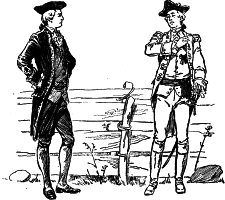 >
>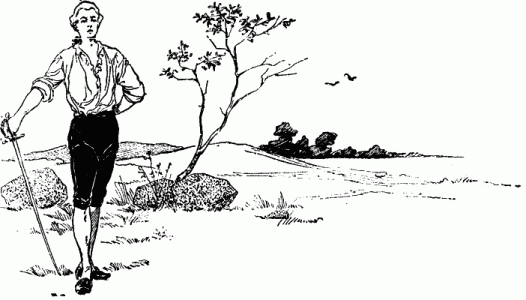
VI.
"Love and a crown no rivalship can bear.
Love, love! Thou sternly dost thy power maintain,
And wilt not bear a rival in thy reign."
Neil's first emotion was not so much one of anger as of exultation. The civilization of the Semples was scarce a century old; and behind them were generations of fierce men, whose hands had been on their dirks for a word or a look. "I shall have him at my sword's point;" that was what he kept saying to himself as he turned from Hyde to Van Heemskirk's house. The front-door stood open; and he walked through it to the back-stoop, where Joris was smoking.
Katherine sat upon the steps of the stoop. Her head was in her hand, her eyes red with weeping, her whole attitude one of desponding sorrow. But, at this hour, Neil was indifferent to adverse circumstances. He was moving in that exultation of spirit which may be simulated by the first rapture of good wine, but which is only genuine when the soul takes entire posses[Pg 108]sion of the man, and makes him for some rare, short interval lord of himself, and contemptuous of all fears and doubts and difficulties. He never noticed that Joris was less kind than usual; but touching Katherine, to arouse her attention, said, "Come with me down the garden, my love."
She looked at him wonderingly. His words and manner were strange and potent; and, although she had just been assuring herself that she would resist his advances on every occasion, she rose at his request and gave him her hand.
Then the tender thoughts which had lain so deep in his heart flew to his lips, and he wooed her with a fervour and nobility as astonishing to himself as to Katherine. He reminded her of all the sweet intercourse of their happy lives, and of the fidelity with which he had loved her. "When I was a lad ten years old, and saw you first in your mother's arms, I called you then 'my little wife.' Oh, my Katherine, my sweet Katherine! Who is there that can take you from me?"
"Neil, like a brother to me you have been. Like a dear brother, I love you. But your wife to be! That is not the same. Ask me not that."
"Only that can satisfy me, Katherine. Do you think I will ever give you up? Not while I live."
"No one will I marry. With my father and my mother I will stay."
"Yes, till you learn to love me as I love you, with the whole soul." He drew her close to his side, and bent tenderly to her face.
[Pg 109]"No, you shall not kiss me, Neil,—never again. No right have you, Neil."
"You are to be my wife, Katherine?"
"That I have not said."
She drew herself from his embrace, and stood leaning against an elm-tree, watchful of Neil, full of wonder at the sudden warmth of his love, and half fearful of his influence over her.
"But you have known it, Katherine, ay, for many a year. No words could make the troth-plight truer. From this hour, mine and only mine."
"Such things you shall not say."
"I will say them before all the world. Katherine, is it true that an English soldier is wearing a bow of your ribbon? You must tell me."
"What mean you?"
"I will make my meaning plain. Is Captain Hyde wearing a bow of your orange ribbon?"
"Can I tell?"
"Yes. Do not lie to me."
"A lie I would not speak."
"Did you give him one? an orange one?"
"Yes. A bow of my St. Nicholas ribbon I gave him."
"Why?"
"Me he loves, and him I love."
"And he wears it at his breast?"
"On his breast I have seen it. Neil, do not quarrel with him. Do not look so angry. I fear you. My fault it is; all my fault, Neil. Only to please me he wears it."
"You have more St. Nicholas ribbons?"
"That is so."
[Pg 110]"Go and get me one. Get a bow, Katherine, and give it to me. I will wait here for it."
"No, that I will not do. How false, how wicked I would be, if two lovers my colours wore!"
"Katherine, I am in great earnest. A bow of that ribbon I must have. Get one for me."
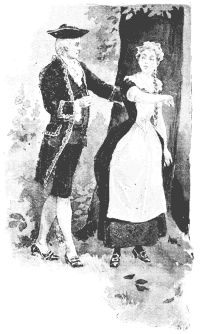
"My hands I would cut off first."
"Well, then, I will cut my bow from Hyde's breast. I will, though I cut his heart out with it."
He turned from her as he said the words, and, without speaking to Joris, passed through the garden-gate to his own home. His mother and Mrs. Gordon, and several young ladies and gentlemen were sitting on the stoop, arranging for a turtle feast on the East River; and Neil's advent was hailed with ejaculations of pleasure. He affected to listen for a few minutes, and then excused himself upon the "assurance of having some very important writing to attend to." But, as he passed the parlour door, his father called him. The elder was casting up some kirk accounts; but, as Neil answered the summons, he carefully put the extinguisher on one candle, and turned his chair from the table in a way which Neil understood as an invitation for his company.
A moment's reflection con[Pg 111]vinced Neil that it was his wisest plan to accede. It was of the utmost importance that his father should be kept absolutely ignorant of his quarrel with Hyde; for Neil was certain that, if he suspected their intention to fight, he would invoke the aid of the law to preserve peace, and such a course would infallibly subject him to suspicions which would be worse than death to his proud spirit.
"Weel, Neil, my dear lad, you are early hame. Where were you the night?"
"I have just left Katherine, sir, having followed your advice in my wooing. I wish I had done so earlier."
"Ay, ay; when a man is seventy years auld, he has read the book o' life, 'specially the chapter anent women, and he kens a' about them. A bonnie lass expects to hae a kind o' worship; but the service is na unpleasant, quite the contrary. Did you see Captain Hyde?"
"We met near Broadway, and exchanged civilities."
"A gude thing to exchange. When Gordon gets back frae Albany, I'll hae a talk wi' him, and I'll get the captain sent there. In Albany there are bonnie lasses and rich lasses in plenty for him to try his enchantments on. There was talk o' sending him there months syne; it will be done ere long, or my name isna Alexander Semple."
"I see you are casting up the kirk accounts. Can I help you, father?"
"I hae everything ready for the consistory. Neil, what is the gude o' us speaking o' this and that, and thinking that we are deceiving each other? I am vera anxious anent affairs [Pg 112]between Captain Hyde and yoursel'; and I'm 'feard you'll be coming to hot words, maybe to blows, afore I manage to put twa hundred miles atween you. My lad, my ain dear lad! You are the Joseph o' a' my sons; you are the joy o' your mother's life. For our sake, keep a calm sough, and dinna let a fool provoke you to break our hearts, and maybe send you into God's presence uncalled and unblessed.
"Father, put yoursel' in my place. How would you feel toward Captain Hyde?"
"Weel, I'll allow that I wouldna feel kindly. I dinna feel kindly to him, even in my ain place."
"As you desire it, we will speak plainly to each other anent this subject. You know his proud and hasty temper; you know also that I am more like yourself than like Moses in the way of meekness. Now, if Captain Hyde insults me, what course would you advise me to adopt?"
"I wouldna gie him the chance to insult you. I would keep oot o' his way. There is naething unusual or discreditable in taking a journey to Boston, to speir after the welfare o' your brother Alexander."
"Oh, indeed, sir, I cannot leave my affairs for an insolent and ungrateful fool! I ask your advice for the ordinary way of life, not for the way that cowardice or fear dictates. If without looking for him, or avoiding him, we meet, and a quarrel is inevitable, what then, father?"
"Ay, weel, in that case, God prevent it! But in sic a strait, my lad, it is better to gie the insult than to tak' it."
[Pg 113]"You know what must follow?"
"Wha doesna ken? Blood, if not murder. Neil, you are a wise and prudent lad; now, isna the sword o' the law sharper than the rapier o' honour?"
"Law has no remedy for the wrongs men of honour redress with the sword. A man may call me every shameful name; but, unless I can show some actual loss in money or money's worth, I have no redress. And suppose that I tried it, and that after long sufferance and delays I got my demands, pray, sir, tell me, how can offences which have flogged a man's most sacred feelings be atoned for by something to put in the pocket?"
"Society, Neil"—
"Society, father, always convicts and punishes the man who takes an insult on view, without waiting for his indictment or trial."
"There ought to be a law, Neil"—
"No law will administer itself, sir. The statute-book is a dead letter when it conflicts with public opinion. There is not a week passes but you may see that for yourself, father. If a man is insulted, he must protect his honour; and he will do so until the law is able to protect him better than his own strength."
"There is another way—a mair Christian way"—
"The world has not taken it yet; at any rate, I am very sure none of the Semples have."
"You are, maybe, o'er sure, Neil. Deacon Van Vorst has said mair than my natural man could thole, many a time, in the sessions and oot o' them; but the dominie aye stood be[Pg 114]tween us wi' his word, and we hae managed so far to keep the peace, though a mair pig-headed, provoking, pugnacious auld Dutchman never sat down on the dominie's left hand."
"Then, father, if Captain Hyde should quarrel with me, and if he should challenge me, you advise me to refuse the challenge, and to send for the dominie to settle the matter?"
"I didna say the like o' that, Neil. I am an auld man, and Van Vorst is an aulder one. We'd be a bonnie picture wi' drawn swords in oor shaking hands; though, for mysel', I may say that there wasna a better fencer in Ayrshire, and that the houses o' Lockerby and Lanark hae reason to remember. And I wouldna hae the honour o' the Semples doubted; I'd fight myself first. But I'm in a sair strait, Neil; and oh, my dear lad, what will I say, when it's the Word o' the Lord on one hand, and the scaith and scorn of a' men on the other? But I'll trust to your prudence, Neil, and no begin to feel the weight o' a misery that may ne'er come my way. All my life lang, when evils hae threatened me, I hae sought God's help; and He has either averted them or turned them to my advantage."
"That is a good consolation, father."
"It is that; and I ken nae better plan for life than, when I rise up, to gie mysel' to His direction, and, when I lay me down to sleep, to gie mysel' to His care."
"In such comfortable assurance, sir, I think we may say good-night. I have business early in the morning, and may not wait for your company, if you will excuse me so far."
"Right; vera right, Neil. The dawn has [Pg 115]gold in its hand. I used to be an early worker mysel'; but I'm an auld man noo, and may claim some privileges. Good-night, Neil, and a good-morning to follow it."
Neil then lit his candle; and, not forgetting that courteous salute which the young then always rendered to honourable age, he went slowly upstairs, feeling suddenly a great weariness and despair. If Katherine had only been true to him! He was sure, then, that he could have fought almost joyfully any pretender to her favour. But he was deserted by the girl whom he had loved all her sweet life. He was betrayed by the man who had shared the hospitality of his home, and in the cause of such loss, compelled to hazard a life opening up with fair hopes of honour and distinction.
In the calm of his own chamber, through the silent, solemn hours, when the world was shut out of his life, Neil reviewed his position; but he could find no honourable way out of his predicament. Physically, he was as brave as brave could be; morally, he had none of that grander courage which made Joris Van Heemskirk laugh to scorn the idea of yielding God's gift of life at the demand of a passionate fool. He was quite sensible that his first words to Captain Hyde that night had been intended to provoke a quarrel, and he knew that he would be expected to redeem them by a formal defiance. However, as the idea became familiar, it became imperative; and at length it was with a fierce satisfaction that he opened his desk and without hesitation wrote the decisive words:

[Pg 116]To CAPTAIN RICHARD HYDE OF HIS MAJESTY'S SERVICE: SIR: A person of the character I bear cannot allow the treachery and dishonourable conduct of which you have been guilty to pass without punishment. Convince me that you are more of a gentleman than I have reason to believe, by meeting me to-night as the sun drops in the wood on the Kalchhook Hill. Our seconds can locate the spot; and that you may have no pretence to delay, I send by bearer two swords, of which I give you the privilege to make choice.
In the interim, at your service,
NEIL SEMPLE.
[Pg 117]He had already selected Adrian Beekman as his second. He was a young man of wealth and good family, exceedingly anxious for social distinction, and, moreover, so fastidiously honourable that Neil felt himself in his hands to be beyond reproach. As he anticipated, Beekman accepted the duty with alacrity, and, indeed, so promptly carried out his principal's instructions, that he found Captain Hyde still sleeping when he waited upon him. But Hyde was neither astonished nor annoyed. He laughed lightly at "Mr. Semple's impatience of offence," and directed Mr. Beekman to Captain Earle as his second; leaving the choice of swords and of the ground entirely to his direction.
"A more civil, agreeable, handsome gentleman, impossible it would be to find; and I think the hot haughty temper of Neil is to blame in this affair," was Beekman's private comment. But he stood watchfully by his principal's interests, and affected a gentlemanly disapproval of Captain Hyde's behaviour.
And lightly as Hyde had taken the challenge, he was really more disinclined to fight than Neil was. In his heart he knew that Semple had a just cause of anger; "but then," he argued, "Neil is a proud, pompous fellow, for whom I never assumed a friendship. His father's hospitality I regret in any way to have abused; but who the deuce could have suspected that Neil Semple was in love with the adorable Katherine? In faith, I did not at the first, and now 'tis too late. I would not resign the girl for my life; for I am sensible that life, if she is another's, will be a very tedious thing to me."
[Pg 118]All day Neil was busy in making his will, and in disposing of his affairs. He knew himself well enough to be certain, that, if he struck the first blow, he would not hesitate to strike the death blow, and that nothing less than such conclusion would satisfy him. Hyde also anticipated a deathly persistence of animosity in his opponent, and felt equally the necessity for some definite arrangement of his business. Unfortunately, it was in a very confused state. He owed many debts of honour, and Cohen's bill was yet unsettled. He drank a cup of coffee, wrote several important letters, and then went to Fraunce's, and had a steak and a bottle of wine. During his meal his thoughts wandered between Katherine and the Jew Cohen. After it he went straight to Cohen's store.
It happened to be Saturday; and the shutters were closed, though the door was slightly open, and Cohen was sitting with his granddaughter in the cool shadows of the crowded place. Hyde was not in a ceremonious mood, and he took no thought of it being the Jew's sabbath. He pushed wider the door, and went clattering into their presence; and with an air of pride and annoyance the Jew rose to meet him. At the same time, by a quick look of intelligence, he dismissed Miriam; but she did not retreat farther than within the deeper shadows of some curtains of stamped Moorish leather, for she anticipated the immediate departure of the intruder.
She was therefore astonished when her grandfather, after listening to a few sentences, sat down, and entered into a lengthy conversation. [Pg 119]And her curiosity was also aroused; for, though Hyde had often been in the store, she had never hitherto seen him in such a sober mood, it was also remarkable that on the sabbath her grandfather should receive papers, and a ring which she watched Hyde take from his finger; and there was, beside, a solemn, a final air about the transaction which gave her the feeling of some anticipated tragedy.
When at last they rose, Hyde extended his hand. "Cohen," he said, "few men would have been as generous and, at this hour, as considerate as you. I have judged from tradition, and misjudged you. Whether we meet again or not, we part as friends."
"You have settled all things as a gentleman, Captain. May my white hairs say a word to your heart this hour?" Hyde bowed; and he continued, in a voice of serious benignity: "The words of the Holy One are to be regarded, and not the words of men. Men call that 'honour' which He will call murder. What excuse is there in your lips if you go this night into His presence?"
There was no excuse in Hyde's lips, even for his mortal interrogator. He merely bowed again, and slipped through the partially opened door into the busy street. Then Cohen put clean linen upon his head and arm, and went and stood with his face to the east, and recited, in low, rhythmical sentences, the prayer called the "Assault." Miriam sat quiet during his devotion but, when he returned to his place, she asked him plainly, "What murder is there to be, grandfather?"
"It is a duel between Captain Hyde and [Pg 120]another. It shall be called murder at the last."
"The other, who is he?"
"The young man Semple."
"I am sorry. He is a courteous young man. I have heard you say so. I have heard you speak well of him."
"O Miriam, what sin and sorrow thy sex ever bring to those who love it! There are two young lives to be put in death peril for the smile of a woman,—a very girl she is."
"Do I know her, grandfather?"
"She passes here often. The daughter of Van Heemskirk,—the little fair one, the child."
"Oh, but now I am twice sorry! She has smiled at me often. We have even spoken. The good old man, her father, will die; and her brother, he was always like a watch-dog at her side."
"But not the angels in heaven can watch a woman. For a lover, be he good or bad, she will put heaven behind her back, and stand on the brink of perdition. Miriam, if thou should deceive me,—as thy mother did,—God of Israel, may I not know it!"
"Though I die, I will not deceive you, grandfather."
"The Holy One hears thee, Miriam. Let Him be between us."
Then Cohen, with his hands on his staff, and his head in them, sat meditating, perhaps praying; and the hot, silent moments went slowly away. In them, Miriam was coming to a decision which at first alarmed her, but which, as it grew familiar, grew also lawful and kind. She was quite certain that her [Pg 121]grandfather would not interfere between the young men, and probably he had given Hyde his promise not to do so; but she neither had received a charge, nor entered into any obligation, of silence. A word to Van Heemskirk or to the Elder Semple would be sufficient. Should she not say it? Her heart answered "yes," although she did not clearly perceive how the warning was to be given.
Perhaps Cohen divined her purpose, and was not unfavourable to it; for he suddenly rose, and, putting on his cap, said, "I am going to see my kinsman John Cohen. At sunset, set wide the door; an hour after sunset I will return."
As soon as he had gone, Miriam wrote to Van Heemskirk these words: "Good sir,—This is a matter of life and death: so then, come at once, and I will tell you. MIRIAM COHEN."
With the slip of paper in her hand, she stood within the door, watching for some messenger she could trust. It was not many minutes before Van Heemskirk's driver passed, leading his loaded wagon; and to him she gave the note.
That day Joris had gone home earlier than usual, and Bram only was in the store. But it was part of his duty to open and attend to orders, and he supposed the strip of paper to refer to a barrel of flour or some other household necessity.
Its actual message was so unusual and unlooked for, that it took him a moment or two to realize the words; then, fearing it might be some practical joke, he recalled the driver, and [Pg 122]heard with amazement that the Jew's granddaughter had herself given him the message. Assured of this fact, he answered the summons for his father promptly. Miriam was waiting just within the door; and, scarcely heeding his explanation, she proceeded at once to give him such information as she possessed. Bram was slow of thought and slow of speech. He stood gazing at the beautiful, earnest girl, and felt all the fear and force of her words; but for some moments he could not speak, nor decide on his first step.
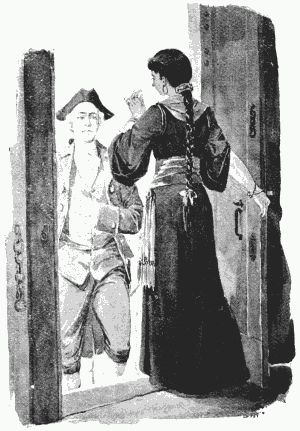
"Why do you wait?" pleaded Miriam. "At sunset, I tell you. It is now near it. Oh, no thanks! Do not stop for them, but hasten to them at once."
He obeyed like one in a dream; but, before he had reached Semple's store, he had fully realized the actual situation. Semple was just leaving business. He put his hand on him, and said, "Elder, no time have you to lose. At sunset, Neil and that d——English soldier a duel are to fight."
"Eh? Where? Who told you?"
"On the Kalchhook Hill. Stay not for a moment's talk."
[Pg 123]"Run for your father, Bram. Run, my lad. Get Van Gaasbeeck's light wagon as you go, and ask your mother for a mattress. Dinna stand glowering at me, but awa' with you. I'll tak' twa o' my ain lads and my ain wagon, and be there instanter. God help me! God spare the lad!"
At that moment Neil and Hyde were on their road to the fatal spot. Neil had been gathering anger all day; Hyde, a vague regret. The folly of what they were going to do was clear to both; but Neil was dominated by a fury of passion, which made the folly a revengeful joy. If there had been any thought of an apology in Hyde's heart, he must have seen its hopelessness in the white wrath of Neil's face, and the calm deliberation with which he assumed and prepared for a fatal termination of the affair.
The sun dropped as the seconds measured off the space and offered the lot for the standing ground. Then Neil flung off his coat and waistcoat, and stood with bared breast on the spot his second indicated. This action had been performed in such a passion of hurry, that he was compelled to watch Hyde's more calm and leisurely movements. He removed his fine scarlet coat and handed it to Captain Earle, and would then have taken his sword; but Beekman advanced to remove also his waistcoat. The suspicion implied by this act roused the soldier's indignation. "Do you take me to be a person of so little honour?" he passionately asked; and then with his own hands he tore off the richly embroidered satin garment, and by so doing exposed what perhaps some delicate feeling had made him wish to conceal,—a [Pg 124]bow of orange ribbon which he wore above his heart.
The sight of it to Neil was like oil flung upon flame. He could scarcely restrain himself until the word "go" gave him license to charge Hyde, which he did with such impetuous rage, that it was evident he cared less to preserve his own life, than to slay his enemy.
Hyde was an excellent swordsman, and had fought several duels; but he was quite disconcerted by the deadly reality of Neil's attack. In the second thrust, his foot got entangled in a tuft of grass; and, in evading a lunge aimed at his heart, he fell on his right side. Supporting himself, however, on his sword hand, he sprang backwards with great dexterity, and thus escaped the probable death-blow. But, as he was bleeding from a wound in the throat, his second interfered, and proposed a reconciliation. Neil angrily refused to listen. He declared that he "had not come to enact a farce;" and then, happening to glance at the ribbon on Hyde's breast, he swore furiously, "He would make his way through the body of any man who stood between him and his just anger."
Up to this point, there had been in Hyde's mind a latent disinclination to slay Neil. After it, he flung away every kind memory; and the fight was renewed with an almost brutal impetuosity, until there ensued one of those close locks which it was evident nothing but "the key of the body could open." In the frightful wrench which followed, the swords of both men sprang from their hands, flying some four or five yards upward with the force.
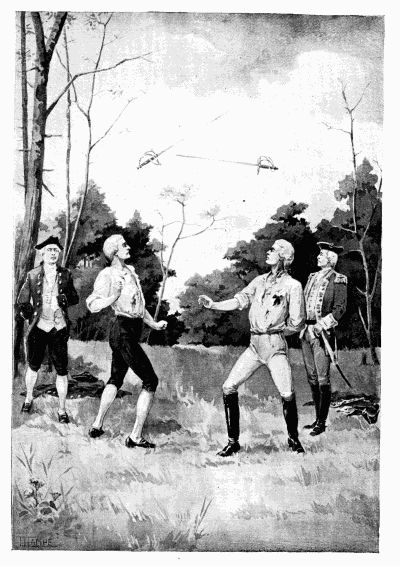
Both recovered their weapons at the same time, and both, bleeding and exhausted, would have again renewed the fight; but at that moment Van Heemskirk and Semple, with their attendants, reached the spot.
Without hesitation, they threw themselves between the young men,—Van Heemskirk facing Hyde, and the elder his son. "Neil, you dear lad, you born fool, gie me your weapon instanter, sir!" But there was no need to say another word. Neil fell senseless upon his sword, making in his fall a last desperate effort to reach the ribbon on Hyde's breast; for Hyde had also dropped fainting to the ground, bleeding from at least half a dozen wounds. Then one of Semple's young men, who had probably defined the cause of quarrel, and who felt a sympathy for his young master, made as if he would pick up the fatal bit of orange satin, now died crimson in Hyde's blood.
But Joris pushed the rifling hand fiercely away. "To touch it would be the vilest theft," he said. "His own it is. With his life he has bought it."

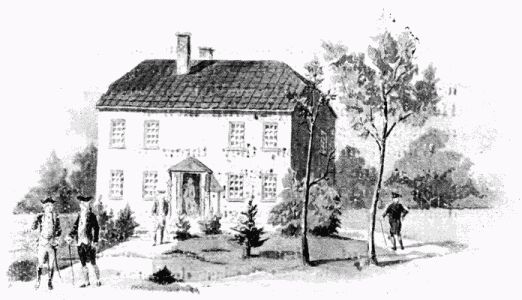
VII.
"I know I felt Love's face
Pressed on my neck, with moan of pity and grace,
Till both our heads were in his aureole."
The news of the duel spread with the proverbial rapidity of evil news. At the doors of all the public houses, in every open shop, on every private stoop, and at the street-corners, people were soon discussing the event, with such additions and comments as their imaginations and prejudices suggested. One party insisted that lawyer Semple was dead; another, that it was the English officer; a third, that both died as they were being carried from the ground.
Batavius, who had lingered to the last moment at the house which he was building, heard the story from many a lip as he went home. He was bitterly indignant at Katherine. He felt, indeed, as if his own character for [Pg 129]morality of every kind had been smirched by his intended connection with her. And his Joanna! How wicked Katherine had been not to remember that she had a sister whose spotless name would be tarnished by her kinship! He was hot with haste and anger when he reached Van Heemskirk's house.
Madam stood with Joanna on the front-stoop, looking anxiously down the road. She was aware that Bram had called for his father, and she had heard them leave the house together in unexplained haste. At first, the incident did not trouble her much. Perhaps one of the valuable Norman horses was sick, or there was an unexpected ship in, or an unusually large order. Bram was a young man who relied greatly on his father. She only worried because supper must be delayed an hour, and that delay would also keep back the completion of that exquisite order in which it was her habit to leave the house for the sabbath rest.
After some time had elapsed, she went upstairs, and began to lay out the clean linen and the kirk clothes. Suddenly she noticed that it was nearly dark; and, with a feeling of hurry and anxiety, she remembered the delayed meal. Joanna was on the front-stoop watching for Batavius, who was also unusually late; and, like many other loving women, she could think of nothing good which might have detained him, but her heart was full only of evil apprehensions.
"Where is Katherine?" That was the mother's first question, and she called her through the house. From the closed best parlour, Katherine came, white and weeping.
[Pg 130]"What is the matter, then, that you are crying? And why into the dark room go you?"
"Full of sorrow I am, mother, and I went to the room to pray to God; but I cannot pray."
"'Full of sorrow.' Yes, for that Englishman you are full of sorrow. And how can you pray when you are disobeying your good father? God will not hear you."
The mother was not pitiless; but she was anxious and troubled, and Katherine's grief irritated her at the moment. "Go and tell Dinorah to bring in the tea. The work of the house must go on," she muttered. "And I think, that it was Saturday night Joris might have remembered."
Then she went back to Joanna, and stood with her, looking through the gray mist down the road, and feeling even the croaking of the frogs and the hum of the insects to be an unusual provocation. Just as Dinorah said, "The tea is served, madam," the large figure of Batavius loomed through the gathering grayness; and the women waited for him. He came up the steps without his usual greeting; and his face was so injured and portentous that Joanna, with a little cry, put her arms around his neck. He gently removed them.
"No time is this, Joanna, for embracing. A great disgrace has come to the family; and I, who have always stood up for morality, must bear it too."
"Disgrace! The word goes not with our name, Batavius; and what mean you, then? In one word, speak."
But Batavius loved too well any story that was to be wondered over, to give it in a word; [Pg 131]though madam's manner snubbed him a little, and he said, with less of the air of a wronged man,—
"Well, then, Neil Semple and Captain Hyde have fought a duel. That is what comes of giving way to passion. I never fought a duel. No one should make me. It is a fixed principle with me."
"But what? And how?"
"With swords they fought. Like two devils they fought, as if to pieces they would cut each other."
"Poor Neil! His fault I am sure it was not."
"Joanna! Neil is nearly dead. If he had been in the right, he would not be nearly dead. The Lord does not forsake a person who is in the right way."
In the hall behind them Katherine stood. The pallor of her face, the hopeless droop of her white shoulders and arms, were visible in its gloomy shadows. Softly as a spirit she walked as she drew nearer to them.
"And the Englishman? Is he hurt?"
"Killed. He has at least twenty wounds. Till morning he will not live. It was the councillor himself who separated the men."
"My good Joris, it was like him."
For a moment Katherine's consciousness reeled. The roar of the ocean which girds our life round was in her ears, the feeling of chill and collapse at her heart. But with a supreme will she took possession of herself. "Weak I will not be. All I will know. All I will suffer." And with these thoughts she went back to the room, and took her place at the table. In [Pg 132]a few minutes the rest followed. Batavius did not speak to her. It was also something of a cross to him that madam would not talk of the event. He did not think that Katherine deserved to have her ill-regulated feelings so far considered, and he had almost a sense of personal injury in the restraint of the whole household.
He had anticipated madam's amazement and shock. He had felt a just satisfaction in the suffering he was bringing to Katherine. He had determined to point out to Joanna the difference between herself and her sister, and the blessedness of her own lot in loving so respectably and prudently as she had done. But nothing had happened as he expected. The meal, instead of being pleasantly lengthened over such dreadful intelligence, was hurried and silent. Katherine, instead of making herself an image of wailing or unconscious remorse, sat like other people at the table, and pretended to drink her tea.
It was some comfort that after it Joanna and he could walk in the garden, and talk the affair thoroughly over. Katherine watched them away, and then she fled to her room. For a few minutes she could let her sorrow have way, and it would help her to bear the rest. And oh, how she wept! She took from their hiding-place the few letters her lover had written her, and she mourned over them as women mourn in such extremities. She kissed the words with passionate love; she vowed, amid her broken ejaculations of tenderness, to be faithful to him if he lived, to be faithful to his memory if he died. She never thought of [Pg 133]Neil; or, if she did, it was with an anger that frightened her. In the full tide of her anguish, Lysbet stood at the door. She heard the inarticulate words of woe, and her heart ached for her child. She had followed her to give her comfort, to weep with her; but she felt that hour that Katherine was no more a child to be soothed with her mother's kiss. She had become a woman, and a woman's sorrow had found her.
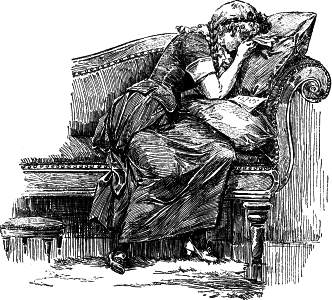
It was near ten o'clock when Joris came home. His face was troubled, his clothing disarranged and blood-stained; and Lysbet never remembered to have seen him so completely exhausted. "Bram is with Neil," he said; "he will not be home."
"And thou?"
"I helped them carry—the other. To the 'King's Arms' we took him. A strong man was needed until their work the surgeons had done. I stayed; that is all."
"Live will he?"
"His right lung is pierced clean through. A bad wound in the throat he [Pg 134]has. At death's door is he, from loss of the blood. But then, youth he has, and a great spirit, and hope. I wish not for his death, my God knows."
"Neil, what of him?"
"Unconscious he was when I left him at his home. I stayed not there. His father and his mother were by his side; Bram also. Does Katherine know?"
"She knows."
"How then?"
"O Joris, if in her room thou could have heard her crying! My heart for her aches, the sorrowful one!"
"See, then, that this lesson she miss not. It is a hard one, but learn it she must. If thy love would pass it by, think this, for her good it is. Many bitter things are in it. What unkind words will now be said! Also, my share in the matter I must tell in the kirk session; and Dominie de Ronde is not one slack in giving the reproof. With our own people a disgrace it will be counted. Can I not hear Van Vleek grumble, 'Well, now, I hope Joris Van Heemskirk has had enough of his fine English company;' and Elder Brouwer will say, 'He must marry his daughter to an Englishman; and, see, what has come of it;' and that evil old woman, Madam Van Corlaer, will shake her head and whisper, 'Yes, neighbours, and depend upon it, the girl is of a light mind and bad morals, and it is her fault; and I shall take care my nieces to her speak no more.' So it will be; Katherine herself will find it so."
"The poor child! Sorry am I she ever went [Pg 135]to Madam Semple's to see Mrs. Gordon. If thy word I had taken, Joris!"
"If my word the elder also had taken. When first, he told me that his house he would offer to the Gordons, I said to him, 'So foolish art them! In the end, what does not fit will fight.' If to-night them could have seen Mistress Gordon when she heard of her nephew's hurt. Without one word of regret, without one word of thanks, and in a great passion, she left the house. For Neil she cared not. 'He had been ever an envious kill-joy. He had ever hated her dear Dick. He had ever been jealous of any one handsomer than himself. He was a black dog in the manger; and she hoped, with all her heart, that Dick had done for him.' Beside herself with grief and passion she was, or the elder had not borne so patiently her words."
"As her own son, she loved him."
"Yea, Lysbet; but just one should be. Weary and sad am I to-night."
The next morning was the sabbath, and many painful questions suggested themselves to Joris and Lysbet Van Heemskirk. Joris felt that he must not take his seat among the deacons until he had been fully exonerated of all blame of blood-guiltiness by the dominie and his elders and deacons in full kirk session. Madam could hardly endure the thought of the glances that would be thrown at her daughter, and the probable slights she would receive. Batavius plainly showed an aversion to being seen in Katherine's company. But these things did not seem to Joris a sufficient reason for neglecting worship. He thought it [Pg 136]best for people to face the unpleasant consequences of wrong-doing; and he added, "In trouble also, my dear ones, where should we go but into the house of the good God?"
Katherine had not spoken during the discussion but, when it was over, she said, "Mijn vader, mijn moeder, to-day I cannot go! For me have some pity. The dominie I will speak to first; and what he says, I will do."
"Between me and thy moeder thou shalt be."
"Bear it I cannot. I shall fall down, I shall be ill; and there shall be shame and fear, and the service to make stop, and then more wonder and more talk, and the dominie angry also! At home I am the best."
"Well, then, so it shall be."
But Joris was stern to Katherine, and his anger added the last bitterness to her grief. No one had said a word of reproach to her; but, equally, no one had said a word of pity. Even Joanna was shy and cold, for Batavius had made her feel that one's own sister may fall below moral par and sympathy. "If either of the men die," he had said, "I shall always consider Katherine guilty of murder; and nowhere in the Holy Scriptures are we told to forgive murder, Joanna. And even while the matter is uncertain, is it not right to be careful? Are we not told to avoid even the appearance of evil?" So that, with this charge before him, Batavius felt that countenancing Katherine in any way was not keeping it.
And certainly the poor girl might well fear the disapproval of the general public, when her own family made her feel her fault so keenly. The kirk that morning would have been the [Pg 137]pillory to her. She was unspeakably grateful for the solitude of the house, for space and silence, in which she could have the relief of unrestrained weeping. About the middle of the morning, she heard Bram's footsteps. She divined why he had come home, and she shrank from meeting him until he removed the clothing he had worn during the night's bloody vigil. Bram had not thought of Katherine's staying from kirk; and when she confronted him, so tear-stained and woe-begone, his heart was full of pity for her. "My poor little Katherine!" he said; and she threw her arms around his neck, and sobbed upon his breast as if her heart would break.
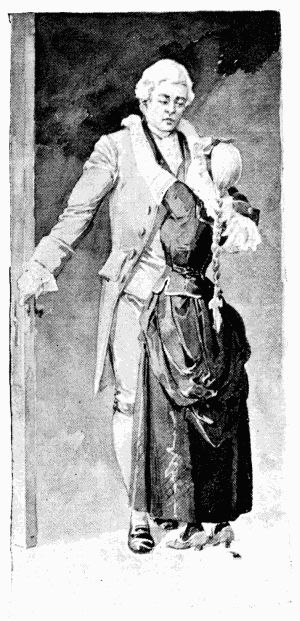
"Mijn kleintje, who has grieved thee?"
"O Bram! is he dead?"
"Who? Neil? I think he will get well once more."
"What care I for Neil? The wicked one! I wish that he might die. Yes, that I do."
"Whish!—to say that is wrong."
"Bram! Bram! A little pity give me. It is the other one. Hast thou heard?"
"How can he live? Look at that sorrow, dear one, and ask God to forgive and help thee."
"No, I will not look at it. I will ask God every [Pg 138]moment that he may get well. Could I help that I should love him? So kind, so generous, is he! Oh, my dear one, my dear one, would I had died for thee!"
Bram was much moved. Within the last twenty-four hours he had begun to understand the temptation in which Katherine had been; begun to understand that love never asks, 'What is thy name? Of what country art thou? Who is thy father?' He felt that so long as he lived he must remember Miriam Cohen as she stood talking to him in the shadowy store. Beauty like hers was strange and wonderful to the young Dutchman. He could not forget her large eyes, soft and brown as gazelle's; the warm pallor and brilliant carnation of her complexion; her rosy, tender mouth; her abundant black hair, fastened with large golden pins, studded with jewels. He could not forget the grace of her figure, straight and slim as a young palm-tree, clad in a plain dark garment, and a neckerchief of white India silk falling away from her exquisite throat. He did not yet know that he was in love; he only felt how sweet it was to sit still and dream of the dim place, and the splendidly beautiful girl standing among its piled-up furniture and its hanging draperies. And this memory of Miriam made him very pitiful to Katherine.
"Every one is angry at me, Bram, even my father; and Batavius will not sit on the chair at my side; and Joanna says a great disgrace I have made for her. And thou? Wilt thou also scold me? I think I shall die of grief."
"Scold thee, thou little one? That I will not. And those that are angry with thee may [Pg 139]be angry with me also. And if there is any comfort I can get thee, tell thy brother Bram. He will count thee first, before all others. How could they make thee weep? Cruel are they to do so. And as for Batavius, mind him not. Not much I think of Batavius! If he says this or that to thee, I will answer him."
"Bram! my Bram! my brother! There is one comfort for me,—if I knew that he still lived; if one hope thou could give me!"
"What hope there is, I will go and see. Before they are back from kirk, I will be back; and, if there is good news, I will be glad for thee."
Not half an hour was Bram away; and yet, to the miserable girl, how grief and fear lengthened out the moments! She tried to prepare herself for the worst; she tried to strengthen her soul even for the message of death. But very rarely is any grief as bad as our own terror of it. When Bram came back, it was with a word of hope on his lips.
"I have seen," he said, "who dost thou think?—the Jew Cohen. He of all men, he has sat by Captain Hyde's side all night; and he has dressed the wound the English surgeon declared 'beyond mortal skill.' And he said to me, 'Three times, in the Persian desert, I have cured wounds still worse, and the Holy One hath given me the power of healing; and, if He wills, the young man shall recover.' That is what he said, Katherine."
"Forever I will love the Jew. Though he fail, I will love him. So kind he is, even to those who have not spoken well, nor done well, to him."
[Pg 140]"So kind, also, was the son of David to all of us. Now, then, go wash thy face, and take comfort and courage."
"Bram, leave me not."
"There is Neil. We have been companions; and his father and his mother are old, and need me."
"Also, I need thee. All the time they will make me to feel how wicked is Katherine Van Heemskirk!"
At this moment the family returned from the morning service, and Bram rather defiantly drew his sister to his side. Joris was not with them. He had stopped at the "King's Arms" to ask if Captain Hyde was still alive; for, in spite of everything, the young man's heroic cheerfulness in the agony of the preceding night had deeply touched Joris. No one spoke to Katherine; even her mother was annoyed and humiliated at the social ordeal through which they had just passed, and she thought it only reasonable that the erring girl should be made to share the trial. Batavius, however, had much curiosity; and his first thought on seeing Bram at home was, "Neil is of course dead, and Bram is of no further use;" and, in the tone of one personally injured by such a fatality, he ejaculated,—
"So it is the end, then. On the sabbath day Neil has gone. If it should be the sabbath day in the other world,—which is likely,—it will be the worse for Neil."
"What mean you?"
"Is not Neil Semple dead?"
"No. I think, also, that he will live."
"I am glad. It is good for Katherine."
[Pg 141]"I see it not."
"Well, then, if he dies, is it not Katherine's fault?"
"Heaven and hell! No! Katherine is not to blame."
"All respectable and moral people will say so."
"Better for them not to say so. If I hear of it, then I will make them say it to my face."
"Then? Well?"
"I have my hands and my feet, for them—to punish their tongues."
"And the kirk session?"
"Oh, I care not! What is the kirk session to my little Katherine? Batavius, if man or woman you hear speak ill of her, tell them it is not Katherine, but Bram Van Heemskirk, that will bring everything back to them. What words I say, them I mean."
"Oh, yes! And mind this, Bram, the words I think, them words I will say, whether you like them or like them not."
"As the wind you bluster,—on the sabbath day, also. In your ship I sail not, Batavius. Good-by, then, Katherine; and if any are unkind to thee, tell thy brother. For thou art right, and not wrong."
But, though Bram bravely championed his sister, he could not protect her from those wicked innuendoes disseminated for the gratification of the virtuous; nor from those malicious regrets of very good people over rumours which they declare to "be incredible," and yet which, nevertheless, they "unfortunately believe to be too true." The Scotch have a national precept which says, "Never speak ill of the dead." [Pg 142]Would it not be much better to speak no ill of the living? Little could it have mattered to Madam Bogardus or Madam Stuyvesant what a lot of silly people said of them in Pearl Street or Maiden Lane, a century after their death; but poor Katherine Van Heemskirk shivered and sickened in the presence of averted eyes and uplifted shoulders, and in that chill atmosphere of disapproval which separated her from the sympathy and confidence of her old friends and acquaintances.
"It is thy punishment," said her mother, "bear it bravely and patiently. In a little while, it will be forgot." But the weeks went on, and the wounded men slowly fought death away from their pillows, and Katherine did not recover the place in social estimation which she had lost through the ungovernable tempers of her lovers. For, alas, there are few social pleasures that have so much vital power as that of exploring the faults of others, and comparing them with our own virtues!
But nothing ill lasts forever; and in three months Neil Semple was in his office again, wan and worn with fever and suffering, and wearing his sword arm in a sling, but still decidedly world-like and life-like. It was characteristic of Neil that few, even of his intimates, cared to talk of the duel to him, to make any observations on his absence, or any inquiries about his health. But it was evident that public opinion was in a large measure with him. Every young Provincial, who resented the domineering spirit of the army, felt Hyde's punishment in the light of a personal satisfaction. Beekman also had talked highly of the [Pg 143]unbending spirit and physical bravery of his principal; and though in the Middle Kirk the affair was sure to be the subject of a reproof, and of a suspension of its highest privileges, yet it was not difficult to feel that sympathy often given to deeds publicly censured, but privately admired. Joris remarked this spirit with a little astonishment and dissent. He could not find in his heart any excuse for either Neil or Hyde; and, when the elder enlarged with some acerbity upon the requirements of honour among men, Joris offended him by replying,—
"Well, then, Elder, little I think of that 'honour' which runs not with the laws of God and country."
"Let me tell you, Joris, the 'voice of the people is the voice of God,' in a measure; and you may see with your ain een that it mair than acquits Neil o' wrong-doing. Man, Joris! would you punish a fair sword-fight wi' the hangman?"
"A better way there is. In the pillory I would stand these men of honour, who of their own feelings think more than of the law of God. A very quick end that punishment would put to a custom wicked and absurd."
"Weel, Joris, we'll hae no quarrel anent the question. You are a Dutchman, and hae practical ideas o' things in general. Honour is a virtue that canna be put in the Decalogue, like idolatry and murder and theft."
"Say you the Decalogue? Its yea and nay are enough. Harder than any of God's laws are the laws we make for ourselves. Little I think of their justice and wisdom. If right was [Pg 144]Neil, if wrong was Hyde, honour punished both. A very foolish law is honour, I think."
"Here comes Neil, and we'll let the question fa' to the ground. There are wiser men than either you or I on baith sides."
Joris nodded gravely, and turned to welcome the young man. More than ever he liked him; for, apart from moral and prudential reasons, it was easy for the father to forgive an unreasonable love for his Katharine. Also, he was now more anxious for a marriage between Neil and his daughter. It was indeed the best thing to fully restore her to the social esteem of her own people; for by making her his wife, Neil would most emphatically exonerate her from all blame in the quarrel. Just this far, and no farther, had Neil's three months' suffering aided his suit,—he had now the full approval of Joris, backed by the weight of this social justification.
But, in spite of these advantages, he was really much farther away from Katherine. The three months had been full of mental suffering to her, and she blamed Neil entirely for it. She had heard from Bram the story of the challenge and the fight; heard how patiently Hyde had parried Neil's attack rather than return it, until Neil had so passionately refused any satisfaction less than his life; heard, also, how even at the point of death, fainting and falling, Hyde had tried to protect her ribbon at his breast. She never wearied of talking with Bram on the subject; she thought of it all day, dreamed of it all night.
And she knew much more about it than her parents or Joanna supposed. Bram had easily fallen into the habit of calling at Cohen's to ask [Pg 145]after his patient. He would have gone for his sister's comfort alone, but it was also a great pleasure to himself. At first he saw Miriam often; and, when he did, life became a heavenly thing to Bram Van Heemskirk. And though latterly it was always the Jew himself who answered his questions, there was at least the hope that Miriam would be in the store, and lift her eyes to him, or give him a smile or a few words of greeting. Katherine very soon suspected how matters stood with her brother, and gratitude led her to talk with him about the lovely Jewess. Every day she listened with apparent interest to his descriptions of Miriam, as he had seen her at various times; and every day she felt more desirous to know the girl whom she was certain Bram deeply loved.
But for some weeks after the duel she could not bear to leave the house. It was only after both men were known to be recovering, that she ventured to kirk; and her experience there was not one which tempted her to try the streets and the stores. However, no interest is a living interest in a community but politics; and these probably retain their power because change is their element. People eventually got weary to death of Neil Semple and Captain Hyde and Katherine Van Heemskirk. The subject had been discussed in every possible light; and, when it was known that neither of the men was going to die, gossipers felt as if they had been somewhat defrauded, and the topic lost every touch of speculation.
Also, far more important events had now the public attention. During the previous March, the Stamp Act and the Quartering Act had [Pg 146]passed both houses of Parliament; and Virginia and Massachusetts, conscious of their dangerous character, had roused the fears of the other Provinces; and a convention of their delegates was appointed to meet during October in New York. It was this important session which drew Neil Semple, with scarcely healed wounds, from his chamber. The streets were noisy with hawkers crying the detested Acts, and crowded with groups of stern-looking men discussing them. And, with the prospect of soldiers quartered in every home, women had a real grievance to talk over; and Katherine Van Heemskirk's love-affair became an intrusion and a bore, if any one was foolish enough to name it.
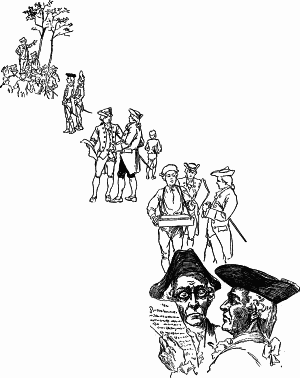
It was during this time of excitement that Katherine said one morning, at breakfast, "Bram wait one minute for me. I am going to do an errand or two for my mother.
"It is a bad time, Katherine, you have chosen," said Batavius. "Full of men are the streets, excited men too, and of swaggering [Pg 147]British soldiers, whom it would be a great pleasure to tie up in a halter. The British I hate,—bullying curs, everyone of them!"
"Well, I know that you hate the British, Batavius. You say so every hour."
"Katherine!"
"That is so, Joanna."
Madam looked annoyed. Joris rose, and said, "Come then, Katherine, thou shalt go with me and with Bram both. Batavius need not then fear for thee."
His voice was so tender that Katherine felt an unusual happiness and exultation; and she was also young enough to be glad to see the familiar streets again, and to feel the pulse of their vivid life make her heart beat quicker.
At Kip's store, Bram left her. She had felt so free and unremarked, that she said, "Wait not for me, Bram. By myself I will go home. Or perhaps I might call upon Miriam Cohen. What dost thou think?" And Bram's large, handsome face flushed like a girl's with pleasure, as he answered, "That I would like, and there thou could rest until the dinner-hour. As I go home, I could call for thee."
So, after selecting the goods her mother needed at Kip's, Katherine was going up Pearl Street, when she heard herself called in a familiar and urgent voice. At the same moment a door was flung open; and Mrs. Gordon, running down the few steps, put her hand upon the girl's shoulder.
"Oh, my dear, this is a piece of good fortune past belief! Come into my lodgings. Oh, indeed you shall! I will have no excuse. [Pg 148]Surely you owe Dick and me some reward after the pangs we have suffered for you."
She was leading Katherine into the house as she spoke; and Katherine had not the will, and therefore not the power, to oppose her. She placed the girl by her side on the sofa; she took her hands, and, with a genuine grief and love, told her all that "poor Dick" had suffered and was still suffering for her sake.
"It was the most unprovoked challenge, my dear; and Neil Semple behaved like a savage, I assure you. When Dick was bleeding from half a dozen wounds, a gentleman would have been satisfied, and accepted the mediation of the seconds; but Neil, in his blind passion, broke the code to pieces. A man who can do nothing but be in a rage is a ridiculous and offensive animal. Have you seen him since his recovery? For I hear that he has crawled out of his bed again."
"Him I have not seen."
"Gracious powers, miss! Is that all you say, 'Him I have not seen'? Make me patient with so insensible a creature! Here am I almost distracted with my three months' anxiety and poor Dick, so gone as to be past knowledge, breaking his true heart for a sight of you; and you answer me as if I had asked, 'Pray, have you seen the newspaper to-day?'"
Then Katherine covered her face, and sobbed with a hopelessness and abandon that equally fretted Mrs. Gordon. "I wish I knew one corner of this world inaccessible to lovers," she cried. "Of all creatures, they are the most ridiculous and unreasonable. Now, what are you crying for, child?"
[Pg 149]"If I could only see Richard,—only see him for one moment!"
"That is exactly what I am going to propose. He will get better when he has seen you. I will call a coach, and we will go at once."
"Alas! Go I dare not. My father and my mother!"
"And Dick,—what of Dick, poor Dick, who is dying for you?" She went to the door, and gave the order for a coach. "Your lover, Katherine. Child, have you no heart? Shall I tell Dick you would not come with me?"
"Be not so cruel to me. That you have seen me at all, why need you say?"
"Oh! indeed, miss, do not imagine yourself the only person who values the truth. Dick always asks me, 'Have you seen her?' 'Tis my humour to be truthful, and I am always swayed by my inclination. I shall feel it to be my duty to inform him how indifferent you are. Katherine, put on your bonnet again. Here also are my veil and cloak. No one will perceive that it is you. It is the part of humanity, I assure you. Do so much for a poor soul who is at the grave's mouth."
"My father, I promised him"—
"O child! have six penny worth of common feeling about you. The man is dying for your sake. If he were your enemy, instead of your true lover, you might pity him so much. Do you not wish to see Dick?"
"My life for his life I would give."
"Words, words, my dear. It is not your life he wants. He asks only ten minutes of your time. And if you desire to see him, give your[Pg 150]self the pleasure. There is nothing more silly than to be too wise to be happy."
While thus alternately urging and persuading Katherine, the coach came, the disguise was assumed, and the two drove rapidly to the "King's Arms." Hyde was lying upon a couch which had been drawn close to the window. But in order to secure as much quiet as possible, he had been placed in one of the rooms at the rear of the tavern,—a large, airy room, looking into the beautiful garden which stretched away backward as far as the river. He had been in extremity. He was yet too weak to stand, too weak to endure long the strain of company or books or papers.
He heard his aunt's voice and footfall, and felt, as he always did, a vague pleasure in her advent. Whatever of life came into his chamber of suffering came through her. She brought him daily such intelligences as she thought conducive to his recovery; and it must be acknowledged that it was not always her "humour to be truthful." For Hyde had so craved news of Katherine, that she believed he would die wanting it; and she had therefore fallen, without one conscientious scruple, into the reporter's temptation,—inventing the things which ought to have taken place, and did not. "For, in faith, Nigel," she said to her husband, in excuse, "those who have nothing to tell must tell lies."
Her reports had been ingenious and diversified. "She had seen Katherine at one of the windows,—the very picture of distraction." "She had been told that Katherine was breaking her heart about him;" also, "that Elder
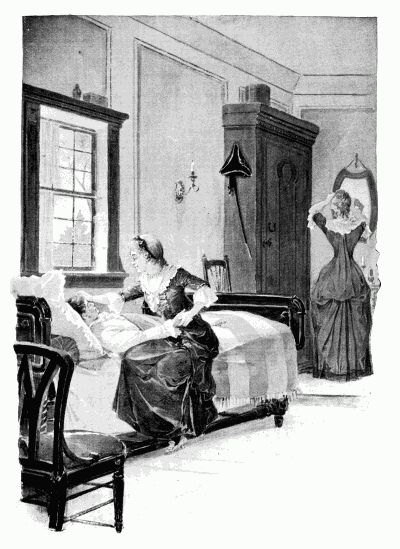
[Pg 152][Pg 153]Semple and Councillor Van Heemskirk had quarrelled because Katharine had refused to see Neil, and the elder blamed Van Heemskirk for not compelling her obedience." Whenever Hyde had been unusually depressed or unusually nervous, Mrs. Gordon had always had some such comforting fiction ready. Now, here was the real Katherine. Her very presence, her smiles, her tears, her words, would be a consolation so far beyond all hope, that the girl by her side seemed a kind of miracle to her.
She was far more than a miracle to Hyde. As the door opened, he slowly turned his head. When he saw who was really there, he uttered a low cry of joy,—a cry pitiful in its shrill weakness. In a moment Katherine was close to his side. This was no time for coyness, and she was too tender and true a woman to feel or to affect it. She kissed his hands and face, and whispered on his lips the sweetest words of love and fidelity. Hyde was in a rapture. His joyful soul made his pale face luminous. He lay still, speechless, motionless, watching and listening to her.
Mrs. Gordon had removed Katherine's veil and cloak, and considerately withdrawn to a mirror at the extremity of the room, where she appeared to be altogether occupied with her own ringlets. But, indeed, it was with Katherine and Hyde one of those supreme hours when love conquers every other feeling. Before the whole world they would have avowed their affection, their pity, and their truth.
Hyde could speak little, but there was no need of speech. Had he not nearly died for her? Was not his very helplessness a plea [Pg 154]beyond the power of words? She had only to look at the white shadow of humanity holding her hand, and remember the gay, gallant, handsome soldier who had wooed her under the water-beeches, to feel that all the love of her life was too little to repay his devotion. And so quickly, so quickly, went the happy moments! Ere Katherine had half said, "I love thee," Mrs. Gordon reminded her that it was near the noon; "and I have an excellent plan," she continued; "you can leave my veil and cloak in the coach, and I will leave you at the first convenient place near your home. At the turn of the road, one sees nobody but your excellent father or brother, or perhaps Justice Van Gaasbeek, all of whom we may avoid, if you will but consider the time."
"Then we must part, my Katherine, for a little. When will you come again?"
This was a painful question, because Katherine felt, that, however she might excuse herself for the unforeseen stress of pity that all unaware had hurried her into this interview, she knew she could not find the same apology for one deliberate and prearranged.
"Only once more," Hyde pleaded. "I had, my Katherine, so many things to say to you. In my joy, I forgot all. Come but once more. Upon my honour, I promise to ask Katherine Van Heemskirk only this once. To-morrow? 'No.' Two days hence, then?"
"Two days hence I will come again. Then no more."
He smiled at her, and put out his hands; and she knelt again by his side, and kissed her "farewell" on his lips. And, as she put on [Pg 155]again her cloak and veil, he drew a small volume towards him, and with trembling hands tore out of it a scrap of paper, and gave it to her.
Under the lilac hedge that night she read it, read it over and over,—the bit of paper made almost warm and sentient by Phœdria's tender petition to his beloved,—
"When you are in company with that other man, behave as if you were absent; but continue to love me by day and by night; want me, dream of me, expect me, think of me, wish for me, delight in me, be wholly with me; in short, be my very soul, as I am yours."
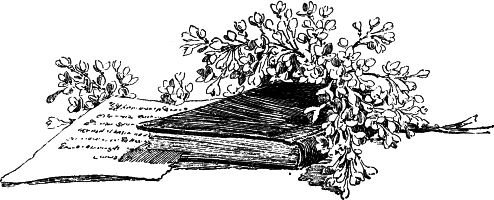
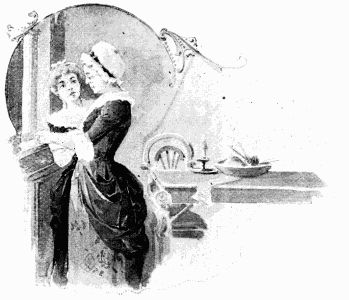
VIII.
"Let determined things to destiny
Hold unbewailed their way."
If Katherine had lived at this day, she would probably have spent her time between her promise and its fulfilment in self-analysis and introspective reasoning with her own conscience. But the women of a century ago were not tossed about with winds of various opinions, or made foolishly subtile by arguments about principles which ought never to be associated with dissent. A few strong, plain dictates had been set before Katherine as the law of her daily life; and she knew, beyond all controversy, when she disobeyed them.
In her own heart, she called the sin she had determined to commit by its most unequivocal name. "I shall make happy Richard; but my father I shall deceive and disobey, and against [Pg 157]my own soul there will be the lie." This was the position she admitted, but every woman is Eve in some hours of her life. The law of truth and wisdom may be in her ears, but the apple of delight hangs within her reach, and, with a full understanding of the consequences of disobedience, she takes the forbidden pleasure. And if the vocal, positive command of Divinity was unheeded by the first woman, mere mortal parents surely ought not to wonder that their commands, though dictated by truest love and clearest wisdom, are often lightly held, or even impotent against the voice of some charmer, pleading personal pleasure against duty, and self-will against the law infinitely higher and purer.
In truth, Katherine had grown very weary of the perpetual eulogies which Batavius delivered of everything respectable and conservative. A kind of stubbornness in evil followed her acceptance of evil. This time, at least, she was determined to do wrong, whatever the consequences might be. Batavius and his inflexible propriety irritated her: she had a rebellious desire to give him little moral shocks; and she deeply resented his constant injunctions to "remember that Joanna's and his own good name were, in a manner, in her keeping."
Very disagreeable she thought Batavius had grown, and she also jealously noted the influence he was exercising over Joanna. There are women who prefer secrecy to honesty, and sin to truthfulness; but Katherine was not one of them. If it had been possible to see her lover honourably, she would have much preferred it. She was totally destitute of that [Pg 158]contemptible sentimentality which would rather invent difficulties in a love-affair than not have them, but she knew well the storm of reproach and disapproval which would answer any such request; and her thoughts were all bent toward devising some plan which would enable her to leave home early on that morning which she had promised her lover.
But all her little arrangements failed; and it was almost at the last hour of the evening previous, that circumstances offered her a reasonable excuse. It came through Batavius, who returned home later than usual, bringing with him a great many patterns of damask and figured cloth and stamped leather. At once he announced his intention of staying at home the next morning in order to have Joanna's aid in selecting the coverings for their new chairs, and counting up their cost. He had taken the strips out of his pocket with an air of importance and complaisance; and Katherine, glancing from them to her mother, thought she perceived a fleeting shadow of a feeling very much akin to her own contempt of the man's pronounced self-satisfaction. So when supper was over, and the house duties done, she determined to speak to her. Joris was at a town meeting, and Lysbet did not interfere with the lovers. Katherine found her standing at an open window, looking thoughtfully into the autumn garden.
"Mijn moeder."
"Mijn kind."
"Let me go away with Bram in the morning. Batavius I cannot bear. About every chair-cover he will call in the whole house. The [Pg 159]only chair-covers in the world they will be. Listen, how he will talk: 'See here, Joanna. A fine piece is this; ten shillings and sixpence the yard, and good enough for the governor's house. But I am a man of some substance,—Gode zij dank!—and people will expect that I, who give every Sunday twice to the kirk, should have chairs in accordance.' Moeder, you know how it will be. To-morrow I cannot bear him. Very near quarrelling have we been for a week."
"I know, Katharine, I know. Leave, then, with Bram, and go first to Margaret Pitt's, and ask her if the new winter fashions will arrive from London this month. I heard also that Mary Blankaart has lost a silk purse, and in it five gold jacobus, and some half and quarter johannes. Ask kindly for her, and about the money; and so the morning could be passed. And look now, Katherine, peace is the best thing; and to his own house Batavius will go in a few weeks."
"That will make me glad."
"Whish, mijn kind! Thy bad thoughts should be dumb thoughts."
"Mijn moeder, sad and troubled are thy looks. What is thy sorrow?"
"For thee my heart aches often,—mine and thy good father's, too. Dost thou not suffer? Can thy mother be blind? Nothing hast thou eaten lately. Joanna says thou art restless all the night long. Thou art so changed then, that wert ever such a happy little one. Once thou did love me, Katrijntje."
"Ach, mijn moeder, still I love thee!"
"But that English soldier?"
[Pg 160]"Never can I cease to love him. See, now, the love I give him is his love. It never was thine. For him I brought it into the world. None of thy love have I given to him. Mijn moeder, thee I would not rob for the whole world; not I!"
"For all that, kleintje, hard is the mother's lot. The dear children I nursed on my breast, they go here and they go there, with this strange one and that strange one. Last night, ere to our sleep we went, thy father read to me some words of the loving, motherlike Jacob. They are true words. Every good mother has said them, at the grave or at the bridal, 'En mij aangaande, als ik van kinderen beroofd ben, zoo ben ik beroofd!'"
There was a sad pathos in the homely old words as they dropped slowly from Lysbet's lips,—a pathos that fitted perfectly the melancholy air of the fading garden, the melancholy light of the fading day, and the melancholy regret for a happy home gradually scattering far and wide. Many a year afterward Katharine remembered the hour and the words, especially in the gray glooms of late October evenings.
The next morning was one of perfect beauty, and Katharine awoke with a feeling of joyful expectation. She dressed beautifully her pale brown hair; and her intended visit to Mary Blankaart gave her an excuse for wearing her India silk,—the pretty dress Richard had seen her first in, the dress he had so often admired. Her appearance caused some remarks, which Madam Van Heemskirk replied to; and with much of her old gayety Katherine walked between her father and brother away from home.
[Pg 161]She paid a very short visit to the mantua-maker, and then went to Mrs. Gordon's. There was less effusion in that lady's manner than at her last interview with Katherine. She had a little spasm of jealousy; she had some doubts about Katherine's deserts; she wondered whether her nephew really adored the girl with the fervour he affected, or whether he had determined, at all sacrifices, to prevent her marriage with Neil Semple. Katherine had never before seen her so quiet and so cool; and a feeling of shame sprang up in the girl's heart. "Perhaps she was going to do something not exactly proper in Mrs. Gordon's eyes, and in advance that lady was making her sensible of her contempt."
With this thought, she rose, and with burning cheeks said, "I will go home, madam. Now I feel that I am doing wrong. To write to Captain Hyde will be the best way."
"Pray don't be foolish, Katherine. I am of a serious turn this morning, that is all. How pretty you are! and how vastly becoming your gown! But, indeed, I am going to ask you to change it. Yesterday, at the 'King's Arms,' I said my sister would arrive this morning with me; and I bespoke a little cotillon in Dick's rooms. In that dress you will be too familiar, my dear. See here, is not this the prettiest fashion? It is lately come over. So airy! so French! so all that!"
It was a light-blue gown and petticoat of rich satin, sprigged with silver, and a manteau of dark-blue velvet trimmed with bands of delicate fur. The bonnet was not one which the present generation would call "lovely;" but, in [Pg 162]its satin depths, Katharine's fresh, sweet face looked like a rose. She hardly knew herself when the toilet was completed; and, during its progress, Mrs. Gordon recovered all her animation and interest.
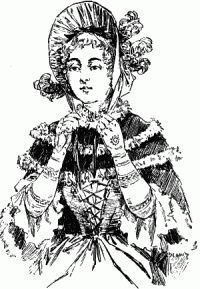
Before they were ready, a coach was in waiting; and in a few minutes they stood together at Hyde's door. There was a sound of voices within; and, when they entered, Katherine saw, with a pang of disappointment, a fine, soldierly looking man in full uniform sitting by Richard's side. But Richard appeared to be in no way annoyed by his company. He was looking much better, and wore a chamber gown of maroon satin, with deep laces showing at the wrists and bosom. When Katherine entered, he was amazed and charmed with her appearance. "Come near to me, my Katherine," he said; and as Mrs. Gordon drew from her shoulders the mantle, and from her head the bonnet, and revealed more perfectly her beautiful person and dress, his love and admiration were beyond words.
With an air that plainly said, "This is the maiden for whom I fought and have suffered: is she not worthy of my devotion?" he introduced her to his friend, Captain Earle. But, even as they spoke, Earle joined Mrs. Gordon, at a call from her; and Katherine noticed that a door near which they stood was open, and that they went into the room to which it led, and that [Pg 163]other voices then blended with theirs. But these things were as nothing. She was with her lover, alone for a moment with him; and Richard had never before seemed to her half so dear or half so fascinating.
"My Katharine," he said, "I have one tormenting thought. Night and day it consumes me like a fever. I hear that Neil Semple is well. Yesterday Captain Earle met him; he was walking with your father. He will be visiting at your house very soon. He will see you; he will speak to you. You have such obliging manners, he may even clasp this hand, my hand. Heavens! I am but a man, and I find myself unable to endure the thought."
"In my heart, Richard, there is only room for you. Neil Semple I fear and dislike."
"They will make you marry him, my darling."
"No; that they can never do."
"But I suffer in the fear. I suffer a thousand deaths. If you were only my wife, Katherine!"
She blushed divinely. She was kneeling at his side; and she put her arms around his neck, and laid her face against his. "Only your wife I will be. That is what I desire also."
"Now, Katherine? This minute, darling? Make me sure of the felicity you have promised. You have my word of honour, that as Katherine Van Heemskirk I will not again ask you to come here. But it is past my impatience to exist, and not see you. Katherine Hyde would have the right to come."
"Oh, my love, my love!"
"See how I tremble, Katherine. Life [Pg 164]scarcely cares to inhabit a body so weak. If you refuse me, I will let it go. If you refuse me, I shall know that in your heart you expect to marry Neil Semple,—the savage who has made me to suffer unspeakable agonies."
"Never will I marry him, Richard,—never, never. My word is true. You only I will marry."
"Then now, now, Katharine. Here is the ring. Here is the special license from the governor; my aunt has made him to understand all. The clergyman and the witnesses are waiting. Some good fortune has dressed you in bridal beauty. Now, Katherine? Now, now!"
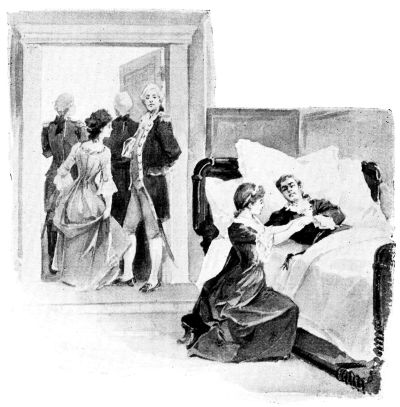
She rose, and stood white and trembling by his dear side,—speechless, [Pg 165]also. To her father and her mother her thoughts fled in a kind of loving terror. But how could she resist the pleading of one whom she so tenderly loved, and to whom, in her maiden simplicity, she imagined herself to be so deeply bounden? That very self-abnegation which forms so large a portion of a true affection urged her to compliance far more than love itself. And when Richard ceased to speak, and only besought her with the unanswerable pathos of his evident suffering for her sake, she felt the argument to be irresistible.
"Well, my Katherine, will you pity me so far?"
"All you ask, my loved one, I will grant."
"Angel of goodness! Now?"
"At your wish, Richard."
He took her hand in a passion of joy and gratitude, and touched a small bell. Immediately there was a sudden silence, and then a sudden movement, in the adjoining room. The next moment a clergyman in canonical dress came toward them. By his side was Colonel Gordon, and Mrs. Gordon and Captain Earle followed. If Katherine had then been sensible of any misgiving or repentant withdrawal, the influences surrounding her were irresistible. But she had no distinct wish to resist them. Indeed, Colonel Gordon said afterward to his wife, "he had never seen a bride look at once so lovely and so happy." The ceremony was full of solemnity, and of that deepest joy which dims the eyes with tears, even while it wreathes the lips with smiles. During it, Katherine knelt by Richard's side; and every eye was [Pg 166]fixed upon him, for he was almost fainting with the fatigue of his emotions; and it was with fast-receding consciousness that he whispered rapturously at its close, "My wife, my wife!"
Throughout the sleep of exhaustion which followed, she sat watching him. The company in the next room were quietly making merry "over Dick's triumph," but Katherine shook her head at all proposals to join them. The band of gold around her finger fascinated her. She was now really Richard's wife; and the first sensation of such a mighty change was, in her pure soul, one of infinite and reverent love. When Richard awoke, he was refreshed and supremely happy. Then Katherine brought him food and wine, and ate her own morsel beside him. "Our first meal we must take together," she said; and Hyde was already sensible of some exquisite change, some new and rarer tenderness and solicitude in all her ways toward him.
The noon hour was long past, but she made no mention of it. The wedding guests also lingered, talking and laughing softly, and occasionally visiting the happy bride and bridegroom in their blissful companionship. In those few hours Richard made sure his dominion over his wife's heart; and he had so much to tell her, and so many directions to give her, that, ere they were aware, the afternoon was well spent. The clergyman and the soldiers departed, Mrs. Gordon was a little weary, and Hyde was fevered with the very excess of his joy. The moment for parting had come; and, when it has, wise are those who delay it not. Hyde fixed his eyes upon his wife until [Pg 167]Mrs. Gordon had arranged again her bonnet and manteau; then, with a smile, he shut in their white portals the exquisite picture. He could let her go with a smile now, for he knew that Katherine's absence was but a parted presence; knew that her better part remained with him, that
"Her heart was never away,
But ever with his forever."
The coach was waiting; and, without delay, Katharine returned with Mrs. Gordon to her lodgings. Both were silent on the journey. When a great event has taken place, only the shallow and unfeeling chatter about it. Katherine's heart was full, even to solemnity; and Mrs. Gordon, whose affectation of fashionable levity was in a large measure pretence, had a kind and sensible nature, and she watched the quiet girl by her side with decided approval. "She may not be in the mode, but she is neither silly nor heartless," she decided; "and as for loving foolishly my poor, delightful Dick, why, any girl may be excused the folly."
Upon leaving the coach at Mrs. Gordon's, Katherine went to an inner room to resume her own dress. The India silk lay across a chair; and she took off, and folded with her accustomed neatness, the elegant suit she had worn. As she did so, she became sensible of a singular liking for it; and, when Mrs. Gordon entered the room, she said to her, "Madam, very much I desire this suit: it is my wedding-gown. Will you save it for me? Some day I may wear it again, when Richard is well."
[Pg 168]"Indeed, Katherine, that is a womanly thought; it does you a vast deal of credit; and, upon my word, you shall have the gown. I shall be put to straits without it, to out-dress Miss Betty Lawson; but never mind, I have a few decent gowns beside it."
"Richard, too, he will like it? You think so, madam?"
"My dear, don't begin to quote Richard to me. I shall be impatient if you do. I assure you I have never considered him a prodigy." Then, kissing her fondly, "Madam Katherine Hyde, my entire service to you. Pray be sure I shall give your husband my best concern. And now I think you can walk out of the door without much notice; there is a crowd on the street, and every one is busy about their own appearance or affairs."
"The time, madam? What is the hour?"
"Indeed, I think it is much after four o'clock. Half an hour hence, you will have to bring out your excuses. I shall wish for a little devil at your elbow to help them out. Indeed, I am vastly troubled for you."
"Her excuses" Katherine had not suffered herself to consider. She could not bear to shadow the present with the future. She had, indeed, a happy faculty of leaving her emergencies to take care of themselves; and perhaps wiser people than Katherine might, with advantage, trust less to their own planning and foresight, and more to that inscrutable power which we call chance, but which so often arranges favourably the events apparently very unfavourable. For, at the best, foresight has but probabilities to work with; but chance, [Pg 169]whose tools we know not, very often contradicts all our bad prophecies, and untangles untoward events far beyond our best prudence or wisdom. And Katharine was so happy. She was really Richard's wife; and on that solid vantage-ground she felt able to beat off trouble, and to defend her own and his rights.
"So much better you look, Katherine," said Madam Van Heemskirk. "Where have you been all the day? And did you see Mary Blankaart? And the money, is it found yet?"
The family were at the supper-table; and Joris looked kindly at his truant daughter, and motioned to the vacant chair at his side. She slipped into it, touching her father's cheek as she passed; and then she answered, "At Mary Blankaart's I was not at all, mother."
"Where, then?"
"To Margaret Pitt's I went first, and with Mrs. Gordon I have been all the day. She is lodging with Mrs. Lanier, on Pearl Street."
"Who sent you there, Katherine?"
"No one, mother. When I passed the house, my name I heard, and Mrs. Gordon came out to me; and how could I refuse her? Much had we to talk of."
Batavius saw the girl's placid face, and heard her open confession, with the greatest amazement. He looked at Joanna, and was just going to express his opinion, when Joris rose, pushed his chair a little angrily aside, and said, "There is no blame to you, Katherine. Very kind was Mrs. Gordon to you, and she is a pleasant woman. For others' faults she must not answer. That, also, is what Elder Semple says; for when past was her anger, with a heart [Pg 170]full of sorrow she went to him and to Madam Semple."
"The sorrow that is too late, of what use is it? A very pleasant woman! Perhaps she is, but then, also, a very vain, foolish woman. Every person of discretion says so; and if I had a daughter"—
"Well, then, Batavius, a daughter thou may have some day. To the man with a tender heart, God gives his daughters. Wanting in some good thing I had felt myself, if only sons I had been trusted with. A daughter is a little white lamb in the household to teach men to be gentle men."
"I was going to say this, if I had a daughter"—
"Well, then, when thou hast, more wisdom will be given thee. Come with thy father, Katrijntje, and down the garden we will walk, and see if there are dahlias yet, and how grow the gold and the white chrysanthemums."
But all the time they were in the garden together, Joris never spoke of Mrs. Gordon, nor of Katherine's visit to her. About the flowers, and the restless swallows, and the bluebirds, who still lingered, silent and anxious, he talked; and a little also of Joanna, and her new house, and of the great wedding feast that was the desire of Batavius.
"Every one he has ever spoken to, he will ask," said Katherine; "so hard he tries to have many friends, and to be well spoken of."
"That is his way, Katrijntje; every man has his way."
"And I like not the way of Batavius."
"In business, then, he has a good name, [Pg 171]honest and prudent. He will make thy sister a good husband."
But, though Joris said nothing to his daughter concerning her visit to Mrs. Gordon, he talked long with Lysbet about it. "What will be the end, thou may see by the child's face and air," he said; "the shadow and the heaviness are gone. Like the old Katherine she is to-night."
"And this afternoon comes here Neil Semple. Scarcely he believed me that Katherine was out. Joris, what wilt thou do about the young man?"
"His fair chance he is to have, Lysbet. That to the elder is promised."
"The case now is altered. Neil Semple I like not. Little he thought of our child's good name. With his sword he wounded her most. No patience have I with the man. And his dark look thou should have seen when I said, 'Katherine is not at home.' Plainly his eyes said to me, 'Thou art lying.'"
"Well, then, what thought hast thou?"
"This: one lover must push away the other. The young dominie that is now with the Rev. Lambertus de Ronde, he is handsome and a great hero. From Surinam has he come, a man who for the cross has braved savage men and savage beasts and deadly fever. No one but he is now to be talked of in the kirk; and I would ask him to the house. Often I have seen the gown and bands put the sword and epaulets behind them."
"Well, then, at the wedding of Batavius he will be asked; and if before there is a good time, I will say, 'Come into my house, and eat and drink with us.'"
[Pg 172]So the loving, anxious parents, in their ignorance, planned. Even then, accustomed in all their ways to move with caution, they saw no urgent need of interference with the regular and appointed events of life. A few weeks hence, when Joanna was married, if there was in the meantime no special opportunity, the dominie could be offered as an antidote to the soldier; and, in the interim, Neil Semple was to honourably have such "chance" as his ungovernable temper had left him.
The next afternoon he called again on Katherine. His arm was still useless; his pallor and weakness so great as to win, even from Lysbet, that womanly pity which is often irrespective of desert. She brought him wine, she made him rest upon the sofa, and by her quiet air of sympathy bespoke for him a like indulgence from her daughter. Katherine sat by her small wheel, unplaiting some flax; and Neil thought her the most beautiful creature he had ever seen. He kept angrily asking himself why he had not perceived this rare loveliness before; why he had not made sure his claim ere rivals had disputed it with him. He did not understand that it was love which had called this softer, more exquisite beauty into existence. The tender light in the eyes; the flush upon the cheek; the lips, conscious of sweet words and sweeter kisses; the heart, beating to pure and loving thoughts,—in short, the loveliness of the soul, transfiguring the meaner loveliness of flesh and blood, Neil had perceived and wondered at; but he had not that kind of love experience which divines the cause from the result.
[Pg 173]On the contrary, had Hyde been watching Katherine, he would have been certain that she was musing on her lover. He would have understood that bewitching languor, that dreaming silence, that tender air and light and colour which was the physical atmosphere of a soul communing with its beloved; a soul touching things present only with its intelligence, but reaching out to the absent with intensity of every loving emotion.
For some time the conversation was general. The meeting of the delegates, and the hospitalities offered them; the offensive and tyrannical Stamp Act; the new organization of patriots who called themselves "Sons of Liberty;" and the loss of Miss Mary Blankaart's purse,—furnished topics of mild dispute. But no one's interest was in their words, and presently Madam Van Heemskirk rose and left the room. Her husband had said, "Neil was to have some opportunities;" and the words of Joris were a law of love to Lysbet.
Neil was not slow to improve the favour. "Katherine, I wish to speak to you. I am weak and ill. Will you come here beside me?"
She rose slowly, and stood beside him; but, when he tried to take her hands, she clasped them behind her back.
"So?" he asked; and the blood surged over his white face in a crimson tide that made him for a moment or two speechless. "Why not?"
"Blood-stained are your hands. I will not take them."
The answer gave him a little comfort. It was, then, only a moral qualm. He had even no objection to such a keen sense of purity in [Pg 174]her; and sooner or later she would forgive his action, or be made to see it with the eyes of the world in which he moved.
"Katherine, I am very sorry I had to guard my honour with my sword; and it was your love I was fighting for."
"My honour you cared not for, and with the sword I could not guard it. Of me cruel and false words have been said by every one. On the streets I was ashamed to go. Even the dominie thought it right to come and give me admonition. Batavius never since has liked or trusted me. He says Joanna's good name also I have injured. And my love,—is it a thing to be fought for? You have guarded your honour, but what of mine?"
"Your honour is my honour. They that speak ill of you, sweet Katherine, speak ill of me. Your life is my life. O my precious one, my wife!"
"Such words I will not listen to. Plainly now I tell you, your wife I will never be,—never, never, never!"
"I will love you, Katherine, beyond your dream of love. I will die rather than see you the wife of another man. For your bow of ribbon, only see what I have suffered."
"And, also, what have you made another to suffer?"
"Oh, I wish that I had slain him!"
"Not your fault is it that you did not murder him."
"An affair of honour is not murder, Katherine."
"Honour!—Name not the word. From a dozen wounds your enemy was bleeding; to go [Pg 175]on fighting a dying man was murder, not honour. Brave some call you: in my heart I say, 'Neil Semple was a savage and a coward.'"
"Katherine, I will not be angry with you."
"I wish that you should be angry with me."
"Because some day you will be very sorry for these foolish words, my dear love."
"Your dear love I am not."
"My dear love, give me a drink of wine, I am faint."
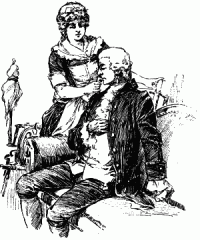
His faint whispered words and deathlike countenance moved her to human pity. She rose for the wine, and, as she did so, called her mother; but Neil had at least the satisfaction of feeling that she had ministered to his weakness, and held the wine to his lips. From this time, he visited her constantly, unmindful of her frowns, deaf to all her unkind words, patient under the most pointed slights and neglect. And as most men rate an object according to the difficulty experienced in attaining it, Katherine became every day more precious and desirable in Neil's eyes.
In the meantime, without being watched, Katherine felt herself to be under a certain amount of restraint. If she proposed a walk into the city, Joanna or madam was sure to have the same desire. She was not forbidden to visit Mrs. Gordon, but events were so arranged as to make the visit almost impossible; and only once, during the month after her marriage, [Pg 176]had she an interview with her husband. For even Hyde's impatience had recognized the absolute necessity of circumspection. The landlord's suspicions had been awakened, and not very certainly allayed. "There must be no scandal about my house, Captain," he said. "I merit something better from you;" and, after this injunction, it was very likely that Mrs. Gordon's companions would be closely scrutinized. True, the "King's Arms" was the great rendezvous of the military and government officials, and the landlord himself subserviently loyal; but, also, Joris Van Heemskirk was not a man with whom any good citizen would like to quarrel. Personally he was much beloved, and socially he stood as representative of a class which held in their hands commercial and political power no one cared to oppose or offend.
The marriage license had been obtained from the governor, but extraordinary influence had been used to procure it. Katherine was under age, and yet subject to her father's authority. In spite of book and priest and ring, he could retain his child for at least three years; and three years, Hyde—in talking with his aunt —called "an eternity of doubt and despair." These facts, Hyde, in his letters, had fully explained to Katherine; and she understood clearly how important the preservation of her secret was, and how much toward allaying suspicion depended upon her own behaviour. Fortunately Joanna's wedding day was drawing near, and it absorbed what attention the general public had for the Van Heemskirk family. For it was a certain thing, developing into feasting [Pg 177]and dancing; and it quite put out of consideration suspicions which resulted in nothing, when people examined them in the clear atmosphere of Katherine's home.
At the feast of St. Nicholas the marriage was to take place. Early in November the preparations for it began. No such great event could happen without an extraordinary housecleaning; and from garret to cellar the housemaid's pail and brush were in demand. Spotless was every inch of paint, shining every bit of polished wood and glass; not a thimbleful of dust in the whole house. Toward the end of the month, Anna and Cornelia arrived, with their troops of rosy boys and girls, and their slow, substantial husbands. Batavius felt himself to be a very great man. The weight of his affairs made him solemn and preoccupied. He was not one of those light, foolish ones, who can become a husband and a householder without being sensible of the responsibilities they assume.
In the midst of all this household excitement Katherine found some opportunities of seeing Mrs. Gordon; and in the joy of receiving letters from, and sending letters to, her husband, she recovered a gayety of disposition which effectually repressed all urgent suspicions. Besides, as the eventful day drew near, there was so much to attend to. Joanna's personal goods, her dresses and household linen, her china, and wedding gifts, had to be packed; the house was decorated; and there was a most amazing quantity of delicacies to be prepared for the table.
In the middle of the afternoon of the day before the marriage, there was the loud rat-tat-[Pg 178]tat of the brass knocker, announcing a visitor. But visitors had been constant since the arrival of Cornelia and Anna, and Katherine did not much trouble herself as to whom it might be. She was standing upon a ladder, pinning among the evergreens and scarlet berries rosettes and bows of ribbon of the splendid national colour, and singing with a delightsome cheeriness,—
"But the maid of Holland,
For her own true love,
Ties the splendid orange,
Orange still above!
O oranje boven!
Orange still above!"
"Orange still above! Oh, my dear, don't trouble yourself to come down! I can pass the time tolerably well, watching you."
It was Mrs. Gordon, and she nodded and laughed in a triumphant way that very quickly brought Katherine to her side. "My dear, I kiss you. You are the top beauty of my whole acquaintance." Then, in a whisper, "Richard sends his devotion. And put your hand in my muff: there is a letter. And pray give me joy: I have just secured an invitation. I asked the councillor and madam point blank for it. Faith, I think I am a little of a favourite with them! Every one is talking of the bridegroom, and the bridegroom is talking to every one. Surely, my dear, he imagines himself to be the only man that will ever again commit matrimony. Oranje boven, everywhere!" Then, with a little exultant laugh, "Above the Tartan, at any rate. How is the young Bruce? My [Pg 179]dear, if you don't make him suffer, I shall never forgive you. Alternate doses of hope and despair, that would be my prescription."
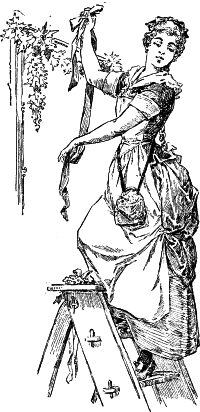
Katherine shook her head.
"Take notice, in particular, that I don't understand nods and shakes and sighs and signs. What is your opinion, frankly?"
"On my wedding day, as I left Richard, this he said to me: 'My honour, Katherine, is now in your keeping.' By the lifting of one eyelash, I will not stain it."
"My dear, you are perfectly charming. You always convince me that I am a better woman than I imagine myself. I shall go straight to Dick, and tell him how exactly proper you are. Really, you have more perfections than any one woman has a right to."
"To-morrow, if I have a letter ready, you will take it?"
"I will run the risk, child. But really, if you could see the way mine host of the 'King's Arms' looks at me, you would be sensible of my courage. I am persuaded he thinks I carry you under my new wadded cloak. Now, adieu. Return to your evergreens and ribbons.
"'For your own true love,
Tie the splendid orange,
Orange still above!'"
[Pg 180]And so, lightly humming Katharine's favourite song, she left the busy house.
Before daylight the next morning, Batavius had every one at his post. The ceremony was to be performed in the Middle Kirk, and he took care that Joanna kept neither Dominie de Ronde nor himself waiting. He was exceedingly gratified to find the building crowded when the wedding party arrived. Joanna's dress had cost a guinea a yard, his own broadcloth and satin were of the finest quality, and he felt that the good citizens who respected him ought to have an opportunity to see how deserving he was of their esteem. Joanna, also, was a beautiful bride; and the company was entirely composed of men of honour and substance, and women of irreproachable characters, dressed with that solid magnificence gratifying to a man who, like Batavius, dearly loved respectability.
Katherine looked for Mrs. Gordon in vain; she was not in the kirk, and she did not arrive until the festival dinner was nearly over. Batavius was then considerably under the excitement of his fine position and fine fare. He sat by the side of his bride, at the right hand of Joris; and Katherine assisted her mother at the other end of the table. Peter Block, the first mate of the "Great Christopher," was just beginning to sing a song,—a foolish, sentimental ditty for so big and bluff a fellow,—in which some girl was thus entreated,—
"Come, fly with me, my own fair love;
My bark is waiting in the bay,
And soon its snowy wings will speed
To happy lands so far away,
"And there, for us, the rose of love
[Pg 181]
Shall sweetly bloom and never die.
Oh, fly with me! We'll happy be
Beneath fair Java's smiling sky."
"Peter, such nonsense as you sing," said Batavius, with all the authority of a skipper to his mate. "How can a woman fly when she has no wings? And to say any bark has wings is not the truth. And what kind of rose is the rose of love? Twelve kinds of roses I have chosen for my new garden, but that kind I never heard of; and I will not believe in any rose that never dies. And you also have been to Java; and well you know of the fever and blacks, and the sky that is not smiling, but hot as the place which is not heaven. No respectable person would want to be a married man in Java. I never did."
"Sing your own songs, skipper. By yourself you measure every man. If to the kingdom of heaven you did not want to go, astonished and angry you would be that any one did not like the place which is not heaven."
"Come, friends and neighbours," said Joris cheerily, "I will sing you a song; and every one knows the tune to it, and every one has heard their vaders and their moeders sing it, —sometimes, perhaps, on the great dikes of Vaderland, and sometimes in their sweet homes that the great Hendrick Hudson found out for them. Now, then, all, a song for
"'MOEDER HOLLAND.
"'We have taken our land from the sea,
Its fields are all yellow with grain,
Its meadows are green on the lea,—
[Pg 182]
And now shall we give it to Spain?
No, no, no, no!
"'We have planted the faith that is pure,
That faith to the end we'll maintain;
For the word and the truth must endure.
Shall we bow to the Pope and to Spain?
No, no, no, no!
"'Our ships are on every sea,
Our honour has never a stain,
Our law and our commerce are free:
Are we slaves for the tyrant of Spain?
No, no, no, no!
"'Then, sons of Batavia, the spade,—
The spade and the pike and the main,
And the heart and the hand and the blade;
Is there mercy for merciless Spain?
No, no, no, no!'"
By this time the enthusiasm was wonderful. The short, quick denials came hotter and louder at every verse; and it was easy to understand how these large, slow men, once kindled to white heat, were both irresistible and unconquerable. Every eye was turned to Joris, who stood in his massive, manly beauty a very conspicuous figure. His face was full of feeling and purpose, his large blue eyes limpid and shining; and, as the tumult of applause gradually ceased, he said,—
"My friends and neighbours, no poet am I; but always wrongs burn in the heart until plain prose cannot utter them. Listen to me. If we wrung the Great Charter and the right of self-taxation from Mary in A.D. 1477; if in A.D. 1572 we taught Alva, by force of arms, how dear to us was our maxim, 'No taxation without representation,'—
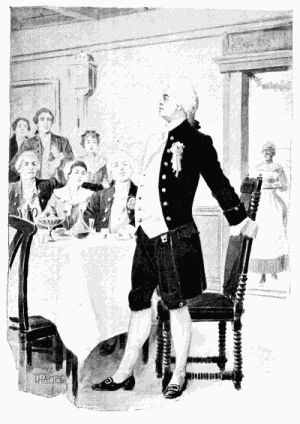
"Shall we give up our long-cherished right?
Make the blood of our fathers in vain?
Do we fear any tyrant to fight?
Shall we hold out our hands for the chain?
No, no, no, no!"
Even the women had caught fire at this allusion to the injustice of the Stamp Act and Quartering Acts, then hanging over the liberties of the Province; and Mrs. Gordon looked curiously and not unkindly at the latent rebels. "England will have foemen worthy of her steel if she turns these good friends into enemies," she reflected; and then, following some irresistible impulse, she rose with the company, at the request of Joris, to sing unitedly the patriotic invocation,—
"O Vaderland, can we forget thee,—
Thy courage, thy glory, thy strife?
O Moeder Kirk, can we forget thee?
No, never! no, never! through life.
No, no, no, no!"
The emotion was too intense to be prolonged; and Joris instantly pushed back his chair, and said, "Now, then, friends, for the dance. Myself I think not too old to take out the bride."
Neil Semple, who had looked like a man in a dream during the singing, went eagerly to Katherine as soon as Joris spoke of dancing. "He felt strong enough," he said, "to tread a measure in the bride dance, and he hoped she would so far honour him."
"No, I will not, Neil. I will not take your hands. Often I have told you that."
"Just for to-night, forgive me, Katherine."
"I am sorry that all must end so; I cannot [Pg 186]dance any more with you;" and then she affected to hear her mother calling, and left him standing among the jocund crowd, hopeless and distraught with grief. He was not able to recover himself, and the noise and laughter distracted and made him angry. He had expected so much from this occasion, from its influence and associations; and it had been altogether a disappointment. Mrs. Gordon's presence troubled him, and he was not free from jealousy regarding the young dominie. He had received a call from a church in Haarlem; and the Consistory had requested him to become a member of the Coetus, and accept it. Joris had interested himself much in his favour; Katherine listened with evident pleasure to his conversation. The fire of jealousy burns with very little fuel; and Neil went away from Joanna's wedding-feast hating very cordially the young and handsome Dominie Lambertus Van Linden.
The elder noticed every thing, and he was angry at this new turn in affairs. He felt as if Joris had purposely brought the dominie into his house to further embarrass Neil; and he said to his wife after their return home, "Janet, our son Neil has lost the game for Katherine Van Heemskirk. I dinna care a bodle for it now. A man that gets the woman he wants vera seldom gets any other gude thing."
"Elder!"
"Ah, weel, there's excepts! I hae mind o' them. But Neil won't be long daunted. I looked in on him as I cam' upstairs. He was sitting wi' a law treatise, trying to read his trouble awa'. He's a brave soul. He'll hae [Pg 187]honours and charges in plenty; and there's vera few women that are worth a gude office—if you hae to choose atween them."
"You go back on your ain words, Elder. Tak' a sleep to yoursel'. Your pillow may gie you wisdom."
And, while this conversation was taking place, they heard the pleasant voices of Van Heemskirk's departing guests, as, with snatches of song and merry laughter, they convoyed Batavius and his bride to their own home. And, when they got there, Batavius lifted up his lantern and showed them the motto he had chosen for its lintel; and it passed from lip to lip, till it was lifted altogether, and the young couple crossed their threshold to his ringing good-will,—
"Poverty—always a day's sail behind us!"
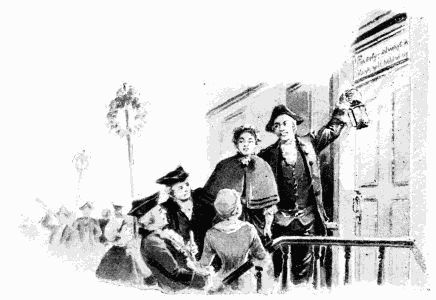
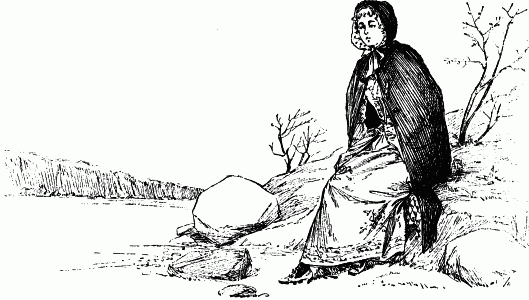
IX.
Now many memories make solicitous
The delicate love lines of her mouth, till, lit
With quivering fire, the words take wing from it;
As here between our kisses we sit thus
Speaking of things remembered, and so sit
Speechless while things forgotten call to us."
Joanna's wedding occurred at the beginning of the winter and the winter festivities. But, amid all the dining and dancing and skating, there was a political anxiety and excitement that leavened strongly every social and domestic event. The first Colonial Congress had passed the three resolutions which proved to be the key-note of resistance and of liberty. Joris had emphatically indorsed its action. The odious Stamp Act was to be met by the refusal of American merchants either to import English goods, or to sell them upon commission, until it was repealed. Homespun became fashionable. During the first three months of [Pg 189]the year, it was a kind of disgrace to wear silk or satin or broadcloth; and a great fair was opened for the sale of articles of home manufacture. The Government kept its hand upon the sword. The people were divided into two parties, bitterly antagonistic to each other. The "Sons of Liberty" were keeping guard over the pole which symbolized their determination; the British soldiery were swaggering and boasting and openly insulting patriots on the streets; and the "New York Gazette," in flaming articles, was stimulating to the utmost the spirit of resistance to tyranny.
And these great public interests had in every family their special modifications. Joris was among the two hundred New York merchants who put their names to the resolutions of the October Congress; Bram was a conspicuous member of the "Sons of Liberty;" but Batavius, though conscientiously with the people's party, was very sensible of the annoyance and expense it put him to. Only a part of his house was finished, but the building of the rest was in progress; and many things were needed for its elegant completion, which were only to be bought from Tory importers, and which had been therefore nearly doubled in value. When liberty interfered with the private interests of Batavius, he had his doubts as to whether it was liberty. Often Bram's overt disloyalty irritated him beyond endurance. For, since he had joined the ranks of married men and householders, Batavius felt that unmarried men ought to wait for the opinions and leadership of those who had responsibilities.
Joanna talked precisely as Batavius talked. [Pg 190]All of his enunciations met with her "Amen." There are women who are incapable of but one affection,—that one which affects them in especial,—and Joanna was of this order. "My husband" was perpetually on her tongue. She looked upon her position as a wife and housekeeper as unique. Other woman might have, during the past six thousand years, held these positions in an indifferent kind of way; but only she had ever comprehended and properly fulfilled the duties they involved. Madam Van Heemskirk smiled a little when Joanna gave her advices about her house and her duties, when she disapproved of her father's political attitude, when she looked injured by Bram's imprudence.
"Not only is wisdom born with Joanna and Batavius, it will also die with them; so they think," said Katharine indignantly, after one of Joanna's periodical visitations.
A tear twinkled in madam's eyes; but she answered, "I shall not distress myself overmuch. Always I have said, 'Joanna has a little soul. Only what is for her own good can she love.'"
"It is Batavius; and a woman must love her husband, mother."
"That is the truth: first and best of all, she must love him, Katherine; but not as the dog loves and fawns on his master, or the squaw bends down to her brave. A good woman gives not up her own principles and thoughts and ways. A good woman will remember the love of her father and mother and brother and sister, her old home, her old friends; and contempt she will not feel and show for the things [Pg 191]of the past, which often, for her, were far better than she was worthy of."
"There is one I love, mother, love with all my soul. For him I would die. But for thee also I would die. Love thee, mother? I love thee and my father better because I love him. My mother, fret thee not, nor think that ever Joanna can really forget thee. If a daughter could forget her good father and her good mother, then with the women who sit weeping in the outer darkness, God would justly give her her portion. Such a daughter could not be."
Lysbet sadly shook her head. "When I was a little girl, Katherine, I read in a book about the old Romans, how a wicked daughter over the bleeding corpse of her father drove her chariot. She wanted his crown for her own husband; and over the warm, quivering body of her father she drove. When I read that story, Katherine, my eyes I covered with my hands. I thought such a wicked woman in the world could not be. Alas, mijn kind! often since then I have seen daughters over the bleeding hearts of their mothers and fathers drive; and frown and scold and be much injured and offended if once, in their pain and sorrow, they cry out."
"But this of me remember, mother: if I am not near thee, I shall be loving thee, thinking of thee; telling my husband, and perhaps my little children about thee,—how good thou art, how pretty, how wise. I will order my house as thou hast taught me, and my own dear ones will love me better because I love thee. If to my own mother I be not true, can my husband [Pg 192]be sure I will be true to him, if comes the temptation strong enough? Sorry would I be if my heart only one love could hold, and ever the last love the strong love."
Still, in spite of this home trouble, and in spite of the national anxiety, the winter months went with a delightsome peace and regularity in the Van Heemskirk household. Neil Semple ceased to visit Katherine after Joanna's wedding. There was no quarrel, and no interruption to the kindness that had so long existed between the families; frequently they walked from kirk together,—Madam Semple and Madam Van Heemskirk, Joris and the elder, Katherine and Neil. But Neil never again offered her his hand; and such conversation as they had was constrained and of the most conventional character.
Very frequently, also, Dominic Van Linden spent the evening with them. Joris delighted in his descriptions of Java and Surinam; and Lysbet and Katherine knit their stockings, and listened to the conversation. It was evident that the young minister was deeply in love, and equally evident that Katharine's parents favoured his suit. But the lover felt, that, whenever he attempted to approach her as a lover, Katherine surrounded herself with an atmosphere that froze the words of admiration or entreaty upon his lips.
Joris, however, spoke for him. "He has told me how truly he loves thee. Like an honest man he loves thee, and he will make thee a wife honoured of many. No better husband can thou have, Katherine." So spoke her father to her one evening in the early spring, [Pg 193]as they stood together over the budding snowdrops and crocus.
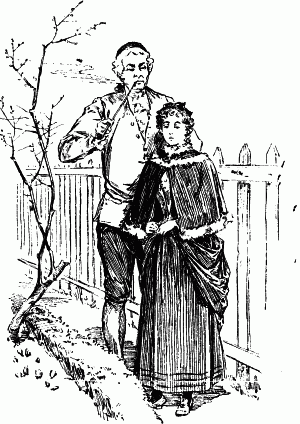
"There is no love in my heart for him, father."
"Neil pleases thee not, nor the dominie. Whom is it thou would have, then? Surely not that Englishman now? The whole race I hate,—swaggering, boastful tyrants, all of them. I will not give thee to any Englishman."
"If I marry not him, then will I stay with thee always."
"Nonsense that is. Thou must marry, like other women. But not him; I would never forgive thee; I would never see thy face again."
"Very hard art thou to me. I love Richard; can I love this one and then that one? If I were so light-of-love, contempt I should have from all, even from thee."
"Now, I have something to say. I have heard that some one,—very like to thee,—some one went twice or three times with Mrs. Gordon to see the man when he lay ill at the 'King's Arms.' To such talk, my anger and my scorn soon put an end; and I will not ask of thee whether it be true, or whether it be false. For a young girl I can feel."
"O father, if for me thou could feel!"
"See, now, if I thought this man would be to thee a good husband, I would say, 'God made [Pg 194]him, and God does not make all his men Dutchmen;' and I would forgive him his light, loose life, and his wicked wasting of gold and substance, and give thee to him, with thy fortune and with my blessing. But I think he will be to thee a careless husband. He will get tired of thy beauty; thy goodness he will not value; thy money he will soon spend. Three sweethearts had he in New York before thee. Their very names, I dare say, he hath forgotten ere this."
"If Richard could make you sure, father, that he would be a good husband, would you then be content that we should be married?"
"That he cannot do. Can the night make me sure it is the day? Once very much I respected Batavius. I said, 'He is a strict man of business; honourable, careful, and always apt to make a good bargain. He does not drink nor swear, and he is a firm member of the true Church. He will make my Joanna a good husband.' That was what I thought. Now I see that he is a very small, envious, greedy man; and like himself he quickly made thy sister. This is what I fear: if thou marry that soldier, either thou must grow like him, or else he will hate thee, and make thee miserable."
"Just eighteen I am. Let us not talk of husbands. Why are you so hurried, father, to give me to this strange dominie? Little is known of him but what he says. It is easy for him to speak well of Lambertus Van Linden."
"The committee from the Great Consistory have examined his testimonials. They are very good. And I am not in a hurry to give thee [Pg 195]away. What I fear is, that thou wilt be a foolish woman, and give thyself away."
Katherine stood with dropped head, looking apparently at the brown earth, and the green box borders, and the shoots of white and purple and gold. But what she really saw, was the pale, handsome face of her sick husband, its pathetic entreaty for her love, its joyful flush, when with bridal kisses he whispered, "Wife, wife, wife!"
Joris watched her curiously. The expression on her face he could not understand. "So happy she looks!" he thought, "and for what reason?" Katherine was the first to speak.
"Who has told you anything about Captain Hyde, father?"
"Many have spoken."
"Does he get back his good health again?"
"I hear that. When the warm days come, to England he is going. So says Jacob Cohen. What has Mrs. Gordon told thee? for to see her I know thou goes."
"Twice only have I been. I heard not of England."
"But that is certain. He will go, and what then? Thee he will quite forget, and never more will thou see or hear tell of him."
"That I believe not. In the cold winter one would have said of these flowers, 'They come no more.' But the winter goes away, and then here they are. Richard has been in the dead valley, der shaduwe des doods. Sometimes I thought, he will come back to me no more. But now I am sure I shall see him again."
Joris turned sadly away. That night he did [Pg 196]not speak to her more. But he had the persistence which is usually associated with slow natures. He could not despair. He felt that he must go steadily on trying to move Katherine to what he really believed was her highest interest. And he permitted nothing to discourage him for very long. Dominie Van Linden was also a prudent man. He had no intention in his wooing to make haste and lose speed. As to Katherine's love troubles, he had not been left in ignorance of them. A great many people had given him such information as would enable him to keep his own heart from the wiles of the siren. He had also a wide knowledge of books and life, and in the light of this knowledge he thought that he could understand her. But the conclusion that he deliberately came to was, that Katherine had cared neither for Hyde nor Semple, and that the unpleasant termination of their courtship had made her shy of all lover-like attentions. He believed that if he advanced cautiously to her he might have the felicity of surprising and capturing her virgin affection. And just about so far does any amount of wisdom and experience help a man in a love perplexity; because every mortal woman is a different woman, and no two can be wooed and won in precisely the same way.
Amid all these different elements, political, social, and domestic, Nature kept her own even, unvarying course. The gardens grew every day fairer, the air more soft and balmy, the sunshine warmer and more cherishing. Katherine was not unhappy. As Hyde grew stronger, he spent his hours in writing long letters to his wife. He told her every trivial [Pg 197]event, he commented on all she told him. And her letters revealed to him a soul so pure, so true, so loving, that he vowed "he fell in love with her afresh every day of his life." Katherine's communications reached her husband readily by the ordinary post; Hyde's had to be sent through Mrs. Gordon. But it was evident from the first that Katherine could not call there for them. Colonel Gordon would soon have objected to being made an obvious participant in his nephew's clandestine correspondence; and Joris would have decidedly interfered with visits sure to cause unpleasant remarks about his daughter. The medium was found in the mantua-maker, Miss Pitt. Mrs. Gordon was her most profitable customer, and Katherine went there for needles and threads and such small wares as are constantly needed in a household. And whenever she did so, Miss Pitt was sure to remark, in an after-thought kind of way, "Oh, I had nearly forgotten, miss! Here is a small parcel that Mrs. Gordon desired me to present to you."
One exquisite morning in May, Katherine stood at an open window looking over the garden and the river, and the green hills and meadows across the stream. Her heart was full of hope. Richard's recovery was so far advanced that he had taken several rides in the middle of the day. Always he had passed the Van Heemskirks' house, and always Katherine had been waiting to rain down upon his lifted face the influence of her most bewitching beauty and her tenderest smiles. She was thinking of the last of these events,—of Richard's rapid exhibition of a long, folded paper, [Pg 198]and the singular and emphatic wave which he gave it towards the river. His whole air and attitude had expressed delight and hope; could he really mean that she was to meet him again at their old trysting-place?
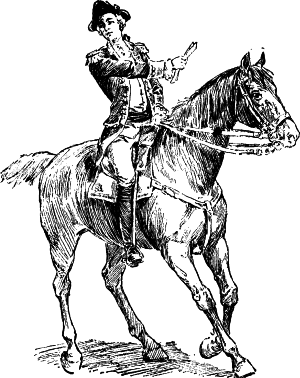
As thus she happily mused, some one called her mother from the front hall. On fine mornings it was customary to leave the door standing open; and the visitor advanced to the foot of the stairs, and called once more, "Lysbet Van Heemskirk! Is there naebody in to bid me welcome?" Then Katherine knew it was Madam Semple; and she ran to her mother's room, and begged her to go down and receive the caller. For in these days Katherine dreaded Madam Semple a little. Very naturally, the mother blamed her for Neil's suffering and loss of time and prestige; and she found it hard to forgive also her positive rejection of his suit. For her sake, she herself had been made to suffer mortification and disappointment. She had lost her friends in a way which deprived her of all the fruits of her kindness. The Gordons thought Neil had transgressed all the laws of hospitality. The Semples had a similar charge to make. And it provoked Madam Semple that Mrs. Gordon continued her friendship with Katherine. Every one else blamed Katherine altogether in the matter; Mrs. Gordon had defied the use and wont of society on such occasions, and thrown the whole blame on Neil. Somehow, in her secret heart, she even blamed Lysbet a little. "Ever since I told her there was an [Pg 199]earldom in the family, she's been daft to push her daughter into it," was her frequent remark to the elder; and he also reflected that the proposed alliance of Neil and Katharine had been received with coolness by Joris and Lysbet. "It was the soldier or the dominie, either o' them before our Neil;" and, though there was no apparent diminution of friendship, Semple and his wife frequently had a little private grumble at their own fireside.
And toward Neil, Joris had also a secret feeling of resentment. He had taken no pains to woo Katherine until some one else wanted her. It was universally conceded that he had been the first to draw his sword, and thus indulge his own temper at the expense of their child's good name and happiness. Taking these faults as rudimentary ones, Lysbet could enlarge on them indefinitely; and Joris had undoubtedly been influenced by his wife's opinions. So, below the smiles and kind words of a long friendship, there was bitterness. If there had not been, Janet Semple would hardly have paid that morning visit; for before Lysbet was half way down the stairs, Katherine heard her call out,—
"Here's a bonnie come of. But it is what a' folks expected. 'The Dauntless' sailed the morn, and Captain Earle wi' a contingent for the West Indies station. And who wi' him, guess you, but Captain Hyde, and no less? They say he has a furlough in his pocket for a twelvemonth: more like it's a clean, total dismissal. The gude ken it ought to be."
So much Katherine heard, then her mother [Pg 200]shut to the door of the sitting-room. A great fear made her turn faint and sick. Were her father's words true? Was this the meaning of the mysterious wave of the folded paper toward the ocean? The suspicion once entertained, she remembered several little things which strengthened it. Her heart failed her; she uttered a low cry of pain, and tottered to a chair, like one wounded.
It was then ten o'clock. She thought the noon hour would never come. Eagerly she watched for Bram and her father; for any certainty would be better than such cruel fear and suspense. And, if Richard had really gone, the fact would be known to them. Bram came first. For once she felt impatient of his political enthusiasm. How could she care about liberty poles and impressed fishermen, with such a real terror at her heart? But Bram said nothing; only, as he went out, she caught him looking at her with such pitiful eyes. "What did he mean?" She turned coward then, and could not voice the question. Joris was tenderly explicit. He said to her at once, "'The Dauntless' sailed this morning. Oh, my little one, sorry I am for thee!"
"Is he gone?" Very low and slow were the words; and Joris only answered, "Yes."
Without any further question or remark, she went away. They were amazed at her calmness. And for some minutes after she had locked the door of her room, she stood still in the middle of the floor, more like one that has forgotten something, and is trying to remember, than a woman who has received a blow upon her heart. No tears came to her eyes. [Pg 201]She did not think of weeping, or reproaching, or lamenting. The only questions she asked herself were, "How am I to get life over? Will such suffering kill me very soon?"
Joris and Lysbet talked it over together. "Cohen told me," said Joris, "that Captain Hyde called to bid him good-by. He said, 'He is a very honourable young man, a very grateful young man, and I rejoice that I was helpful in saving his life.' Then I asked him in what ship he was to sail, and he said 'The Dauntless.' She left her moorings this morning between nine and ten. She carries troops to Kingston, Captain Earle in command; and I heard that Captain Hyde has a year's furlough."
Lysbet drew her lips tight, and said nothing. The last shadow of her own dream had departed also, but it was of her child she thought. At that hour she hated Hyde; and, after Joris had gone, she said in low, angry tones, over and over, as she folded the freshly ironed linen, "I wish that Neil had killed him!" About two o'clock she went to Katherine. The girl opened her door at once to her. There was nothing to be said, no hope to offer. Joris had seen Hyde embark; he had heard Mrs. Gordon and the colonel bid him farewell. Several of his brother officers, also, and the privates of his own troop, had been on the dock to see him sail. His departure was beyond dispute.
And even while she looked at the woeful young face before her, the mother anticipated the smaller, festering sorrows that would spring from this great one,—the shame and mortification the mockery of those who had envied [Pg 202]Katherine; the inquiries, condolences, and advices of friends; the complacent self-congratulation of Batavius, who would be certain to remind them of every provoking admonition he had given on the subject. And who does not know that these little trials of life are its hardest trials? The mother did not attempt to say one word of comfort, or hope, or excuse. She only took the child in her arms, and wept for her. At this hour she would not wound her by even an angry word concerning him.
"I loved him so much, moeder."
"Thou could not help it. Handsome, and gallant, and gay he was. I never shall forget seeing thee dance with him."
"And he did love me. A woman knows when she is loved."
"Yes, I am sure he loved thee."
"He has gone? Really gone?"
"No doubt is there of it. Stay in thy room, and have thy grief out with thyself."
"No; I will come to my work. Every day will now be the same. I shall look no more for any joy; but my duty I will do."
They went downstairs together. The clean linen, the stockings that required mending, lay upon the table. Katherine sat down to the task. Resolutely, but almost unconsciously, she put her needle through and through. Her suffering was pitiful; this little one, who a few months ago would have wept for a cut finger, now silently battling with the bitterest agony that can come to a loving woman,—the sense of cruel, unexpected, unmerited desertion. At first Lysbet tried to talk to her; but she soon saw that the effort to answer was beyond [Pg 203]Katherine's power, and conversation was abandoned. So for an hour, an hour of speechless sorrow, they sat. The tick of the clock, the purr of the cat, the snap of a breaking thread, alone relieved the tension of silence in which this act of suffering was completed. Its atmosphere was becoming intolerable, like that of a nightmare; and Lysbet was feeling that she must speak and move, and so dissipate it, when there was a loud knock at the front door.
Katherine trembled all over. "To-day I cannot bear it, mother. No one can I see. I will go upstairs."
Ere the words were finished, Mrs. Gordon's voice was audible. She came into the room laughing, with the smell of fresh violets and the feeling of the brisk wind around her. "Dear madam," she cried, "I entreat you for a favour. I am going to take the air this afternoon: be so good as to let Katherine come with me. For I must tell you that the colonel has orders for Boston, and I may see my charming friend no more after to-day."
"Katherine, what say you? Will you go?"
"Please, mijn moeder."
"Make great haste, then." For Lysbet was pleased with the offer, and fearful that Joris might arrive, and refuse to let his daughter accept it. She hoped that Katherine would receive some comforting message; and she was glad that on this day, of all others, Captain Hyde's aunt should be seen with her. It would in some measure stop evil surmises; and it left an air of uncertainty about the captain's relationship to Katherine, which made the humiliation of his departure less keen.
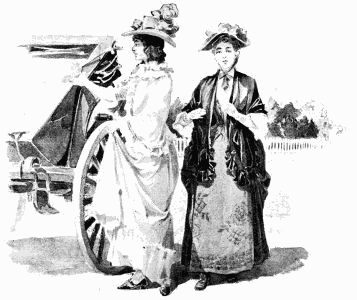
"Stay not long," she whispered, "for your father's sake. There is no good, more trouble to give him."
"Well, my dear, you look like a ghost. Have you not one smile for a woman so completely in your interest? When I promised Dick this morning that I would be sure to get word to you, I was at my wits' end to discover a way. But, when I am between the horns of a dilemma, I find it the best plan to take the bull by the horns. Hence, I have made you a visit which seems to have quite nonplussed you and your good mother."
"I thought Richard had gone."
"And you were breaking your heart, that is easy to be seen. He has gone, but he will [Pg 205]come back to-night at eight o'clock. No matter what happens, be at the river-side. Do not fail Dick: he is taking his life in his hand to see you."
"I will be there."
"La! what are you crying for, child? Poor girl! What are you crying for? Dick, the scamp? He is not worthy of such pure tears; and yet, believe me, he loves you to distraction."
"I thought he had gone—gone, without a word."
"Faith, you are not complimentary! I flatter myself that our Dick is a gentleman. I do, indeed. And, as he is yet perfectly in his senses, you might have trusted him."
"And you, do you go to Boston to-morrow?"
"The colonel does. At present, I have no such intentions. But I had to have some extraordinary excuse, and I could invent no other. However, you may say anything, if you only say it with an assurance. Madam wished me a pleasant journey. I felt a little sorry to deceive so fine a lady."
"When will Richard return?"
"Indeed, I think you will have to answer for his resolves. But he will speak for himself; and, in faith, I told him that he had come to a point where I would be no longer responsible for his actions. I am thankful to own that I have some conscience left."
The ride was not a very pleasant one. Katherine could not help feeling that Mrs. Gordon was distrait and inconsistent; and, towards its close, she became very silent. Yet she kissed her kindly, and drawing her closely for a last word, said, "Do not forget to wear [Pg 206]your wadded cloak and hood. You may have to take the water; for the councillor is very suspicious, let me tell you. Remember what I say,—the wadded cloak and hood; and good-by, good-by, my dear."
"Shall I see you soon?"
"When we may meet again, I do not pretend to say; till then, I am entirely yours; and so again good-by."
The ride had not occupied an hour; but, when Katherine got home, Lysbet was making tea. "A cup will be good for you, mijn kind." And she smiled tenderly in the face that had been so white in its woeful anguish, but on which there was now the gleam of hope. And she perceived that Katherine had received some message, she even divined that there might be some appointment to keep; and she determined not to be too wise and prudent, but to trust Katherine for this evening with her own destiny.
That night there was a meeting at the Town Hall, and Joris left the house soon after his tea. He was greatly touched by Katharine's effort to appear cheerful; and when she followed him to the door, and, ere he opened it, put her arms round his neck, and kissed him, murmuring, "My father, mijn vader!" he could not restrain his tears.
"Mijn kind, my liefste kind!" he answered. And then his soul in its great emotion turned affectionately to the supreme fatherhood; for he whispered to himself, as he walked slowly and solemnly in the pleasant evening light: "'Gelijk sich een vader outfermt over de kinderen!' Oh, so great must be Thy pity! My own heart can tell that now."
[Pg 207]For an hour or more Katherine sat in the broad light of the window, folding and unfolding the pieces of white linen, sewing a stitch or two here, and putting on a button or tape there. Madam passed quietly to and fro about her home duties, sometimes stopping to say a few words to her daughter. It was a little interval of household calm, full of household work; of love assured without need of words, of confidence anchored in undoubting souls. When Lysbet was ready to do so, she began to lay into the deep drawers of the presses the table-linen which Katherine had so neatly and carefully examined. Over a pile of fine damask napkins she stood, with a perplexed, annoyed face; and Katherine, detecting it, at once understood the cause.
"One is wanting of the dozen, mother. At the last cake-baking, with the dish of cake sent to Joanna it went. Back it has not come."
"For it you might go, Katherine. I like not that my sets are broken."
Katherine blushed scarlet. This was the opportunity she wanted. She wondered if her mother suspected the want; but Lysbet's face expressed only a little worry about the missing damask. Slowly, though her heart beat almost at her lips, she folded away her work, and put her needle, and thread, and thimble, and scissors, each in its proper place in her house-wife. So deliberate were all her actions, that Lysbet's suspicions were almost allayed. Yet she thought, "If out she wishes to go, leave I have now given her; and, if not, still the walk will do her some good." And yet there was in her heart just that element of doubt, which, [Pg 208]whenever it is present, ought to make us pause and reconsider the words we are going to speak or write, and the deed we are going to do.
The nights were yet chilly,—though the first blooms were on the trees,—and the wadded cloak and hood were not so far out of season as to cause remark. As she came downstairs, the clock struck seven. There was yet an hour, and she durst not wait so long at the bottom of the garden while it was early in the evening. When her work was done, Lysbet frequently walked down it; she had a motherly interest in the budding fruit-trees and the growing flowers. And a singular reluctance to leave home assailed Katherine. If she had known that it was to be forever, her soul could not have more sensibly taken its farewell of all the dear, familiar objects of her daily life. About her mother this feeling culminated. She found her cap a little out of place; and her fingers lingered in the lace, and stroked fondly her hair and pink cheeks, until Lysbet felt almost embarrassed by the tender, but unusual show of affection.
"Now, then, go, my Katherine. To Joanna give my dear love. Tell her that very good were the cheesecakes and the krullers, and that to-morrow I will come over and see the new carpet they have bought."
And while she spoke she was retying Katherine's hood, and admiring as she did so the fair, sweet face in its quiltings or crimson satin, and the small, dimpled chin resting upon the fine bow she tied under it. Then she followed her to the door, and watched her down the road until she saw her meet Dominie Van [Pg 209]Linden, and stand a moment holding his hand. "A message I am going for my mother," she said, as she firmly refused his escort. "Then with madam, your mother, I will sit until you return," he replied cheerfully; and Katherine answered, "That will be a great pleasure to her, sir."
A little farther she walked; but suddenly remembering that the dominie's visit would keep her mother in the house, and being made restless by the gathering of the night shadows, she turned quickly, and taking the very road up which Hyde had come the night Neil Semple challenged him, she entered the garden by a small gate at its foot, which was intended for the gardener's use. The lilacs had not much foliage, but in the dim light her dark, slim figure was undistinguishable behind them. Longingly and anxiously she looked up and down the water-way. A mist was gathering over it; and there were no boats in the channel except two pleasure-shallops, already tacking to their proper piers. "The Dauntless" had been out of sight for hours. There was not the splash of an oar, and no other river sound at that point, but the low, peculiar "wish-h-h" of the turning tide.
In the pettiest character there are unfathomable depths; and Katherine's, though yet undeveloped, was full of noble aspirations and singularly sensitive. As she stood there alone, watching and waiting in the dim light, she had a strange consciousness of some mysterious life ante-dating this life! and of a long-forgotten voice filling the ear-chambers of that spiritual body which was the celestial inhabitant of [Pg 210]her natural body. "Richard, Richard," she murmured; and she never doubted but that he heard her.
All her senses were keenly on the alert. Suddenly there was the sound of oars, and the measure was that of steady, powerful strokes. She turned her face southward, and watched. Like a flash a boat shot out of the shadow,—a long, swift boat, that came like a Fate, rapidly and without hesitation, to her very feet. Richard quickly left it and with a few strokes it was carried back into the dimness of the central channel. Then he turned to the lilac-trees.
"Katherine!"
It was but a whisper, but she heard it. He opened his arms, and she flew to their shelter like a bird to her mate.
"My love, my wife, my beautiful wife! My true, good heart! Now, at last my own; nothing shall part us again, Katherine,—never again. I have come for you—come at all risks for you. Only five minutes the boat can wait. Are you ready?"
"I know not, Richard. My father—my mother"—
"My husband! Say that also, beloved. Am I not first? If you will not go with me, here I shall stay; and, as I am still on duty, death and dishonour will be the end. O Katherine, shall I die again for you? Will you break my sword in disgrace over my head! Faith, darling, I know that you would rather die for me."
"If one word I could send them! They suspect me not. They think you are gone. It will kill my father."
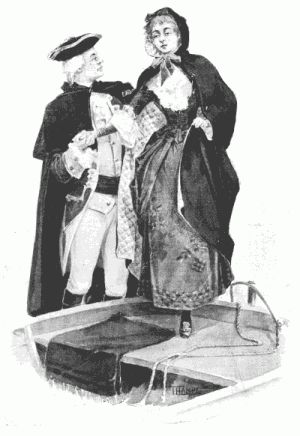
[Pg 212][Pg 213]"You shall write to them on the ship. There are a dozen fishing-boats near it. We will send the letter by one of them. They will get it early in the morning. Sweet Kate, come. Here is the boat. 'The Dauntless' lies down the bay, and we have a long pull. My wife, do you need more persuasion?"
He released her from his embrace with the words, and stood holding her hands, and looking into her face. No woman is insensible to a certain kind of authority; and there was fascination as well as power in Hyde's words and manner, emphasized by the splendour of his uniform, and the air of command that seemed to be a part of it.
"It is for you to decide, Katherine. The boat is here. Even I must obey or disobey orders. Will you not go with me, your husband, to love and life and honour; or shall I stay with you, for disgrace and death? For from you I will not part again."
She had no time to consider how much truth there was in this desperate statement. The boat was waiting. Richard was wooing her consent with kisses and entreaties. Her own soul urged her, not only by the joy of his presence, but by the memory of the anguish she had endured that day in the terror of his desertion. From the first moment she had hesitated; therefore, from the first moment she had yielded. She clung to her husband's arm, she lifted her face to his, she said softly, but clearly, "I will go with you, Richard. With you I will go. Where to, I care not at all."
They stepped into the boat, and Hyde said, "Oars." Not a word was spoken. He held [Pg 214]her within his left arm, close to his side, and partially covered with his military cloak. It was the boat belonging to the commander of "The Dauntless," and the six sailors manning it sent the light craft flying like an arrow down the bay. All the past was behind her. She had done what was irrevocable. For joy or for sorrow, her place was evermore at her husband's side. Richard understood the decision she was coming to; knew that every doubt and fear had vanished when her hand stole into his hand, when she slightly lifted her face, and whispered, "Richard."
They were practically alone upon the misty river; and Richard answered the tender call with sweet, impassioned kisses; with low, lover-like, encouraging words; with a silence that thrilled with such soft beat and subsidence of the spirit's wing, as—
"When it feels, in cloud-girt wayfaring,
The breath of kindred plumes against its feet."
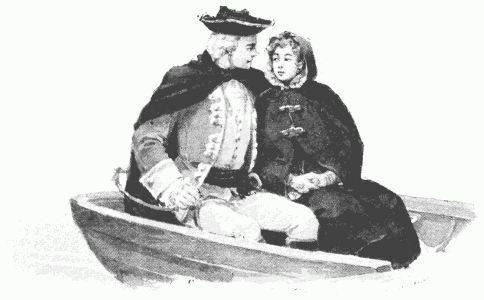
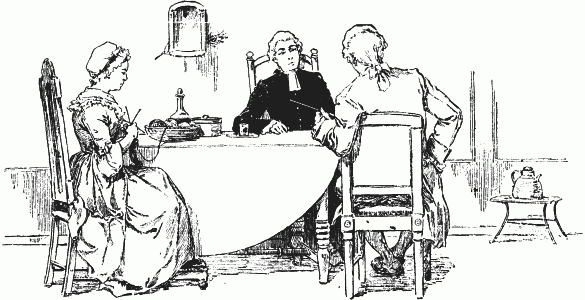
X.
"Good people, how they wrangle!
The manners that they never mend,
The characters they mangle!
They eat and drink, and scheme and plod,
And go to church on Sunday;
And many are afraid of God,
And some of Mrs. Grundy."
During that same hour Joris was in the town council. There had been a stormy and prolonged session on the Quartering Act. "To little purpose have we compelled the revocation of the Stamp Act," he cried, "if the Quartering Act upon us is to be forced. We want not English soldiers here. In our homes why should we quarter them?"
All the way home he was asking himself the question; and, when he found Dominie Van Linden talking to Lysbet, he gladly discussed it over again with him. Lysbet sat beside them, knitting and listening. Until after nine o'clock Joris did not notice the absence of [Pg 216]his daughter. "She went to Joanna's," said Lysbet calmly. No fear had yet entered her heart. Perhaps she had a vague suspicion that Katherine might also go to Mrs. Gordon's, and she was inclined to avoid any notice of the lateness of the hour. If it were even ten o'clock when she returned, Lysbet intended to make no remarks. But ten o'clock came, and the dominie went, and Joris suddenly became anxious about Katherine.
His first anger fell upon Bram. "He ought to have been at home. Then he could have gone for his sister. He is not attentive enough to Katherine; and very fond is he of hanging about Miriam Cohen's doorstep."
"What say you, Joris, about Miriam Cohen?"
"I spoke in my temper."
He would not explain his words, and Lysbet would not worry him about Katherine. "To Joanna's she went, and Batavius is in Boston. Very well, then, she has stayed with her sister."
Still, in her own heart there was a certain uneasiness. Katherine had never remained all night before without sending some message, or on a previous understanding to that effect. But the absence of Batavius, and the late hour at which she went, might account for the omission, especially as Lysbet remembered that Joanna's servant had been sick, and might be unfit to come. She was determined to excuse Katherine, and she refused to acknowledge the dumb doubt and fear that crouched at her own heart.
In the morning Joris rose very early and went into the garden. Generally this service to nature calmed and cheered him; but he [Pg 217]came to breakfast from it, silent and cross. And Lysbet was still disinclined to open a conversation about Katharine. She had enough to do to combat her own feeling on the subject; and she was sensible that Joris, in the absence of any definite object for his anger, blamed her for permitting Katherine so much liberty.
"Where, then, is Bram?" he asked testily. "When I was a young man, it was the garden or the store for me before this hour. Too much you indulge the children, Lysbet."
"Bram was late to bed. He was on the watch last night at the pole. You know, Councillor, who in that kind of business has encouraged him."
"Every night the watch is not for him."
"Oh, then, but the bad habit is made!"
"Well, well; tell him to Joanna's to go the first thing, and to send home Katherine. I like her not in the house of Batavius."
"Joanna is her sister, Joris."
"Joanna is nothing at all in this world but the wife of Batavius. Send for Katherine home. I like her best to be with her mother."
As he spoke, Bram came to the table, looking a little heavy and sleepy. Joris rose without more words, and in a few moments the door shut sharply behind him. "What is the matter with my father?"
"Cross he is." By this time Lysbet was also cross; and she continued, "No wonder at it. Katherine has stayed at Joanna's all night, and late to breakfast were you. Yet ever since you were a little boy, you have heard your father say one thing, 'Late to breakfast, hur[Pg 218]ried at dinner, behind at supper;' and I also have noticed, that, when the comfort of the breakfast is spoiled, then all the day its bad influence is felt."
In the meantime Joris reached his store in that mood which apprehends trouble, and finds out annoyances that under other circumstances would not have any attention. The store was in its normal condition, but he was angry at the want of order in it. The mail was no later than usual, but he complained of its delay. He was threatening a general reform in everything and everybody, when a man came to the door, and looked up at the name above it.
"Joris Van Heemskirk is the name, sir;" and Joris went forward, and asked a little curtly, "What, then, can I do for you?"
"I am Martin Hudde the fisherman."
"Well, then?"
"If you are Joris Van Heemskirk, I have a letter for you. I got it from 'The Dauntless' last night, when I was fishing in the bay."
Without a word Joris took the letter, turned into his office, and shut the door; and Hudde muttered as he left, "I am glad that I got a crown with it, for here I have not got a 'thank you.'"
It was Katherine's writing; and Joris held the folded paper in his hand,
and looked stupidly at it. The truth was forcing itself into his mind,
and the slow-coming conviction was a real physical agony to him. He put
his hand on the desk to steady himself; and Nature, in great drops of
sweat, made an effort to relieve the oppression and stupor which
followed the blow. In a few minutes he opened and laid it before [Pg 219]him.
Through a mist he made out these words:
MY FATHER AND MY MOTHER: I have gone with my husband. I married Richard when he was ill, and to-night he came for me. When I left home, I knew not I was to go. Only five minutes I had. In God's name, this is the truth. Always, at the end of the world, I shall love you. Forgive me, forgive me, mijn fader, mijn moeder.
Your child,
KATHERINE HYDE.
He tore the letter into fragments; but the next moment he picked them up, folded them in a piece of paper, and put them in his pocket. Then he went to Mrs. Gordon's. She had anticipated the visit, and was, in a measure, prepared for it. With a smile and outstretched hands, she rose from her chocolate to meet him. "You see, I am a terrible sluggard, Councillor," she laughed; "but the colonel left early for Boston this morning, and I cried myself into another sleep. And will you have a cup of chocolate? I am sure you are too polite to refuse me."
"Madam, I came not on courtesy, but for my daughter. Where is my Katherine?"
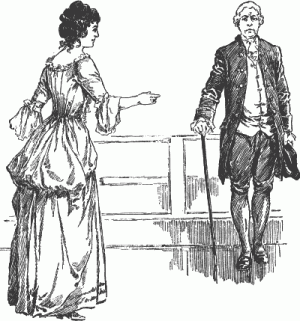
"Truth, sir, I believe her to be where every woman wishes,—with her husband. I am sure I wish the colonel was with me."
"Her husband! Who, then?"
"Indeed, Councillor, that is a question easily answered,—my nephew, Captain Hyde, at your service. You perceive, sir, we are now connections; and I assure you I have the highest sense imaginable of the honour."
"When were they married?"
[Pg 220]"In faith, I have forgotten the precise date. It was in last October; I know it was, because I had just received my winter manteau,—my blue velvet one, with the fur bands.'
"Who married them?"
"Oh, indeed! It was the governor's chaplain,—the Rev. Mr. Somers, a relative of my Lord Somers, a most estimable and respectable person, I assure you. Colonel Gordon, and Captain Earle, and myself, were the witnesses. The governor gave the license; and, in consid[Pg 221]eration of Dick's health, the ceremony was performed in his room. All was perfectly correct and regular, I"—
"It is not the truth. Pardon, madam; full of trouble am I. And it was all irregular, and very wicked, and very cruel. If regular and right it had been, then in secret it had not taken place."
"Admit, Councillor, that then it had not taken place at all; or, at least, Richard would have had to wait until Katherine was of age."
"So; and that would have been right. Until then, if love had lasted, I would have said, 'Their love is stronger than my dislike;' and I would have been content."
"Ah, sir, there was more to the question than that! My nephew's chances for life were very indifferent, and he desired to shield Katherine's name with his own"—
"Christus! What say you, madam? Had Katherine no father?"
"Oh, be not so warm, Councillor! A husband's name is a far bigger shield than a father's. I assure you that the world forgives a married woman what it would not forgive an angel. And I must tell you, also, that Dick's very life depended on the contentment which he felt in his success. It is the part of humanity to consider that."
"Twice over deceived I have been then"—
"In short, sir, there was no help for it. Dick received a most unexpected favour of a year's furlough two days ago. It was important for his wounded lung that he should go at once to a warm climate. 'The Dauntless' was on the point of sailing for the West Indies. [Pg 222]To have bestowed our confidence on you, would have delayed or detained our patient, or sent him away without his wife. It was my fault that Katherine had only five minutes given her. Oh, sir, I know my own sex! And, if you will take time to reflect, I am sure that you will be reasonable."
"Without his wife! His wife! Without my consent? No, she is not his wife."
"Sir, you must excuse me if I do not honour your intelligence or your courtesy. I have said 'she is his wife.' It is past a doubt that they are married."
"I know not, I know not—O my Katherine, my Katherine!"
"I pray you, sit down, Councillor. You look faint and ill; and in faith I am very sorry that, to make two people happy, others must be made so wretched." She rose and filled a glass with wine, and offered it to Joris, who was the very image of mental suffering,—all the fine colour gone out of his face, and his large blue eyes swimming in unshed tears.
"Drink, sir. Upon my word, you are vastly foolish to grieve so. I protest to you that Katherine is happy; and grieving will not restore your loss."
"For that reason I grieve, madam. Nothing can give me back my child."
"Come, sir, every one has his calamity; and, upon my word, you are very fortunate to have one no greater than the marriage of your daughter to an agreeable man, of honourable profession and noble family."
"Five minutes only! How could the child think? To take her away thus was cruel. [Pg 223]Many things a woman needs when she journeys."
"Oh, indeed, Katharine was well considered! I myself packed a trunk for her with every conceivable necessity, as well as gowns and manteaus of the finest material and the most elegant fashion. If Dick had been permitted, he would have robbed the Province for her. I assure you that I had to lock my trunks to preserve a change of gowns for myself. When the colonel returns, he will satisfy you that Katherine has done tolerably well in her marriage with our nephew. And, indeed, I must beg you to excuse me further. I have been in a hurry of affairs and emotions for two days; and I am troubled with the vapours this morning, and feel myself very indifferently."
Then Joris understood that he had been politely dismissed. But there was no unkindness in the act. He glanced at the effusive little lady, and saw that she was on the point of crying, and very likely in the first pangs of a nervous headache; and, without further words, he left her.
The interview had given Joris very little comfort. At first, his great terror had been that Katherine had fled without any religious sanction; but no sooner was this fear dissipated, than he became conscious, in all its force, of his own personal loss and sense of grievance. From Mrs. Gordon's lodgings he went to those of Dominie Van Linden. He felt sure of his personal sympathy; and he knew that the dominie would be the best person to investigate the circumstances of the marriage, and authenticate their propriety.
[Pg 224]Then Joris went home. On his road he met Bram, full of the first terror of his sister's disappearance. He told him all that was necessary, and sent him back to the store. "And see you keep a modest face, and make no great matter of it," he said. "Be not troubled nor elated. It belongs to you to be very prudent; for your sister's good name is in your care, and this is a sorrow outsiders may not meddle with. Also, at once go back to Joanna's, and tell her the same thing. I will not have Katherine made a wonder to gaping women."
Lysbet was still a little on the defensive; but, when she saw Joris coming home, her heart turned sick with fear. She was beating eggs for her cake-making, and she went on with the occupation; merely looking up to say, "Thee, Joris; dinner will not be ready for two hours! Art thou sick?"
"Katherine—she has gone!"
"Gone? And where, then?"
"With that Englishman; in 'The Dauntless' they have gone."
"Believe it not. 'The Dauntless' left yesterday morning: Katherine at seven o'clock last night was with me."
"Ah, he must have returned for her! Well he knew that if he did not steal her away, I had taken her from him. Yes, and I feared him. When I heard that 'The Dauntless' was to take him to the West Indies, I watched the ship. After I kissed Katherine yesterday morning, I went straight to the pier, and waited until she was on her way." Then he told her all Mrs. Gordon had said, and showed her the fragments of Katherine's letter. The [Pg 225]mother kissed them, and put them in her bosom; and, as she did so, she said softly, "it was a great strait, Joris."
"Well, well, we also must pass through it. The Dominie Van Linden has gone to examine the records; and then, if she his lawful wife be, in the newspapers I must advertise the marriage. Much talk and many questions I shall have to bear."
"'If,' 'if she his lawful wife be!' Say not 'if' in my hearing; say not 'if' of my Katherine."
"When a girl runs away from her home"—
"With her husband she went; keep that in mind when people speak to thee."
"What kind of a husband will he be to her?"
"Well, then, I think not bad of him. Nearer home there are worse men. Now, if sensible thou be, thou wilt make the best of what is beyond thy power. Every bird its own nest builds in its own way. Nay, but blind birds are we all, and God builds for us. This marriage of God's ordering may be, though not of thy ordering; and against it I would no longer fight. I think my Katherine is happy; and happy with her I will be, though the child in her joy I see not."
"So much talk as there will be. In the store and the streets, a man must listen. And some with me will condole, and some with congratulations will come; and both to me will be vinegar and gall."
"To all—friends and unfriends—say this: 'Every one chooses for themselves. Captain Hyde loved my daughter, and for her love [Pg 226]nearly he died; and my daughter loved him; and what has been from the creation, will be.' Say also, 'Worse might have come; for he hath a good heart, and in the army he is much loved, and of a very high family is he.' Joris, let me see thee pluck up thy courage like a man. Better may come of this than has come of things better looking. Much we thought of Batavius"—
"On that subject wilt thou be quiet?"
"And, if at poor little Katherine thou be angry, speak out thy mind to me; to others, say nothing but well of the dear one. Now, then, I will get thee thy dinner; for in sorrow a good meal is a good medicine."
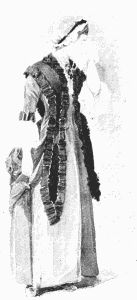
While they were eating this early dinner, Joanna came in, sad and tearful; and with loud lamentings she threw herself upon her mother's shoulder. "What, then, is the matter with thee?" asked Lysbet, with great composure.
"O mother, my Katherine! my sister Katherine!"
"I thought perhaps thou had bad news of Batavius. Thy sister Katherine hath married a very fine gentleman, and she is happy. For thou must remember that all the good men do not come from Dordrecht."
"I am glad that so you take it. I thought in very great sorrow you would be."
[Pg 227]"See that you do not say such words to any one, Joanna. Very angry will I be if I hear them. Batavius, also; he must be quiet on this matter."
"Oh, then, Batavius has many things of greater moment to think about! Of Katherine he never approved; and the talk there will be he will not like it. Before from Boston he comes back, I shall be glad to have it over."
"None of his affair it is," said Joris. "Of my own house and my own daughter, I can take the care. And if he like the talk, or if he like not the talk, there it will be. Who will stop talking because Batavius comes home?"
When Joris spoke in this tone on any subject, no one wished to continue it: and it was not until her father had left the house, that Joanna asked her mother particularly about Katherine's marriage. "Was she sure of it? Had they proofs? Would it be legal? More than a dozen people stopped me as I came over here," she said, "and asked me about everything."
"I know not how more than a dozen people knew of anything, Joanna. But many ill-natured words will be spoken, doubtless. Even Janet Semple came here yesterday, thinking over Katherine to exult a little. But Katherine is a great deal beyond her to-day. And perhaps a countess she may yet be. That is what her husband said to thy father."
"I knew not that he spoke to my father about Katherine."
"Thou knows not all things. Before thou wert married to Batavius, before Neil Semple nearly murdered him, he asked of thy father her hand. Thou wast born on thy wedding [Pg 228]day, I think. All things that happened before it have from thy memory passed away."
"Well, I am a good wife, I know that. That also is what Batavius says. Just before I got to the gate, I met Madam Semple and Gertrude Van Gaasbeeck; they had been shopping together."
"Did they speak of Katherine?"
"Indeed they did."
"Or did you speak first, Joanna? It is an evil bird that pulls to pieces its own nest."
"O mother, scolded I cannot be for Katherine's folly! My Batavius always said, 'The favourite is Katherine.' Always he thought that of me too much was expected. And Madam Semple said—and always she liked Katherine—that very badly had she behaved for a whole year, and that the end was what everybody had looked for. It is on me very hard,—I who have always been modest, and taken care of my good name. Nobody in the whole city will have one kind word to say for Katherine. You will see that it is so, mother."
"You will see something very different, Joanna. Many will praise Katherine, for she to herself has done well. And, when back she comes, at the governor's she will visit, and with all the great ladies; and not one among them will be so lovely as Katherine Hyde."
And, if Joanna had been in Madam Semple's parlour a few hours later, she would have had a most decided illustration of Lysbet's faith in the popular verdict. Madam was sitting at her tea-table talking to the elder, who had brought home with him the full supplement to Joanna's story. Both were really sorry for their old [Pg 229]friends, although there is something in the best kind of human nature that indorses the punishment of those things in which old friends differ from us.
Neil had heard nothing. He had been shut up in his office all day over an important suit; and, when he took the street again, he was weary, and far from being inclined to join any acquaintances in conversation. In fact, the absorbing topic was one which no one cared to introduce in Neil's presence; and he himself was too full of professional matters to notice that he attracted more than usual attention from the young men standing around the store-doors, and the officers lounging in front of the 'King's Arms' tavern.
He was irritable, too, with exhaustion, though he was doing his best to keep himself in control and when madam his mother said pointedly, "I'm fearing, Neil, that the bad news has made you ill; you arena at a' like yoursel'," he asked without much interest, "What bad news?"
"The news anent Katherine Van Heemskirk."
He had supposed it was some political disappointment, and at Katherine's name his pale face grew suddenly crimson.
"What of her?" he asked.
"Didna you hear? She ran awa' last night wi' Captain Hyde; stole awa' wi' him on 'The Dauntless.'"
"She would have the right to go with him, I have no doubt," said Neil with guarded calmness.
"Do you really think she was his wife?"
[Pg 230]"If she went with him, I am sure she was." He dropped the words with an emphatic precision, and looked with gloomy eyes out of the window; gloomy, but steadfast, as if he were trying to face a future in which there was no hope. His mother did not observe him. She went on prattling as she filled the elder's cup, "If there had been any wedding worth the name o' the thing, we would hae been bidden to it. I dinna believe she is married."
"Are you sure that she sailed with Captain Hyde in 'The Dauntless,' or is it a pack of women's tales?"
"The news cam' wi' your fayther the elder," answered madam, much offended. "You can mak' your inquiries there if you think he's mair reliable than I am."
Neil looked at his father, and the elder said quietly, "I wouldna be positive anent any woman; the bad are whiles good, and the good are whiles bad. But there is nae doubt that Katherine has gone with Hyde; and I heard that the military at the 'King's Arms' have been drinking bumpers to Captain Hyde and his bride; and I know that Mrs. Gordon has said they were married lang syne, when Hyde couldna raise himsel' or put a foot to the ground. But Joanna told your mother she had neither seen nor heard tell o' book, ring, or minister; and, as I say, for mysel' I'll no venture a positive opinion, but I think the lassie is married to the man she's off an' awa' wi'."
"But if she isna?" persisted madam.
In a moment Neil let slip the rein in which he had been holding himself, and in a slow, intense voice answered, "I shall make it my [Pg 231]business to find out. If Katherine is married, God bless her! If she is not, I will follow Hyde though it were around the world until I cleave his coward's heart in two." His passion grew stronger with its utterance. He pushed away his chair, and put down his cup so indifferently that it missed the table and fell with a crash to the floor.
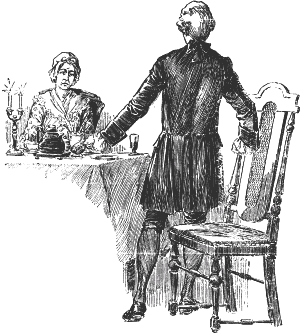
"Oh, my cheeny, my cheeny! Oh, my bonnie cups that I hae used for forty years, and no' a piece broken afore!"
"Ah, weel, Janet," said the elder, "you shouldna badger an angry man when he's drinking from your best cups."
"I canna mend nor match it in the whole Province, Elder. Oh, my bonnie cup."
"I was thinking, Janet, o' Katherine's good name. If it is gane, it is neither to mend nor to match in the whole wide world. I'll awa' and see Joris and Lysbet. And put every cross thought where you'll never find them again, Janet; an tak' your good-will in your hands, and come wi' me. Lysbet will want to see you."
"Not her, indeed! I can tell you, Elder, that Lysbet was vera cool and queer wi' me yesterday."
[Pg 232]"Come, Janet, dinna keep your good-nature in remnants. Let's hae enough to make a cloak big enough to cover a' bygone faults."
"I think, then, I ought to stay wi' Neil."
"Neil doesna want anybody near him. Leave him alane. Neil's a' right. Forty years syne I would hae broke my mother's cheeny, and drawn steel as quick as Neil did, if I heard a word against bonnie Janet Gordon." And the old man made his wife a bow; and madam blushed with pleasure, and went upstairs to put on her bonnet and India shawl.
"Woman, woman," meditated the smiling elder; "she is never too angry to be won wi' a mouthful o' sweet words, special if you add a bow or a kiss to them. My certie! when a husband can get his ain way at sic a sma' price, it's just wonderfu' he doesna buy it in perpetuity."
Joris was somewhat comforted by his old friend's sympathy; for the elder, in the hour of trial, knew how to be magnanimous. But the father's wound lay deeper than human love could reach. He was suffering from what all suffer who are wounded in their affections; for alas, alas, how poorly do we love even those whom we love most! We are not only bruised by the limitations of their love for us, but also by the limitations of our own love for them. And those who know what it is to be strong enough to wrestle, and yet not strong enough to overcome, will understand how the grief, the anger, the jealousy, the resentment, from which he suffered, amazed Joris; he had not realized before the depth and strength of his feelings.
[Pg 233]He tried to put the memory of Katherine away, but he could not accomplish a miracle. The girl's face was ever before him. He felt her caressing fingers linked in his own; and, as he walked in his house and his garden, her small feet pattered beside him. For as there are in creation invisible bonds that do not break like mortal bonds, so also there are correspondences subsisting between souls, despite the separation of distance.
"I would forget Katherine if I could," he said to Dominie Van Linden; and the good man, bravely putting aside his private grief, took the hands of Joris in his own, and bending toward him, answered, "That would be a great pity. Why forget? Trust, rather, that out of sorrow God will bring to you joy."
"Not natural is that, Dominie. How can it be? I do not understand how it can be."
"You do not understand! Well, then, och mijn jongen, what matters comprehension, if you have faith? Trust, now, that it is well with the child,"
But Joris believed it was ill with her; and he blamed not only himself, but every one in connection with Katherine, for results which he was certain might have been foreseen and prevented. Did he not foresee them? Had he not spoken plainly enough to Hyde and to Lysbet and to the child herself? He should have seen her to Albany, to her sister Cornelia. For he believed now that Lysbet had not cordially disapproved of Hyde; and as for Joanna, she had been far too much occupied with Batavius and her own marriage to care for any other thing. And one of his great fears was that [Pg 234]Katherine also would forget her father and mother and home, and become a willing alien from her own people.
He was so wrapped up in his grief, that he did not notice that Bram was suffering also. Bram got the brunt of the world's wonderings and inquiries. People who did not like to ask Joris questions, felt no such delicacy with Bram. And Bram not only tenderly loved his sister: he hated with the unreasoning passion of youth the entire English soldiery. He made no exception now. They were the visible marks of a subjection which he was sworn, heart and soul, to oppose. It humiliated him among his fellows, that his sister should have fled with one of them. It gave those who envied and disliked him an opportunity of inflicting covert and cruel wounds. Joris could, in some degree, control himself; he could speak of the marriage with regret, but without passion; he had even alluded, in some cases, to Hyde's family and expectations. The majority believed that he was secretly a little proud of the alliance. But Bram was aflame with indignation; first, if the marriage were at all doubted; second, if it were supposed to be a satisfactory one to any member of the Van Heemskirk family.
As to the doubters, they were completely silenced when the next issue of the "New York Gazette" appeared; for among its most conspicuous advertisements was the following:
Married, Oct. 19, 1765, by the Rev. Mr. Somers, chaplain to his Excellency the Governor, Richard Drake Hyde, of Hyde Manor, Norfolk, son of the late Richard Drake Hyde, and brother of William Drake Hyde, Earl [Pg 235]of Dorset and Hyde, to Katherine, the youngest daughter of Joris and Lysbet Van Heemskirk, of the city and province of New York.
Witnesses: NIGEL GORDON, H.M. Nineteenth
Light Cavalry.
GEORGE EARLE, H.M. Nineteenth
Light Cavalry.
ADELAIDE GORDON, wife of Nigel
Gordon.
This announcement took every one a little by surprise. A few were really gratified; the majority perceived that it silenced gossip of a very enthralling kind. No one could now deplore or insinuate, or express sorrow or astonishment. And, as rejoicing with one's friends and neighbours soon becomes a very monotonous thing, Katherine Van Heemskirk's fine marriage was tacitly dropped. Only for that one day on which it was publicly declared, was it an absorbing topic. The whole issue of the "Gazette" was quickly bought; and then people, having seen the fact with their own eyes, felt a sudden satiety of the whole affair.
On some few it had a more particular influence. Hyde's brother officers held high festival to their comrade's success. To every bumper they read the notice aloud, as a toast, and gave a kind of national triumph to what was a purely personal affair. Joris read it with dim eyes, and then lit his long Gouda pipe and sat smoking with an air of inexpressible loneliness. Lysbet read it, and then put the paper carefully away among the silks and satins in her bottom drawer. Joanna read it, and then immediately bought a dozen copies and sent them to the relatives of Batavius, in Dordrecht, Holland.
[Pg 236]Neil Sample read and re-read it. It seemed to have a fascination for him; and for more than an hour he sat musing, with his eyes fixed upon the fateful words. Then he rose and went to the hearth. There were a few sticks of wood burning upon it, but they had fallen apart. He put them together, and, tearing out the notice, he laid it upon them. It meant much more to Neil than the destruction of a scrap of paper, and he stood watching it, long after it had become a film of grayish ash.
Bram would not read it at all. He was too full of shame and trouble at the event; and the moments went as if they moved on lead. But the unhappy day wore away to its evening; and after tea he gathered a great nosegay of narcissus, and went to Isaac Cohen's. He did not "hang about the steps," as Joris in his temper had said. Miriam was not one of those girls who sit in the door to be gazed at by every passing man. He went into the store, and she seemed to know his footstep. He had no need to speak: she came at once from the mystery behind the crowded place into the clearer light. Plain and dark were her garments, and Bram would have been unable to describe her dress; but it was as fitting to her as are the green leaves of the rose-tree to the rose.
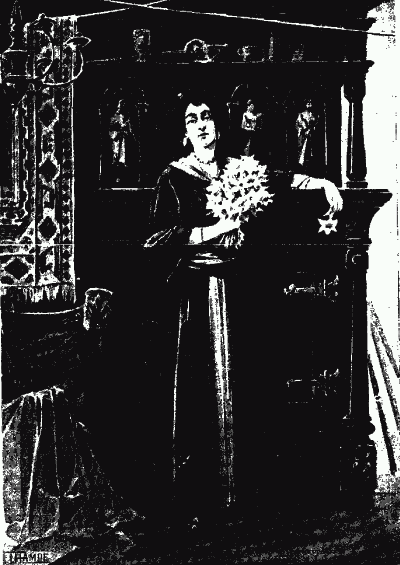
Their acquaintance had evidently advanced since that anxious evening when she had urged upon Bram the intelligence of the duel between Hyde and Neil Semple; for Bram gave her the flowers without embarrassment, and she buried her sweet face in their sweet petals, and then lifted it with a smile at once grateful and confidential. Then they began to talk of Katherine.
[Pg 238][Pg 239]"She was so beautiful and so kind," said Miriam; "just a week since she passed here, with some violets in her hand; and, when she saw me, she ran up the steps, and said, 'I have brought them for you;' and she clasped my fingers, and looked so pleasantly in my face. If I had a sister, Bram, I think she would smile at me in the same way."
"Very grateful to you was Katharine. All you did about the duel, I told her. She knows her husband had not been alive to-day, but for you. O Miriam, if you had not spoken!"
"I should have had the stain of blood on my conscience. I did right to speak. My grandfather said to me, 'You did quite right, my dear.'"
Then Bram told her all the little things that had grieved him, and they talked as dear companions might talk; only, beneath all the common words of daily life, there was some subtile sweetness that made their voices low and their glances shy and tremulous.
It was not more than an hour ere Cohen came home. He looked quickly at the young people, and then stood by Bram, and began to talk courteously of passing events. Miriam leaned, listening, against a magnificent "apostle's cabinet" in black oak—one of those famous ones made in Nuremburg in the fifteenth century, with locks and hinges of hammered-steel work, and finely chased handles of the same material. Against its carved and pillared background her dark drapery fell in almost unnoticed grace; but her fair face and small hands, with the mass of white narcissus in them, had a singular and alluring beauty. She affected [Pg 240]Bram as something sweetly supernatural might have done. It was an effort for him to answer Cohen; he felt as if it would be impossible for him to go away.
But the clock struck the hour, and the shop boy began to put up the shutters; and the old man walked to the door, taking Bram with him. Then Miriam, smiling her farewell, passed like a shadow into the darker shadows beyond; and Bram went home, wondering to find that she had cast out of his heart hatred, malice, fretful worry, and all uncharitableness. How could he blend them with thoughts of her? and how could he forget the slim, dark-robed figure, or the lovely face against the old black kas, crowned with its twelve sombre figures, or the white slender hands holding the white fragrant flowers?
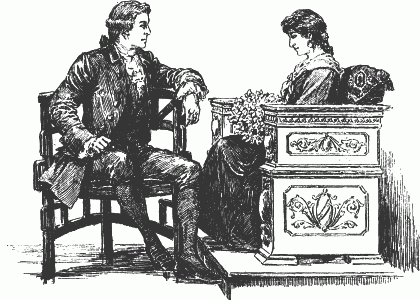
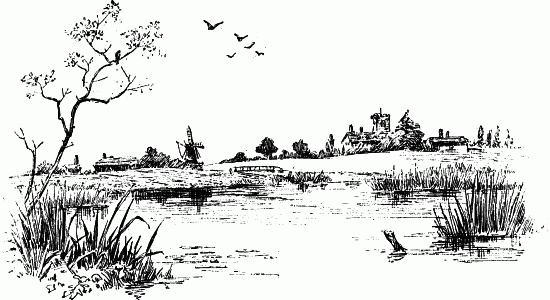
XI.
"Each man's homestead is his golden milestone,
Is the central point from which he measures
Every distance
Through the gateways of the world around him."
There are certain months in every life which seem to be full of fate, good or evil, for that life; and May was Katherine Hyde's luck month. It was on a May afternoon that Hyde had asked her love; it was on a May night she fled with him through the gray shadows of the misty river. Since then a year had gone by, and it was May once more,—an English May, full of the magic of the month; clear skies, and young foliage, and birds' songs, the cool, woody smell of wall-flowers, and the ethereal perfume of lilies.
In Hyde Manor House, there was that stir of preparation which indicates a departure. The house was before time; it had the air of early rising; the atmosphere of yesterday had [Pg 242]not been dismissed, but lingered around, and gave the idea of haste and change, and departure from regular custom. It was, indeed, an hour before the usual breakfast-time; but Hyde and Katharine were taking a hasty meal together. Hyde was in full uniform, his sword at his side, his cavalry cap and cloak on a chair near him; and up and down the gravelled walk before the main entrance a groom was leading his horse.
"I must see what is the matter with Mephisto," said Hyde. "How he is snorting and pawing! And if Park loses control of him, I shall be greatly inconvenienced for both horse and time."
The remark was partially the excuse of a man who feels that he must go, and who tries to say the hard words in less ominous form. They both rose together,—Katherine bravely smiling away tears, and looking exceedingly lovely in her blue morning-gown trimmed with frillings of thread lace; and Hyde, gallant and tender, but still with the air of a man not averse to go back to life's real duty. He took Katherine in his arms, kissed away her tears, made her many a loving promise, and then, lifting his cap and cloak, left the room. The servants were lingering around to get his last word, and to wish him "God-speed;" and for a few minutes he stood talking to his groom and soothing Mephisto. Evidently he had quite recovered his health and strength; for he sprang very easily into the saddle, and, gathering the reins in his hand, kept the restive animal in perfect control.
A moment he stood thus, the very ideal of [Pg 243]a fearless, chivalrous, handsome soldier; the next, his face softened to almost womanly tenderness, for he saw Katherine coming hastily through the dim hall and into the clear sunshine, and in her arms was his little son. She came fearlessly to his side, and lifted the sleeping child to him. He stooped and kissed it, and then kissed again the beautiful mother; and calling happily backward, "Good-by, my love; God keep you, love; good-by!" he gave Mephisto his own wild will, and was soon lost to sight among the trees of the park.
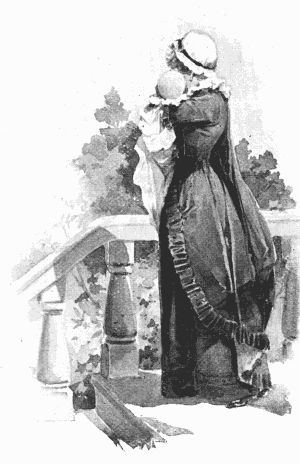
Katherine stood with her child in her arms, listening to the ever faint and fainter beat of Mephisto's hoofs. Her husband had gone back to duty, his furlough had expired, and their long, and leisurely honeymoon was over. But she was neither fearful nor unhappy. Hyde's friends had procured his exchange into a court regiment. He was only going to London, and he was still her lover. She looked forward with clear eyes as she said gratefully over to herself, "So happy am I! So good is my husband! So dear is my child! So fair and sweet is my home!"
[Pg 244]And though to many minds Hyde Manor might seem neither fair nor sweet, Katherine really liked it. Perhaps she had some inherited taste for low lands, with their shimmer of water and patches of green; or perhaps the gentle beauty of the landscape specially fitted her temperament. But, at any rate, the wide brown stretches, dotted with lonely windmills and low farmhouses, pleased her. So also did the marshes, fringed with yellow and purple flags; and the great ditches, white with water-lilies; and the high belts of natural turf; and the summer sunshine, which over this level land had a white brilliancy to which other sunshine seemed shadow. Hyde had never before found the country endurable, except during the season when the marshes were full of birds; or when, at the Christmas holidays, the ice was firm as marble and smooth as glass, and the wind blowing fair from behind. Then he had liked well a race with the famous fen-skaters.
The Manor House was neither handsome nor picturesque, though its dark-red bricks made telling contrasts among the ivy and the few large trees surrounding it. It contained a great number of rooms, but none were of large proportions. The ceilings were low, and often crossed with heavy oak beams; while the floors, though of polished oak, were very uneven. Hyde had refurnished a few of the rooms; and the showy paperings and chintzes, the fine satin and gilding, looked oddly at variance with the black oak wainscots, the Elizabethan fireplaces, and the other internal decorations.
Katherine, however, had no sense of any incongruity. She was charmed with her home, [Pg 245]from its big garrets to the great wine-bins in its underground cellars; and while Hyde wandered about the fens with his fishing-rod or gun, or went into the little town of Hyde to meet over a market dinner the neighbouring squires, she was busy arranging every room with that scrupulous nicety and cleanliness which had been not only an important part of her education, but was also a fundamental trait of her character. Indeed, no Dutch wife ever had the netheid, or passion for order and cleanliness, in greater perfection than Katherine. She might almost have come from Wormeldingen, "where the homes are washed and waxed, and the streets brushed and dusted till not a straw lies about, and the trees have a combed and brushed appearance, and do not dare to grow a leaf out of its place." So, then, the putting in order of this large house, with all its miscellaneous, uncared-for furniture, gave her a genuine pleasure.
Always pretty and sweet as a flower, always beautifully dressed, she yet directed, personally, her little force of servants, until room after room became a thing of beauty. It was her employment during those days on which Hyde was fishing or shooting; and it was not until the whole house was in exquisite condition that Katherine took him through his renovated dwelling. He was delighted, and not too selfish and indifferent to express his wonder and pleasure.
"Faith, Kate," he said, "you have made me a home out of an old lumber-house! I thought of taking you to London with me; but, upon my word, we had better stay at Hyde and beau[Pg 246]tify the place. I can run down whenever it is possible to get a few days off."
This idea gained gradually on both, and articles of luxury and adornment were occasionally added to the better rooms. The garden next fell under Katharine's care. "In sweet neglect," it no longer flaunted its beauties. Roses and stocks and tiger-lilies learned what boundaries of box meant; and if flowers have any sense of territorial rights, Katherine's must have found they were respected. Encroaching vines were securely confined within their proper limits, and grass that wandered into the gravel paths sought for itself a merciless destruction.
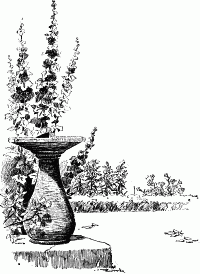
All such reforms, if they are not offensive, are stimulating and progressive. The stables, kennels, and park, as well as the land belonging to the manor, became of sudden interest to Hyde. He surprised his lawyer by asking after it, and by giving orders that in future the hay cut in the meadows should be cut for the Hyde stables. Every small wrong which he investigated and redressed increased his sense of responsibility; and the birth of his son made him begin to plan for the future in a way which brought not only great pleasure to Katherine, but also a comfortable self-satisfaction to his own heart.
Yet, even with all these favourable conditions, Katherine would not have been happy had the estrangement between herself and her parents continued a [Pg 247]bitter or a silent one. She did not suppose they would answer the letter she had sent by the fisherman Hudde; she was prepared to ask, and to wait, for pardon and for a re-gift of that precious love which she had apparently slighted for a newer and as yet untested one. So, immediately after her arrival at Jamaica, Katherine wrote to her mother; and, without waiting for replies, she continued her letters regularly from Hyde. They were in a spirit of the sweetest and frankest confidence. She made her familiar with all her household plans and wifely cares; as room by room in the old manor was finished, she described it. She asked her advice with all the faith of a child and the love of a daughter; and she sent through her those sweet messages of affection to her father which she feared a little to offer without her mother's mediation.
But when she had a son, and when Hyde agreed that the boy should be named George, she wrote a letter to him. Joris found it one April morning on his desk, and it happened to come in a happy hour. He had been working in his garden, and every plant and flower had brought his Katherine pleasantly back to his memory. All the walks were haunted by her image. The fresh breeze of the river was full of her voice and her clear laughter. The returning birds, chattering in the trees above him, seemed to ask, "Where, then, is the little one gone?"
Her letter, full of love, starred all through with pet words, and wisely reminding him more of their own past happiness than enlarging on her present joy, made his heart melt. He [Pg 248]could do no business that day. He felt that he must go home and tell Lysbet: only the mother could fully understand and share his joy. He found her cleaning the "Guilderland cup"—the very cup Mrs. Gordon had found Katherine cleaning when she brought the first love message, and took back that fateful token, her bow of orange ribbon. At that moment Lysbet's thoughts were entirely with Katherine. She was wondering whether Joris and herself might not some day cross the ocean to see their child. When she heard her husband's step at that early hour, she put down the cup in fear, and stood watching the door for his approach. The first glimpse of his face told her that he was no messenger of sorrow. He gave her the letter with a smile, and then walked up and down while she read it.
"Well, Joris, a beautiful letter this is. And thou has a grandson of thy own name—a little Joris. Oh, how I long to see him! I hope that he will grow like thee—so big and handsome as thou art, and also with thy good heart. Oh, the little Joris! Would God he was here!"
The face of Joris was happy, and his eyes shining; but he had not yet much to say. He walked about for an hour, and listened to Lysbet, who, as she polished her silver, retold him all that Katherine had said of her husband's love, and of his goodness to her. With great attention he listened to her description of the renovated house and garden, and of Hyde's purposes with regard to the estate. Then he sat down and smoked his pipe, and after dinner he returned to his pipe and his meditation. Lysbet wondered what he was considering, and [Pg 249]hoped that it might be a letter of full forgiveness for her beloved Katherine.
At last he rose and went into the garden; and she watched him wander from bed to bed, and stand looking down at the green shoots of the early flowers, and the lovely inverted urns of the brave snowdrops. To the river and back again several times he walked; but about three o'clock he came into the house with a firm, quick step, and, not finding Lysbet in the sitting-room, called her cheerily. She was in their room upstairs, and he went to her.
"Lysbet, thinking I have been—thinking of Katherine's marriage. Better than I expected, it has turned out."
"I think that Katherine has made a good marriage—the best marriage of all the children."
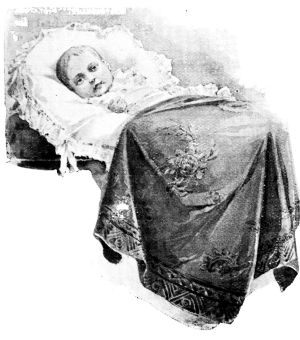
"Dost thou believe that her husband is so kind and so prudent as she says?"
"No doubt of it I have."
"See, then: I will send to Katherine her portion. Cohen will give me the order on Secor's Bank in Threadneedle Street. It is for her and her children. Can I trust them with it?"
"Katherine is no waster, and full of nobleness is her husband. [Pg 250]Write thou to him, and put it in his charge for Katherine and her children. And tell him in his honour thou trust entirely; and I think that he will do in all things right. Nothing has he asked of thee."
"To the devil he sent my dirty guilders, made in dirty trade. I have not forgot."
"Joris, the Devil speaks for a man in a passion. Keep no such words in thy memory."
"Lysbet?"
"What then, Joris?"
"The drinking-cup of silver, which my father gave us at our marriage,—the great silver one that has on it the view of Middleburg and the arms of the city. It was given to my great-grandfather when he was mayor of Middleburg. His name, also, was Joris. To my grandson shall I send it?"
"Oh, my Joris, much pleasure would thou give Katherine and me also! Let the little fellow have it. Earl of Dorset and Hyde he may be yet."
Joris blushed vividly, but he answered, "Mayor of New York he may be yet. That will please me best."
"Five grandsons hast thou, but this is the first Joris. Anna has two sons, but for his dead brothers Rysbaack named them. Cornelia has two sons; but for thee they called neither, because Van Dorn's father is called Joris, and with him they are great unfriends. And when Joanna's son was born, they called him Peter, because Batavius hath a rich uncle called Peter, who may pay for the name. So, then, Katherine's son is the first of thy grandchildren that has thy name. The dear little [Pg 251]Joris! He has blue eyes too; eyes like thine, she says. Yes, I would to him give the Middleburg cup. William Newman, the jeweller, will pack it safely, and by the next ship thou can send it to the bankers thou spoke of. I will tell Katherine so. But thou, too, write her a letter; for little she will think of her fortune or of the cup, if thy love thou send not with them."
And Joris had done all that he purposed, and done it without one grudging thought or doubting word. The cup went, full of good-will. The money was given as Katherine's right, and was hampered with no restrictions but the wishes of Joris, left to the honour of Hyde. And Hyde was not indifferent to such noble trust. He fully determined to deserve it. As for Katherine, she desired no greater pleasure than to emphasize her reliance in her husband by leaving the money absolutely at his discretion. In fact, she felt a far greater interest in the Middleburg cup. It had always been an object of her admiration and desire. She believed her son would be proud to point it out and say, "It came from my mother's ancestor, who was mayor of Middleburg when that famous city ruled in the East India trade, and compelled all vessels with spice and wines and oils to come to the crane of Middleburg, there to be verified and gauged." She longed to receive this gift. She had resolved to put it between the baby fingers of little Joris as soon as it arrived. "A grand christening-cup it will be," she exclaimed, with childlike enthusiasm and Hyde kissed her, and promised to send it at once by a trusty messenger.
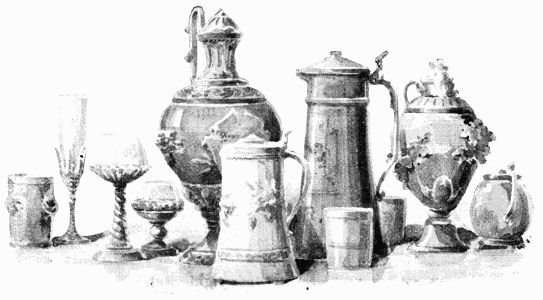
He was a little amused by her enthusiasm. The Hydes had much plate, old and new, and they were proud of its beauty and excellence, and well aware of its worth; but they were not able to judge of the value of flagons and cups and servers gathered slowly through many generations, every one representing some human drama of love or suffering, or some deed of national significance. Nearly all of Joris Van Heemskirk's silver was "storied:" it was the materialization of honour and patriotism, of self-denial or charity; and the silversmith's and engraver's work was the least part of the Van Heemskirk pride in it.
As Joris sat smoking that night, he thought over his proposal; and then for the first time it struck him that the Middleburg cup might have a peculiar significance and value to Bram. It cost him an effort to put his vague suspicions into words, because by doing so he seemed to give shape and substance to shadows; but [Pg 253]when Lysbet sat down with a little sigh of content beside him, and said, "A happy night is this to us, Joris," he answered, "God is good; always better to us than we trust Him for. I want to say now what I have been considering the last hour,—some other cup we will send to the little Joris, for I think Bram will like to have the Middleburg cup best of all."
"Always Bram has been promised the Guilderland cup and the server that goes with it."
"That is the truth; but I will tell you something, Lysbet. The Middelburg cup was given by the Jews of Middleburg to my ancestor because great favours and protection he gave them when he was mayor of the city. Bram is very often with Miriam Cohen, and"—
Then Joris stopped, and Lysbet waited anxiously for him to finish the sentence; but he only puffed, puffed, and looked thoughtfully at the bowl of his pipe.
"What mean you, Joris?"
"I think that he loves her."
"Well?"
"That he would like to marry her."
"Many things that are impossible, man would like to do: that is most impossible of all."
"You think so?"
"I am sure of it."
"Not impossible was it for Katherine to marry one not of her own race."
"In my mind it is not race so much as faith. Far more than race, faith claims."
"Hyde is a Lutheran."
"A Lutheran may also be a Christian, I hope, Joris."
[Pg 254]"I judge no man, Lysbet. I have known Jews that were better Christians than some baptized in the name of Christ and John Calvin,—Jews who, like the great Jew, loved God, and did to their fellow-creatures as they wished to be done by. And if you had ever seen Miriam Cohen, you would not make a wonder that Bram loves her."
"Is she so fair?"
"A beautiful face and gracious ways she has. Like her the beloved Rachel must have been, I think. Why do you not stand with Bram as you stood with Katherine?"
"Little use it would be, Joris. To give consent in this matter would be a sacrifice refused. Be sure that Cohen will not listen to Bram; no, nor to you, nor to me, nor to Miriam. If it come to a question of race, more proud is the Jew of his race then even the Englishman or the Dutchman. If it come to a question of faith, if all the other faiths in the world die out, the Jew will hold to his own. Say to Bram, 'I am willing;' and Cohen will say to him, 'Never, never will I consent.' If you keep the 'Jew's cup' for Bram and Miriam, always you will keep it; yes, and they that live after you, too."
Why it is that certain trains of thought and feeling move to their end at the same hour, though that end affect a variety of persons, no one has yet explained. But there are undoubtedly currents of sympathy of whose nature and movements we are profoundly ignorant. Thus how often we think of an event just before some decisive action relating to it is made known to us! How often do we recall some [Pg 255]friend just as we are about to see or hear from him! How often do we remember something that ought to be done, just at the last moment its successful accomplishment was possible to us!
And at the very hour Joris and Lysbet were discussing the position of their son with regard to Miriam Cohen, the question was being definitely settled at another point. For Joris was not the only person who had observed Bram's devotion to the beautiful Jewess. Cohen had watched him with close and cautious jealousy for many months; but he was far too wise to stimulate love by opposition, and he did not believe in half measures. When he defined Miriam's duty to her, he meant it to be in such shape as precluded argument or uncertainty; and for this purpose delay was necessary. Much correspondence with England had to take place, and the mails were then irregular. But it happened that, after some months of negotiation, a final and satisfactory letter had come to him by the same post as brought Katherine's letter to Joris Van Heemskirk.
He read its contents with a sad satisfaction, and then locked it away until the evening hours secured him from business interruption. Then he went to his grandchild. He found her sitting quietly among the cushions of a low couch. It seemed as if Miriam's thoughts were generally sufficient for her pleasure, for she was rarely busy. She had always time to sit and talk, or to sit and be silent. And Cohen liked best to see her thus,—beautiful and calm, with small hands dropped or folded, and eyes half shut, and mouth closed, but ready to smile and dimple if he decided to speak to her.
[Pg 256]She looked so pretty and happy and careless that for some time he did not like to break the spell of her restful beauty. Nor did he until his pipe was quite finished, and he had looked carefully over the notes in his "day-book." Then he said in slow, even tones, "My child, listen to me. This summer my young kinsman Judah Belasco will come here. He comes to marry you. You will be a happy wife, my dear. He has moneys, and he has the power to make moneys; and he is a good young man. I have been cautious concerning that, my dear."
There was a long pause. He did not hurry her, but sat patiently waiting, with his eyes fixed upon the book in his hand.
"I do not want to marry, grandfather. I am so young. I do not know Judah Belasco."
"You shall have time, my dear. It is part of the agreement that he shall now live in New York. He is a rich young man, my dear. He is of the sephardim, as you are too, my dear. You must marry in your own caste; for we are of unmixed blood, faithful children of the tribe of Judah. All of our brethren here are Ashkenasem: therefore, I have had no rest until I got a husband fit for you, my dear. This was my duty, though I brought him from the end of the earth. It has cost me moneys, but I gave cheerfully. The thing is finished now, when you are ready. But you shall not be hurried, my dear."
"Father, I have been a good daughter. Do not make me leave you."
"You have been good, and you will be good always. What is the command?"
[Pg 257]"Honor thy father and thy mother."
"And the promise?"
"Then long shall be thy days on the earth."
"And the vow you made, Miriam?"
"That I would never disobey or deceive you."
"Who have you vowed to?"
"The God of Israel."
"Will you lie unto Him?"
"I would give my life first."
"Now is the time to fulfil your vow. Put from your heart or fancy any other young man. Have you not thought of our neighbour, Bram Van Heemskirk?"
"He is good; he is handsome. I fear he loves me."
"You know not anything. If you choose a husband, or even a shoe, by their appearance, both may pinch you, my dear. Judah is of good stock. Of a good tree you may expect good fruit."
"Bram Van Heemskirk is also the son of a good father. Many times you have said it."
"Yes, I have said it. But Bram is not of our people. And if our law forbid us to sow different seeds at the same time in the same ground, or to graft one kind of fruit-tree on the stock of another, shall we dare to mingle ourselves with people alien in race and faith, and speech and customs? My dear, will you take your own way, or will you obey the word of the Lord?"
"My way cannot stand before His way."
"It is a hard thing for you, my dear. Your way is sweet to you. Offer it as a sacrifice; bind the sacrifice, even with cords, to the altar, [Pg 258]if it be necessary. I mean, say to Bram Van Heemskirk words that you cannot unsay. Then there will be only one sorrow. It is hope and fear, and fear and hope, that make the heart sick. Be kind, and slay hope at once, my dear."
"If Judah had been my own choice, father"—
"Choice? My dear, when did you get wisdom? Do not parents choose for their children their food, dress, friends, and teachers? What folly to do these things, and then leave them in the most serious question of life to their own wisdom, or want of wisdom! Choice! Remember Van Heemskirk's daughter, and the sin and suffering her own choice caused."
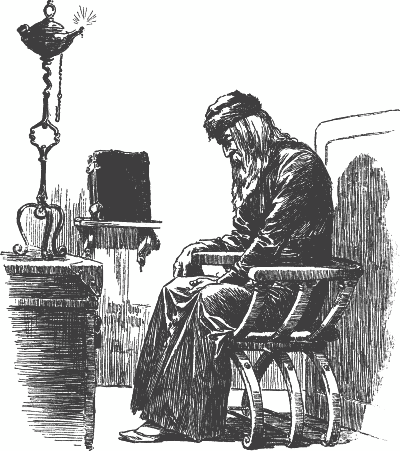
"I think it was not her fault if two men quarrelled and fought about her."
"She was not wholly innocent. Miriam, make me not to remember the past. My [Pg 259]eyes are old now; they should not weep any more. I have drunk my cup of sorrow to the lees. O Miriam, Miriam, do not fill it again!"
"God forbid! My father, I will keep the promise that I made you. I will do all that you wish."
Cohen bowed his head solemnly, and remained for some minutes afterward motionless. His eyes were closed, his face was as still as a painted face. Whether he was praying or remembering, Miriam knew not. But solitude is the first cry of the wounded heart, and she went away into it. She was like a child that had been smitten, and whom there was none to comfort. But she never thought of disputing her grandfather's word, or of opposing his will. Often before he had been obliged to give her some bitter cup, or some disappointment; but her good had always been the end in view. She had perfect faith in his love and wisdom. But she suffered very much; though she bore it with that uncomplaining patience which is so characteristic of the child heart—a patience pathetic in its resignation, and sublime in its obedience.
And it was during this hour of trial to Miriam that Joris was talking to Lysbet of her. It did him good to put his fears into words, for Lysbet's assurances were comfortable; and as it had been a day full of feeling, he was weary and went earlier to his room than usual. On the contrary, Lysbet was very wakeful. She carried her sewing to the candle, and sat down for an hour's work. The house was oppressively still; and she could not help [Pg 260]remembering the days when it had been so different,—when Anna and Cornelia had been marriageable women, and Joanna and Katherine growing girls. All of them had now gone away from her. Only Bram was left, and she thought of him with great anxiety. Such a marriage as his father had hinted at filled her with alarm. She could neither conquer her prejudices nor put away her fears; and she tormented herself with imagining, in the event of such a misfortune, all the disagreeable and disapproving things the members of the Middle Kirk would have to say.
In the midst of her reflections, Bram returned. She had not expected him so early, but the sound of his feet was pleasant. He came in slowly; and, after some pottering, irritating delays, he pushed his father's chair back from the light, and with a heavy sigh sat down in it.
"Why sigh you so heavy, Bram? Every sigh still lower sinks the heart."
"A light heart I shall never have again, mother."
"You talk some foolishness. A young man like you! A quarrel with your sweetheart, is it? Well, it will be over as quick as a rainy day. Then the sunshine again."
"For me there is no hope like that. So quiet and shy was my love."
"Oh, indeed! Of all the coquettes, the quiet, shy ones are the worst."
"No coquette is Miriam Cohen. My love life is at the end, mother."
"When began it, Bram?"
"It was at the time of the duel. I loved [Pg 261]her from the first moment. O mother, mother!"
"Does she not love you, Bram?"
"I think so: many sweet hours we have had together. My heart was full of hope."
"Her faith, Bram, should have kept you prudent."
"'In what church do you pray?' Love asks not such a question, and as for her race, I thought a daughter of Israel is the beloved of all the daughters of God. A blessing to my house she will bring."
"That is not what the world says, Bram. No, my son. It is thus, and like it: that God is angry with His people, and for that He has scattered them through all the nations of the earth."
"Such folly is that! To colonize, to 'take possession' of the whole earth, is what the men of Israel have always intended. Long before the Christ was born in Bethlehem, the Jews were scattered throughout every known country. I will say that to the dominie. It is the truth, and he cannot deny it."
"But surely God is angry with them."
"I see it not. If once He was angry, long ago He has forgiven His people. 'To the third and fourth generation' only is His anger. His own limit that is. Who have such blessings? The gold and the wine and the fruit of all lands are theirs. Their increase comes when all others' fail. God is not angry with them. The light of His smile is on the face of Miriam. He teaches her father how to traffic and to prosper. Do not the Holy Scriptures say that the blessing, not the anger, of the Lord maketh rich?"
[Pg 262]"Well, then, my son, all this is little to the purpose, if she will not have thee for her husband. But be not easy to lose thy heart. Try once more."
"Useless it would be. Miriam is not one of those who say 'no' and then 'yes.'"
"Nearly two years you have known her. That was long to keep you in hope and doubt. I think she is a coquette."
"You know her not, mother. Very few words of love have I dared to say. We have been friends. I was happy to stand in the store and talk to Cohen, and watch her. A glance from her eyes, a pleasant word, was enough. I feared to lose all by asking too much."
"Then, why did you ask her to-night? It would have been better had your father spoken first to Mr. Cohen."
"I did not ask Miriam to-night. She spared me all she could. She was in the store as I passed, and I went in. This is what she said to me, 'Bram, dear Bram, I fear that you begin to love me, because I think of you very often. And my grandfather has just told me that I am promised to Judah Belasco, of London. In the summer he will come here, and I shall marry him.' I wish, mother, you could have seen her leaning against the black kas; for between it and her black dress, her face was white as death, and beautiful and pitiful as an angel's."
"What said you then?"
"Oh, I scarce know! But I told her how dearly I loved her, and I asked her to be my wife."
"And she said what to thee?"
"'My father I must obey. Though he told me to slay myself, I must obey him. By the God of Israel, I have promised it often.'"
"Was that all, Bram?"
"I asked her again and again. I said, 'Only in this one thing, Miriam, and all our lives after it we will give to him.' But she answered, 'Obedience is better than sacrifice, Bram. That is what our law teaches. Though I could give my father the wealth and the power of King Solomon, it would be worth less than my obedience.' And for all my pleading, at the last it was the same, 'I cannot do wrong; for many right deeds will not undo one wrong one.' So she gave me her hands, and I kissed them,—my first and last kiss,—and I bade her farewell; for my hope is over—I know that."
"She is a good girl. I wish that you had won her, Bram." And Lysbet put down her work and went to her son's side; and with a great sob Bram laid his head against her breast.
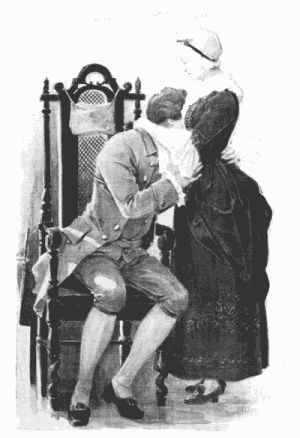
"As one whom his mother comforteth!" Oh, tender and wonderful consolation! It is the mother that turns the bitter waters of life into wine. Bram talked his sorrow over to his mother's love and pity and sympathy; and when she parted with him, long after the midnight, she said cheerfully, "Thou hast a brave soul, mijn zoon, mijn Bram; and this trouble is not all for thy loss and grief. A sweet memory will this beautiful Miriam be as long as thou livest; and to have loved well a good woman will make thee always a better man for it."
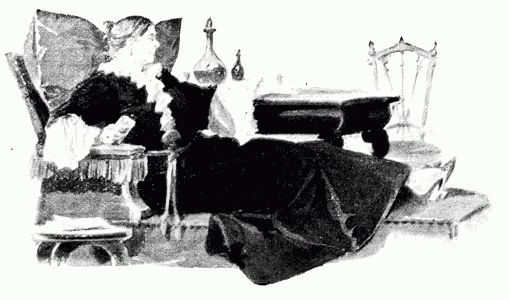
XII.
"The town's a golden, but a fatal, circle,
Upon whose magic skirts a thousand devils,
In crystal forms, sit tempting Innocence,
And beckoning Virtue from its centre."
The trusting, generous letter which Joris had written to his son-in-law arrived a few days before Hyde's departure for London. With every decent show of pleasure and gratitude, he said, "It is an unexpected piece of good fortune, Katherine, and the interest of five thousand pounds will keep Hyde Manor up in a fine style. As for the principal, we will leave it at Secor's until it can be invested in land. What say you?"
Katherine was quite satisfied; for, though naturally careful of all put under her own hands, she was at heart very far from being either selfish or mercenary. In fact, the silver cup was at that hour of more real interest to [Pg 267]her. It would be a part of her old home in her new home. It was connected with her life memories, and it made a portion of her future hopes and dreams. There was also something more tangible about it than about the bit of paper certifying to five thousand pounds in her name at Secor's Bank.
But Hyde knew well the importance of Katherine's fortune. It enabled him to face his relatives and friends on a very much better footing than he had anticipated. He was quite aware, too, that the simple fact was all that society needed. He expected to hear in a few days that the five thousand pounds had become fifty thousand pounds; for he knew that rumour, when on the boast, would magnify any kind of gossip, favourable or unfavourable. So he was no longer averse to meeting his former companions: even to them, a rich wife would excuse matrimony. And, besides, Hyde was one of those men who regard money in the bank as a kind of good conscience: he really felt morally five thousand pounds the better. Full of hope and happiness, he would have gone at a pace to suit his mood; but English roads at that date were left very much to nature and to weather, and the Norfolk clay in springtime was so deep and heavy that it was not until the third day after leaving that he was able to report for duty.
His first social visit was paid to his maternal grandmother, the dowager Lady Capel. She was not a nice old woman; in fact, she was a very spiteful, ill-hearted, ill-tempered old woman, and Hyde had always had a certain fear of her. When he landed in London with his wife, Lady [Pg 268]Capel had fortunately been at Bath; and he had then escaped the duty of presenting Katherine to her. But she was now at her mansion in Berkeley Square, and her claims upon his attention could not be postponed; and, as she had neither eyes nor ears in the evenings for any thing but loo or whist, Hyde knew that a conciliatory visit would have to be made in the early part of the day.
He found her in the most careless dishabille, wigless and unpainted, and rolled up comfortably in an old wadded morning-gown that had seen years of snuffy service. But she had out-lived her vanity. Hyde had chosen the very hour in which she had nothing whatever to amuse her, and he was a very welcome interruption. And, upon the whole, she liked her grandson. She had paid his gambling-debts twice, she had taken the greatest interest in his various duels, and sided passionately with him in one abortive love-affair.
"Dick is no milksop," she would say approvingly, when told of any of his escapades; "faith, he has my spirit exactly! I have a great deal more temper than any one would believe me capable of"—which was not the truth, for there were few people who really knew her ladyship who ever felt inclined to doubt her capabilities in that direction.
So she heard the rattle of Hyde's sword, and the clatter of his feet on the polished stairs, with a good deal of satisfaction. "I have him here, and I shall do my best to keep him here," she thought. "Why should a proper young fellow like Dick bury himself alive in the fens for a Dutchwoman? In short, she has had [Pg 269]enough, and too much, of him. His grandmother has a prior claim, I hope, and then Arabella Suffolk will help me. I foresee mischief and amusement.—Well, Dick, you rascal, so you have had to leave America! I expected it. Oh, sir, I have heard all about you from Adelaide! You are not to be trusted, either among men or women. And pray where is the wife you made such a fracas about? Is she in London with you?"
"No, madam: she preferred to remain at Hyde, and I have no happiness beyond her desire."
"Here's flame! Here's constancy! And you have been married a whole year! I am struck with admiration."
"A whole year—a year of divine happiness, I assure you."
"Lord, sir! You will be the laughing-stock of the town if you talk in such fashion. They will have you in the play-houses. Pray let us forget our domestic joys a little. I hear, however, that your divinity is rich."
"She is not poor; though if"—
"Though if she had been a beggar-girl you would have married her, rags and all. Swear to that, Dick, especially when she brings you fifty thousand pounds. I'm very much obliged to her; you can hardly, for shame, put your fingers in my poor purse now, sir. And you can make a good figure in the world; and as your cousin Arabella Suffolk is staying with me, you will be the properest gallant for her when Sir Thomas is at the House."
"I am at yours and cousin Arabella's service, grandmother."
[Pg 270]"Exactly so, Captain; only no more quarrelling and fighting. Learn your catechism, or Dr. Watts, or somebody. Remember that we have now a bishop in the family. And I am getting old, and want to be at peace with the whole world, if you will let me."
Hyde laughed merrily. "Why, grandmother, such advice from you! I don't trust it. There never was a more perfect hater than yourself."
"I know, Dick. I used to say, 'Lord, this person is so bad, and that person is so bad, I hate them!' But at last I found out that every one was bad: so I hate nobody. One cannot take a sword and run the whole town through. I have seen some very religious people lately; and you will find me very serious, and much improved. Come and go as you please, Dick: Arabella and you can be perfectly happy, I dare say, without minding me."
"What is the town doing now?"
"Oh, balls and dances and weddings and other follies! Thank the moon, men and women never get weary of these things!"
"Then you have not ceased to enjoy them, I hope."
"I still take my share. Old fools will hobble after young ones. I ride a little, and visit a little, and have small societies quite to my taste. And I have my four kings and aces; that is saying everything. I want you to go to all the diversions, Dick; and pray tell me what they say of me behind my back. I like to know how much I annoy people."
"I shall not listen to anything unflattering, I assure you."
"La, Dick, you can't fight a rout of women [Pg 271]and men about your grandmother! I don't want you to fight, not even if they talk about Arabella and you. It is none of their business; and as for Sir Thomas Suffolk, he hears nothing outside the House, and he thinks every Whig in England is watching him—a pompous old fool!"
"Oh, indeed! I had an idea that he was a very merry fellow."
"Merry, forsooth! He was never known to laugh. There is a report that he once condescended to smile, but it was at chess. As for fighting, he wouldn't fight a dog that bit him. He is too patriotic to deprive his country of his own abilities. No, Dick; I really do not see any quarrel ahead, unless you make it."
"I shall think of my Kate when I am passionate, and so keep the peace."
"'I shall think of my Kate.' Grant me patience with all young husbands. They ought to remain in seclusion until the wedding-fever is over. By the Lord Harry! If Jack Capel had spoken of me in such fashion, I would have given him the best of reasons for running some pretty fellow through the heart. Hush! Here comes Arabella, and I am anxious you should make a figure in her eyes."
Arabella came in very quietly, but she seemed to take possession of the room as she entered it. She had a bright, piquant face, a tall, graceful form, and that air of high fashion which is perhaps quite as captivating.
She was "delighted to meet cousin Dick. Oh, indeed, you have been the town talk!" she said, with an air of attention very flattering. "Such a passionate encounter was never heard [Pg 272]of. The clubs were engaged with it for a week. I was told that Lord Paget and Sir Henry Dutton came near fighting it over themselves. Was it really about a bow of orange ribbon? And did you wear it over your heart? And did the Scotchman cut it off with his sword? And did you run him through the next moment? There were the most extraordinary accounts of the affair, and of the little girl with the unpronounceable Dutch name who"—
"Who is now my wife, Lady Suffolk."
"Certainly, we heard of that also. How romantic! The secret marriage, the midnight elopement, and the man-of-war waiting down the river with a broadside ready for any boat that attempted to stop you."
"Oh, my lady, that is the completest nonsense!"
"Say 'cousin Arabella,' if you please. Has not grandmother told you that I, not the Dutch girl, ought to have been your wife? It was all arranged years ago, sir. You have disappointed grandmother; as for me, I have consoled myself with Sir Thomas."
"Yes, indeed," said Lady Capel; "though Dick was entirely out of the secret of the match, my son Will and I had agreed upon it. I don't know what Will thinks of a younger son like Dick choosing for himself."
Then Arabella made Hyde a pretty, mocking courtesy, and he could not help looking with some interest at the woman who might have been his wife. The best of men, and the best of husbands, are liable to speculate a little under such circumstances, and in fancy to put themselves into a position they have probably [Pg 273]no wish in reality to fill. She noticed his air of consideration; and, with a toss of her handsome head, she spread out all her finery. "You see," she said, "I am dressed so as to make a tearing show." She wore a white poudesoy gown, embroidered with gold, and the prettiest high-heeled satin slippers, and a head-dress of wonderful workmanship. "For I have been at a concert of music, cousin Dick, and heard two overtures of Mr. Handel's and a sonata by Corella, done by the very best hands."
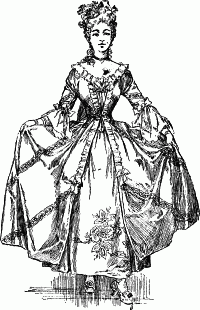
"And, pray, whom did you see there, my dear? and what were they talking about?"
"Of all people, grandmother, I saw Lady Susan Rye and the rest of her sort; and they talked of nothing else but the coming mask at Ranelagh's. Cousin, I bespeak you for my service. I am going as a gypsy, for it will give me the opportunity of telling the truth. In my own character, I rarely do it: nothing is so impolite. But I have a prodigious regard for truth; and at a mask I give myself the pleasure of saying all the disagreeable things that I owe to my acquaintances."
Katherine was almost ignored; and Hyde did not feel any desire to bring even her name into such a mocking, jeering, perfectly heartless conversation. He was content to laugh, and [Pg 274]let the hour go past in such flim-flams of criticism and persiflage. He remembered when he had been one of the units in such a life, and he wondered if it were possible that he could ever drift back into it. For even as he sat there, with the memory of his wife and child in his heart, he felt the light charm of Lady Arabella's claim upon him, and all the fascination of that gay, thoughtless animal life which appeals so strongly to the selfish instincts and appetites of youth.
He had a plate of roast hare and a goblet of wine, and the ladies had chocolate and rout cakes; and he ate and drank, and laughed, and enjoyed their bright, ill-natured pleasantry, as men enjoy such piquant morsels. Thus a couple of hours passed; and then it became evident, from the pawing and snorting outside, that Mephisto's patience was quite exhausted. Hyde went to the window, and looked into the square. His orderly was vainly endeavoring to soothe the restless animal; and he said, "Mephisto will take no excuse, cousin, and I find myself obliged to leave you." But he went away in an excitement of hope and gay anticipations; and, with a sharp rebuke to the unruly animal, he vaulted into the saddle with soldierly grace and rapidity. A momentary glance upward showed him Lady Capel and Lady Suffolk at the window, watching him; the withered old woman in her soiled wrappings, the youthful beauty in all the bravery of her white and gold poudesoy. In spite of Mephisto's opposition, he made them a salute; and then, in a clamour of clattering hoofs, he dashed through the square.
[Pg 275]"That is the man you ought to have married Arabella," said Lady Capel, as she watched the young face at her side, which had suddenly become pensive and dreamy: "you would have been a couple for the world to look at."
"Oh, indeed, you are mistaken, grandmother! Sir Thomas is an admirable husband—blind and deaf to all I do, as a good husband ought to be. And as for Dick, look at him—bowing and smiling, and ready to do me any service, while the girl he nearly died for is quite forgotten."
"Upon my word, you wrong Dick. His love for that woman is beyond everything. I wish it wasn't. What right had she to come into our family, and spoil plans and projects made before she was born. I should clearly love to play her her own card back. And I must say, Arabella, that you seem to care very little about your own wrongs."
"Oh, I am by no means certified that the woman has wronged me! I don't think I should have loved Dick, in any case."
"Ha!" Lady Capel looked in her granddaughter's musing face, and then, with a chuckle, hobbled to the bell and rang for her maid. "You are very prudent, child, but I am not one that any woman can deceive. I know all the tricks of the sex. Oh, heavens! what a grand thing to be two and twenty, with a kind husband to manage, and lovers bowing and begging at your shoe-ties! Well, well, I had my day; and, thank the fools, I did some mischief in it! Yes, there were eight duels fought for me; and while Somers and Scrope were wetting their swords in the quarrel, I was dancing [Pg 276]with Jack Capel. Jack told me that night he would make me marry him; and when I slapped his cheek with my fan, he took my hands in a rage, and swore I should do it that hour. And, faith, he mastered me! Your grandfather Capel had a dreadful temper, Arabella."
"I have heard that Cousin Dick Hyde has a temper too."
"Dick is vain; and you can make a vain man stand on his head, or go down on his knees, if you only vow that he performs the antics better than any other human creature. The town will fling itself at Dick Hyde's feet, and Dick will fling himself at yours. Mind what I say; my prophecies always come true, Arabella, for I never expect sinners to be saints, my dear."
And during the next six months Lady Capel found plenty of opportunities for complimenting herself upon her own penetration. Society made an idol of Capt. Hyde; and if he was not at Lady Arabella's feet, he was certainly very constantly at her side. As to his marriage, it was a topic of constant doubt and dispute. The clubs betted on the subject. In the ball-rooms and the concert-rooms, the ladies positively denied it; and Lady Arabella's smile and shrug were of all opinions the most unsatisfactory and bewildering. Some, indeed, admitted the marriage, but averred, with a meaning emphasis, that madam was on the proper side of the Atlantic. Others were certain that Hyde had brought his wife to England, but felt himself obliged, on account of her great beauty, to keep her away from the conquering heroes of London society. It was a significant index to [Pg 277]Hyde's real character, that not one of his associates ever dared to be familiar enough to ask him for the truth on a question so delicately personal.
"Hyde is exactly the man to invite me to meet him in Marylebone Fields for the answer," said a young officer, who had been urged to make inquiries because he was on familiar terms with his comrade. "If it comes to a matter of catechism, gentlemen, I'll bet ten to one that none of you ask him two consecutive questions regarding the American lady."
And perhaps many husbands may be able to understand a fact which to the general world seems beyond satisfactory explanation. Hyde loved his wife, loved her tenderly and constantly; he felt himself to be a better man whenever he thought of her and his little son, and he thought of them very frequently; and yet his eyes, his actions, the tones of his voice, daily led his cousin, Lady Suffolk, to imagine herself the empress of his heart and life. Nor was it to her alone that he permitted this affectation of love. He found beauty, wherever he met it, provocative of the same apparent devotion. There were a dozen men in his own circle who hated him with all the sincerity that jealousy gives to dislike and envy; there were a score of women who believed themselves to have private tokens of Hyde's special admiration for them.
Unfortunately, his military duties were only on very rare occasions any restraint to him. His days were mainly spent in dangling after Lady Suffolk and other fair dames. It was auctions at Christie's, and morning concerts, [Pg 278]and afternoon rides and plays, and dinners and balls and masks at Ranelagh's. It was sails down the river to Richmond, and trips to Sadler's Wells, and one perpetual round of flirting and folly, of dressing and dancing and dining and gaming.
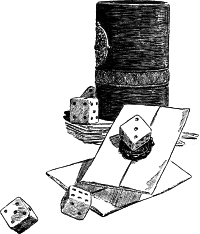
And it must be remembered that the English women of that day were such as England may well hope never to see again. They had little education: many very great ladies could hardly read and spell properly. Their sole accomplishments were dressing and embroidery; the ability to make a few delicate dishes for the table, and scents and pomade for the toilet. In the higher classes they married for money or position, and gave themselves up to intrigue. They drank deeply; they played high; they very seldom went to church, for Sunday was the fashionable day for all kinds of frivolity and amusement. And as the men of any generation are just what the women make them, England never had sons so profligate, so profane and drunken. The clubs, especially Brooke's, were the nightly scenes of indescribable orgies. Gambling alone was their serious occupation; duels were of constant occurrence.
Such a life could not be lived except at frightful and generally ruinous expense. Hyde was soon [Pg 279]embarrassed. His pay was small and uncertain and the allowance which his brother William added to it, in order that the heir-apparent to the earldom might live in becoming style, had not been calculated on the squandering basis of Hyde's expenditures. Toward Christmas bills began to pour in, creditors became importunate, and, for the first time in his life, creditors really troubled him. Lady Capel was not likely to pay his debts any more. The earl, in settling Hyde's American obligations, had warned him against incurring others, and had frankly told him he would permit him to go to jail rather than pay such wicked and foolish bills for him again. The income from Hyde Manor had never been more than was required for the expenses of the place; and the interest on Katherine's money had gone, though he could not tell how. He was destitute of ready cash, and he foresaw that he would have to borrow some from Lady Capel or some other accommodating friend.
He returned to barracks one Sunday afternoon, and was moodily thinking over these things, when his orderly brought him a letter which had arrived during his absence. It was from Katherine. His face flushed with delight as he read it, so sweet and tender and pure was the neat epistle. He compared it mentally with some of the shameless scented billet-doux he was in the habit of receiving; and he felt as if his hands were unworthy to touch the white wings of his Katherine's most womanly, wifely message. "She wants to see me. Oh, the dear one! Not more than I want to see her. Fool, villain, that I am! I will go to her. Kathe[Pg 280]rine! Kate! My dear little Kate!" So he ejaculated as he paced his narrow quarters, and tried to arrange his plans for a Christmas visit to his wife and child.
First he went to his colonel's lodging, and easily obtained two weeks' absence; then he dressed carefully, and went to his club for dinner. He had determined to ask Lady Capel for a hundred pounds; and he thought it would be the best plan to make his request when she was surrounded by company, and under the pleasurable excitement of a winning rubber. And if the circumstances proved adverse, then he could try his fortune in the hours of her morning retirement.
The mansion in Berkeley Square was brilliantly lighted when he approached it. Chairs and coaches were waiting in lines of three deep; coachmen and footmen quarrelling, shouting, talking; link-boys running here and there in search of lost articles or missing servants. But the hubbub did not at that time make his blood run quicker, or give any light of expectation to his countenance; for his heart and thoughts were near a hundred miles away.
Sunday night was Lady Capel's great card-night, and the rooms were full of tables surrounded by powdered and painted beauties intent upon the game and the gold. The odour of musk was everywhere, and the sound of the tapping of gold snuff-boxes, and the fluttering of fans, and the sharp, technical calls of the gamesters, and the hollow laughter of hollow hearts. There was a hired singing-girl with a lute at one end of the room, babbling of Cupid and Daphne, and green meadow and larks. But [Pg 281]she was poorly dressed and indifferent looking; and she sang with a sad, mechanical air, as if her thoughts were far off. Hyde would have passed her without a glance; but, as he approached, she broke her love-ditty in two, and began to sing, with a meaning look at him,—
"They say there is a happy land,
Where husbands never prove untrue;
Where lovely maids may give their hearts,
And never need the gift to rue;
Where men can make and keep a vow,
And wives are never in despair.
I'm very fond of seeing sights—
Pray tell me, how can I get there?"
The question seemed so directly addressed to Hyde that he hesitated a moment, and looked at the girl, who then with a mocking smile continued,—
"They say there really is a land,
Where husbands never are untrue,
Where wives are always beautiful,
And the old love is always new.
I've asked the wise to tell me how
A loving woman could get there;
And this is what they say to me,—
'If you that happy land would see,
There's only one way to get there:
Go straight along the crooked lane,
And all around the square.'"
The scornful little song followed him, and conveyed a certain meaning to his mind. The girl must have taken her cue from the gossip of those who passed her to and fro. He burned with indignation, not for himself, but for his sweet, pure Katherine. He was determined that the world should in the future know [Pg 282]that he held her peerless among women. In this half-aggressive mood he approached Lady Capel. She had been unfortunate all the evening, and was not amiable. As he stood behind her chair, Lord Leffham asked,—
"What think you, Hyde, of a party at picquet?"
"Oh, indeed, my lord, you are too much for me!"
"I will give you three points." Then, calling a footman, "Here, fellow, get cards."
Lady Capel flung her own down. "No, no, Leffham. Spare my grandson: there are bigger fish here. Dick, I am angry at you. I have a mind to banish you for a month."
"I am going to Norfolk for two weeks, madam."
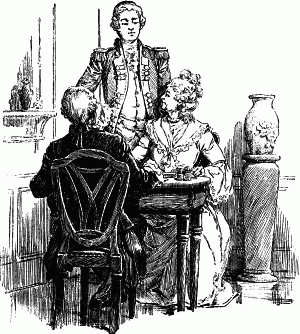
"That will do. It is a worse punishment than I should have given you. Norfolk! There is only one word between it and the plantations. At this time of the year, it is a clay pudding full of villages. Give me your arm, Dick; I shall play no more until my luck turns again. Losing cards are dull company indeed."
"I am very sorry that you have been losing.[Pg 283] I came to ask for the loan of a hundred pounds, grandmother."
"No, sir, I will not lend you a hundred pounds; nor am I in the humour to do anything else you desire."
"I make my apology for the request. I ought to have asked Katherine."
"No, sir, you ought not to have asked Katherine. You ought to take what you want. Jack Capel took every shilling of my fortune and neither said 'by your leave' nor 'thank you.' Did the Dutchman tie the bag too close?"
"Councillor Van Heemskirk left it open, in my honour. When I am scoundrel enough to touch it, I shall not come and see you at all, grandmother."
"Upon my word, a very pretty compliment! Well, sir, I'll pay you a hundred pounds for it. When do you start?"
"To-morrow morning."
"Make it afternoon, and take care of me as far as your aunt Julia's. The duke is of the royal bed-chamber this month, and I am going to see my daughter while he is away. It will make him supremely wretched at court to know that I am in his house. So I am going there, and I shall take care he knows it."
"I have heard a great deal of his new house."
"A play-house kind of affair, Dick, I assure you,—all in the French style; gods and goddesses above your head, and very badly dressed nymphs all around, and his pedigree on every window, and his coat of arms on the very stairs. I have the greatest satisfaction in treading upon them, I assure you."
[Pg 284]"Why do you take the trouble to go? It can give you no pleasure."
"Imagine the true state of things, Dick. The duke is at court—say he is holding the royal gold wash-basin; but in the very sunshine of King George's smile, he is thinking, 'That snuffy old woman is lounging in my white and gilt satin chairs, and handling all my Chinese curiosities, and asking if every hideous Hindoo idol is a fresh likeness of me.' I am always willing to take some trouble to give pleasure to the people I like; I will gladly go to any amount of trouble to annoy the people I hate as cordially as I hate my good, rich, noble son-in-law, the great Duke of Exmouth."
"Will you play again?"
"No; I lost seventy pounds to-night."
"I protest, grandmother, that such high stakes go not with amusement. People come here, not for civility, but for the chance of money."
"Very well, sir. Money! It is the only excuse for card-playing. All the rest is sinning without temptation. But, Dick, put on the black coat to preach in,—why do they wear black to preach in?—and I am not in a humour for a sermon. Come to-morrow at one o'clock; we shall reach Julia's before dinner. And I dare say you want money to-night. Here are the keys of my desk. In the right-hand drawer are some rouleaus of fifty pounds each. Take two."
The weather, as Lady Capel said, was "so very Decemberish" that the roads were passably good, being frozen dry and hard; and on the evening of the third day Hyde came in sight of his home. His heart warmed to the
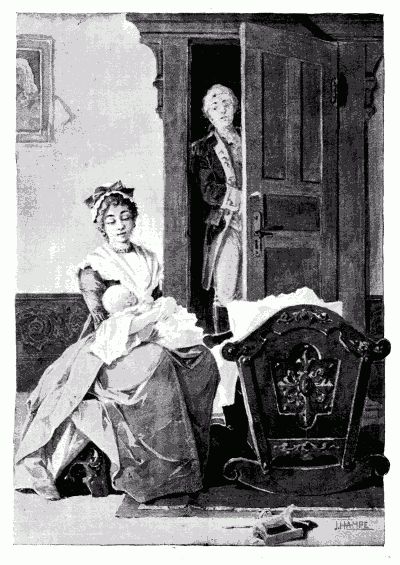
[Pg 286][Pg 287]lonely place; and the few lights in its windows beckoned him far more pleasantly than the brilliant illuminations of Vauxhall or Almacks, or even the cold splendours of royal receptions. He had given Katherine no warning of his visit—partly because he had a superstitious feeling about talking of expected joys (he had noticed that when he did so they vanished beyond his grasp); partly because love, like destiny, loves surprises; and he wanted to see with his own eyes, and hear with his own ears, the glad tokens of her happy wonder.
So he rode his horse upon the turf, and, seeing a light in the stable, carried him there at once. It was just about the hour of the evening meal, and the house was brighter than it would have been a little later. The kitchen fire threw great lustres across the brick-paved yard; and the blinds in Katherine's parlour were undrawn, and its fire and candle-light shone on the freshly laid tea-table, and the dark walls gleaming with bunches of holly and mistletoe. But she was not there. He only glanced inside the room, and then, with a smile on his face, went swiftly upstairs. He had noticed the light in the upper windows, and he knew where he would find his wife. Before he reached the nursery, he heard Katherine's voice. The door was a little open, and he could see every part of the charming domestic scene within the room. A middle-aged woman was quietly putting to rights the sweet disorder incident to the undressing of the baby. Katherine had played with it until they were both a little flushed and weary; and she was softly singing to the drowsy child at her breast.
[Pg 288]It was a very singular chiming melody, and the low, sweet, tripping syllables were in a language quite unknown to him. But he thought that he had never heard music half so sweet and tender; and he listened to it, and watched the drowsy, swaying movements of the mother, with a strange delight,—
"Trip a trop a tronjes,
De varkens in de boonjes,
De keojes in de klaver,
De paardeen in de haver,
De eenjes in de waterplass,
So groot mijn kleine Joris wass."
Over and over, softer and slower, went the melody. It was evident that the boy was asleep, and that Katherine was going to lay him in his cradle. He watched her do it; watched her gently tuck in the cover, and stand a moment to look down at the child. Then with a face full of love she turned away, smiling, and quite unconsciously came toward him on tiptoes. With his face beaming, with his arms opened, he entered; but with such a sympathetic understanding of the sweet need of silence and restraint that there was no alarm, no outcry, no fuss or amazement. Only a whispered "Katherine," and the swift rapture of meeting hearts and lips.
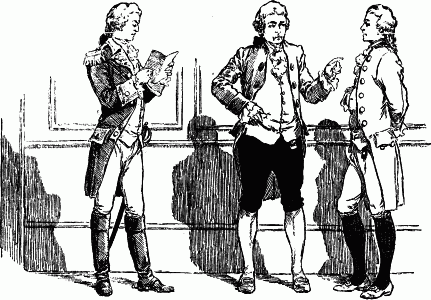
XIII.
"Death asks for no man's leave,
But lifts the latch, and enters, and sits down."
The great events of most lives occur in epochs. A certain period is marked by a succession of important changes, but that ride of fortune, be it good or ill, culminates, recedes, goes quite out, and leaves life on a level beach of commonplaces. Then, sooner or later, the current of affairs turns again; sometimes with a calm, irresistible flow, sometimes in a tidal wave of sudden and overwhelming strength. After Hyde's and Katherine's marriage, there was a long era noticeable only for such vicissitudes as were incident to their fortune and position. But in May, A.D. 1774, the first murmur of the returning tide of destiny was heard. Not but what there had been for long some vague and general expecta[Pg 290]tion of momentous events which would touch many individual lives; but this May night, a singular prescience of change made Hyde restless and impatient.
It was a dull, drizzling evening; and there was an air of depression in the city, to which he was unusually sensitive. For the trouble between England and her American Colonies was rapidly culminating; and party feeling ran high, not only among civilians, but throughout the royal regiments. Recently, also, a petition had been laid before the king from the Americans then resident in London, praying him not to send troops to coerce his subjects in America; and, when Hyde entered his club, some members were engaged in an angry altercation on this subject.
"The petition was flung upon the table, as it ought to have been," said Lord Paget.
"You are right," replied Mr. Hervey; "they ought to petition no longer. They ought now to resist. Mr. Dunning said in the House last night that the tone of the Government to the Colonies was, 'Resist, and we will cut your throats: acquiesce, and we will tax you.'"
"A kind of 'stand and deliver' government," remarked Hyde, whistling softly.
Lord Paget turned upon him with hardly concealed anger. "Captain, you, sir, wear the king's livery."
"I give the king my service: my thoughts are my own. And, faith, Lord Paget, it is my humour to utter them when and how I please!"
"Patience, gentlemen," returned Mr. Hervey. "I think, my lord, we may follow our leaders. The Duke of Richmond spoke warmly [Pg 291]for Boston last night. 'The Bostonians are punished without a hearing,' he said; 'and if they resist punishment, I wish them success.' Are they not Englishmen, and many of them born on English soil? When have Englishmen submitted to oppression? Neither king, lords, nor commons can take away the rights of the people. It is past a doubt, too, that his Majesty, at the levee last night, laughed when he said he would just as lief fight the Bostonians as the French. I heard this speech was received with a dead silence, and that great offence was given by it."
"I think the king was right," said Paget passionately. "Rebellious subjects are worse than open enemies like the French."
"My lord, you must excuse me if I do not agree with your opinions. Was the king right to give a government to the Canadians at this precise time? What can his Protestant North-American subjects think, but that he designs the hundred thousand Catholics of Canada against their liberties? It is intolerable; and the king was mobbed this afternoon in the park, on the matter. As for the bishops who voted the Canada bill, they ought to be unfrocked."
"Mr. Hervey, I beg to remind you that my uncle, who is of the see of St. Cuthbert, voted for it."
"Oh, it is notorious that all the English bishops, excepting only Dr. Shipley, voted for war with America! I hear that they anticipate an hierarchy there when the country is conquered. And the fight has begun at home, for Parliament is dissolved on the subject."
"It died in the Roman-Catholic faith," [Pg 292]laughed Hyde, "and left us a rebellion for a legacy."
"Captain Hyde, you are a traitor."
"Lord Paget, I deny it. My loyalty does not compel me to swear by all the follies and crimes of the Government. My sword is my country's; but I would not for twenty kings draw it against my own countrymen,"—then, with a meaning glance at Lord Paget and an emphatic touch of his weapon,—"except in my own private quarrel. And if this be treason, let the king look to it. He will find such treason in every regiment in England. They say he is going to hire Hessians: he will need them for his American business, for he has no prerogative to force Englishmen to murder Englishmen."
"I would advise you to be more prudent, Captain Hyde, if it is in your power."
"I would advise you to mind your own affairs, Lord Paget."
"It is said that you married an American."
"If you are perfectly in your senses, my lord, leave my affairs alone."
"For my part, I never believed it; and now that Lady Suffolk is a widow, with revenues, possibly you may"—
"Ah, you are jealous, I perceive!" and Hyde laughed scornfully, and turned on his heel as if to go upstairs.
Lord Paget followed, and laid his hand upon Hyde's arm.
"Hands off, my lord. Hands off all that belongs to me. And I advise you also to cease your impertinent attentions to my cousin, Lady Suffolk."
[Pg 293]"Gentlemen," said Mr. Hervey, "this is no time for private quarrels; and, Captain, here is a fellow with a note for you. It is my Lady Capel's footman, and he says he comes in urgent speed."
Hyde glanced at the message. "It is a last command, Mr. Harvey; and I must beg you to say what is proper for my honour to Lord Paget. Lady Capel is at the death-point, and to her requests I am first bounden."
It was raining hard when he left the club, a most dreary night in the city. The coach rattled through the muddy streets, and brought, as it went along, many a bored, heavy countenance to the steaming windows, to watch and to wonder at its pace. Lady Capel had been death-stricken while at whist, and she had not been removed from the parlour in which she had been playing her last game. She was stretched upon a sofa in the midst of the deserted tables, yet covered with scattered cards and half-emptied tea-cups. Only Lady Suffolk and a physician were with her; though the corridor was full of terrified, curious servants, gloating not unkindly over such a bit of sensation in their prosaic lives.
At this hour it was evident that, above everything in the world, the old lady had loved the wild extravagant grandson, whose debts she had paid over and over, and whom she had for years alternately petted and scolded.
"O Dick," she whispered, "I've got to die! We all have. I've had a good time, Dick."
"Shall I go for cousin Harold? I can bring him in an hour."
"No, no. I want no priests; no better than [Pg 294]we are, Dick. Harold is a proud sinner; Lord, what a proud sinner he is!" Then, with a glint of her usual temper, "He'd snub the twelve apostles if he met them without mitres. No priests, Dick. It is you I want. I have left you eight thousand pounds—all I could save, Dick. Everything goes back to William now; but the eight thousand pounds is yours. Arabella is witness to it. Dick, Dick, you will think of me sometimes?"
And Hyde kissed her fondly. Ugly, heartless, sinful, she might be to others; but to him she had been a double mother. "I'll never forget you," he answered; "never, grandmother."
"I know what the town will say: 'Well, well, old Lady Capel has gone to her deserts at last.' Don't mind them, Dick. Let them talk. They will have to go too; it's the old round—meat and mirth, and then to bed—a—long—sleep."
"Grandmother?"
"I hear you, Dick. Good-night."
"Is there anything you want done? Think, dear grandmother."
"Don't let Exmouth come to my funeral. I don't want him—grinning over—my coffin."
"Any other thing?"
"Put me beside Jack Capel. I wonder—if I shall—see Jack." A shadow, gray and swift, passed over her face. Her eyes flashed one piteous look into Hyde's eyes, and then closed forever.
And while in the rainy, dreary London twilight Lady Capel was dying, Katherine was in the garden at Hyde Manor, watching the [Pg 295]planting of seeds that were in a few weeks to be living things of beauty and sweetness. It had ceased raining at noon in Norfolk, and the gravel walks were perfectly dry, and the air full of the fragrance of innumerable violets. All the level land was wearing buttercups. Full of secrets, of fluttering wings, and building nests were the trees. In the apple-blooms the bees were humming, delirious with delight. From the beehives came the peculiar and exquisite odour of virgin wax. Somewhere near, also, the gurgle of running water spread an air of freshness all around.
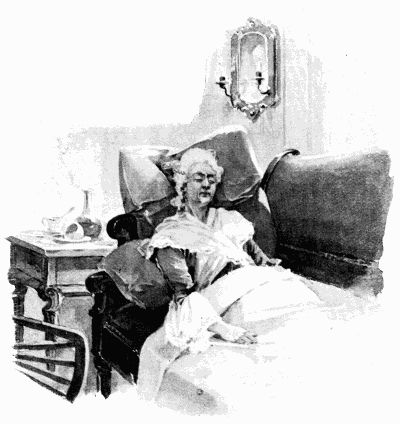
And Katherine, with a little basket full of flower-seeds, was going with the gardener from bed to bed, watching him plant them. No one who had seen her in the childlike [Pg 296]loveliness of her early girlhood could have imagined the splendour of her matured beauty. She had grown "divinely tall," and the exercise of undisputed authority had added a gracious stateliness of manner. Her complexion was wonderful, her large blue eyes shining with tender lights, her face full of sympathetic revelations. Above all, she had that nameless charm which comes from a freedom from all anxious thought for the morrow; that charm of which the sweet secret is generally lost after the twentieth summer. Her basket of seeds was clasped to her side within the hollow of her left arm, and with her right hand she lifted a long petticoat of quilted blue satin. Above this garment she wore a gown of wood-coloured taffeta, sprigged with rose-buds, and a stomacher of fine lace to match the deep rufflings on her elbow-sleeves.
Little Joris was with his mother, running hither and thither, as his eager spirits led him: now pausing to watch her drop from her white fingers the precious seed into its prepared bed, anon darting after some fancied joy among the pyramidal yews, and dusky treillages, and cradle walks of holly and privet. For, as Sir Thomas Swaffham said, "Hyde garden looked just as if brought from Holland;" and especially so in the spring, when it was ablaze with gorgeous tulips and hyacinths.
She had heard much of Lady Capel, and she had a certain tenderness for the old woman who loved her husband so truly; but no thought of her entered into Katherine's mind that calm evening hour. Neither had she any presentiment of sorrow. Her soul was happy and [Pg 297]untroubled, and she lingered in the sweet place until the tender touch of gray twilight was over fen and field. Then her maid, with a manner full of pleasant excitement, came to her, and said,—
"Here be a London pedler, madam; and he do have all the latest fashions, and the news of the king and the Americans."
Now, for many reasons, the advent of a London pedler was a great and pleasant event at the Manor House. Katherine had that delightful and excusable womanly foible, a love of fine clothing; and shops for its sale were very rare, even in towns of considerable size. It was from packmen and hawkers that fine ladies bought their laces and ribbons and gloves; their precious toilet and hair pins, their paints and powders, and India scarfs and fans, and even jewellery. These hawkers were also the great news-bearers to the lonely halls and granges and farmhouses; and they were everywhere sure of a welcome, and of such entertainment as they required. Generally each pedler had his recognized route and regular customers; but occasionally a strange dealer called, and such, having unfamiliar wares, was doubly welcome. "Is it Parkins, Lettice?" asked Katherine, as she turned with interest toward the house.
"No, ma'am, it isn't Parkins; and I do think as the man never showed a face in Hyde before; but he do say that he has a miracle of fine things."
In a few minutes he was exhibiting them to Katherine, and she was too much interested in the wares to notice their merchant particularly.
[Pg 298]Indeed, he had one of those faces which reveal nothing; a face flat, hard, secret as a wall, wrinkled as an old banner. He was a hale, thick-set man, dressed in breeches of corduroy, and a sleeved waistcoat down to his knees of the same material. His fur cap was on the carpet beside his pack; and he had a fluent tongue in praise of his wares, as he hung his silks over Lettice's outstretched arm, or arranged the scarfs across her shoulders.
There was a slow but mutually satisfactory exchange of goods and money; and then the pedler began to repack his treasures, and Lettice to carry away the pretty trifles and the piece of satin her mistress had bought. Then, also, he found time to talk, to take out the last newspapers, and to describe the popular dissatisfaction at the stupid tyranny of the Government toward the Colonies. For either from information, or by some process rapid as instinct, he understood to which side Katherine's sympathies went.
"Here be the 'Flying Postman,' madam, with the great speech of Mr. Burke in it about the port of Boston; but it won't do a mossel o' good, madam, though he do tell 'em to keep their hands out o' the Americans' pockets."
"The port of Boston?"
"See you, madam, they are a-going to shut the port o' Boston, and make Salem the place of entry; that's to punish the Bostonians; and Mr. Burke, he says, 'The House has been told that Salem is only seventeen miles from Boston but justice is not an idea of geography, and the Americans are condemned without [Pg 299]being heard. Yet the universal custom, on any alteration of charters, is to hear the parties at the bar of the House. Now, the question is, Are the Americans to be heard, or not, before the charter is broken for our convenience?... The Boston bill is a diabolical bill.'"
He read aloud this bit of Mr. Burke's fiery eloquence, in a high, droning voice, and would, according to his custom, have continued the entertainment; but Katherine, preferring to use her own intelligence, borrowed the paper and was about to leave the room with it, when he suddenly remembered a scarf of great beauty which he had not shown.
"I bought it for my Lady Suffolk," he said; "but Lord Suffolk died sudden, and black my lady had to wear. It's forrin, madam; and here it is—the very colour of affradiles. But mayhap, as it is candle-teening, you'd like to wait till the day comes again."
A singular look of speculation came into Katherine's face. She examined the scarf without delay; and, as she fingered the delicate silk, she led the man on to talk of Lady Suffolk, though, indeed, he scarcely needed the stimulus of questioning. Without regard as to whether Katherine was taking any interest or not in his information, he detailed with hurried avidity the town talk that had clung to her reputation for so many years; and he so fully described the handsome cavalry officer that was her devoted attendant that Katherine had no difficulty in recognizing her husband, even without the clews which her own knowledge of the parties gave her.
[Pg 300]She stood in the gray light by the window, fingering the delicate satin, and listening. The pedler glanced from his goods to her face, and talked rapidly, interloping bits of news about the court and the fashions; but going always back to Lady Suffolk and her lover, and what was likely to take place now that Lord Suffolk was out of the way. "Though there's them that do say the captain has a comely wife hid up in the country."
Suddenly she turned and faced the stooping man: "Your scarf take: I will not have it. No, and I will not have anything that I have bought from you. All of the goods you shall receive back; and my money, give it to me. You are no honest hawker: you are a bad man, who have come here for a bad woman. You know that of my husband you have been talking—I mean lying. You know that this is his house, and that his true wife am I. Not one more word shall you speak.—Lettice, bring here all the goods I bought from this man; poisoned may be the unguents and scents and gloves. Of such things I have heard."
She had spoken with an angry rapidity that for the moment confounded the stranger; but at this point he lifted himself with an insolent air, and said, "The goods be bought and paid for, madam; and, in faith, I will not buy them back again."
"In faith, then, I will send for Sir Thomas Swaffham. A magistrate is he, and Captain Hyde's friend. Not one penny of my money shall you have; for, indeed, your goods I will not wear."
She pointed then to the various articles which [Pg 301]Lettice had brought back; and, with the shrug of a man who accepts the inevitable, he replaced them in his pack, and then ostentatiously counted back the money Katherine had given him. She examined every coin, and returned a crown. "My piece this is not. It may be false. I will have the one I gave to you.—Lettice, bring here water in a bowl; let the silver and gold lay in it until morning."
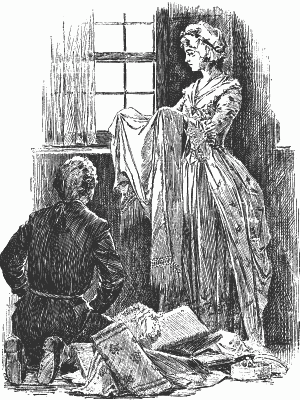
And, turning to the pedler, "Your cap take from the floor, and go."
"Of a truth, madam, you be not so cruel as to turn me on the fens, and it a dark night. There be bogs all about; and how the road do lay for the next house, I know not."
"The road to my house was easy to find; well, then, you can find the road back to whoever it was sent you here. With my servants you shall not sit; under my roof you shall not stay."
"I have no mind to go."
"See you the [Pg 302]mastiff at my feet? I advise you stir him not up, for death is in his jaw. To the gate, and with good haste! In one half-hour the kennels I will have opened. If then within my boundaries you are, it is at your life's peril."
She spoke without passion and without hurry or alarm; but there was no mistaking the purpose in her white, resolute face and fearless attitude. And the pedler took in the situation very quickly; for the dog was already watching him with eyes of fiery suspicion, and an occasional deep growl was either a note of warning to his mistress, or of defiance to the intruder. With an evil glance at the beautiful, disdainful woman standing over him, the pedler rose and left the house; Katherine and the dog so closely following that the man, stooping under his heavy burden, heard her light footsteps and the mastiff's heavy breathing close at his heels, until he passed the large gates and found himself on the dark fen, with just half an hour to get clear of a precinct he had made so dangerous to himself.
For, when he remembered Katherine's face, he muttered, "There isn't a mossel o' doubt but what she'll hev the brutes turned loose. Dash it! women do beat all. But I do hev one bit o' comfort—high-to-instep as she is, she's heving a bad time of it now by herself. I do think that, for sure." And the reflection gave him some gratification, as he cautiously felt his steps forward with his strong staff.
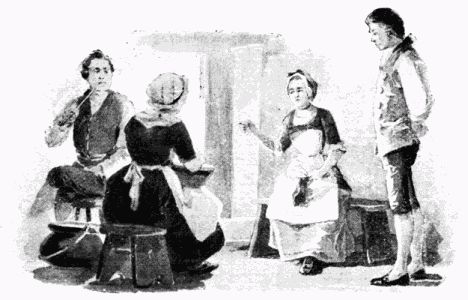
XIV.
"Let me not to the marriage of true minds
Admit impediments: love is not love
Which alters when it alteration finds."
In some respects, the pedler's anticipations were correct. Katherine had "a bad time by herself" that night; for evil has this woful prerogative,—it can wound the good and the innocent, it can make wretched without provocation and without desert. But, whatever her suffering, it was altogether her own. She made no complaint, and she offered no explanation of her singular conduct. Her household, however, had learned to trust her; and the men and women servants sitting around the kitchen-fire that night, talked over the circumstance, and found its very mystery a greater charm than any possible certainty, however terrible, could have given them.
[Pg 304]"She be a stout-hearted one," said the ostler admiringly. "Tony and I a-watched her and the dog a-driving him through the gates. With his bundle on his back, he was a-shuffling along, a-nigh on his all-fours; and the madam at his heels, with her head up in the air, and her eyes a-shining like candles."
"It would be about the captain he spoke."
The remark was ventured by Lettice in a low voice, and the company looked at each other and nodded confidentially. For the captain was a person of great and mysterious importance in the house. All that was done was in obedience to some order received from him. Katherine quoted him continually, granted every favour in his name, made him the authority for every change necessary. His visits were times of holiday, when discipline was relaxed, and the methodical economy of life at the manor house changed into festival. And Hyde had precisely that dashing manner, that mixture of frankness and authority, which dependents admire. The one place in the whole world where nobody would have believed wrong of Hyde was in Hyde's own home.
And yet Katherine, in the secrecy of her chamber, felt her heart quake. She had refused to think of the circumstance until after she had made a pretence of eating her supper, and had seen little Joris asleep, and dismissed Lettice, with all her accustomed deliberation and order. But, oh, how gratefully she turned the key of her room! How glad she felt to be alone with the fear and the sorrow that had come to her! For she wanted to face it honestly; and as she stood with eyes cast down, and hands clasped [Pg 305]behind her back, the calm, resolute spirit of her fathers gathered in her heart, and gave an air of sorrowful purpose to her face and attitude. At that hour she was singularly like Joris Van Heemskirk; and any one familiar with the councillor would have known Katherine to be his daughter.
Most women are restless when they are in anxiety. Katherine felt motion to be a mental disturbance. She sat down, and remained still as a carven image, thinking over what had been told her. There had been a time when her husband's constant talk of Lady Suffolk had pained her, and when she had been a little jealous of the apparent familiarity which existed in their relations with each other; but Hyde had laughed at her fears, and she had taken a pride in putting his word above all her suspicions. She had seen him receive letters which she knew to be from Lady Suffolk. She had seen him read and destroy them without remark. She was aware that many a love-billet from fine ladies followed him to Hyde. But it was in accord with the integrity of her own nature to believe in her husband's faithfulness. She had made one inquiry on the subject, and his assurance at that time she accepted as a final settlement of all doubts. And if she had needed further evidence, she had found it in his affectionate and constant regard for her, and in his love for his child and his home.
It was also a part of Katherine's just and upright disposition to make allowances for the life by which her husband was surrounded. She understood that he must often be placed in circumstances of great temptation and sus[Pg 306]picion. Hyde had told her that there were necessarily events in his daily experience of which it was better for her to be ignorant. "They belong to it, as my uniform does," he said; "they are a part of its appearance; but they never touch my feelings, and they never do you a moment's wrong, Katherine." This explanation it had been the duty both of love and of wisdom to accept; and she had done so with a faith which asked for no conviction beyond it.
And now she was told that for years he had been the lover of another woman; that her own existence was doubted or denied; that if it were admitted, it was with a supposition which affected both her own good name and the rights of her child. In those days, America was at the ends of the earth. A war with it was imminent. The Colonies might be conquered. She knew nothing of international rights, nor what changes such a condition might render possible. Hyde was the probable representative of an ancient noble English family, and its influence was great: if he really wished to annul their marriage, perhaps it was in his power to do so. She knew well how greedy rank was of rank and riches, and she could understand that there might be powerful family reasons for an alliance which would add Lady Suffolk's wealth to the Hyde earldom.
She was no craven, and she faced the position in all its cruel bearings. She asked herself if, even for the sake of her little Joris, she would remain a wife on sufferance, or by the tie of rights which she would have to legally enforce; and then she lifted the candle, and passed [Pg 307]softly into his room to look at him. Though physically like the large, fair, handsome Van Heemskirks, little Joris had certain tricks of expression, certain movements and attitudes, which were the very reflection of his father's,—the same smile, the same droop of the hair on the forehead, the same careless toss of the arm upward in sleep. It was the father in the son that answered her at that hour. She slipped down upon her knees by the sleeping boy, and out of the terror and sorrow of her soul spoke to the Fatherhood in heaven. Nay, but she knelt speechless and motionless, and waited until He spoke to her; spoke to her by the sweet, trustful little lips whose lightest touch was dear to her. For the boy suddenly awoke; he flung his arms around her neck, he laid his face close to hers, and said,—
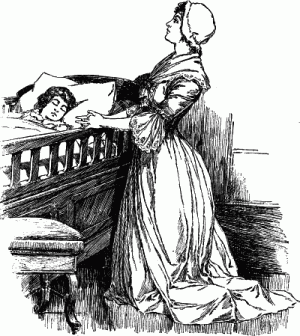
"Oh, mother, beautiful mother, I thought my father was here!"
"You have been dreaming, darling Joris."
"Yes; I am sorry I have been dreaming. I thought my father was here—my good father, that loves us so much."
Then, with a happy face, Katherine rose and gave the child cool water, and turned his hot pillow, and with kisses sent him smiling into dreamland again. In those few tender moments all her fears slipped away from her heart. "I will not believe what a bad man says against my husband—against my dear one who is not here to defend himself. Lies, lies! I will make the denial for him."
And she kept within the comfort of this spirit, even though Hyde's usual letter was three days behind its usual time. Certainly they were hard days. She kept busy; but she could not swallow a mouthful of food, and the sickness and despair that crouched at the threshold of her life made her lightest duties so heavy that it required a constant effort and a constant watchfulness to fulfil them. And yet she kept saying to herself, "All is right. I shall hear in a day or two. There is some change in the service. There is no change in Richard—none."
On the fourth day her trust had its reward. She found then that the delay had been caused by the necessary charge and care of ceremonies which Lady Capel's death forced upon her husband. She had almost a sentiment of gratitude to her, although she was yet ignorant of [Pg 309]her bequest of eight thousand pounds. For Hyde had resolved to wait until the reading of the will made it certain, and then to resign his commission, and carry the double good news to Katherine himself. Henceforward, they were to be together. He would buy more land, and improve his estate, and live happily, away from the turmoil of the town, and the disagreeable duties of active service in a detestable quarrel. So this purpose, though unexpressed, gave a joyous ring to his letter; it was lover-like in its fondness and hopefulness, and Katherine thought of Lady Suffolk and her emissary with a contemptuous indifference.
"My dear one she intended that I should make miserable with reproaches, and from his own home drive him to her home for some consolations;" and Katherine smiled as she reflected how hopeless such a plan of separation would be.
Never, perhaps, are we so happy as when we have just escaped some feared calamity. That letter lifted the last fear from Katherine's heart, and it gave her also the expectation of an early visit. "I am very impatient to see you, my Kate," he wrote; "and as early as possible after the funeral, you may expect me." The words rang like music in her heart. She read them aloud to little Joris, and then the whole household warmed to the intelligence. For there was always much pleasant preparation for Hyde's visits,—clean rooms to make still cleaner, silver to polish, dainties to cook; every weed to take from the garden, every unnecessary straw from the yards. For the master's eye, everything must be beautiful. [Pg 310]To the master's comfort, every hand was delighted to minister.
So these last days of May were wonderfully happy ones to Katherine. The house was in its summer draperies—all its windows open to the garden, which had now not only the freshness of spring, but the richer promise of summer. Katherine was always dressed with extraordinary care and taste. Little Joris was always lingering about the gates which commanded the longest stretch of observation. A joyful "looking forward" was upon every face.
Alas, these are the unguarded hours which sorrow surprises! But no thought of trouble, and no fear of it, had Katherine, as she stood before her mirror one afternoon. She was watching Lettice arrange the double folds of her gray taffeta gown, so as to display a trifle the high scarlet heels of her morocco slippers, with their scarlet rosettes and small diamond buckles.
"Too cold a colour is gray for me, Lettice: give me those scarlet ribbons for a breast knot;" and as Lettice stood with her head a little on one side, watching her mistress arrange the bright bows at her stomacher, there came a knock at the chamber door.
"Here be a strange gentleman, madam, to see you; from London, he do say."
A startled look came into Katherine's face; she dropped the ribbon from her hand, and turned to the servant, who stood twisting a corner of her apron at the front-door.
"Well, then, Jane, like what is the stranger?"
"He be in soldier's dress, madam"—
[Pg 311]"What?"
She asked no further question, but went downstairs; and, as the tapping of her heels was heard upon them, Jane lifted her apron to her eyes and whimpered, "I think there be trouble; I do that, Letty."
"About the master?"
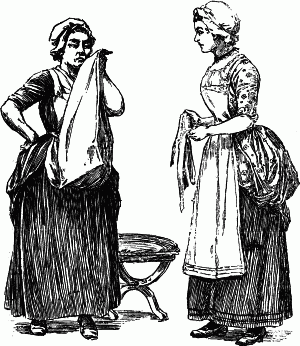
"It be like it. And the man rides a gray horse too. Drat the man, to come with news on a gray horse! It be that unlucky, as no one in their seven senses would do it."
"For sure it be! When I was a young wench at school"—and then, as she folded up the loose ribbons, Letty told a gruesome story of a farmer robbed and murdered; but as she came to the part the gray horse played in the tale, Katherine slowly walked into the room, with a letter in her hand. She was white, even to her lips; and with a mournful shake of her head, she motioned to the girls to leave her alone. She put the paper out of her hand, and stood regarding it. Fully ten minutes elapsed ere she gathered strength sufficient to break its [Pg 312]well-known seal, and take in the full meaning of words so full of agony to her.
"It is midnight, beloved Katherine, and in six hours I may be dead. Lord Paget spoke of my cousin to me in such terms as leaves but one way out of the affront. I pray you, if you can, to pardon me. The world will condemn me, my own actions will condemn me; and yet I vow that you, and you only, have ever had my love. You I shall adore with my last breath. Kate, my Kate, forgive me. If this comes to you by strange hands, I shall be dead or dying. My will and papers of importance are in the drawer marked "B" in my escritoire. Kiss my son for me, and take my last hope and thought."
These words she read, then wrung her hands, and moaned like a creature that had been wounded to death. Oh, the shame! Oh, the wrong and sorrow! How could she bear it? What should she do? Captain Lennox, who had brought the letter, was waiting for her decision. If she would go to her husband, then he could rest and return to London at his leisure. If not, Hyde wanted his will, to add a codicil regarding the eight thousand pounds left him by Lady Capel. For he had been wounded in his side; and a dangerous inflammation having set in, he had been warned of a possible fatal result.
Katherine was not a rapid thinker. She had little, either, of that instinct which serves some women instead of all other prudences. Her actions generally arose from motives clear to her own mind, and of whose wisdom or kindness she had a conviction. But in this hour so [Pg 313]many things appealed to her that she felt helpless and uncertain. The one thought that dominated all others was that her husband had fought and fallen for Lady Suffolk. He had risked her happiness and welfare, he had forgotten her and his child, for this woman. It was the sequel to the impertinence of the pedler's visit. She believed at that moment that the man had told her the truth. All these years she had been a slighted and deceived woman.
This idea once admitted, jealousy of the crudest and most unreasonable kind assailed her. Incidents, words, looks, long forgotten rushed back upon her memory, and fed the flame. Very likely, if she left her child and went to London, she might find Lady Suffolk in attendance on her husband, or at least be compelled for his life's sake to submit to her visits. She pondered this supposition until it brought forth one still more shameful. Perhaps the whole story was a scheme to get her up to London. Perhaps she might disappear there. What, then, would be done to her child? If Richard Hyde was so infatuated with Lady Suffolk, what might he not do to win her and her large fortune? Even the news of Lady Capel's death was now food for her suspicions. Was she dead, or was the assertion only a part of the conspiracy? If she had been dead, Sir Thomas Swaffham would have heard of the death; yet she had seen him that morning, and he had made no mention of the circumstance.
"To London I will not go," she decided. "There is some wicked plan for me. The will [Pg 314]and the papers are wanted, that they may be altered to suit it. I will stay here with my child. Even sorrow great as mine is best borne in one's own home."
She went to the escritoire to get the papers. When she opened the senseless chamber of wood, she found herself in the presence of many a torturing, tender memory. In one compartment there were a number of trout-flies. She remembered the day her husband had made them—a long, rainy, happy day during his last visit. Every time she passed him, he drew her face down to kiss it. And she could hear little Joris talking about the work, and his father's gay laughter at the child's remarks. In an open slide, there was a rude picture of a horse. It was the boy's first attempt to draw Mephisto, and it had been carefully put away. The place was full of such appeals. Katherine rarely wept; but, standing before these mementos, her eyes filled, and with a sob she clasped her hands across them, as if the sight of such tokens from a happy past was intolerable.
Drawer B was a large compartment full of papers and of Hyde's personal treasures. Among them was a ring that his father had given him, his mother's last letter, a lock of his son's hair, her own first letter—the shy, anxious note that she wrote to Mrs. Gordon. She looked sadly at these things, and thought how valueless all had become to him at that hour. Then she began to arrange the papers according to their size, and a small sealed parcel slipped from among them. She lifted it, and saw a rhyme in her husband's writing on the outside,—
"Oh, my love, my love! This thy gift I hold
More than fame or treasure, more than life or gold."
It had evidently been sealed within a few months, for it was in a kind of bluish-tinted paper which Hyde bought in Lynn one day during the past winter. She turned it over and over in her hand, and the temptation to see the love-token inside became greater every moment. This was a thing her husband had never designed any human eye but his own to see. Whatever revelation there was in it, much or little, would be true. Tortured by doubt and despair, she felt that impulse to rely on chance for a decision which all have experienced in matters of grave moment, apparently beyond natural elucidation.
"If in this parcel there is some love-pledge from Lady Suffolk, then I go not; nothing shall make me go. If in it there is no word of her, no message to her or from her; if her name is not there, nor the letters of her name,—then I will go to my own. A new love, one not a year old, I can put aside. I will forgive every one but my Lady Suffolk."
So Katherine decided as she broke the seal with firmness and rapidity. The first paper within the cover made her tremble. It was a half sheet which she had taken one day from Bram's hand, and it had Bram's name across it. On it she had written the first few lines which she had had the right to sign "Katherine Hyde." It was, indeed, her first "wife" letter; and within it was the precious love-token, her own love-token,—the bow of orange ribbon.
She gave a sharp cry as it fell upon the desk; [Pg 316]and then she lifted and kissed it, and held it to her breast, as she rocked herself to and fro in a passionate transport of triumphant love. Again and again she fed her eyes upon it. She recalled the night she wore it first, and the touch of her mother's fingers as she fastened it at her throat. She recalled her father's happy smile of proud admiration for her; the afternoon, next, when she had stood with Joanna at the foot of the garden and seen her lover wearing it on his breast. She remembered what she had heard about the challenge, and the desperate fight, and the intention of Semple's servant to remove the token from her senseless lover's breast, and her father's noble interference. The bit of fateful ribbon had had a strange history, yet she had forgotten it. It was her husband who had carefully sealed it away among the things most precious to his heart and house. It still kept much of its original splendid colour, but it was stained down all its length with blood. Nothing that Hyde could have done, no words that he could have said, would have been so potent to move her.
"I will give it to him again. With my own hands I will give it to him once more. O Richard, my lover, my husband! Now I will hasten to see thee."
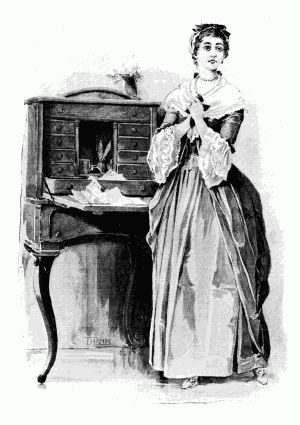
With relays at every post-house, she reached London the next night, and, weary and terrified, drove at once to the small hostelry where Hyde lay. There was a soldier sitting outside his chamber-door, but the wounded man was quite alone when Katherine entered. She took in at a glance the bare, comfortless room, scarcely lit by the sputtering rush-candle, and the rude bed, and the burning cheeks of the fevered man upon it.
"Katherine!" he cried; and his voice was as weak and as tearful as that of a troubled child.
"Here come I, my dear one."
"I do not deserve it. I have been so wicked, and you my pure good wife."
"See, then, I have had no temptations, but thou hast lived in the midst of great ones. Then, how natural and how easy was it for thee to do wrong!"
"Oh, how you love me, Katherine!"
"God knows."
"And for this wrong you will not forsake me?"
She took from her bosom the St. Nicholas ribbon. "I give it to thee again. At the first time I loved thee; now, my husband, ten thousand times more I love thee. As I went through the papers, I found it. So much it said to me of thy true love! So sweetly for thee it pleaded! All that it asks for thee, I give. All that thou hast done wrong to me, it forgives."
And between their clasped hands it lay,—the bit of orange ribbon that had handselled all their happiness.
"It is the promise of everything I can give thee, my loved one," whispered Katherine.
"It is the luck of Richard Hyde. Dearest wife, thou hast given me my life back again."
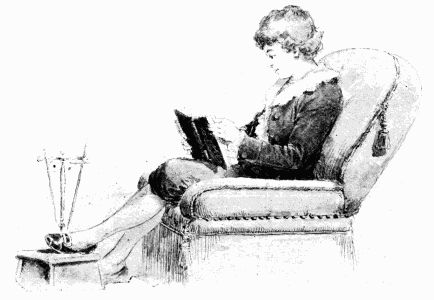
XV.
"Wise men ne'er sit and wail their woes,
But presently prevent the ways to wail."
It was a hot August afternoon; and the garden at Hyde Manor was full of scent in all its shady places,—hot lavender, seductive carnation, the secretive intoxication of the large white lilies, and mingling with them the warm smell of ripe fruits from the raspberry hedges, and the apricots and plums turning gold and purple upon the southern walls.
Hyde sat at an open window, breathing the balmy air, and basking in the light and heat, which really came to him with "healing on their wings." He was pale and wasted from his long sickness; but there was speculation and purpose in his face, and he had evidently cast away the mental apathy of the invalid. As he sat thus, a servant entered and said a [Pg 321]few words which made him turn with a glad, expectant manner to the open door; and, as he did so, a man of near sixty years of age passed through it—a handsome, lordly-looking man, who had that striking personal resemblance to Hyde which affectionate brothers often have to one another.
"Faith, William, you are welcome home! I am most glad to see you."
"Sit still, Dick. You sad rascal, you've been playing with cold steel again, I hear! Can't you let it alone, at your age?"
"Why, then, it was my business, as you know, sir. My dear William, how delighted I am to see you!"
"'Tis twelve years since we met, Dick. You have been in America; I have been everywhere. I confess, too, I am amazed to hear of your marriage. And Hyde Manor is a miracle. I expected to find it mouldy and mossy—a haunt for frogs and fever. On the contrary, it is a place of perfect beauty."
"And it was all my Katherine's doing."
"I hear that she is Dutch; and, beyond a doubt, her people have a genius that develops in low lands."
"She is my angel. I am unworthy of her goodness and beauty."
"Why, then, Dick, I never saw you before in such a proper mood; and I may as well tell you, while you are in it, that I have also found a treasure past belief of the same kind. In fact, Dick, I am married, and have two sons."
There was a moment's profound silence, and an inexplicable shadow passed rapidly over [Pg 322]Hyde's face; but it was fleeting as a thought, and, ere the pause became strained and painful, he turned to his brother and said, "I am glad, William. With all my heart, I am glad."
"Indeed, Dick, when Emily Capel died, I was sincere in my purpose never to marry; and I looked upon you always as the future earl, until one night in Rome, in a moment, the thing was altered."
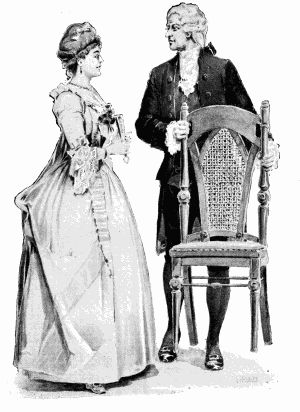
"I can understand that, William."
"I was married very quietly, and have been in Italy ever since. Only four days have elapsed since I returned to England. My first inquiries were about you."
"I pray you, do not believe all that my enemies will say of me."
"Among other things, I was told that you had left the army."
"That is exactly true. When I heard that Lord Percy's regiment was designed for America, and against the Americans, I put it out of the king's power to send me on such a business."
"Indeed, I think the Americans have been ill-used; and I find the town in a great commotion upon the matter. The night I landed, there had come bad news from New York. The people of that city had burned effigies of Lord North and Governor Hutchinson, and the new troops were no sooner landed than five hundred of them deserted in a body. At White's it was said that the king fell into a fit of crying when the intelligence was brought him."
Hyde's white face was crimson with excitement, and his eyes glowed like stars as he listened.
[Pg 324][Pg 325]"That was like New York; and, faith, if I had been there, I would have helped them!"
"Why not go there? I owe you much for the hope of which my happiness has robbed you. I will take Hyde Manor at its highest price; I will add to it fifty thousand pounds indemnity for the loss of the succession. You may buy land enough for a duchy there, and found in the New World a new line of the old family. If there is war, you have your opportunity. If the colonists win their way, your family and means will make you a person of great consideration. Here, you can only be a member of the family; in America, you can be the head of your own line. Dick, my dear brother, out of real love and honour I speak these words."
"Indeed, William, I am very sensible of your kindness, and I will consider well your proposition for you must know that it is a matter of some consequence to me now. I think, indeed, that my Katherine will be in a transport of delight to return to her native land. I hear her coming, and we will talk with her; and, anon, you shall confess, William, that you have seen the sweetest woman that ever the sun shone upon."
Almost with the words she entered, clothed in a white India muslin, with carnations at her breast. Her high-heeled shoes, her large hoop, and the height to which her pale gold hair was raised, gave to the beautiful woman an air of majesty that amazed the earl. He bowed low, and then kissed her cheeks, and led her to a chair, which he placed between Hyde and himself.
[Pg 326]Of course the discussion of the American project was merely opened at that time. English people, even at this day, move only after slow and prudent deliberation; and then emigration was almost an irrevocable action. Katherine was predisposed to it, but yet she dearly loved the home she had made so beautiful. During Hyde's convalescence, also, other plans had been made and talked over until they had become very hopeful and pleasant; and they could not be cast aside without some reluctance. In fact, the purpose grew slowly, but surely, all through the following winter; being mainly fed by Katherine's loving desire to be near to her parents, and by Hyde's unconfessed desire to take part in the struggle which he foresaw, and which had his warmest sympathy. Every American letter strengthened these feelings; but the question was finally settled—as many an important event in every life is settled—by a person totally unknown to both Katherine and Hyde.
It was on a cold, stormy afternoon in February, when the fens were white with snow. Hyde sat by the big wood-fire, re-reading a letter from Joris Van Heemskirk, which also enclosed a copy of Josiah Quincy's speech on the Boston Port Bill. Katherine had a piece of worsted work in her hands. Little Joris was curled up in a big chair with his book, seeing nothing of the present, only conscious of the gray, bleak waves of the English Channel, and the passionate Blake bearing down upon Tromp and De Ruyter.
"What a battle that would be!" he said, jumping to his feet. "Father, I wish that I had lived a hundred years ago."
[Pg 327]"What are you talking about, George?"
"Listen, then: 'Eighty sail put to sea under Blake. Tromp and De Ruyter, with seventy-six sail, were seen, upon the 18th of February, escorting three hundred merchant-ships up the channel. Three days of desperate fighting ensued, and Tromp acquired prodigious honour by this battle; for, though defeated, he saved nearly the whole of his immense convoy.' I wish I had been with Tromp, father."
"But an English boy should wish to have been with Blake."
"Tromp had the fewer vessels. One should always help the weaker side, father. And, besides, you know I am half Dutch."
Katherine looked proudly at the boy, but Hyde had a long fit of musing. "Yes," he answered at length, "a brave man always helps those who need it most. Your father's letter, Katherine, stirs me wonderfully. Those Americans show the old Saxon love of liberty. Hear how one of them speaks for his people: 'Blandishments will not fascinate us, nor will threats of a halter intimidate. For, under God, we are determined that wheresoever, whensoever, or howsoever we shall be called to make our exit, we will die free men.' Such men ought to be free, Katherine, and they will be free."
It was at this moment that Lettice came in with a bundle of newspapers: "They be brought by Sir Thomas Swaffham's man, sir, with Sir Thomas's compliments; there being news he thinks you would like to read, sir."
Katherine turned promptly. "Spiced ale and bread and meat give to the man, Lettice; [Pg 328]and to Sir Thomas and Lady Swaffham remind him to take our respectful thanks."
Hyde opened the papers with eager curiosity. Little Joris was again with Tromp and Blake in the channel; and Katherine, remembering some household duty, left the father and son to their private enthusiasms. She was restless and anxious, for she had one of those temperaments that love a settled and orderly life. It would soon be spring, and there were a thousand things about the house and garden which would need her attention if they were to remain at Hyde. If not, her anxieties in other directions would be equally numerous and necessary. She stood at the window looking into the white garden close. Something about it recalled her father's garden; and she fell into such a train of tender memories that when Hyde called quickly, "Kate, Kate!" she found that there were tears in her eyes, and that it was with an effort and a sigh her soul returned to its present surroundings.
Hyde was walking about the room in great excitement,—his tall, nervous figure unconsciously throwing itself into soldierly attitudes; his dark, handsome face lit by an interior fire of sympathetic feeling.
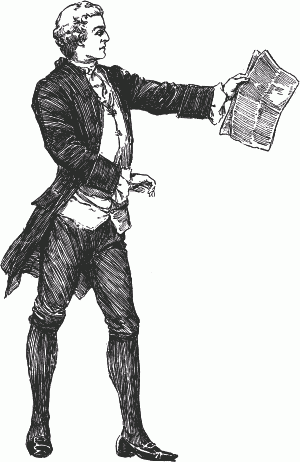
"I must draw my sword again, Katherine," he said, as his hand impulsively went to his left side,—"I must draw my [Pg 329]sword again. I thought I had done with it forever; but, by St. George, I'll draw it in this quarrel!"
"The American quarrel, Richard?"
"No other could so move me. We have the intelligence now of their congress. They have not submitted; they have not drawn back, not an inch; they have not quarrelled among themselves. They have unanimously voted for non-importation, non-exportation, and non-consumption. They have drawn up a declaration of their rights. They have appealed to the sympathies of the people of Canada, and they have resolved to support by arms all their brethren unlawfully attacked. Hurrah, Katherine! Every good man and true wishes them well."
"But it is treason, dear one."
"Soh! It was treason when the barons forced the Great Charter from King John. It was treason when Hampden fought against 'ship-money,' and Cromwell against Star Chambers, and the Dutchman William laid his firm hand on the British Constitution. All revolutions are treason until they are accomplished. We have long hesitated, we will waver no more. The conduct of Sir Jeffrey Amherst has decided me."
"I know it not."
"On the 6th of this month the king offered him a peerage if he would take command of the troops for America; and he answered, 'Your majesty must know that I cannot bring myself to fight the Americans, who are not only of my own race, but to whose former kindness I am also much obliged.' By the last [Pg 330]mail, also, accounts have come of vast desertions of the soldiers of Boston; and three officers of Lord Percy's regiment are among the number. Katherine, our boy has told me this afternoon that he is half Dutch. Why should we stay in England, then, for his sake? We will do as Earl William advises us,—go to America and found a new house, of which I and he will be the heads. Are you willing?"
"Only to be with you, only to please you, Richard. I have no other happiness."
"Then it is settled; and I thank Sir Jeffrey Amherst, for his words have made me feel ashamed of my indecision. And look you, dear Kate, there shall be no more delays. The earl buys Hyde as it stands; we have nothing except our personal effects to pack: can you be ready in a week?"
"You are too impatient, Richard. In a week it is impossible.
"Then in two weeks. In short, my dear, I have taken an utter aversion to being longer in King George's land."
"Poor king! Lady Swaffham says he means well; he misunderstands, he makes mistakes."
"And political mistakes are crimes, Katherine. Write to-night to your father. Tell him that we are coming in two weeks to cast our lot with America. Upon my honour, I am impatient to be away."
When Joris Van Heemskirk received this letter, he was very much excited by its contents. Putting aside his joy at the return of his beloved daughter, he perceived that the hour expected for years had really struck. The true sympathy that had been so long in his [Pg 331]heart, he must now boldly express; and this meant in all probability a rupture with most of his old associates and friends—Elder Semple in the kirk, and the Matthews and Crugers and Baches in the council.
He was sitting in the calm evening, with unloosened buckles, in a cloud of fragrant tobacco, talking of these things. "It is full time, come what will," said Lysbet. "Heard thou what Batavius said last night?"
"Little I listen to Batavius."
"But this was a wise word. 'The colonists are leaving the old ship,' he said; 'and the first in the new boat will have the choice of oars.'"
"That was like Batavius, but I will take higher counsel than his."
Then he rose, put on his hat, and walked down his garden; and, as he slowly paced between the beds of budding flowers, he thought of many things,—the traditions of the past struggles for freedom, and the irritating wrongs that had imbittered his own experience for ten years. There was plenty of life yet in the spirit his fathers had bequeathed to him; and, as this and that memory of wrong smote it, the soul-fire kindled, glowed, burned with passionate flame. "Free, God gave us this fair land, and we will keep it free. There has been in it no crowns and sceptres, no bloody Philips, no priestly courts of cruelty; and, in God's name, we will have none!"
He was standing on the river-bank; and the meadows over it were green and fair to see, and the fresh wind blew into his soul a thought of its own untrammelled liberty. He looked up [Pg 332]and down the river, and lifted his face to the clear sky, and said aloud, "Beautiful land! To be thy children we should not deserve, if one inch of thy soil we yielded to a tyrant. Truly a vaderland to me and to mine thou hast been. Truly do I love thee." And then, his soul being moved to its highest mark, he answered it tenderly, in the strong-syllabled mother-tongue that it knew so well,—
"Indien ik u vergeet, o Vaderland! zoo vergete mijne regter-hand zich zelve!"
Such communion he held with himself until the night came on, and the dew began to fall; and Lysbet said to herself, "I will walk down the garden: perhaps there is something I can say to him." As she rose, Joris entered, and they met in the centre of the room. He put his large hands upon her shoulders, and, looking solemnly in her face, said, "My Lysbet, I will go with the people; I will give myself willingly to the cause of freedom. A long battle is it. Two hundred years ago, a Joris Van Heemskirk was fighting in it. Not less of man than he was, am I, I hope."
There was a mist of tears over his eyes—a mist that was no dishonour; it only showed that the cost had been fully counted, and his allegiance given with a clear estimate of the value and sweetness of all that he might have to give with it. Lysbet was a little awed by the solemnity of his manner. She had not before understood the grandeur of such a complete surrender of self as her husband had just consummated. But never had she been so proud of him. Everything commonplace had slipped away: he looked taller, younger, handsomer.
[Pg 334][Pg 335]She dropped her knitting to her feet, she put her arms around his neck, and, laying her head upon his breast, said softly, "My good Joris! I will love thee forever."
In a few minutes Elder Semple came in. He looked exceedingly worried; and, although Joris and he avoided politics by a kind of tacit agreement, he could not keep to kirk and commercial matters, but constantly returned to one subject,—a vessel lying at Murray's Wharf, which had sold her cargo of molasses and rum to the "Committee of Safety."
"And we'll be haeing the custom-house about the city's ears, if there's 'safety' in that,—the born idiots," he said.
Joris was in that grandly purposeful mood that takes no heed of fretful worries. He let the elder drift from one grievance to another; and he was just in the middle of a sentence containing his opinion of Sears and Willet, when Bram's entrance arrested it. There was something in the young man's face and attitude which made every one turn to him. He walked straight to the side of Joris,—
"Father, we have closed his Majesty's custom-house forever."
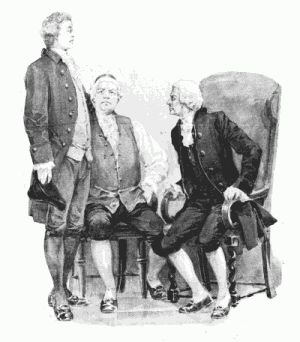
"We! Who, then, Bram?"
"The Committee of Safety and the Sons of Liberty."
Semple rose to his feet, trembling with passion. "Let me tell you, then, Bram, you are a parcel o' rogues and rebels; and, if I were his Majesty, I'd gibbet the last ane o' you."
"Patience, Elder. Sit down, I'll speak"—
"No, Councillor, I'll no sit down until I ken what kind o' men I'm sitting wi'. Oot [Pg 336]wi' your maist secret thoughts. Wha are you for?"
"For the people and for freedom am I," said Joris, calmly rising to his feet. "Too long have we borne injustice. My fathers would have spoken by the sword before this. Free kirk, free state, free commerce, are the breath of our nostrils. Not a king on earth our privileges and rights shall touch; no, not with his finger-tips. Bram, my son, I am your comrade in this quarrel." He spoke with fervent, but not rapid speech, and with a firm, round voice, full of magical sympathies.
"I'll hear nae mair o' such folly.—Gie me my bonnet and plaid, madam, and I'll be going.—The King o' England needna ask his Dutch subjects for leave to wear his crown, I'm thinking."
"Subjects!" said Bram, flashing up. "Subjection! Well, then, Elder, Dutchmen don't understand the word. Spain found that out."
"Hoots! dinna look sae far back, Bram. It's a far cry, to Alva and Philip. Hae you naething fresher? Gude-night, a'. I hope the morn will bring you a measure o' common sense." He was at the door as he spoke; but, ere he passed it, he lifted his bonnet above his head and said, "God save the king! God save his gracious Majesty, George of England!"
Joris turned to his son. To shut up the king's customs was an overt action of treason. Bram, then, had fully committed himself; and, following out his own thoughts, he asked abruptly, "What will come of it, Bram?"
"War will come, and liberty—a great commonwealth, a great country."
[Pg 337]"It was about the sloop at Murray's Wharf?"
"Yes. To the Committee of Safety her cargo she sold; but Collector Cruger would not that it should leave the vessel, although offered was the full duty."
"For use against the king were the goods; then Cruger, as a servant of King George, did right."
"Oh, but if a tyrant a man serves, we cannot suffer wrong that a good servant he may be! King George through him refused the duty: no more duties will we offer him. We have boarded up the doors and windows of the custom-house. Collector Cruger has a long holiday."
He did not speak lightly, and his air was that of a man who accepts a grave responsibility. "I met Sears and about thirty men with him on Wall Street. I went with them, thinking well on what I was going to do. I am ready by the deed to stand."
"And I with thee. Good-night, Bram, To-morrow there will be more to say."
Then Bram drew his chair to the hearth, and his mother began to question him; and her fine face grew finer as she listened to the details of the exploit. Bram looked at her proudly. "I wish only that a fort full of soldiers and cannon it had been," he said. "It does not seem such a fine thing to take a few barrels of rum and molasses."
"Every common thing is a fine thing when it is for justice. And a fine thing I think it was for these men to lay down every one his work and his tool, and quietly and orderly go do the work that was to be done for honour and for freedom. If there had been flying [Pg 338]colours and beating drums, and much blood spilt, no grander thing would it have been, I think."
And, as Bram filled and lighted his pipe, he hummed softly the rallying song of the day,—
"In story we're told
How our fathers of old
Braved the rage of the winds and the waves;
And crossed the deep o'er,
For this far-away shore,
All because they would never be slaves—brave boys!
All because they would never be slaves.
"The birthright we hold
Shall never be sold,
But sacred maintained to our graves;
And before we comply
We will gallantly die,
For we will not, we will not be slaves—brave boys!
For we will not, we will not be slaves."
In the meantime Semple, fuming and ejaculating, was making his way slowly home. It was a dark night, and the road full of treacherous soft places, fatal to that spotless condition of hose and shoes which was one of his weak points. However, before he had gone very far, he was overtaken by his son Neil, now a very staid and stately gentleman, holding under the government a high legal position in the investigation of the disputed New-Hampshire grants.
He listened respectfully to his father's animadversions on the folly of the Van Heemskirks; but he was thinking mainly of the first news told him,—the early return of Katherine. He was conscious that he still loved Katherine, and that he still hated Hyde. As they approached the house, the elder saw the gleam of a candle [Pg 339]through the drawn blind; and he asked querulously, "What's your mother doing wi' a candle at this hour, I wonder?"
"She'll be sewing or reading, father."
"Hoots! she should aye mak' the wark and the hour suit. There's spinning and knitting for the night-time. Wi' soldiers quartered to the right hand and the left hand, and a civil war staring us in the face, it's neither tallow nor wax we'll hae to spare."
He was climbing the pipe-clayed steps as he spoke, and in a few minutes was standing face to face with the offender. Madam Semple was reading and, as her husband opened the parlour door, she lifted her eyes from her book, and let them calmly rest upon him.
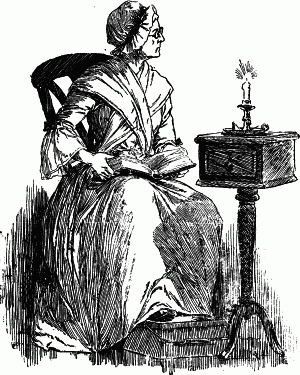
"Fire-light and candle-light, baith, Janet! A fair illumination, and nae ither thing but bad news for it."
"It is for reading the Word, Elder."
"For the night season, meditation, Janet, meditation;" and he lifted the extinguisher, and put out the candle. "Meditate on what you hae read. The Word will bide a deal o' thinking about. You'll hae heard the ill news?"
[Pg 340]"I heard naething ill."
"Didna Neil tell you?"
"Anent what?"
"The closing o' the king's customs."
"Ay, Neil told me."
"Weel?"
"Weel, since you ask me, I say it was gude news."
"Noo, Janet, we'll hae to come to an understanding. If I hae swithered in my loyalty before, I'll do sae nae mair. From this hour, me and my house will serve King George. I'll hae nae treason done in it, nor said; no, nor even thocht o'."
"You'll be a vera Samson o' strength, and a vera Solomon o' wisdom, if you keep the hands and the tongues and the thochts o' this house. Whiles, you canna vera weel keep the door o' your ain mouth, gudeman. What's come o'er you, at a'?"
"I'm surely master in my ain house, Janet."
"'Deed, you are far from being that, Alexander Semple. Doesna King George quarter his men in it? And havena you to feed and shelter them, and to thole their ill tempers and their ill ways, morning, noon, and night? You master in your ain house! You're just a naebody in it!"
"Dinna get on your high horse, madam. Things are coming to the upshot: there's nae doot o' it."
"They've been lang aboot it—too lang."
"Do you really mean that you are going to set yoursel' among the rebels?"
"Going? Na, na; I have aye been amang them. And ten years syne, when the Stamp [Pg 341]Act was the question, you were heart and soul wi' the people. The quarrel to-day is the same quarrel wi' a new name. Tak' the side o' honour and manhood and justice, and dinna mak' me ashamed o' you, Alexander. The Semples have aye been for freedom,—Kirk and State,—and I never heard tell o' them losing a chance to gie them proud English a set-down before. What for should you gie the lie to a' your forbears said and did? King George hasna put his hand in his pocket for you; he has done naething but tax your incomings and your outgoings. Ask Van Heemskirk: he's a prudent man, and you'll never go far wrong if you walk wi' him."
"Ask Van Heemskirk, indeed! Not I. The rebellious spirit o' the ten tribes is through all the land; but I'll stand by King George, if I'm the only man to do it."
"George may be king o' the Semples. I'm a Gordon. He's no king o' mine. The Gordons were a' for the Stuarts."
"Jacobite and traitor, baith! Janet, Janet, how can you turn against me on every hand?"
"I'll no turn against you, Elder; and I'll gie you no cause for complaint, if you dinna set King George on my hearthstone, and bring him to my table, and fling him at me early and late." She was going to light the candle again; and, with it in her hand, she continued: "That's enough anent George rex at night-time, for he isna a pleasant thought for a sleeping one. How is Van Heemskirk going? And Bram?"
"Bram was wi' them that unloaded the schooner and closed the custom-house—the born idiots!"
[Pg 342]"I expected that o' Bram."
"As for his father, he's the blackest rebel you could find or hear tell o' in the twelve Provinces."
"He's a good man; Joris is a good man, true and sure. The cause he lifts, he'll never leave. Joris and Bram—excellent! They two are a multitude."
"Humff!" It was all he could say. There was something in his wife's face that made it look unfamiliar to him. He felt himself to be like the prophet of Pethor—a man whose eyes are opened. But Elder Semple was not one of the foolish ones who waste words. "A wilfu' woman will hae her way," he thought; "and if Janet has turned rebel to the king, it's mair than likely she'll throw off my ain lawfu' authority likewise. But we'll see, we'll see," he muttered, glancing with angry determination at the little woman, who, for her part, seemed to have put quite away all thoughts of king and Congress.
She stood with the tinder-box and the flint and brimstone matches in her hands. "I wonder if the tinder is burnt enough, Alexander," she said; and with the words she sharply struck the flint. A spark fell instantly and set fire to it, and she lit her match and watched it blaze with a singular look of triumph on her face. Somehow the trifling affair irritated the elder. "What are you doing at a'? You're acting like a silly bairn, makin' a blaze for naething. There's a fire on the hearth: whatna for, then, are you wasting tinder and a match?"
"Maybe it wasna for naething, Elder. Maybe I was asking for a sign, and got the ane I [Pg 343]wanted. There's nae sin in that, I hope. You ken Gideon did it when he had to stand up for the oppressed, and slay the tyrant."
"Tut, woman, you arena Gideon, nor yet o' Gideon's kind; and, forbye, there's nae angel speaking wi' you."
"You're right there, Elder. But, for a' that, I'm glad that the spark fired the tinder, and that the tinder lit the match, and that the match burnt sae bright and sae bravely. It has made a glow in my heart, and I'll sleep well wi' the pleasure o' it."
Next morning the argument was not renewed. Neil was sombre and silent. His father was uncertain as to his views, and he did not want to force or hurry a decision. Besides, it would evidently be more prudent to speak with the young man when he could not be influenced by his mother's wilful, scornful tongue. Perhaps Neil shared this prudent feeling; for he deprecated conversation, and, on the plea of business, left the breakfast-table before the meal was finished.
The elder, however, had some indemnification for his cautious silence. He permitted himself, at family prayers, a very marked reading of St. Paul's injunction, "Fear God and honour the king;" and ere he left the house he said to his wife, "Janet, I hope you hae come to your senses. You'll allow that you didna treat me wi' a proper respect yestreen?"
She was standing face to face with him, her hands uplifted, fastening the broad silver clasp of his cloak. For a moment she hesitated, the next she raised herself on tiptoes, and kissed him. He pursed up his mouth a little sternly, [Pg 344]and then stroked her white hair. "You heard what St. Paul says, Janet; isna that a settlement o' the question?"
"I'm no blaming St. Paul, Alexander. If ever St. Paul approves o' submitting to tyranny, it's thae translators' fault. He wouldna tak' injustice himsel', not even from a Roman magistrate. I wish St. Paul was alive the day: I'm vera sure if he were, he'd write an epistle to the English wad put the king's dues just as free men would be willing to pay them. Now, don't be angry, Alexander. If you go awa' angry at me, you'll hae a bad day; you ken that, gudeman."
It was a subtile plea; for no man, however wise or good or brave, likes to bespeak ill-fortune when it can be averted by a sacrifice so easy and so pleasant. But, in spite of Janet's kiss, he was unhappy; and when he reached the store, the clerks and porters were all standing together talking. He knew quite well what topic they were discussing with such eager movements and excited speech. But they dispersed to their work at the sight of his sour, stern face, and he did not intend to open a fresh dispute by any question.
Apprentices and clerks then showed a great deal of deference to their masters, and Elder Semple demanded the full measure due to him. Something, however, in the carriage, in the faces, in the very, tones of his servants' voices, offended him; and he soon discovered that various small duties had been neglected.
"Listen to me, lads," he said angrily; "I'll have nae politics mixed up wi' my exports [Pg 345]and my imports. Neither king nor Congress has anything to do wi' my business. If there is among you ane o' them fools that ca' themselves the 'Sons o' Liberty,' I'll pay him whatever I owe him now, and he can gang to Madam Liberty for his future wage."
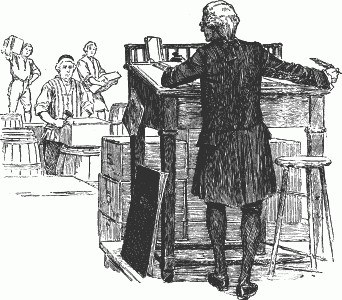
He was standing on the step of his high counting-desk as he spoke, and he peered over the little wooden railing at the men scattered about with pens or hammers or goods in their hands. There was a moment's silence; then a middle-aged man quietly laid down the tools with which he was closing a box, and walked up to the desk. The next moment, every one in the place had followed him. Semple was amazed and angry, but he made no sign of either emotion. He counted to the most accurate fraction every one's due, and let them go without one word of remonstrance.
[Pg 346]But as soon as he was alone, he felt the full bitterness of their desertion, and he could not keep the tears out of his eyes as he looked at their empty places. "Wha could hae thocht it?" he exclaimed. "Allan has been wi' me twenty-seven years, and Scott twenty, and Grey nearly seventeen. And the lads I have aye been kindly to. Maist o' them have wives and bairns, too; it's just a sin o' them. It's no to be believed. It's fair witchcraft. And the pride o' them! My certie, they all looked as if their hands were itching for a sword or a pair o' pistols!"
At this juncture Neil entered the store. "Here's a bonnie pass, Neil; every man has left the store. I may as weel put up the shutters."
"There are other men to be hired."
"They were maistly a' auld standbys, auld married men that ought to have had mair sense."
"The married men are the trouble-makers; the women have hatched and nursed this rebellion. If they would only spin their webs, and mind their knitting!"
"But they willna, Neil; and they never would. If there's a pot o' rebellion brewing between the twa poles, women will be dabbling in it. They have aye been against lawfu' authority. The restraints o' paradise was tyranny to them. And they get worse and worse: it isna ane apple would do them the noo; they'd strip the tree, my lad, to its vera topmost branch."
"There's mother."
"Ay, there's your mother, she's a gude [Pg 347]example. She's a Gordon; and thae Gordon women cried the 'slogan' till their men's heads were a' on Carlisle gate or Temple Bar, and their lands a' under King George's thumb. But is she any wiser for the lesson? Not her. Women are born rebels; the 'powers that be' are always tyrants to them, Neil."
"You ought to know, father. I have small and sad experience with them."
"Sae, I hope you'll stand by my side. We twa can keep the house thegither. If we are a' right, the Government will whistle by a woman's talk."
"Did you not say Katherine was coming back?"
"I did that. See there, again. Hyde has dropped his uniform, and sold a' that he has, and is coming to fight in a quarrel that's nane o' his. Heard you ever such foolishness? But it is Katherine's doing; there's little doot o' that."
"He's turned rebel, then?"
"Ay has he. That's what women do. Politics and rebellion is the same thing to them."
"Well, father, I shall not turn rebel."
"O Neil, you take a load off my heart by thae words!"
"I have nothing against the king, and I could not be Hyde's comrade."
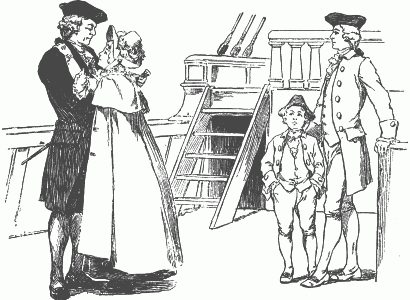
XVI.
"How glorious stand the valiant, sword in hand,
In front of battle for their native land!"
It was into this thundery atmosphere of coming conflict, of hopes and doubts, of sundering ties and fearful looking forward, that Richard and Katherine Hyde came, from the idyllic peace and beauty of their Norfolk house. But there was something in it that fitted Hyde's real disposition. He was a natural soldier, and he had arrived at the period of life when the mere show and pomp of the profession had lost all satisfying charm. He had found a quarrel worthy of his sword, one that had not only his deliberate approval, but his passionate sympathy. In fact, his first blow for American independence [Pg 349]had been struck in the duel with Lord Paget; for that quarrel, though nominally concerning Lady Suffolk, was grounded upon a dislike engendered by their antagonism regarding the government of the Colonies.
It was an exquisite April morning when they sailed up New York bay once more. Joris had been watching for the "Western Light;" and when she came to anchor at Murray's Wharf, his was the foremost figure on it. He had grown a little stouter, but was still a splendid-looking man; he had grown a little older, but his tenderness for his daughter was still young and fresh and strong as ever. He took her in his arms, murmuring, "Mijn Katrijntje, mijn Katrijntje! Ach, mijn kind, mijn kind!"
Hyde had felt that there might be some embarrassment in his own case, perhaps some explanation or acknowledgment to make; but Joris waved aside any speech like it. He gave Hyde both hands; he called him "mijn zoon;" he stooped, and put the little lad's arms around his neck. In many a kind and delicate way he made them feel that all of the past was forgotten but its sweetness.
And surely that hour Lysbet had the reward of her faithful affection. She had always admired Hyde; and she was proud and happy to have him in her home, and to have him call her mother. The little Joris took possession of her heart in a moment. Her Katherine was again at her side. She had felt the clasp of her hands; she had heard her whisper "mijn moeder" upon her lips.
They landed upon a Saturday, upon one of those delightsome days that April frequently [Pg 350]gives to New York. There was a fresh wind, full of the smell of the earth and the sea; an intensely blue sky, with flying battalions of white fleecy clouds across it; a glorious sunshine above everything. And people live, and live happily, even in the shadow of war. The stores were full of buyers and sellers. The doors and windows of the houses were open to the spring freshness. Lysbet had heard of their arrival, and was watching for them. Her hair was a little whiter, her figure a little stouter; but her face was fair and rosy, and sweet as ever.
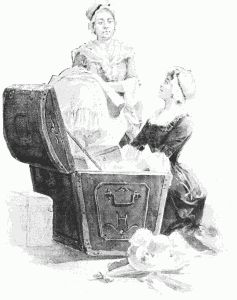
In a few hours things had fallen naturally and easily into place. Joris and Bram and Hyde sat talking of the formation of a regiment. Little Joris leaned on his grandfather's shoulder listening. Lysbet and Katherine were busy unpacking trunks full of fineries and pretty things; occasionally stopping to give instructions to Dinorah, who was preparing an extra tea, as Batavius and Joanna were coming to spend the evening. "And to the elder and Janet Semple I have sent a message, also," said Lysbet; "for I see not why anger should be nursed, or old friendships broken, for politics."
[Pg 351]Katherine had asked at once, with eager love, for Joanna; she had expected that she would be waiting to welcome her. Lysbet smiled faintly at the supposition. "She has a large family, then, and Batavius, and her house. Seldom comes she here now."
But about four o'clock, as Katherine and Hyde were dressing, Joanna and Batavius and all their family arrived. In a moment, their presence seemed to diffuse itself through the house. There was a sense of confusion and unrest, and the loud crying of a hungry baby determined to be attended to. And Joanna was fulfilling this duty, when Katherine hastened to meet her. Wifehood and motherhood had greatly altered the slim, fair girl of ten years before. She had grown stout, and was untidy in her dress, and a worried, anxious expression was continually on her countenance. Batavius kept an eye on the children; there were five of them beside the baby,—fat, rosy, round-faced miniatures of himself, all having a fair share of his peculiar selfish traits, which each expressed after its individual fashion.
Hyde met his brother-in-law with a gentlemanly cordiality; and Batavius, who had told Joanna "he intended to put down a bit that insolent Englishman," was quite taken off his guard, and, ere he was aware of his submission, was smoking amicably with him, as they discussed the proposed military organization. Very soon Hyde asked Batavius, "If he were willing to join it?"
"When such a family a man has," he answered, waving his hand complacently toward the six children, "he must have some prudence [Pg 352]and consideration. I had been well content with one child; but we must have our number, there is no remedy. And I am a householder, and I pay my way, and do my business. It is a fixed principle with me not to meddle with the business of other people."
"But, sir, this is your business, and your children's business also."
"I think, then, that it is King George's business."
"It is liberty"—
"Well, then, I have my liberty. I have liberty to buy and to sell, to go to my own kirk, to sail the 'Great Christopher' when and where I will. My house, my wife, my little children, nobody has touched."
"Pray, sir, what of your rights? your honour?"
"Oh, indeed, then, for ideas I quarrel not! Facts, they are different. Every man has his own creed, and every man his own liberty, so say I.—Come here, Alida," and he waved his hand imperiously to a little woman of four years old, who was sulking at the window, "what's the matter now? You have been crying again. I see that you have a discontented temper. There is a spot on your petticoat also, and your cap is awry. I fear that you will never become a neat, respectable girl—you that ought to set a good pattern to your little sister Femmetia."
Evidently he wished to turn the current of the conversation; but as soon as the child had been sent to her mother, Joris resumed it.
"If you go not yourself to the fight, Batavius, plenty of young men are there, longing to go, who have no arms and no clothes: send in your place one of them."
[Pg 353]"It is my fixed principle not to meddle in the affairs of other people, and my principles are sacred to me."
"Batavius, you said not long ago that the colonists were leaving the old ship, and that the first in the new boat would have the choice of oars."
"Bram, that is the truth. I said not that I would choose any of the oars."
"A fair harbour we shall make, and the rewards will be great, Batavius."
"It is not good to cry 'herrings,' till in the net you have them. And to talk of rowing, the colonists must row against wind and tide; the English will row with set sail. That is easy rowing. Into this question I have looked well, for always I think about everything."
"Have you read the speeches of Adams and Hancock and Quincy? Have you heard what Colonel Washington said in the Assembly?"
"Oh, these men are discontented! Something which they have not got, they want. They are troublesome and conceited. They expect the century will be called after them. Now I, who punctually fulfil my obligations as a father and a citizen, I am contented, I never make complaints, I never want more liberty. You may read in the Holy Scriptures that no good comes of rebellion. Did not Absalom sit in the gate, and say to the discontented, 'See thy matters are good and right; but there is no man deputed of the king to hear thee;' and, moreover, 'Oh, that I were made a judge in the land, that every man which hath any suit or cause might come unto me, and I would do him justice'? And did not Sheba blow a trumpet, and [Pg 354]say, 'We have no part in David, neither have we inheritance in the son of Jesse. Every man to his tents, O Israel'? Well, then, what came of such follies? You may read in the Word of God that they ended in ruin."
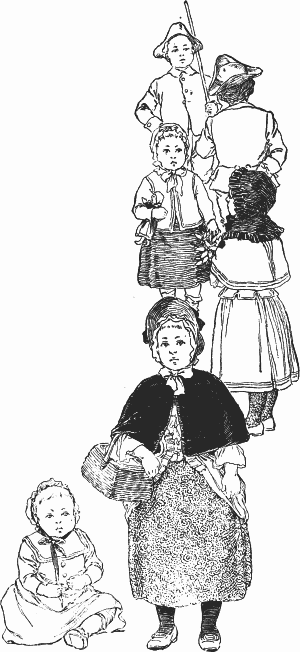
Hyde looked with curiosity at the complacent orator. Bram rose, and, with a long-drawn whistle, left the room. Joris said sternly, "Enough you have spoken, Batavius. None are so blind as those who will not see."
"Well, then, father, I can see what is in the way of mine own business; and it is a fixed principle with me not to meddle with the business of other people. And look here, Joanna, the night is coming, and the dew with it, and Alida had sore throat yesterday: we had better go. Fast in sleep the children ought to be at this hour." And he bustled about them, tying on caps and capes; and finally, having marshalled the six children and their two nurses in front of him he trotted off with Joanna upon his arm, fully persuaded that he had done himself great credit, and acted with uncommon wisdom. "But it belongs to me to do that, Joanna," he said; "among all [Pg 355]the merchants, I am known for my great prudence."
"I think that my father and Bram will get into trouble in this matter."
"You took the word out of my mouth, Joanna; and I will have nothing to do with such follies, for they are waxing hand over hand like the great winds at sea, till the hurricane comes, and then the ruin."
The next morning was the Sabbath, and it broke in a perfect splendour of sunshine. The New World was so new and fresh, and Katherine thought she had never before seen the garden so lovely. Joris was abroad in it very early. He looked at the gay crocus and the pale snowdrop and the budding pansies with a singular affection. He was going, perchance, on a long warfare. Would he ever return to greet them in the coming springs? If he did return, would they be there to greet him? As he stood pensively thoughtful, Katherine called him. He raised his eyes, and watched her approach as he had been used when she was a child, a school-girl, a lovely maiden. But never had she been so beautiful as now. She was dressed for church in a gown of rich brown brocade over a petticoat of paler satin, with costly ornaments of gold and rubies. As she joined her father, Hyde joined Lysbet in the parlour; and the two stood at the window watching her. She had clasped her hands upon his shoulder, and leaned her beautiful head against them. "A most perfect picture," said Hyde, and then he kissed Lysbet; and from that moment they were mother and son.
They walked to church together; and Hyde [Pg 356]thought how beautiful the pleasant city was that sabbath morning, with its pretty houses shaded by trees just turning green, its clear air full of the grave dilating harmony of the church-bells, its quiet streets thronged with men and women—both sexes dressed with a magnificence modern Broadway beaux and belles have nothing to compare with. What staid, dignified men in three-cornered hats and embroidered velvet coats and long plush vests! What buckles and wigs and lace ruffles and gold snuff-boxes! What beautiful women in brocades and taffetas, in hoops and high heels and gauze hats! Here and there a black-robed dominie; here and there a splendidly dressed British officer, in scarlet and white, and gold epaulettes and silver embroideries! New York has always been a highly picturesque city, but never more so than in the restless days of A.D. 1775.
Katherine and Hyde and Bram were together; Joris and Lysbet were slowly following them. They were none of them speaking much, nor thinking much, but all were very happy and full of content! Suddenly the peaceful atmosphere was troubled by the startling clamour of a trumpet. It was a note so distinct from the music of the bells, so full of terror and warning, that every one stood still. A second blast was accompanied by the rapid beat of a horse's hoofs; and the rider came down Broadway like one on a message of life and death, and made no pause until he had very nearly reached Maiden Lane.
At that point a tall, muscular man seized the horse by the bridle, and asked, "What news?"
[Pg 357]"Great news! great news! There has been a battle, a massacre at Lexington, a running fight from Concord to Boston! Stay me not!" But, as he shook the bridle free, he threw a handbill, containing the official account of the affair at Lexington to the inquirer.
Who then thought of church, though the church-bells were ringing? The crowd gathered around the man with the handbill, and in ominous silence listened to the tidings of the massacre at Lexington, the destruction of stores at Concord, the quick gathering of the militia from the hills and dales around Reading and Roxbury, the retreat of the British under their harassing fire, until, worn out and disorganized, they had found a refuge in Boston. "And this is the postscript at the last moment," added the reader: "'Men are pouring in from all the country sides; Putnam left his plough in the furrow, and rode night and day to the ground; Heath, also, is with him.'"
Joris was white and stern in his emotion; Bram stood by the reader, with a face as bright as a bridegroom's; Hyde's lips were drawn tight, and his eyes were flashing with the true military flame. "Father," he said, "take mother and Katherine to church; Bram and I will stay here, for I can see that there is something to be done."
"God help us! Yes, I will go to Him first;" and, taking his wife and daughter, he passed with them out of the crowd.
Hyde turned to the reader, who stood with bent brows, and the paper in his hand. "Well, sir, what is to be done?" he asked.
"There are five hundred stand of arms in the [Pg 358]City Hall; there are men enough here to take them. Let us go."
A loud cry of assent answered him.
"My name is Richard Hyde, late of his Majesty's Windsor Guards; but I am with you, heart and soul."
"I am Marinus Willet."
"Then, Mr. Willet, where first?"
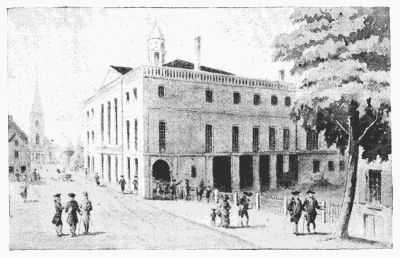
"To the mayor's residence. He has the keys of the room in which the arms are kept."
The news spread, no one knew how; but men poured out from the churches and the houses on their route, and Willet's force was soon nearly a thousand strong. The tumult, the tread, the animus of the gathering, was felt in that part of the city even where it could not be heard. Joris could hardly endure the suspense, and the service did him very little good. About two o'clock, as he was walking restlessly about the house, Bram and Hyde returned together.
"Well?" he asked.
[Pg 359]"There were five hundred stand of arms in the City Hall, and I swear that we have taken them all. A man called Willet led us; a hero, quick of thought, prompt and daring,—a true soldier."
"I know him well; a good man."
"The keys the mayor refused to us," said Bram.
"Oh, sir, he lied to us! Vowed he did not have them, and sent us to the armourer in Crown Street. The armourer vowed that he had given them to the mayor."
"What then?"
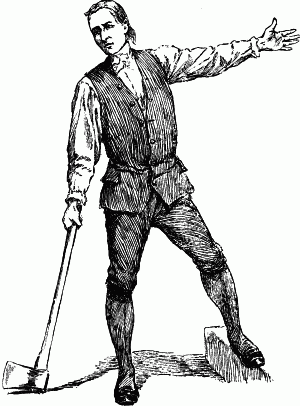
"Oh, indeed, all fortune fitted us! We went en masse down Broadway into Wall Street, and so to the City Hall. Here some one, with too nice a sense of the sabbath, objected to breaking open the doors because of the day. But with very proper spirit Willet replied, 'If we wait until to-morrow, the king's men will not wait. The arms will be removed. And as for a key, here is one that will open any lock.' As he said the words, he swung a great axe around his head; and so, with a few blows, he made us an entrance. Indeed, I think that he is a grand fellow."
"And you got the arms?"
"Faith, we got all we went for! The arms were divided among the people. There was a drum and a fife also found with them, and some one made us very excellent music to step to. As we re[Pg 360]turned up Broadway, the congregation were just coming out of Trinity. Upon my word, I think we frightened them a little."
"Where were the English soldiers?"
"Indeed, they were shut up in barracks. Some of their officers were in church, others waiting for orders from the governor or mayor. 'Tis to be found out where the governor might be; the mayor was frightened beyond everything, and not capable of giving an order. Had my uncle Gordon been still in command here, he had not been so patient."
"And for you that would have been a hard case."
"Upon my word, I would not have fought my old comrades. I am glad, then, that they are in Quebec. Our swords will scarce reach so far."
"And where went you with the arms?"
"To a room in John Street. There they were stacked, the names of the men enrolled, and a guard placed over them. Bram is on the night patrol, by his own request. As for me, I have the honour of assisting New York in her first act of rebellion! and, if the military superstition be a true one, 'A Sunday fight is a lucky fight.'—And now, mother, we will have some dinner: 'The soldier loves his mess.'"
Every one was watching him with admiration. Never in his uniform had he appeared so like a soldier as he did at that hour in his citizen coat and breeches of wine-coloured velvet, his black silk stockings and gold-buckled shoes. His spirits were infectious: Bram had already come into thorough sympathy with him, and grown almost gay in his company; Joris felt [Pg 361]his heart beat to the joy and hope in his young comrades. All alike had recognized that the fight was inevitable, and that it would be well done if it were soon done.
But events cannot be driven by wishes: many things had to be settled before a movement forward could be made. Joris had his store to let, and the stock and good-will to dispose of. Horses and accoutrements must be bought, uniforms made; and every day this charge increased: for, as soon as Van Heemskirk's intention to go to the front was known, a large number of young men from the best Dutch families were eager to enlist under him.
Hyde's time was spent as a recruiting-officer. His old quarters, the "King's Arms," were of course closed to him; but there was a famous tavern on Water Street, shaded by a great horse-chestnut tree, and there the patriots were always welcome. There, also, the news of all political events was in some mysterious way sure to be first received. In company with Willet, Sears, and McDougall, Hyde might be seen under the chestnut-tree every day, enlisting men, or organizing the "Liberty Regiment" then raising.
From the first, his valorous temper, his singleness of purpose, his military skill in handling troops, and his fine appearance and manners, had given him influence and authority. He soon, also, gained a wonderful power over Bram; and even the temperate wisdom and fine patience of Joris gradually kindled, until the man was at white heat all through. Every day's events fanned the temper of the city, although it was soon evident that the first [Pg 362]fighting would be done in the vicinity of Boston.
For, three weeks after that memorable April Sunday, Congress, in session at Philadelphia, had recognized the men in camp there as a Continental army, the nucleus of the troops that were to be raised for the defence of the country, and had commissioned Colonel Washington as commander-in-chief to direct their operations. Then every heart was in a state of the greatest expectation and excitement. No one remembered at that hour that the little army was without organization or discipline, most of its officers incompetent to command, its troops altogether unused to obey, and in the field without enlistment. Their few pieces of cannon were old and of various sizes, and scarce any one understood their service. There was no siege-train and no ordnance stores. There was no military chest, and nothing worthy the name of a commissariat. Yet every one was sure that some bold stroke would be struck, and the war speedily terminated in victory and independence.
So New York was in the buoyant spirits of a young man rejoicing to run a race. The armourers, the saddlers, and the smiths were busy day and night; weapons were in every hand, the look of apprehended triumph on every face. In June the Van Heemskirk troops were ready to leave for Boston—nearly six hundred young men, full of pure purpose and brave thoughts, and with all their illusions and enthusiasms undimmed.
The day before their departure, they escorted Van Heemskirk to his house. Lysbet and [Pg 363]Katherine saw them coming, and fell weeping on each other's necks—tears that were both joyful and sorrowful, the expression of mingled love and patriotism and grief. It would have been hard to find a nobler-looking leader than Joris. Age had but added dignity to his fine bulk. His large, fair face was serene and confident. And the bright young lads who followed him looked like his sons, for most of them strongly resembled him in person; and any one might have been sure, even if the roll had not shown it, that they were Van Brunts and Van Ripers and Van Rensselaers, Roosevelts, Westervelts, and Terhunes.
They had a very handsome uniform, and there had been no uncertainty or dispute about it. Blue, with orange trimmings, carried the question without one dissenting voice. Blue had been for centuries the colour of opposition to tyranny. The Scotch Covenanters chose it because the Lord ordered the children of Israel to wear a ribbon of blue that they might "look upon it, and remember all the commandments of the Lord, and do them; and seek not after their own heart and their own eyes, and be holy unto their God." (Num. xv. 38.) Into their cities of refuge in Holland, the Covenanters carried their sacred colour; and the Dutch Calvinists soon blended the blue of their faith with the orange of their patriotism. Very early in the American struggle, blue became the typical colour of freedom; and when Van Heemskirk's men chose the blue and orange for their uniform, they selected the colours which had already been famous on many a battle-field of freedom.
[Pg 364]Katherine and Lysbet had made the flag of the new regiment—an orange flag, with a cluster of twelve blue stars above the word liberty. It was Lysbet's hands that gave it to them. They stood in a body around the open door of the Van Heemskirk house; and the pretty old lady kissed it, and handed it with wet eyes to the colour-sergeant. Katherine stood by Lysbet's side. They were both dressed as for a festival, and their faces were full of tender love and lofty enthusiasm. To Joris and his men they represented the womanhood dear to each individual heart. Lysbet's white hair and white cap and pale-tinted face was "the mother's face;" and Katherine, in her brilliant beauty, her smiles and tears, her shining silks and glancing jewels, was the lovely substitute for many a precious sister and many a darling lady-love. But few words were said. Lysbet and Katherine could but stand and gaze as heads were bared, and the orange folds flung to the wind, and the inspiring word liberty saluted with bright, upturned faces and a ringing shout of welcome.
Such a lovely day it was—a perfect June day; doors and windows were wide open; a fresh wind blowing, a hundred blended scents from the garden were in the air; and there was a sunshine that warmed everything to the core. If there were tears in the hearts of the women, they put them back with smiles and hopeful words, and praises of the gallant men who were to fight a noble fight under the banner their fingers had fashioned.
It was to be the last evening at home for Joris and Bram and Hyde, and everything
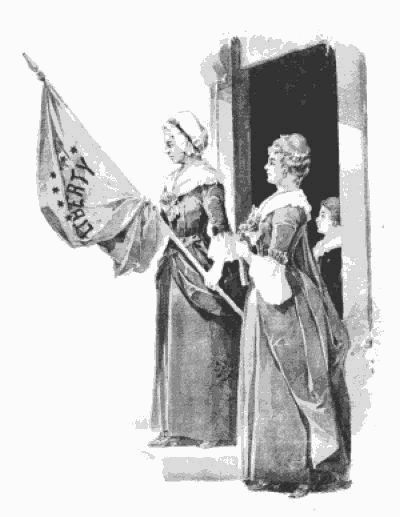
[Pg 366][Pg 367]was done to make it a happy memory. The table was laid with the best silver and china; all the dainties that the three men liked best were prepared for them. The room was gay with flowers and blue and orange ribbons, and bows of the same colours fluttered at Lysbet's breast and on Katherine's shoulder. And as they went up and down the house, they were both singing,—singing to keep love from weeping, and hope and courage from failing; Lysbet's thin, sweet voice seeming like the shadow of Katherine's clear, ringing tones,—
"Oh, for the blue and the orange,
Oh, for the orange and the blue!
Orange for men that are free men,
Blue for men that are true.
Over the red of the tyrant,
Bloody and cruel in hue,
Fling out the banner of orange,
With pennant and border of blue.
Orange for men that are free men,
Blue for men that are true."
So they were singing when Joris and his sons came home.
There had been some expectation of Joanna and Batavius, but at the last moment an excuse was sent. "The child is sick, writes Batavius; but I think, then, it is Batavius that is afraid, and not the child who is sick," said Joris.
"To this side and to that side and to neither side, he will go; and he will miss all the good, and get all the bad of every side," said Bram contemptuously.
"I think not so, Bram. Batavius can sail with the wind. All but his honour and his manhood he will save."
[Pg 368]"That is exactly true," continued Hyde. "He will grow rich upon the spoils of both parties. Upon my word, I expect to hear him say, 'Admire my prudence. While you have been fighting for an idea, I have been making myself some money. It is a principle of mine to attend only to my own affairs.'"
After supper Bram went to bid a friend good-by; and as Joris and Lysbet sat in the quiet parlour, Elder Semple and his wife walked in. The elder was sad and still. He took the hands of Joris in his own, and looked him steadily in the face. "Man Joris," he said, "what's sending you on sic a daft-like errand?"
Joris smiled, and grasped tighter his friend's hand. "So glad am I to see you at the last, Elder. As in you came, I was thinking about you. Let us part good friends and brothers. If I come not back"—
"Tut, tut! You're sure and certain to come back; and sae I'll save the quarrel I hae wi' you until then. We'll hae mair opportunities; and I'll hae mair arguments against you, wi' every week that passes. Joris, you'll no hae a single word to say for yoursel' then. Sae, I'll bide my time. I came to speak anent things, in case o' the warst, to tell you that if any one wants to touch your wife or your bairns, a brick in your house, or a flower in your garden-plat, I'll stand by all that's yours, to the last shilling I hae, and nane shall harm them. Neil and I will baith do all men may do. Scotsmen hae lang memories for either friend or foe. O Joris, man, if you had only had an ounce o' common wisdom!"
"I have a friend, then! I have you, Alexan[Pg 369]der. Never this hour shall I regret. If all else I lose, I have saved mijn jongen."
The old men bent to each other; there were tears in their eyes. Without speaking, they were aware of kindness and faithfulness and gratitude beyond the power of words. They smoked a pipe together, and sometimes changed glances and smiles, as they looked at, or listened to, Lysbet and Janet Semple, who had renewed their long kindness in the sympathy of their patriotic hopes and fears.
Hyde and Katherine were walking in the garden, lingering in the sweet June twilight by the lilac hedge and the river-bank. All Hyde's business was arranged: he was going into the fight without any anxiety beyond such as was natural to the circumstances. While he was away, his wife and son were to remain with Lysbet. He could desire no better home for them; their lives would be so quiet and orderly that he could almost tell what they would be doing at every hour. And while he was in the din and danger of siege and battle, he felt that it would be restful to think of Katherine in the still, fair rooms and the sweet garden of her first home.
If he never came back, ample provision had been made for his wife and son's welfare; but—and he suddenly turned to Katherine, as if she had been conscious of his thoughts—"The war will not last very long, dear heart; and when liberty is won, and the foundation for a great commonwealth laid, why then we will buy a large estate somewhere upon the banks of this beautiful river. It will be delightful, in the midst of trees and parks, to build a grander [Pg 370]Hyde Manor House. Most completely we will furnish it, in all respects; and the gardens you shall make at your own will and discretion. A hundred years after this, your descendants shall wander among the treillages and cut hedges and boxed walks, and say, 'What a sweet taste our dear great-great-grandmother had!'"
And Katharine laughed at his merry talk and forecasting, and praised his uniform, and told him how soldierly and handsome he looked in it. And she touched his sword, and asked, "Is it the old sword, my Richard?"
"The old sword, Kate, my sweet. With it I won my wife. Oh, indeed, yes! You know it was pity for my sufferings made you marry me that blessed October day, when I could not stand up beside you. It has a fight twice worthy of its keen edge now." He drew it partially from its sheath, and mused a moment. Then he slowly untwisted the ribbon and tassel of bullion at the hilt, and gave it into her hand. "I have a better hilt-ribbon than that," he said; "and when we go into the house, I will re-trim my sword."
She thought little of the remark at the time, though she carefully put the tarnished tassel away among her dearest treasures; but it acquired a new meaning in the morning. The troops were to leave very early; and soon after dawn, she heard the clatter of galloping horses and the calls of the men as they reined up at their commander's door. Bram, as his father's lieutenant, was with them. The horses of Joris and Hyde were waiting.
They rose from the breakfast-table and [Pg 371]looked at their wives. Lysbet gave a little sob, and laid her head a moment upon her husband's breast. Katherine lifted her white face and whispered, with kisses, "Beloved one, go. Night and day I will pray for you, and long for you. My love, my dear one!"
There was hurry and tumult, and the stress of leave-taking was lightened by it. Katherine held her husband's hand till they stood at the open door. Then he looked into her face, and down at his sword, with a meaning smile. And her eyes dilated, and a vivid blush spread over her cheeks and throat, and she drew him back a moment, and passionately kissed him again; and all her grief was lost in love and triumph. For, wound tightly around his sword-hilt, she saw—though it was brown and faded—- her first, fateful love-token,—The Bow of Orange Ribbon.
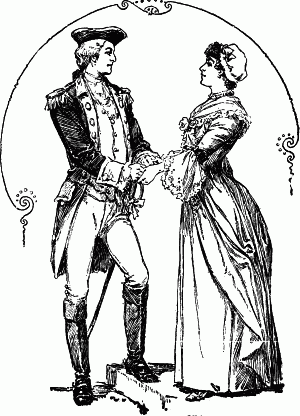
POSTSCRIPT.
[QUOTATION FROM A LETTER DATED JULY 5, A.D. 1885.]
"Yesterday I went with my aunt to spend 'the Fourth' at the Hydes. They have the most delightful place,—a great stone house in a wilderness of foliage and beauty, and yet within convenient distance of the railroad and the river-boats. Why don't we build such houses now? You could make a ball-room out of the hall, and hold a grand reception on the staircase. Kate Hyde said the house is more than a hundred years old, and that the fifth generation is living in it. I am sure there are pictures enough of the family to account for three hundred years; but the two handsomest, after all, are those of the builders. They were very great people at the court of Washington, I believe. I suppose it is natural for those who have ancestors to brag about them, and to show off the old buckles and fans and court-dresses they have hoarded up, not to speak of the queer bits of plate and china; and, I must say, the Hydes have a really delightful lot of such bric-a-brac. But the strangest thing is the 'household talisman.' It is not like the luck of Eden Hall: it is neither crystal cup, nor silver vase, nor magic bracelet, nor an old slipper. But they have a tradition that the house will prosper as long as it lasts, and so this precious palladium is carefully kept in a locked box of carved sandal-wood; for it is only a bit of faded satin that was a love-token,—a St. Nicholas Bow of Orange Ribbon."